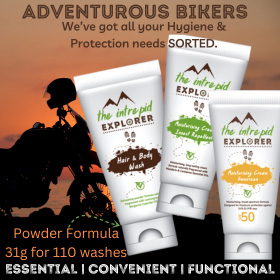 27Likes 27Likes
 |
|

27 Sep 2014
|
|
Registered Users
HUBB regular
|
|
Join Date: Dec 2009
Location: The Netherlands
Posts: 66
|
|
|
Visit Egypt
Quote:
Originally Posted by yuma simon

Glad to read your trip to Egypt has been positive, although cautious. I definitely would like to visit one day, and was sad to read the past few years about the troubles there, and the tourist industry virtually shutting down. You are showing there is hope again!
|
We indeed had a great time in Egypt and would recommend visiting it. Stay tuned for more great riding days in Egypt!
|

27 Sep 2014
|
|
Registered Users
HUBB regular
|
|
Join Date: Dec 2009
Location: The Netherlands
Posts: 66
|
|
|
Look, there they are!
When the alarm goes off at 7:00 am, we are both already awake and listening to the honking traffic in the streets of Alexandria. It has not been quiet that night.
After a quick breakfast of bread with cream cheese, we put all our bags in the wooden elevator of the hotel. Once down, I am glad to see that the bikes are still there and the wheels are still under them. Closely watched by the parking attendant and his friends we tie our stuff on the bikes and ride away from the hotel early in the morning. On to Giza, on to the pyramids! After a glance at the map, we drive around the crowded suburbs this time. From Alexandria two main roads lead to Cairo: the “Agricultural Road” along the Nile and the “Desert Road” just west of the Nile. The area along the Nile is completely crammed and very busy, so we opt for the desert. Although the name suggests that we will drive through an endless sea of sand, this road also appears to be pretty busy. The only thing that reminds of the desert is the dust in the air.
We share the highway with lots of heavily loaded trucks, pick-ups full with fruits and minivans that take travellers to Cairo. It is a strenuous ride and we need to keep paying attention. At some points we make good progress, but the traffic can suddenly stop. Often because the road is very bad and the traffic rides very slowly through the holes. And although it is a highway there are many donkey carts on the road, people trying to get to the other side on the oddest places and minivans stopping anywhere to pick up passengers.
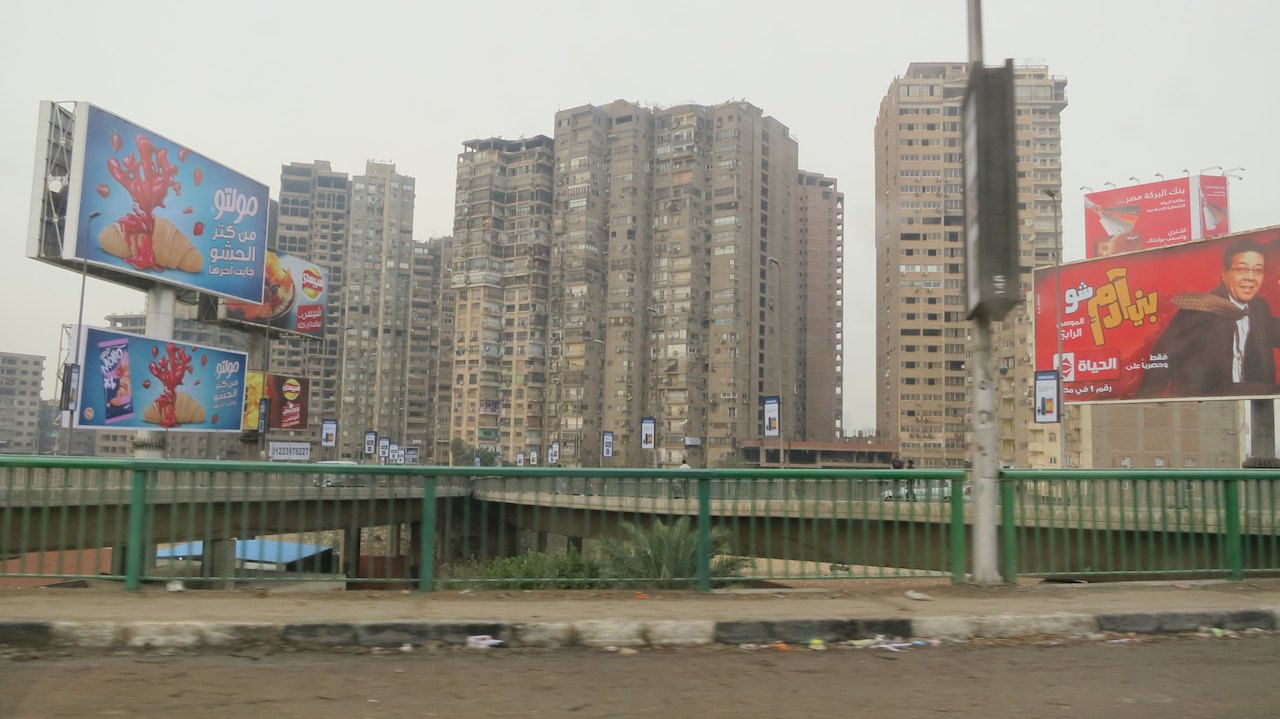
We are on our way to Giza. Once a town just outside of Cairo, but now a suburb of Cairo. A few kilometers from Cairo we see the huge city with its 19 million (!) people looming in the distance. As far as we can see there are buildings and flats. An unreal sight and hard to imagine that in one city are more people than in the Netherlands.
The highway winds through the hills. The closer we get to Cairo, the busier the already busy road becomes. We ride with the fast minivans along the slower traffic. On one of the hills we suddenly see them: the pyramids! Left of the road we can see the two largest pyramids. They are huge and much higher than the flats near them. Fantastic! There we are: 13:26 pm on a Monday afternoon on our own bikes in Egypt along the pyramids!. It gives me goose bumps.
We follow the ring road around Cairo on to Giza. The rumors about the traffic of Cairo are correct: it is crowded and very chaotic. The experience we have gained in Alexandria comes in handy. The GPS leads us off the highway into Giza. Once we get off the main roads the asphalt stops. The road now consists of hard dark brown sand and is full of potholes. We bump on through the dusty streets of Giza until we arrive at our destination: Isis Garden Camp. When the doors open we suddenly are in a green garden with a high hedge of bougainvillea and a pool in the corner. Truly an oasis from the busy and dusty streets we just drove through.
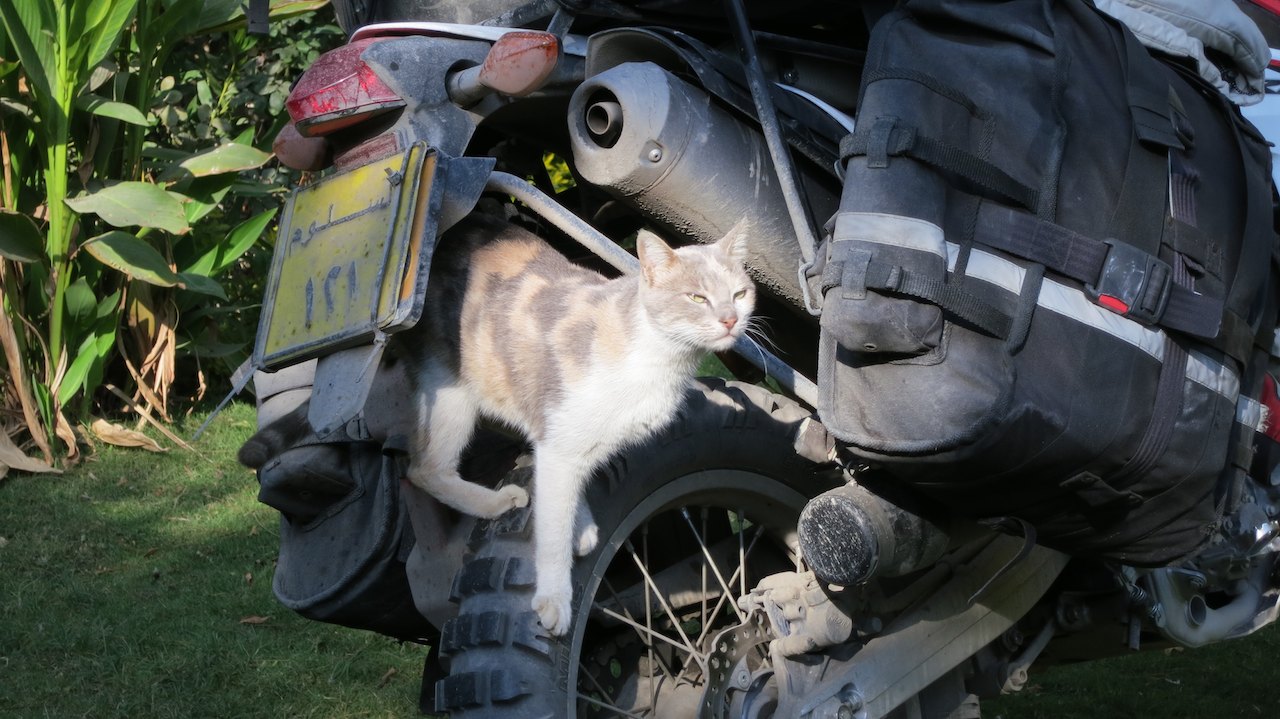
We are warmly welcomed by the Egyptian Helal and his Australian wife Sue. We can set up our tent in the garden and are taken up to the rooftop terrace. From the fifth floor we have a wonderful view of the pyramids, which are only 4km away. A wonderful place!
It is not only the environment that has changed, but also the sounds. The birds in the garden sound more tropical with the “hoop hoop hoop’ of the Hoopoe and pleasant cooing of the little purple dove. Outside the gates of the camp we hear donkeys, water buffaloes and especially lots of dogs. The cars also are much noisier, not in the last place because of the hard horns that are installed.
Furthermore, since we entered Africa in Tunisia the ringing of church bells is replaced by the call of the muezzin. Five times a day we hear “Allahu Akhbar ” through the speakers by which Muslims are called to pray. The mosk-density in Cairo and Giza is enormous. The residents have to walk not more than a few hundred meters to go to the mosque. When the time for prayer comes, we hear the call from all corners at the same time. Well, almost at the same time, so it sometimes sounds like a badly directed canon choir that hums through the city for a few minutes. The closest speaker hangs about 100 meters from our tent and is so loud we could not hear each other. But we are lucky because our muezzin sings ’live’ and has a beautiful voice. Although it is a bit of a shock the first morning at 04:30 am, you get used to it soon enough. And even though we do not use the call to pray to Allah, it does give the opportunity to stop with what you were doing and think about the finer things in life five times a day. Not so bad.
Helal and Sue invite us the next morning for a traditional Egyptian breakfast of flat bread with falafel and salad of eggplant. From the roof terrace we enjoy not only breakfast but also the beautiful view. Sue and Helal tell a lot of stories about Egypt, Giza, the pyramids and other beautiful sites in Egypt. Their enthusiasm is contagious and we cannot wait to go and see all those sites. Today we will relax on the rooftop terrace and in the garden, but tomorrow we will go to the pyramids by camel.
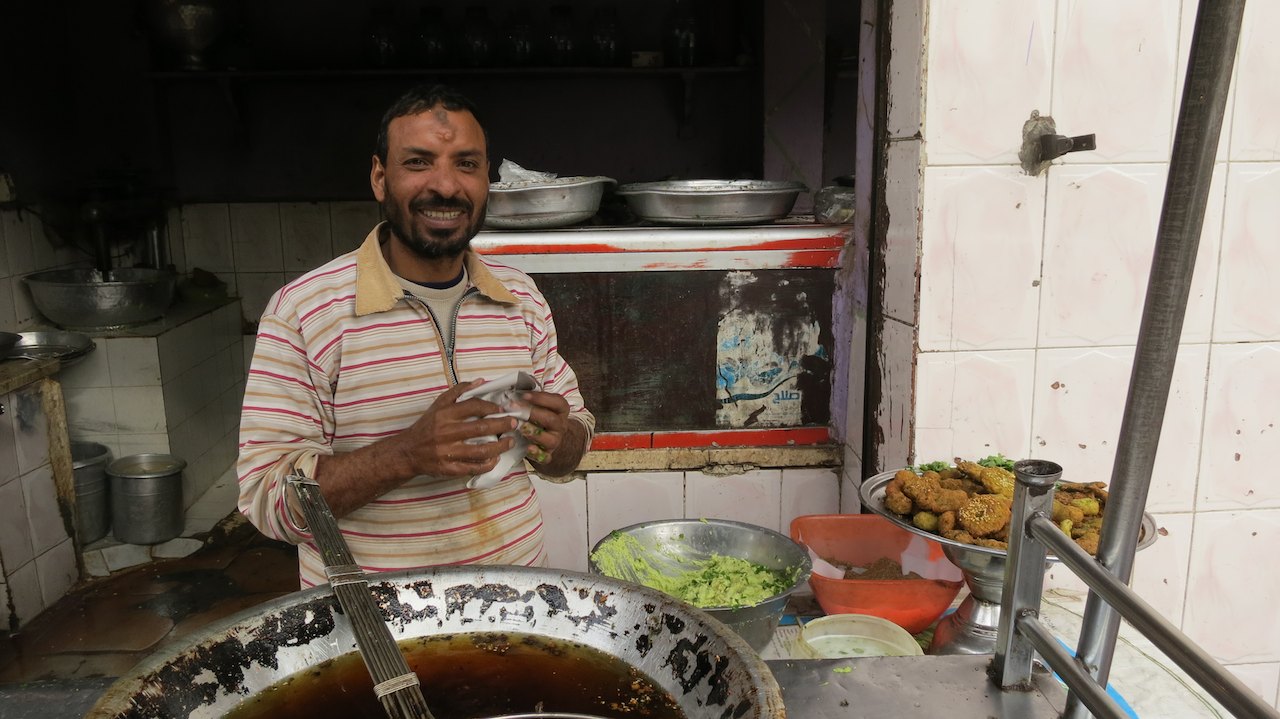
The next morning the owner of the camels pick us up at the campsite. We bump through the dusty streets of Giza in his care while he questions us about ‘Goelit’ and ‘Kroijf’ and other soccer players from the 80s. We stop at his stables where he shows us his horses and camels. After some negotiations on the price, we both get assigned our own camel after which he sends us off with two ‘guides’. The camels are on their knees waiting for us to get on. When we sit on the saddles one of the guys says: “Hold on tight and lean back”, after which he gives a tug on the rope. With a huge force the camel gets up. It is good that we actually kept on firmly and leaned back, otherwise we would have surely glided off the camels.
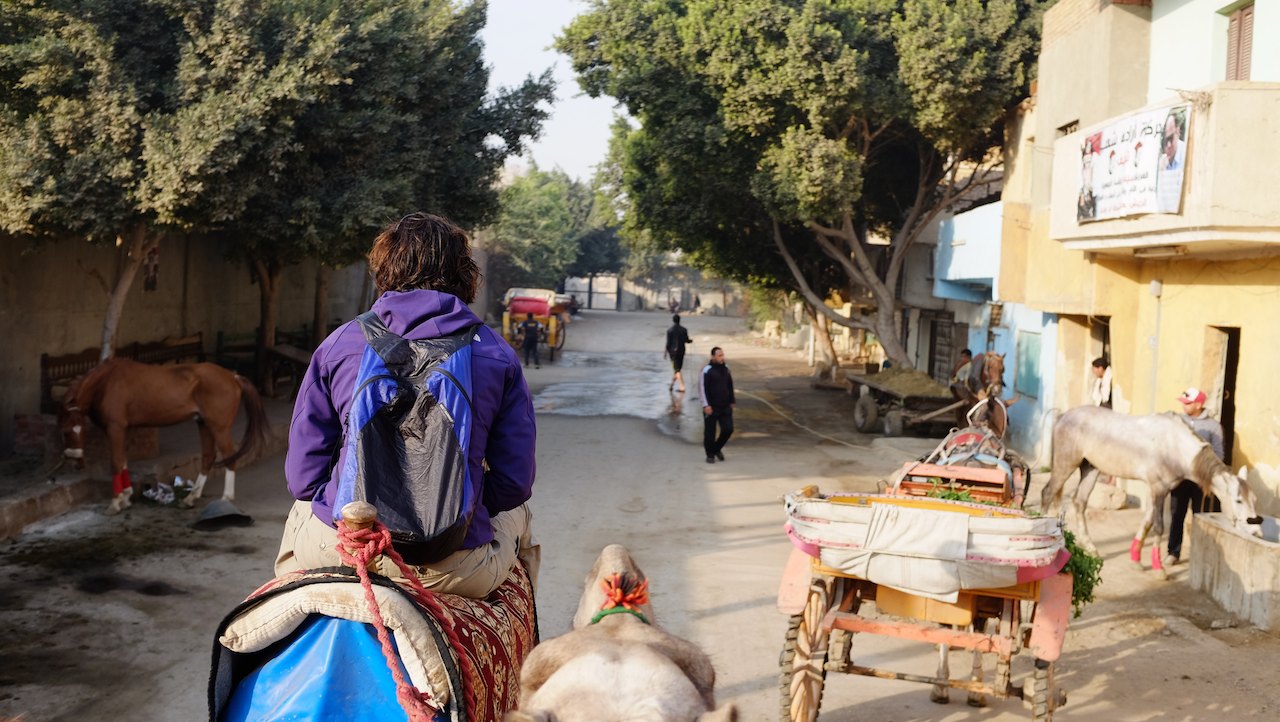
We set off with the two boys, one on foot and the other on a skinny horse. The neighbourhood we go through before we get to the pyramids consists solely of stables. Everywhere are horses and camels waiting for tourists who want a ride. In heyday it must have been very busy, but now we are almost the only tourists.
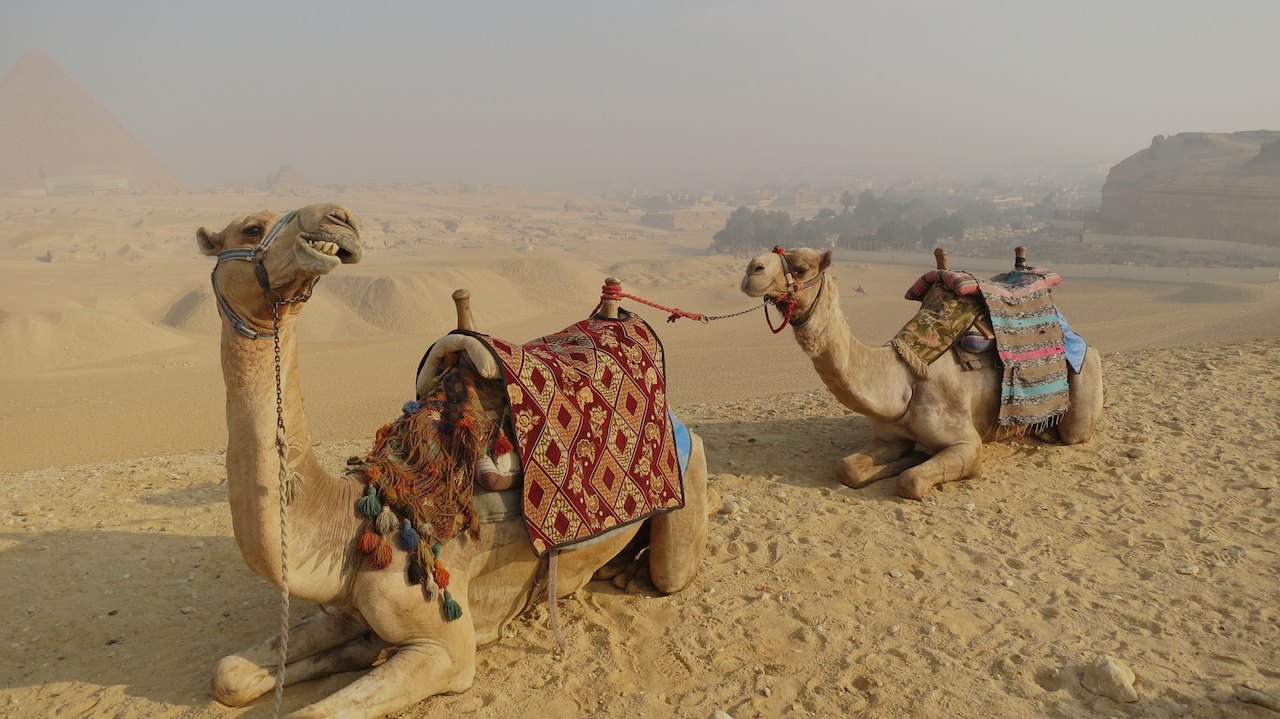
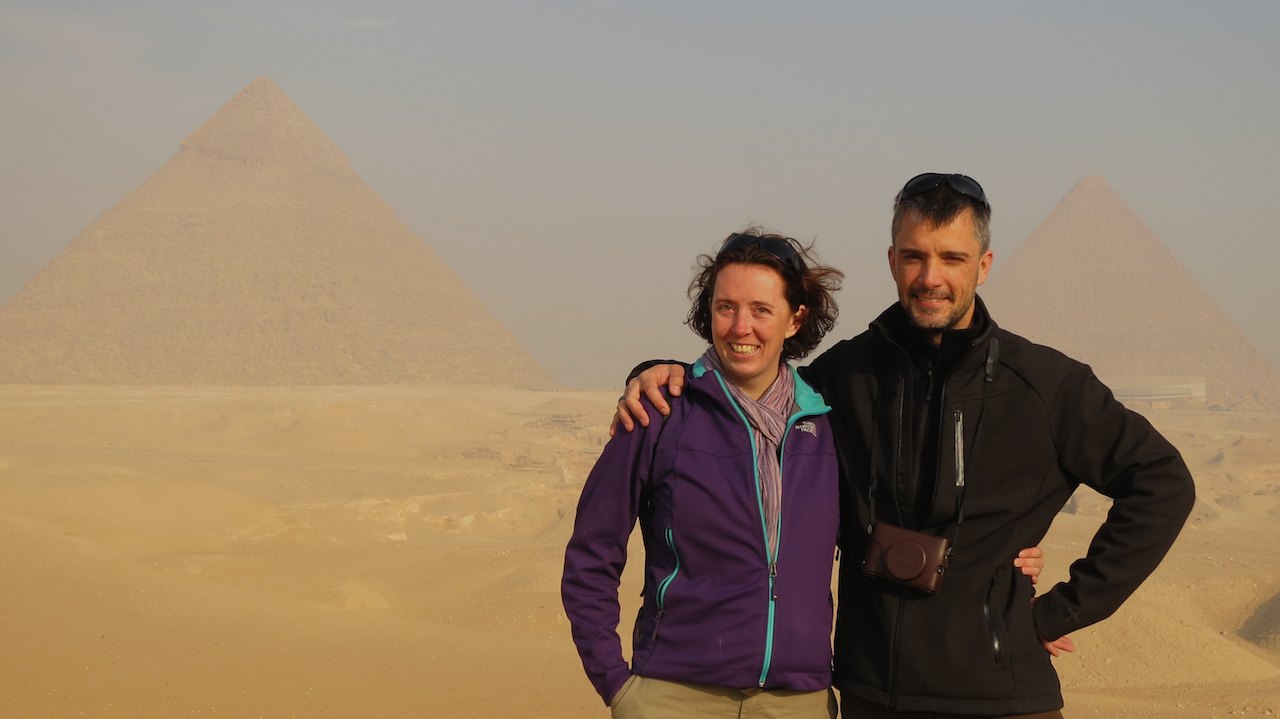
We take a turn, walk through the gate and suddenly are in the desert. The boys take us to one of the hills next to the pyramids where we have a wonderful view of the nine pyramids, the Sphinx and the city. After some pictures we continue our tour in the desert and go to the base of the largest pyramid. Again it becomes clear how incredibly high they are! Extraordinary to think that the pyramids were built around 2560 BC and thus are already more than 2000 years older than the construction of Leptis Magna we visited when we where in Libya. Great to see, especially from our camels!
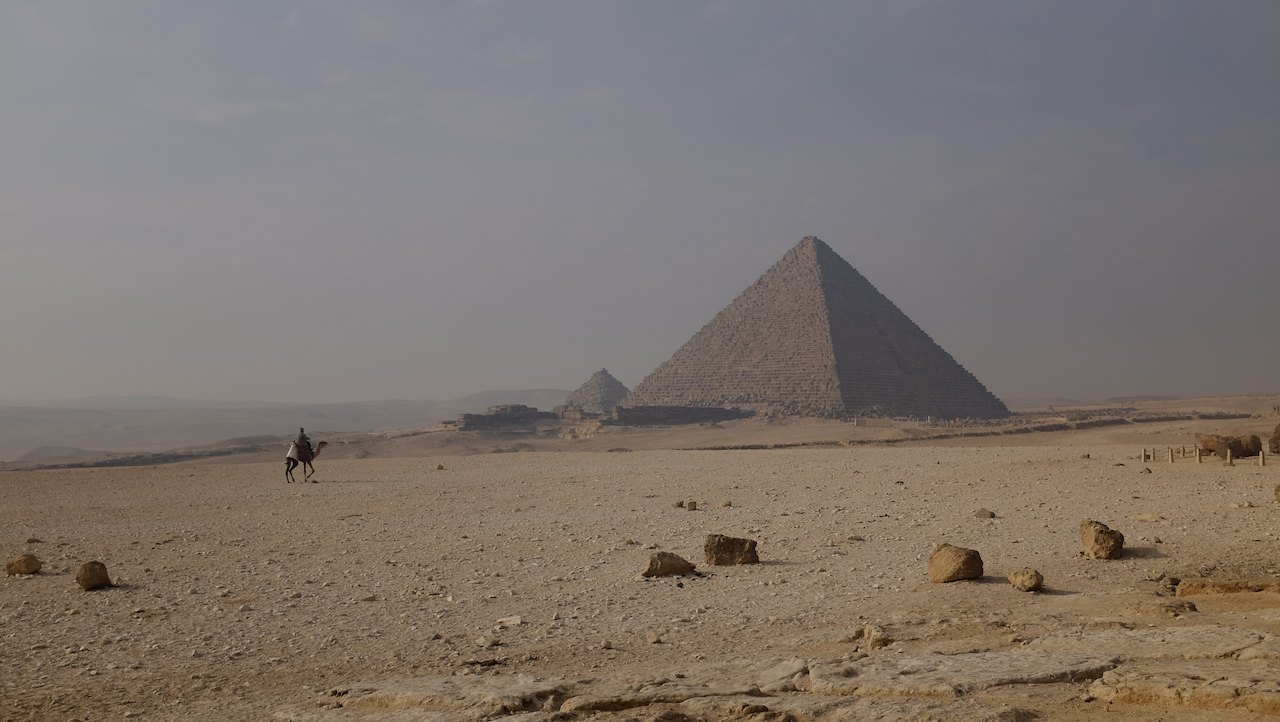
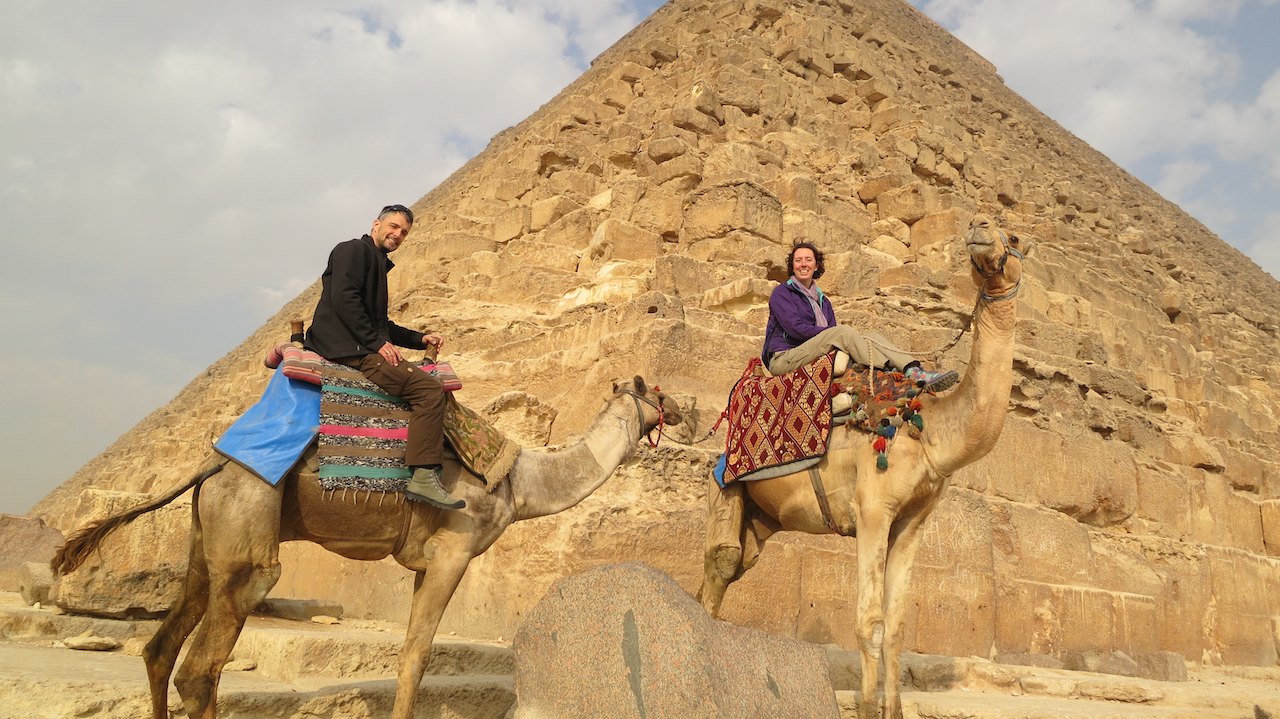
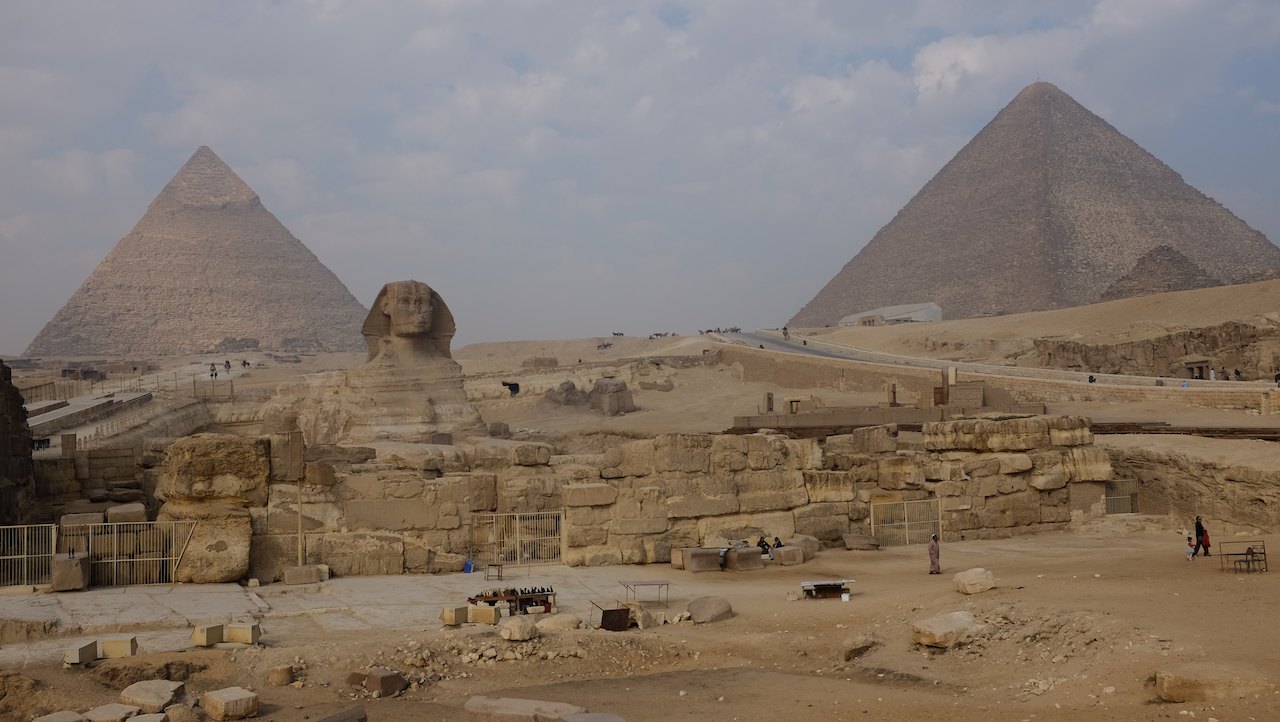
The next day we go to Cairo. We would like to go to the Egyptian Museum where -among other things- things from the tomb of Toetanchamun are shown. The museum is located at the Tahir square, which is especially known from the demonstrations that have been held there for a long time. The latest reports show that it is quiet in the square and we can visit the museum without any problems. Sue and Helal send us out with Walid, who will be our driver for the entire day. It is a great luxury to ride through busy Cairo and enjoy the view from the back seat.
The road to the Tahir Square and the museum is blocked. Behind the barricade is a long row of tanks and in the buildings along the way are large groups of young soldiers. Here we can see for the first time that it can be unstable in the city. We follow a group of tourists along the barricades and tanks to the entrance of the museum. Since we are in Egypt we have only seen a handful of other tourists. That is quit different here, because in front of the entrance of the museum are large groups of Chinese and Russian tourists. Once inside the museum we do not see them again and we can walk around without any crowd.
From all the pyramids, tombs and temples that have been found in Egypt. things have been brought to the Egyptian Museum. The museum is full of statues, parts of walls with hieroglyphics, sarcophagi and stuff that has been found in the various tombs. The museum is very big, but still too small to show everything. The cellars of the museum are apparently still filled with all kinds of treasures that will be shown in a new museum. And to think that probably only a small part of all the tombs and temples in Egypt is found and the greater part is still hidden below the Sahara sands.
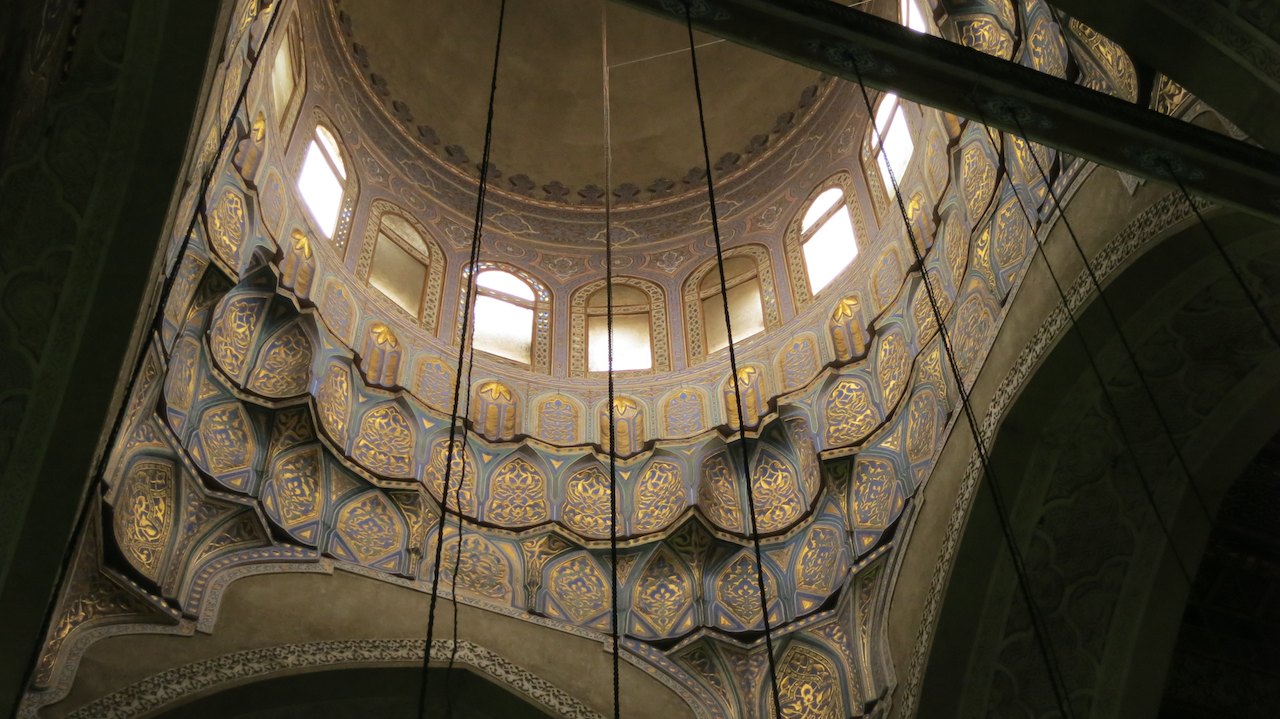
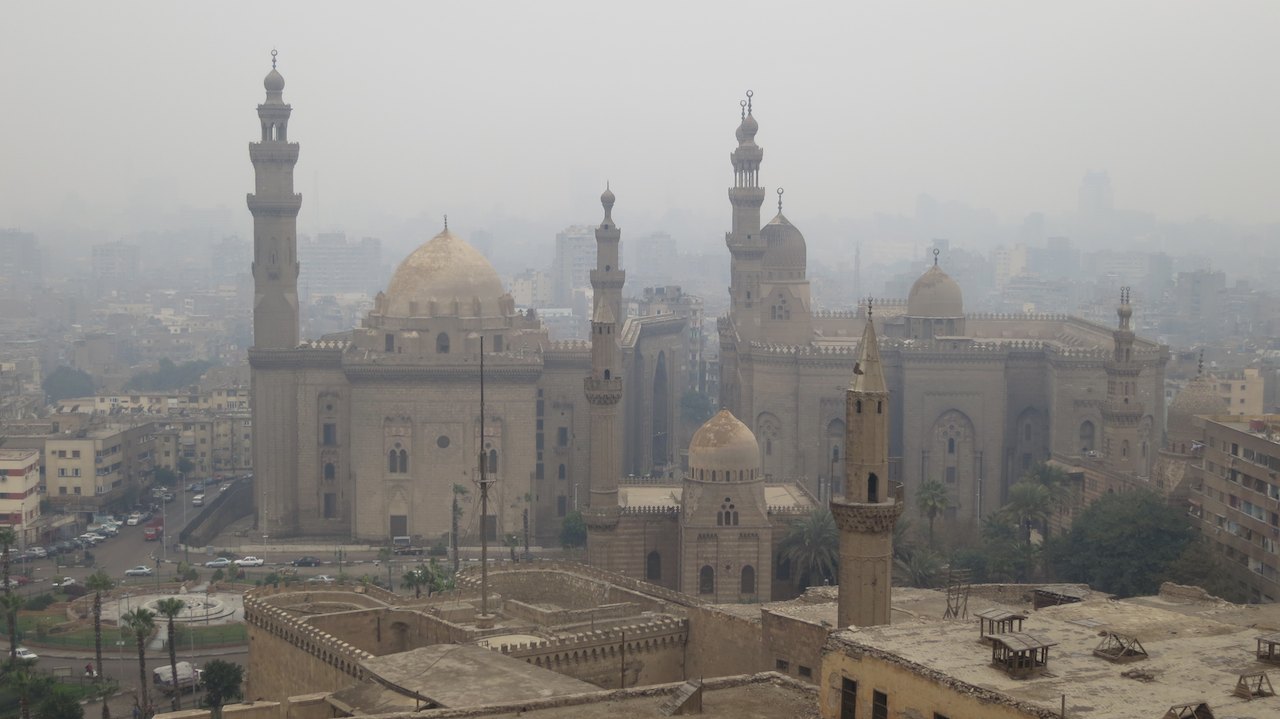
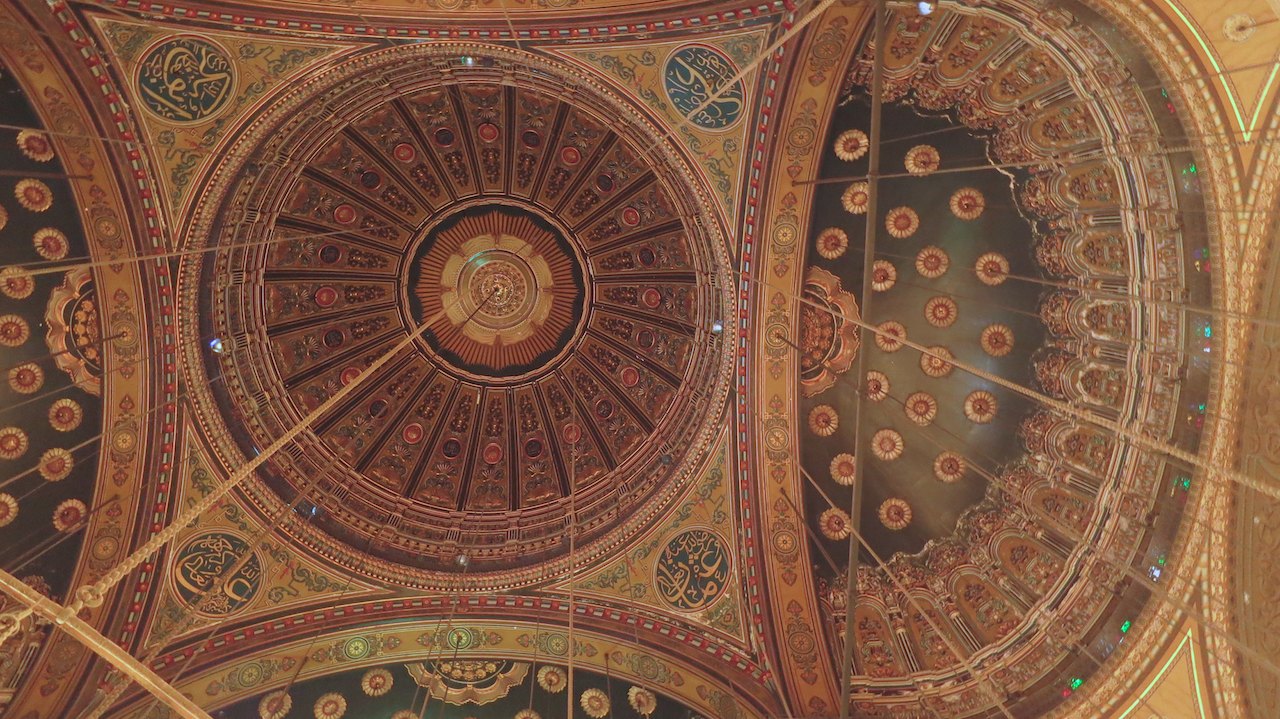
It is extraordinary to see everything. Especially Peter, who in his heart is a explorer and who did pay attention in school when the old Egypt was covered, is very happy to be at the museum. The most special items in the collections are probably the things from the tomb of Toetanchamun. Although he has not played an important role in the history of Egypt, he is one of the most famous pharaohs because his tomb was found and was complete. In his tomb was all the stuff that he had used during his lifetime supplemented with stuff he got when he died. Beds, chairs, jewelry, clothing, really everything you can think of. Lots of it in solid gold! We could also admire the famous mask that had been placed over his mummy. Wow!
In a separate section of the museum are the royal mummies. That means the mummified bodies of the kings and queens of ancient Egypt. They are in display cases in a refrigerated chamber under a white sheet which only shows their heads and sometimes their hands. Some still have a full head of hair and a good set of teeth. Very special to see!
Apart from the collection, the museum itself is an attraction also. It is located in the building at the Tahrir Square since 1900 and has not changed much since then. It is full of beautiful wood cabinets with yellowed notes with text that was typed with a typewriter. The one time in English, sometimes in French. It is definitely worth a visit!
After three hours, Walid picks us up on the other side of the wire. He treats us to Kushari, a spicy dish of rice, pasta and lentils with spicy red sauce. Delicious! At the suggestion of Helal and Sue we then visit two mosques and citadel of Cairo. During our previous trip to Morocco we were not allowed to visit mosques as non-Muslims, but luckily for us that is different here. On our socks and with a scarf covering my hair, we admire the various buildings. Like in Rome, we especially like the pretty, painted ceilings.
When we arrive at the campsite after a day in the smog of Cairo, there is a small fire burning in the street in front of the gate of the camp. On the fire is a teapot with water. The rest of the evening we all sit around the fire drinking tea. A nice ending to a great day !
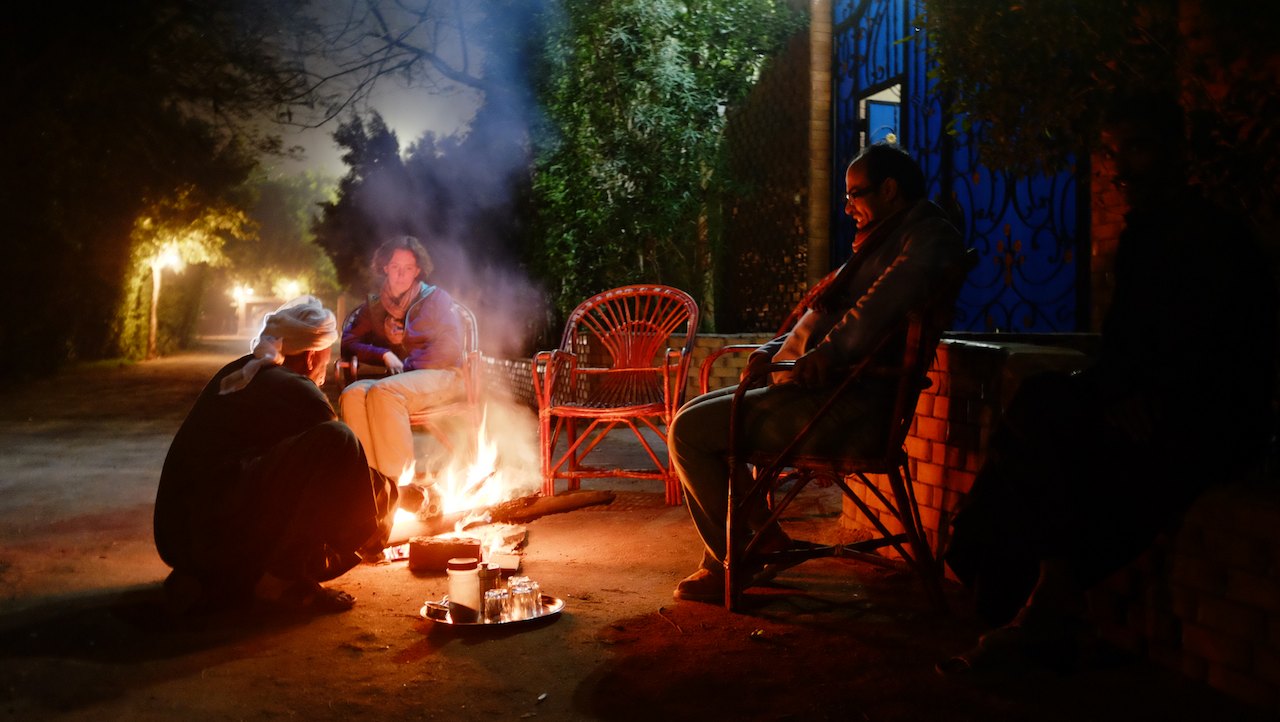
We ended up staying two more days at the campsite in Giza. We relax in the garden, call home using Skype, enjoy home cooking in the outdoor kitchen by the pool and enjoy the delicious food cooked by Helal. Above all, we enjoy the beautiful view from the rooftop terrace of the pyramids and also the many minarets, the donkey carts in the street, the pigeon fanciers with their flags, street dogs that run after a cyclist and the sunset over the desert.
A great week at a great place we intend to visit again!
Distance to Giza : 5,913 km (3,675 miles)
Last edited by -Leonie-; 27 Sep 2014 at 21:41.
|

2 Oct 2014
|
|
Registered Users
HUBB regular
|
|
Join Date: Dec 2009
Location: The Netherlands
Posts: 66
|
|
|
Ride through the desert
From Cairo there are different routes we can take to go south: along the Red Sea coast, along the Nile or through the Western Desert. We do not take the road along the Nile because it is too crowded and we will probably ride along the Nile for some time after Luxor. The route along the coast brings us to the beautiful beaches of Hurghada, but the chances that we will go there some day are quite good. That might be different for the desert. In the guest book of Isis Garden Camp we read that the oasis route through the desert and especially the “White Desert” was one of the highlights of Egypt for several overlanders. Sue and Helal also are very excited about the desert landscape. With the map of Egypt on the table Helal points us to places of interest and places where we can get fuel, wood and water. He also shows where we can bush camp in the desert. We would really like to sleep under the stars, so we store enough food and water to camp several nights.
The first place we go to is in the “Black Desert” at about 20km from the Bahariya oasis and about 400km south-west of Giza. A fairly long journey, so the alarm goes early that morning. It is still nice and fresh as Sue and Helal wave us goodbye (in their thick winter coats).
On the road it is pretty busy, though it is questionable whether the traffic is ever calm in Cairo. We drive from Giza to ’6 October City’, another suburb of Cairo. With a full tank, we then head towards the Western Desert Road. Just outside the city there is still some industry and hence a lot of big trucks, but once the buildings stop we are suddenly in the middle of the desert and almost the only vehicles.
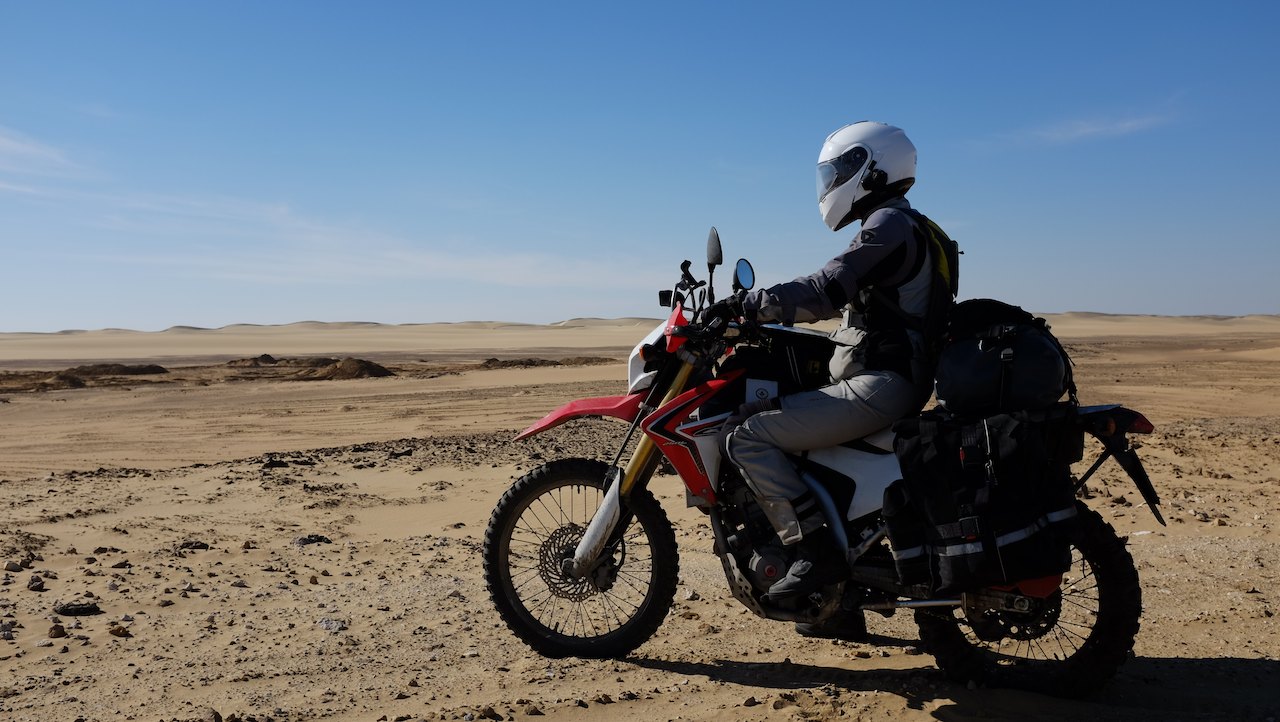
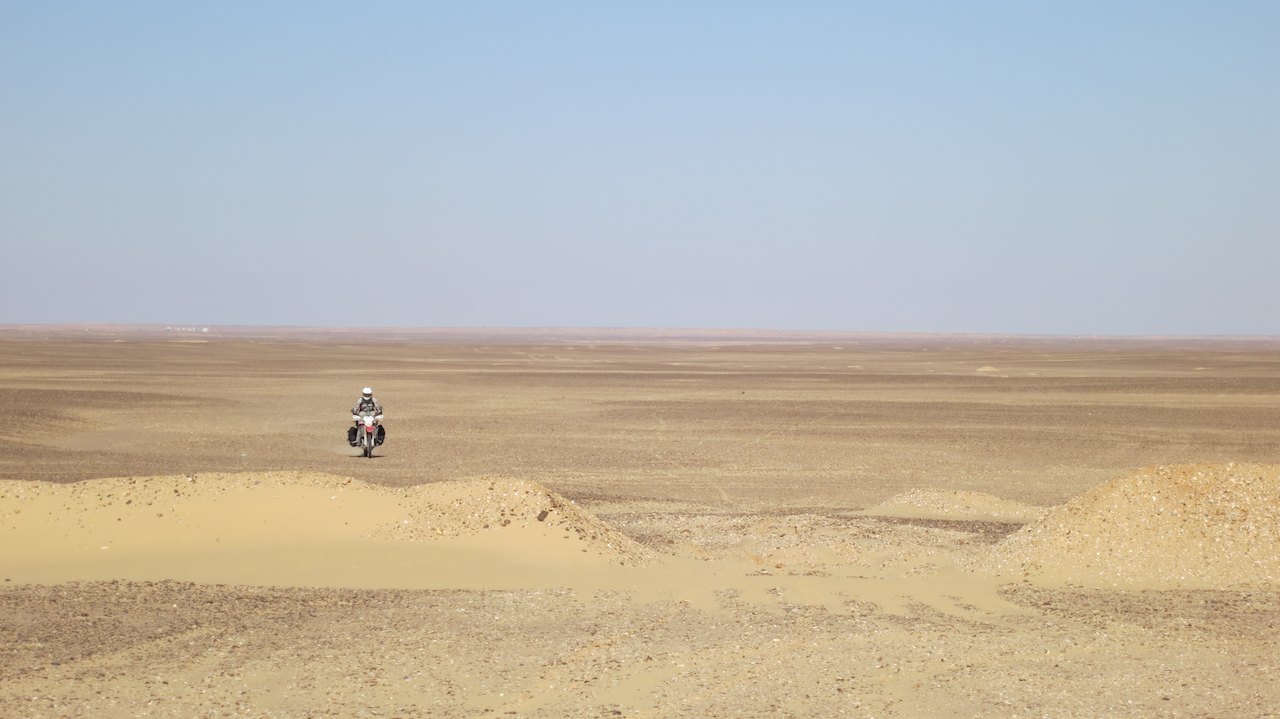
We had prepared ourselves for some hot days in the desert and had left off our sweaters this morning. Although the sun is shining brightly, the wind is still pretty fresh and we both have our heated grips on for the first part of the day. Until the Bahariya Oasis there are no villages and there is only one gas station. Because we do not know when we can get fuel again we refuel both bikes. The only buildings that we see from there on are telephone poles, bus stops and the occasional abandoned office of an oil company. Every hour we only pass a handful of cars.
After more than 350km we can do some last minute shopping in Bawiti, the largest village in the Bahariya oasis. The closer we get to Bawiti the more vegetation we see along the way. Palm trees, low bushes, but also fields of corn. It is also busier on the road with cars, donkey carts and mopeds. Along the side of the road we see the first signs for hotels and restaurants. Bahariya Oasis is easy accessible from Cairo and is therefore often visited by tourists who will stay a night or two in the desert. Once in the village it is clear that they are accustomed to tourists. When we stop to take fuel people come towards us from different sides to offer us a room in their hotel. We thank them kindly and drive out of the village at the end of the afternoon.
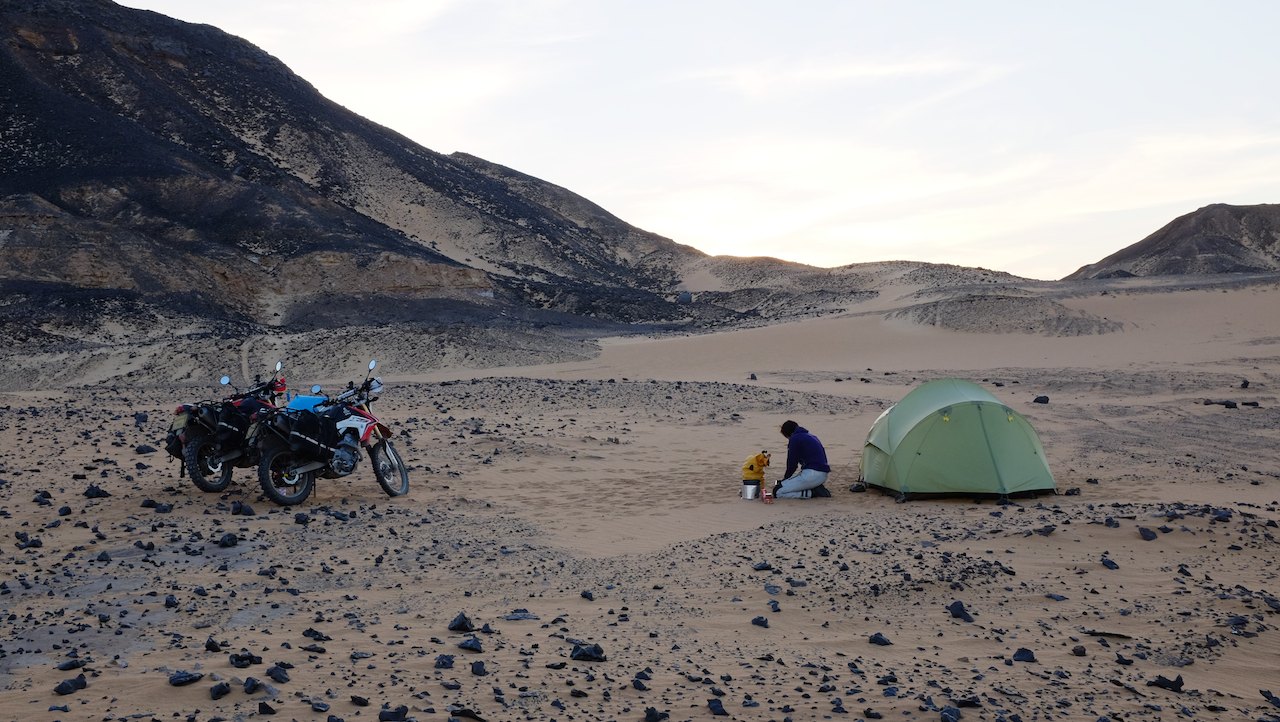
The desert is not as flat as earlier in the day. There are large pointed black hills, like small volcanoes everywhere. The ground is strewn with jagged black rocks and give this part of the desert its name “Black Desert”. On both sides of the road we see tracks disappear into the desert and when we see no other traffic we turn right. The gravel road turns into a sandy path that leads into the desert. We find a beautiful spot not far from the road, but completely out of sight where we set up our tent on a sandy plane. At dusk we get out the cooking gear and by the time the pasta is ready we sit down to eat in the light of the nearly full moon. The moon gives so much light that we do not even need a flashlight to find our stuff.
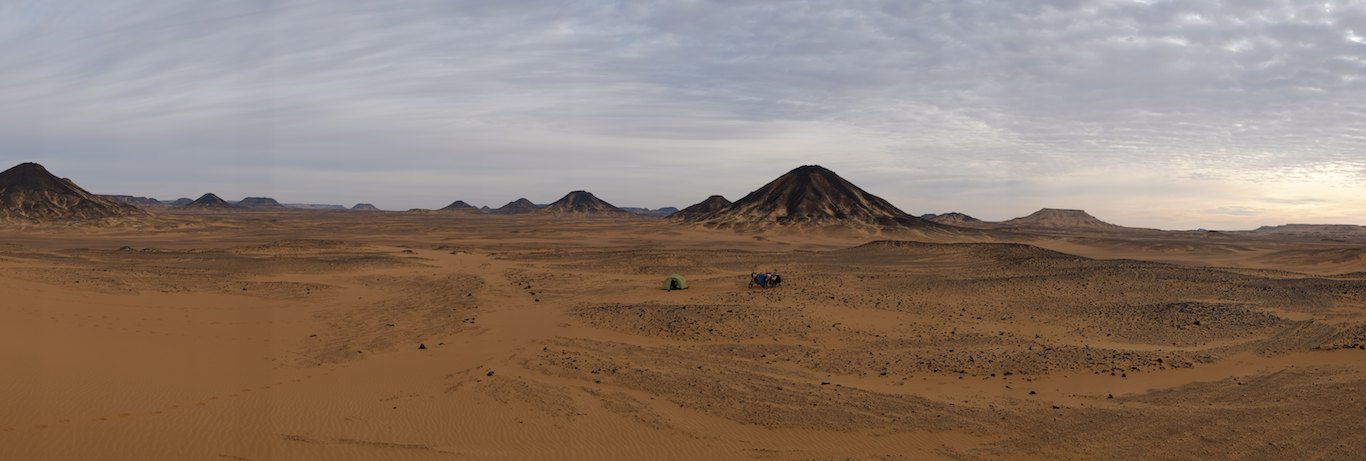
The rest of the evening we lie on our backs looking up at the stars. Even though that evening is not so long, because around 20:00 we both can only just keep our eyes open so we crawl into our sleeping bags. It is quiet, very quiet! The are no background noises, we hear no cars, no dogs, no highway or planes, no wind, nothing. Maybe this is what they call ‘deafening silence’.
In the middle of the night Peter suddenly wakes me up. He hears something and thinks that someone is walking on flip-flops towards the bikes. That is about the only thing we do not want. We both listen for a while, but hear nothing. Then it turns out that Peter woke up from the sound of his beard against the sleeping bag and his own heartbeat!
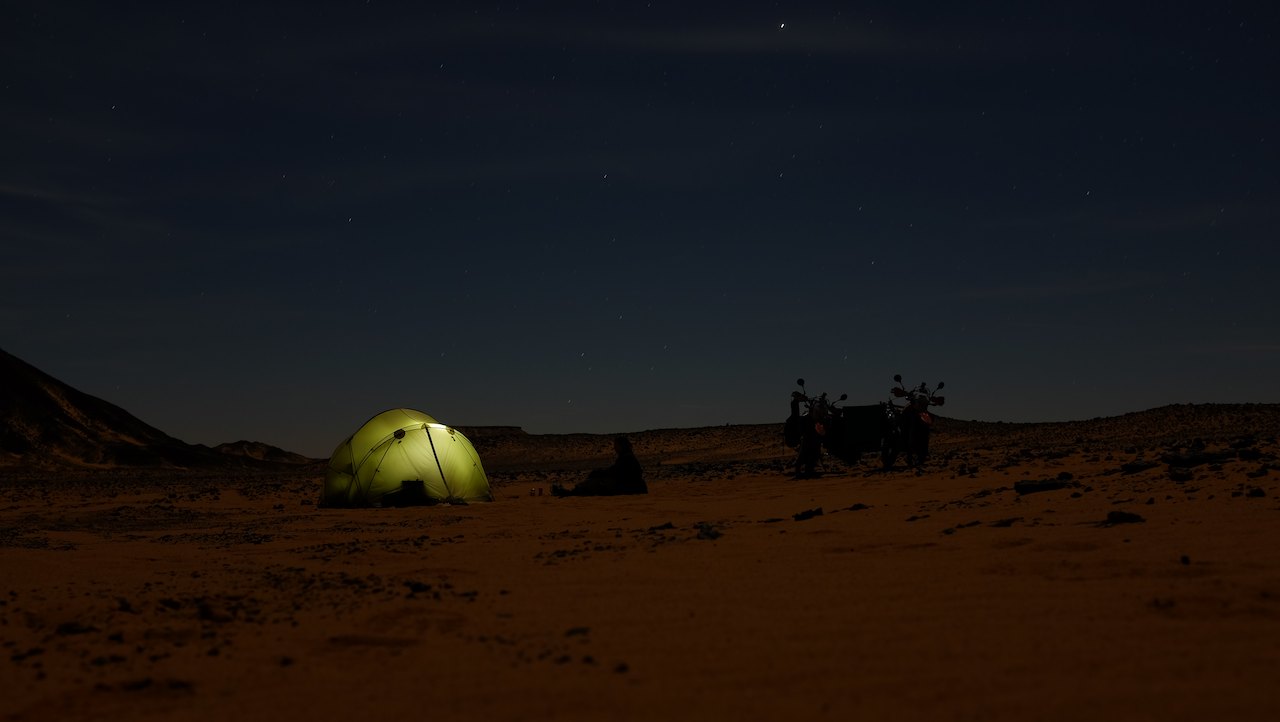
After an otherwise quiet night, we make coffee at first light and take our time to eat breakfast. This evening we want to go to the “White Desert” which is only 100km away. We only want to look for a camping spot at the end of the afternoon (to reduce the risk of unexpected visitors) so we have the whole day to cover that distance. We pack our stuff, ride over the black stones and through the sand back to the main road and then continue south.
All along the route are several police checkpoints where we are asked to stop. In a log our names, our nationality and the number of our Egyptian license plates are written. In addition, the policemen want to know where we are going. The further we enter the desert, the more checkpoints we encounter. There is little traffic on the road and the officers seem pretty bored. When we slow down for the bumps just before the checkpoints they suddenly wake up and come running out to stop us. Some still in their underwear holding a toothbrush in their hand.
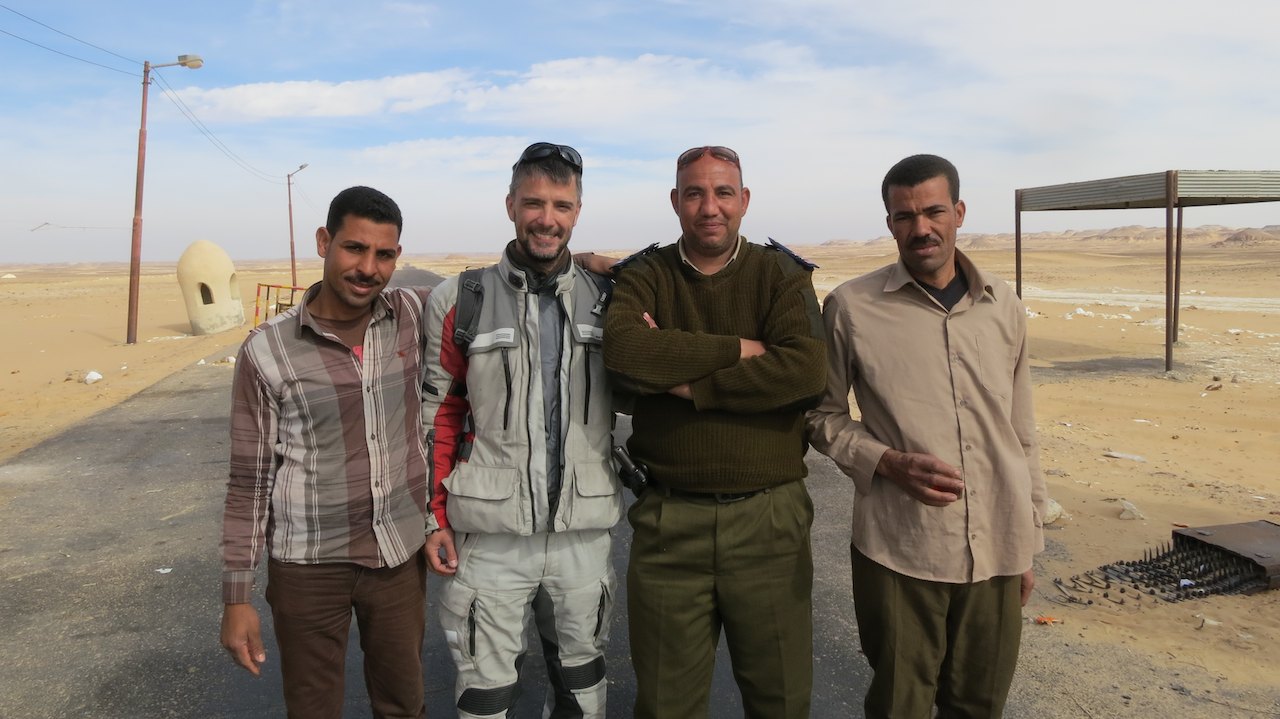
A friendly “Salaam Aleikum” from our side, is answered with a warm welcome to Egypt. They ask if we are married, whether we have children, whether we were afraid in Libya, what we think of Egypt, how much our bikes cost and much more. We are often invited for tea. Although we usually friendly decline, today we decide to stop, this to the delight of the agents. We have plenty of time and we would like a cup sweet mint tea. Despite the language barrier, we make a friendly chat. After the delicious tea and some pictures they call their colleagues at the next checkpoint to tell them that there are two “Hollandi” coming. At the next checkpoint, they are already waiting for us. Not for the formalities, but also for a chat and photos of the bikes.
In El Heiz, a village in a small oasis between the Black- and the White Desert, we stop to buy wood. Helal had told us exactly where we could find the wood and also told us what we should pay. Once in El Heiz we find the teahouse next to the police station, but unfortunately they do no have any wood. One of the villagers asks us to follow him because he does have wood. Not much later, we drive out of the village with on the back of our bikes a large pile of wood for a camp fire. Great!
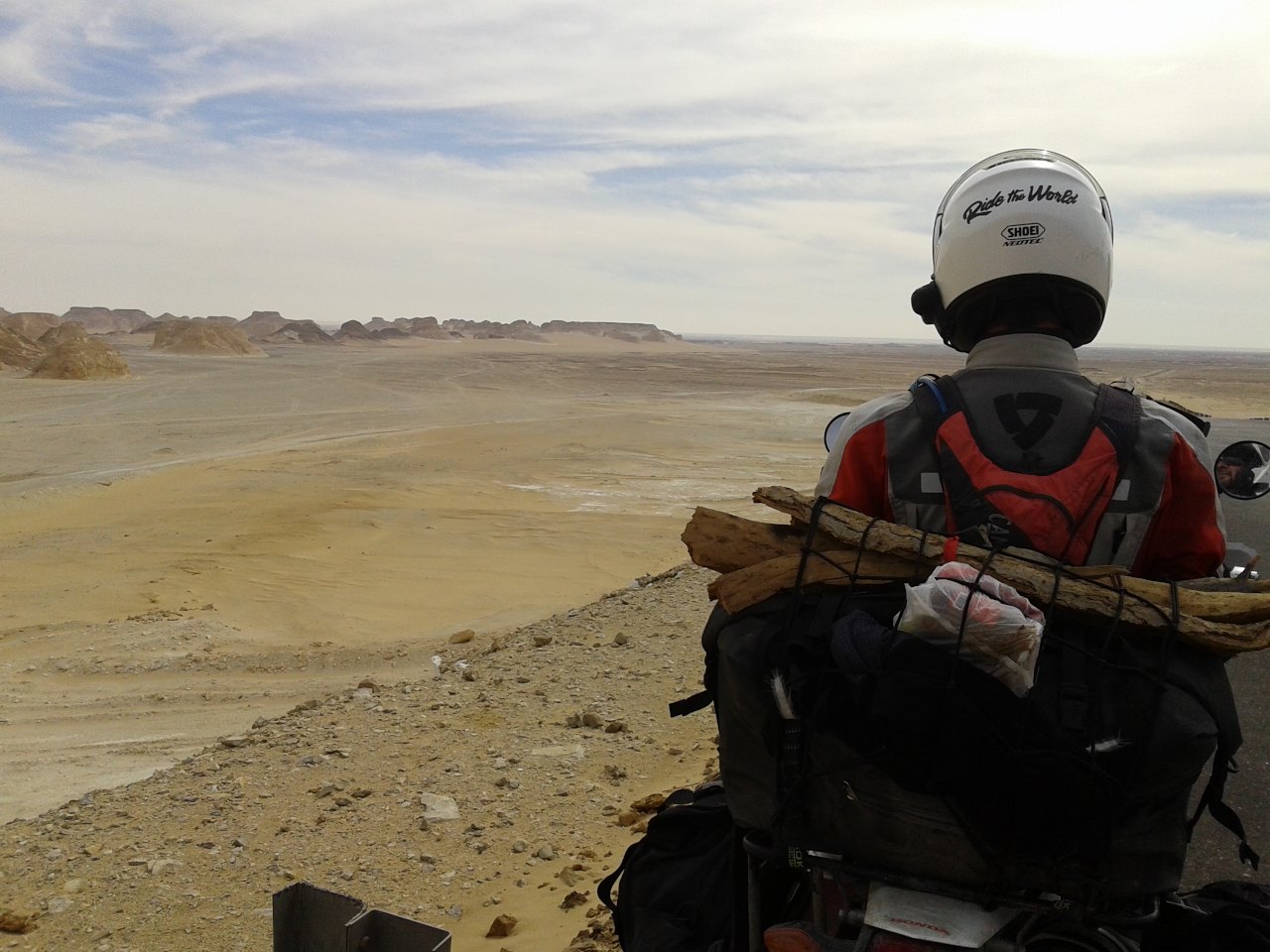
The desert changes as we drive through the sandy hills. We have left behind the black tops and the color of the desert is now brown again. At the top of one of the brown hills, we suddenly have a beautiful view over a white valley, the beginning of the White Desert! To the left of the road we see jagged white peaks and a dirt road that runs in between them. This appears to be a great place for lunch.
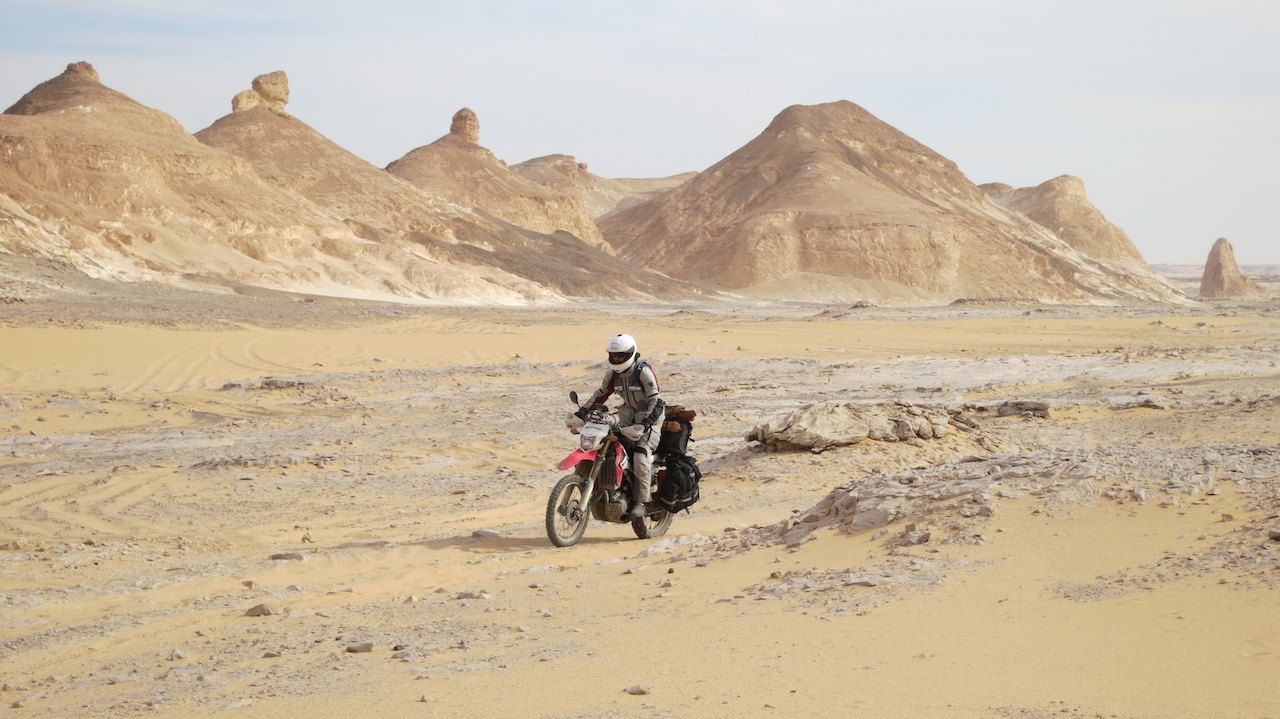
The Western Desert Road then leads us further into The National Park White Desert. As far as the eye can see, there is a white plain with small white pointy hills in all kinds of special shapes.
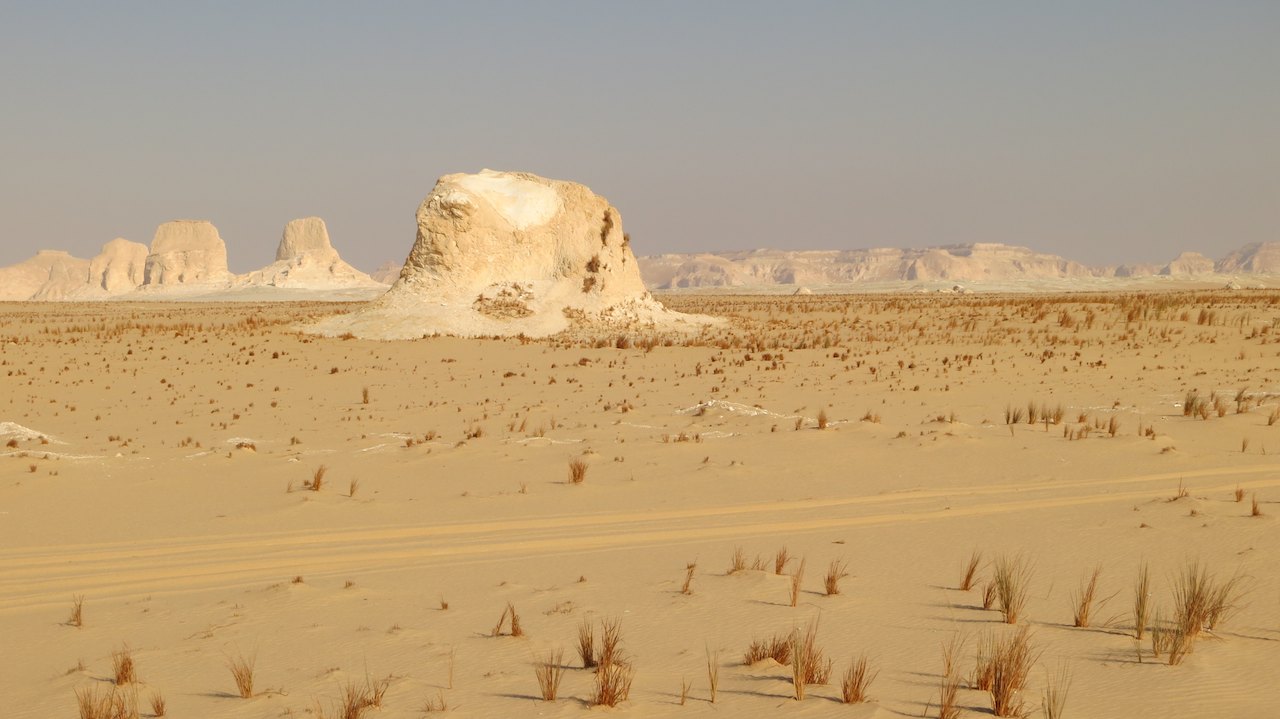
At the end of the afternoon we leave the main road to find a place to camp. After some climbing we see a nice place at a slightly higher plateau which we can also reach with the bikes. It appears to be a super place with a nice view over a valley with white turrets. Everywhere we see small black dots on the white ground. It seems we share the platform with goats or rabbits. If we look closer the dots however appear to be fossilized coral. The stones we have most beautiful forms. Incredible to think that this barren desert once was an ocean.
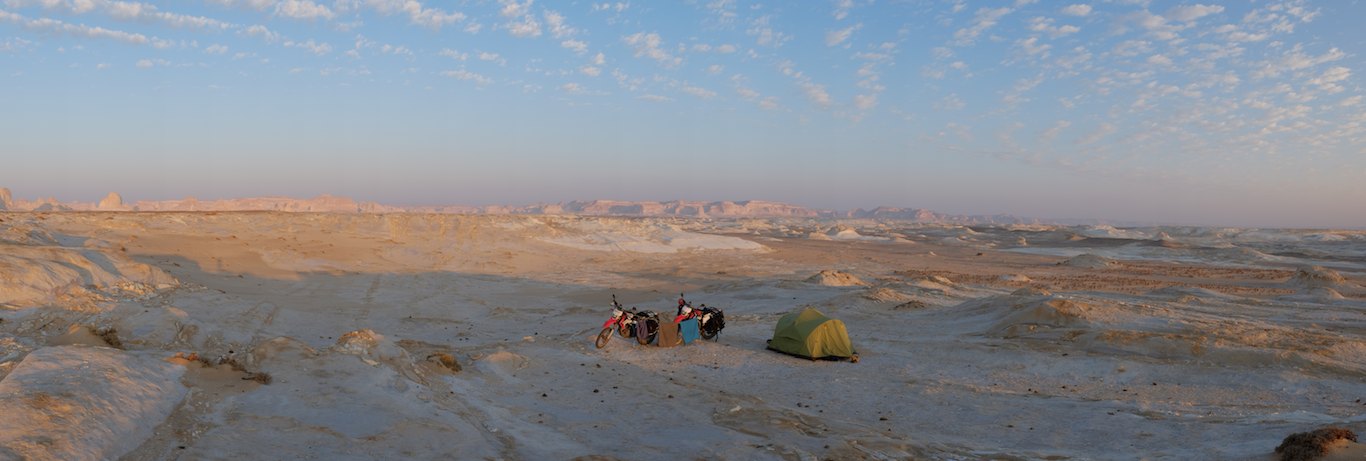
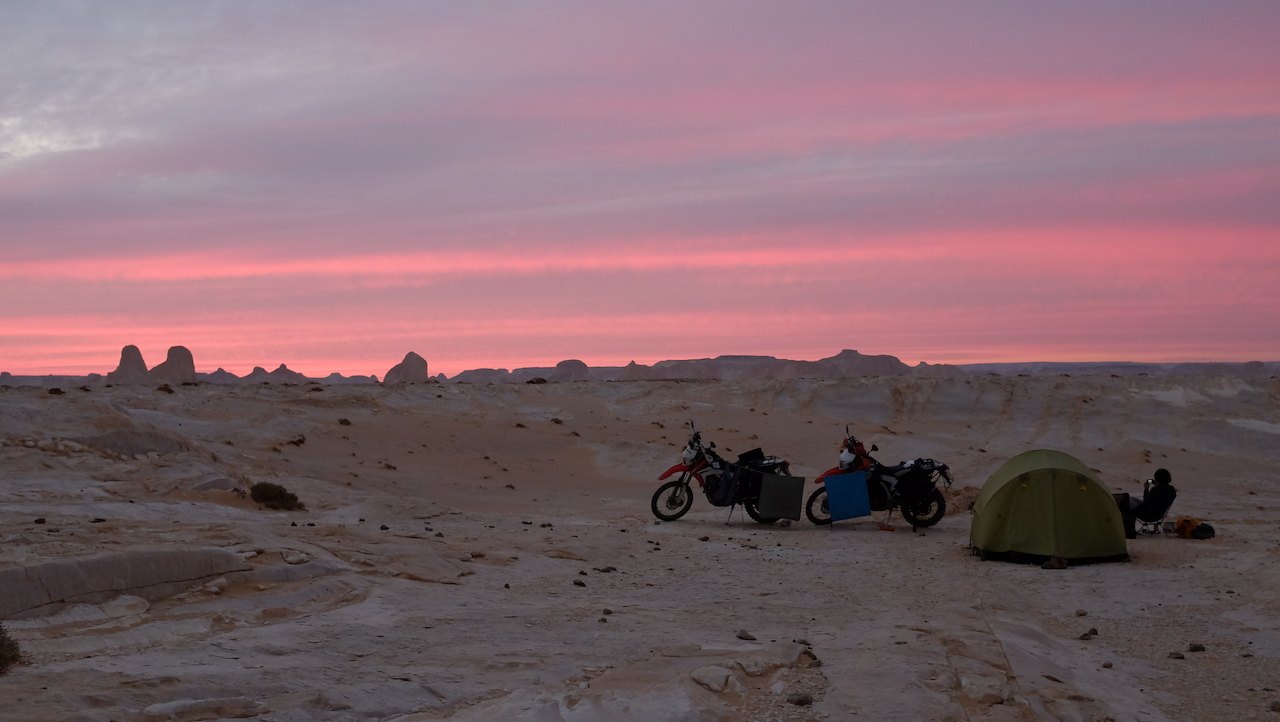
Against a bright pink sky we eat a large plate of pasta. After dinner we make a camp fire and we continue to look at the stars until the fire is out.
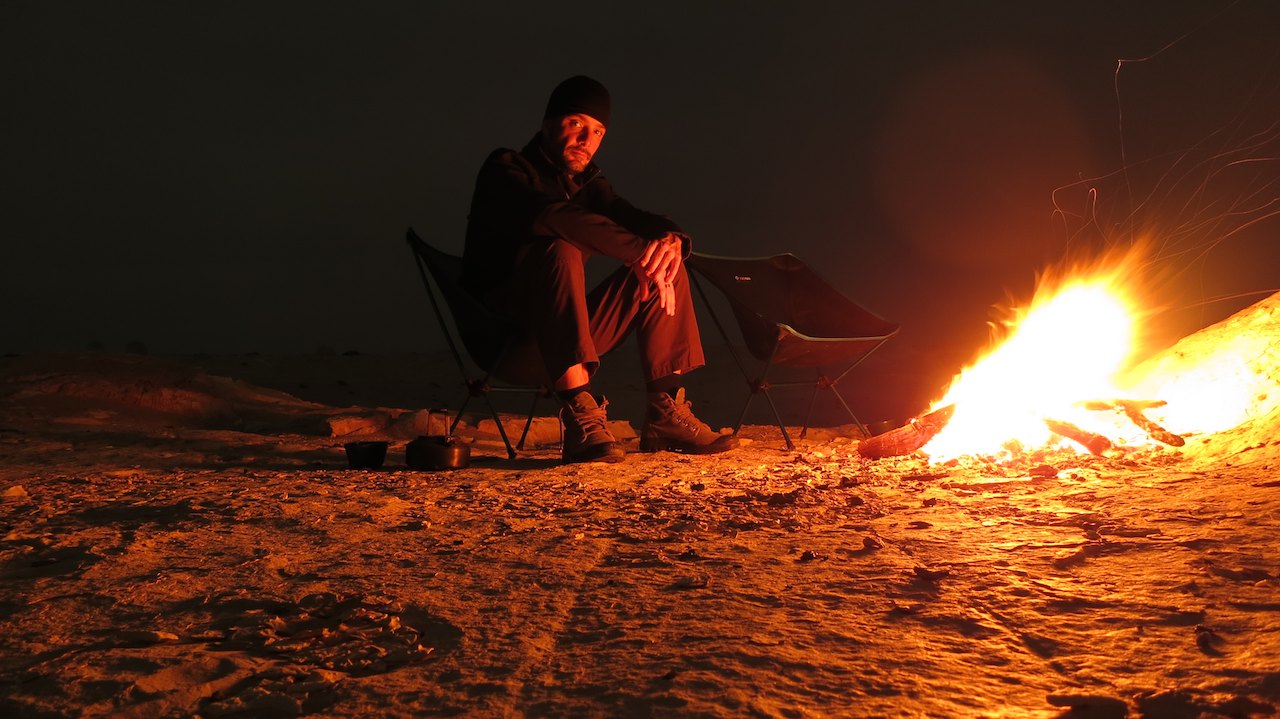
The next morning we drive through the White Desert into the Farafra Oasis. We buy food, drinks and fuel and also get freshly fried falafel for lunch.
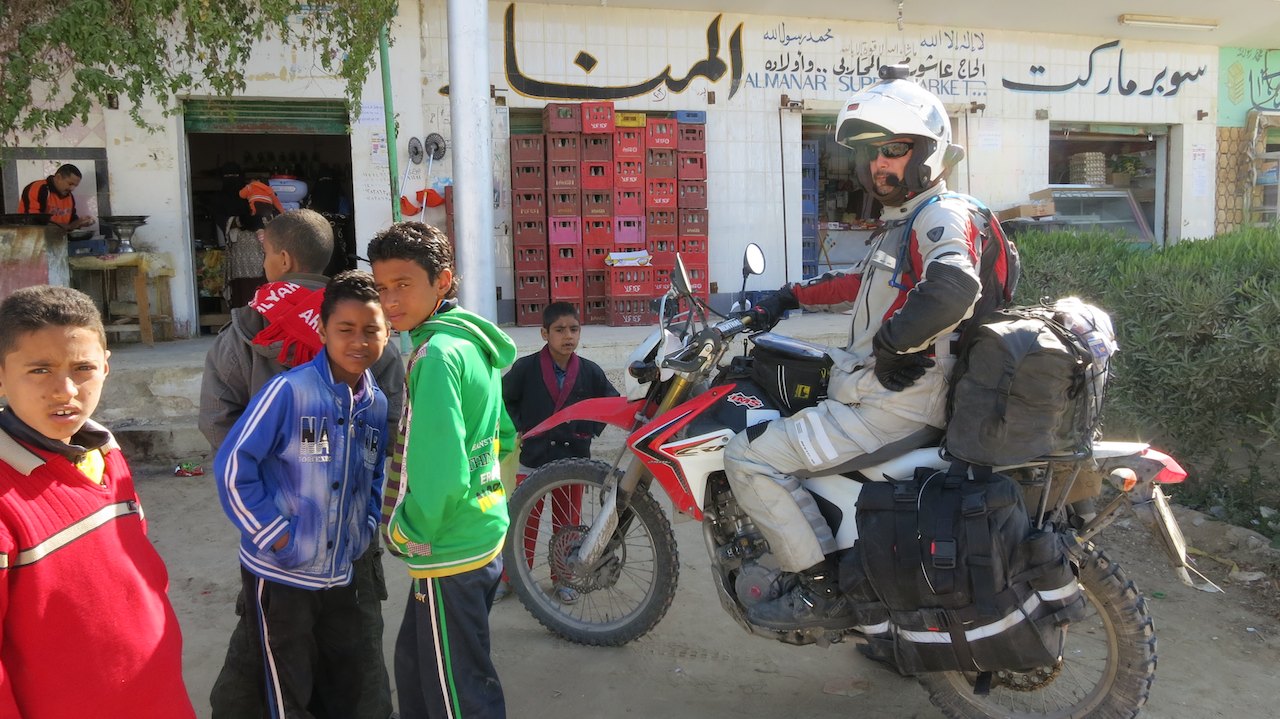
Today we will go to the Dakhla Oasis about 300km away. In El Qasr there should be some hotels. Apart from the police checkpoints there is nothing much to see along the way. We have left the White Desert behind us and have now swapped it for a big yellow plain. All around us we only see sand. We both listen to music through our intercom and only stop at a nice spot to eat our falafel. It is now quit hot and as we can not find any shade, so we quickly eat lunch and get on the bikes again to enjoy the riding wind.
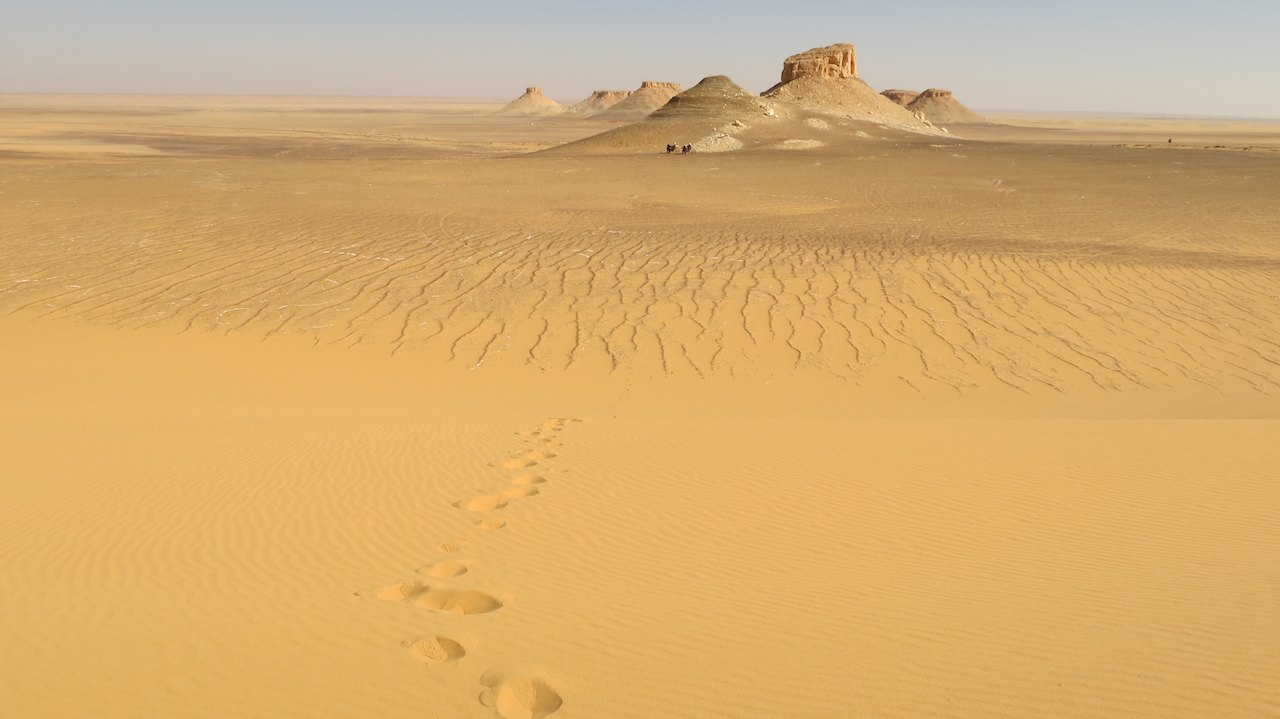
Along the way, we do not see much traffic. If we encounter cars or trucks, there is always a hand sticking out the window to say hello. Some come up to drive next to us to call from the window “Welcome to Egypt!” Others even stop to give us water and oranges. We drive with our light on and that is not common here, so oncoming traffic keeps signalling us with their lights. If after a while we do turn off our lights, everyone continues to signal us. So it was to say hello too.
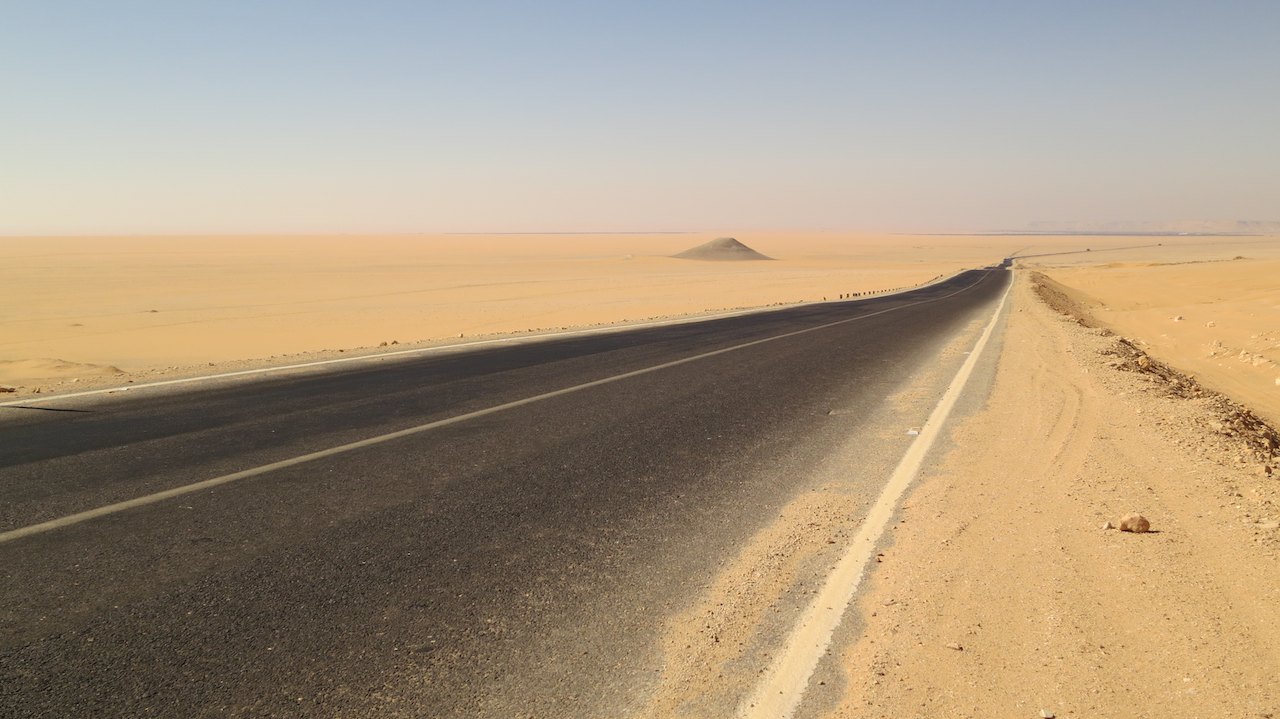
Half way to the Dakhla Oasis we are approached by another two cars that are again signalling their lights and the drivers are also very busy waving at us. As we get closer we see that they are two well equipped overland trucks! We stop, turn around and drive back to stop alongside the cars that are now also by the side of the road. Just like that we meet Susanna and Karl from Austria and John and Ruthi from Australia in the middle of the Egyptian desert. Overlanders that have been on the road for a while and are now on their way from Cape Town to Cairo. It is super nice to meet other overlanders, to hear their stories and to share tips. We are given the coordinates of a camp site in El Qasr and are advised to take a dive in the hotspring. After we have exchanged email addresses and have said goodbye to everyone we drive away with new energy about all the beautiful things that still await us in Africa.
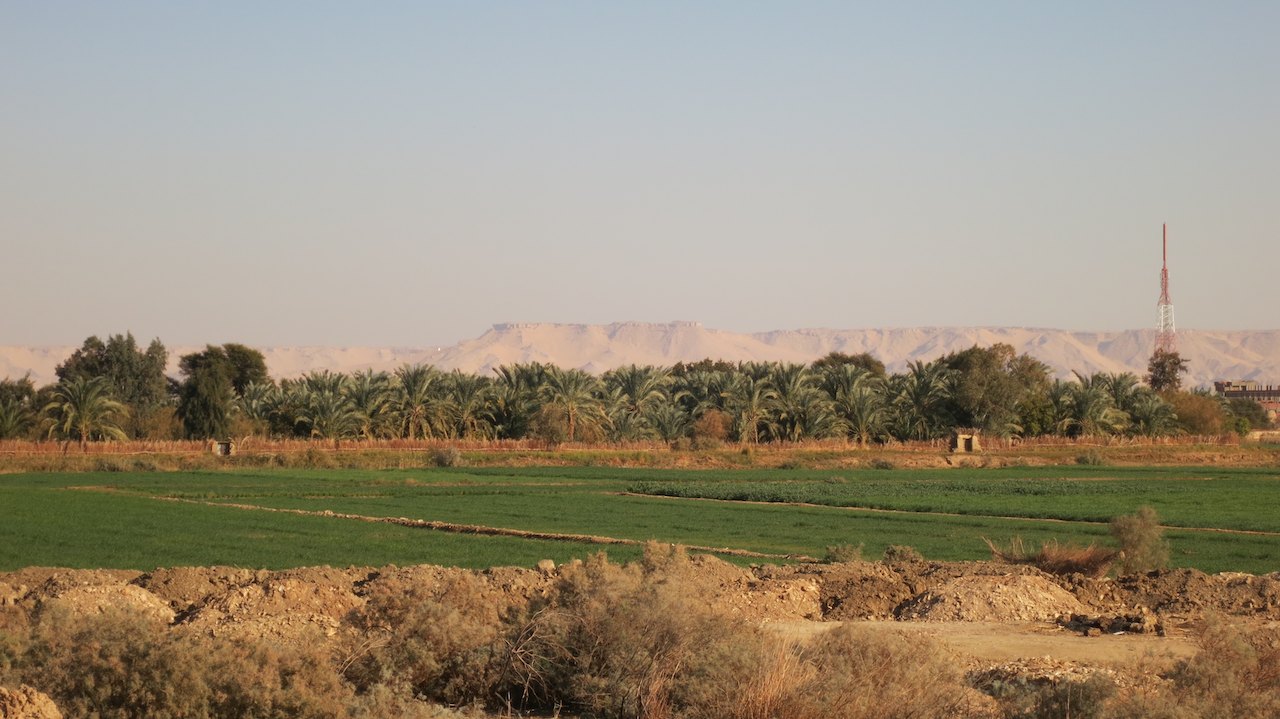
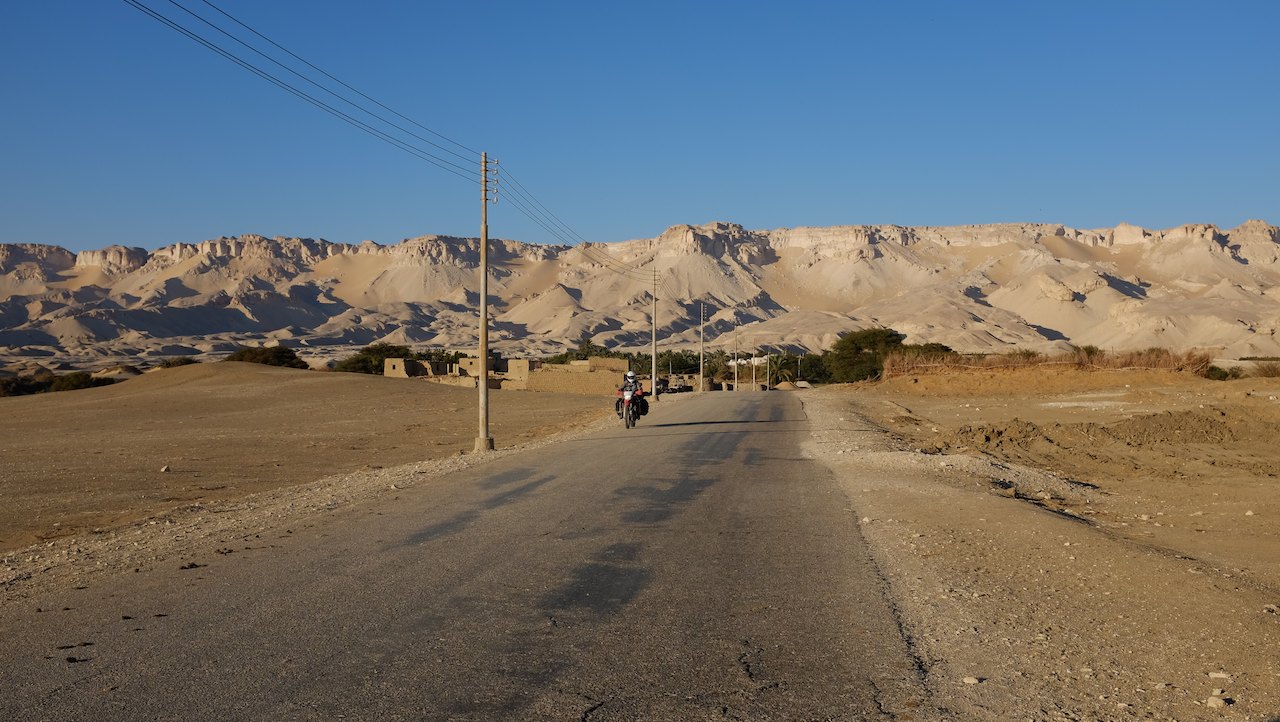
Using the coordinates Beir El Gebel Tourist Camp is found quickly. We are warmly welcomed by Hatem, a large man in a white jalaba. His three children follow him closely as he shows us the camp site and the rooms. The site houses traditional buildings made of mud brick that are painted in cheerful motifs. Although we could set up our tent, we choose for a little more luxury after two nights in the desert and take a room.
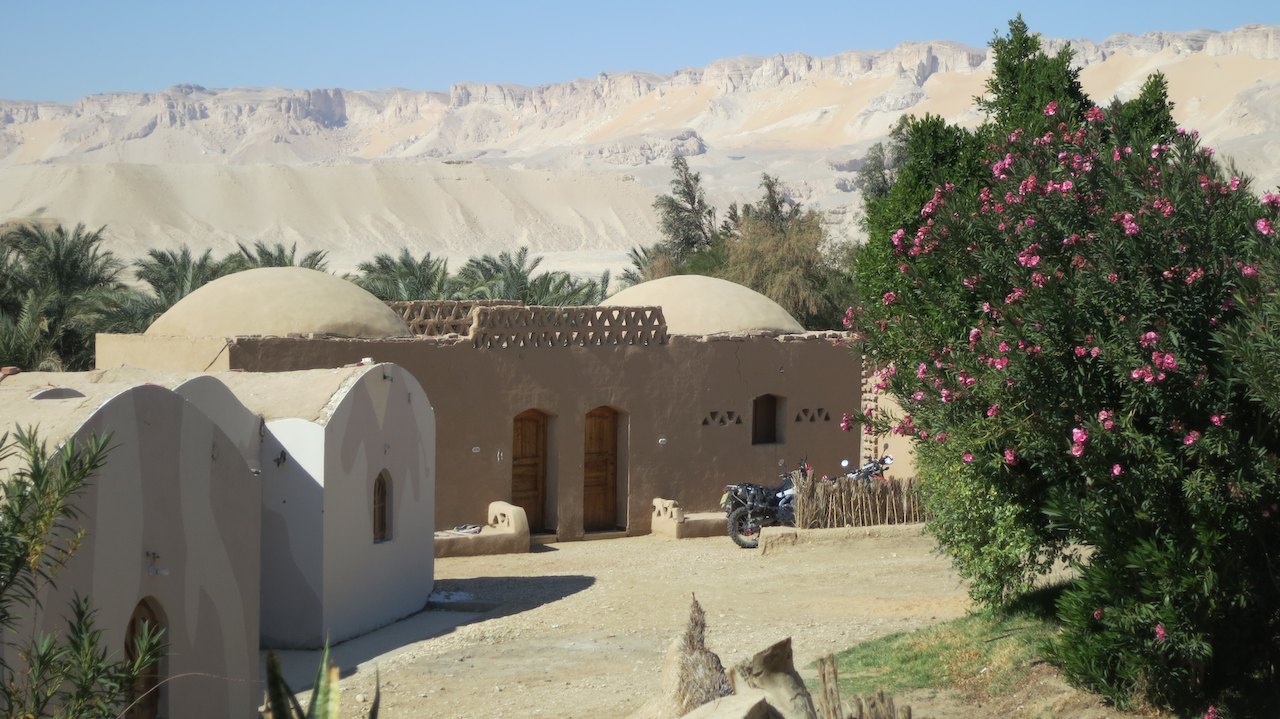
That evening we eat fish from the Nile (600km away) and we meet Friedel, a German lady who lives in a house behind the camp. About 25 years ago she traveled with her husband in a car through Egypt and the Egyptian desert (at a time there was no asphalt and GPS did not exist). She was touched by the Dakhla Oasis and had always said she would try to go back. And that is what she did. Eight years ago they bought a piece of land and had them build a beautiful home. She now lives in El Qasr for five months each year. During that period she also receives tourists for meditation, dance and drum workshops. The perfect place to get away to relax.
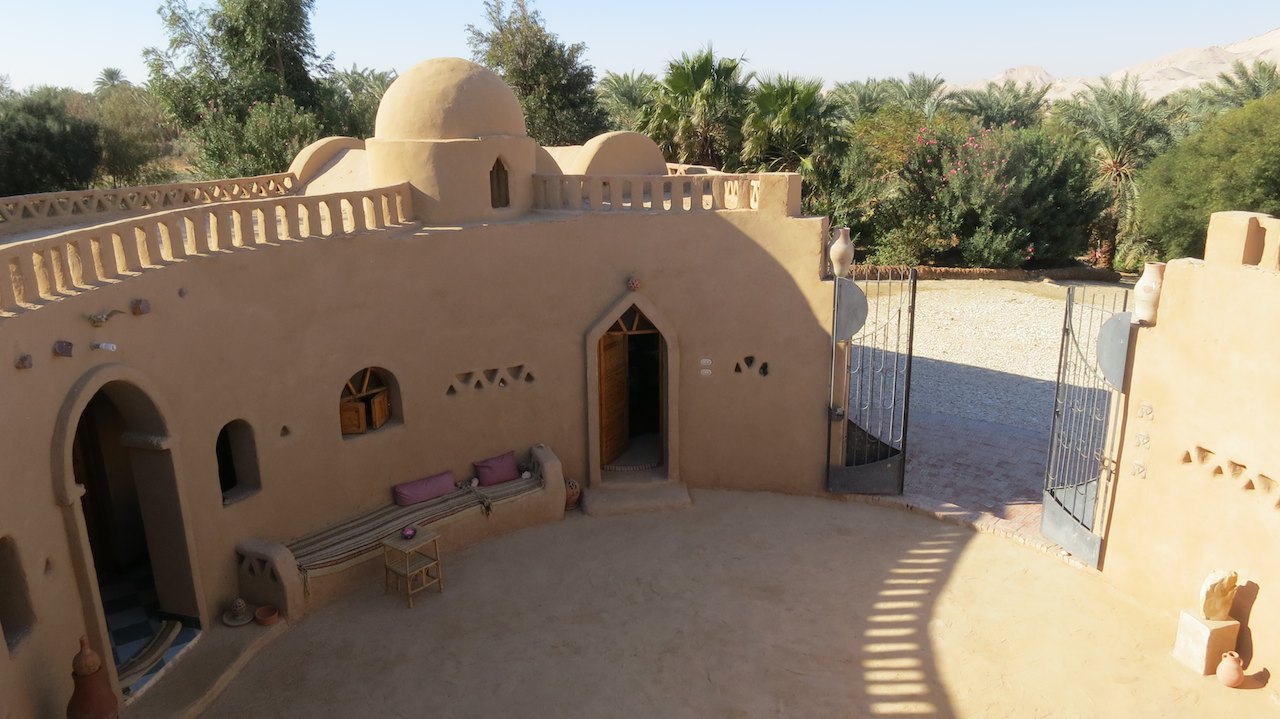
After the delicious fish, we take a dip in the hotspring. A year ago, Hatem, Friedel and some local farmers had a well made. The source is hot water of about 38 degrees! The water has been used to turn part of the sandy desert floor into green fertile farmland. If the water does not go to the fields, the hotspring can be filled. When Hatem opens the tap the water roars into the tub. The water contains a lot of iron and smells funny, but it is delicious and very hot! We wash off all the desert sand and float under the stars until our fingers wrinkle.
It is such a nice place that we decide to stay two nights. In the garden we can read in the shade at ease, surf the net, update the blog and Skype with our family back home. That evening we again enjoy a delicious meal and talk with Friedel about her life in the desert. Later that evening Hatem, his wife and their three children join us. Hatem happily smokes his shishah while he asks us about the journey, the route and the bikes. We become friends on facebook and show him our blog.
Before we leave the next morning, we get a tour through Friedel her beautiful home and garden. Truly a very special and beautiful place, especially when you consider that they bought an empty piece of dry desert land where now is a little green oasis. It was a special meeting that we remember with great pleasure and a place that we might visit again.
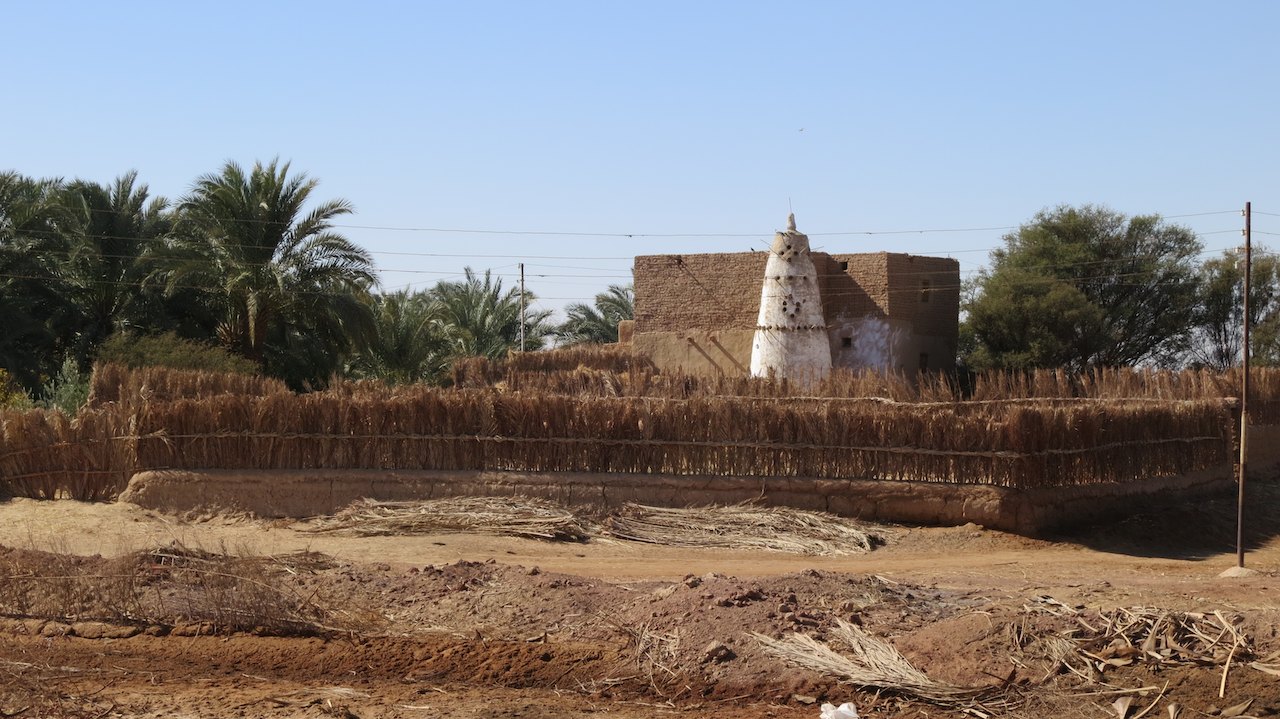
When we finally leave El Qasr our tanks our almost empty and we start by finding usable fuel. Until now we used ’90′ or ’92′, but that is not readily available on the desert route. Most gas stations have only ’80’, which is fine for the 40-year-old cars the Egyptians drive, but not so good for our 2012 Hondas. At the advice of Hatem we take a little detour, where we indeed find ’92’ to fill our bikes. With a full tank we drive through the Kharga Oasis towards Baris (also known as Paris).
On the map Baris seems like a big town. At several police checkpoints on the road we are told that there will be a hotel there. At the end of the day we drive into Baris and before we know it we drive out of Baris again at the other side of the village. It is smaller than we had expected and we did not see a hotel yet. We stop and soon there is a large group of men around us. We ask for a hotel or camping. They look worried and point us to Luxor (300km away) or Kharga, where we just came from. After heated discussions the men find the solution: at Dush Temple we should be able to camp. The men call some boys and order them to take us to the road that leads to the temple.
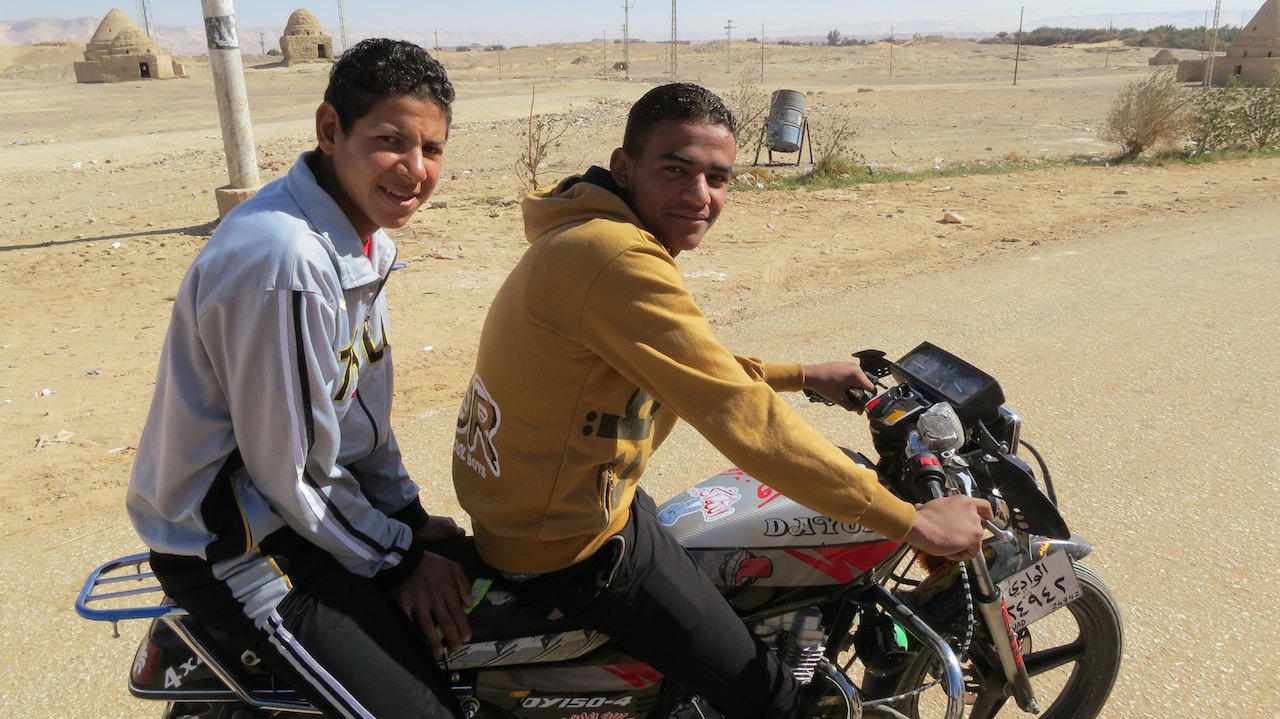
We follow the group of guys on motorbikes to the edge of the village. They stop and point: if you follow this road for another 10 kilometers you will arrive at Dush Temple. It is around five o’clock and the sun is almost setting. We quickly continue to avoid having to drive in the dark. After 10 kilometers we reach a fork. There is a sign but we can not make sense of the Arabic text on it and we have not seen a temple yet. Now what? A truck stops next to us and the passenger asks: “Dush Temple?”. We nod yes and he gestures us to follow him. After a kilometer the asphalt road stops. On the top of a hill we see some ruins. The man who spoke to us earlier gets out of the truck and introduces himself as “Magdi, guard of the temple.”
The temple complex is examined by French archaeologists from October to December. The team then stays in the houses next to the temple. The archaeologists are now gone, but the site is still under constant surveillance. Tonight is the turn of Magdi and Ahmed. They show us where we can put up the tent and invite us to their campfire.
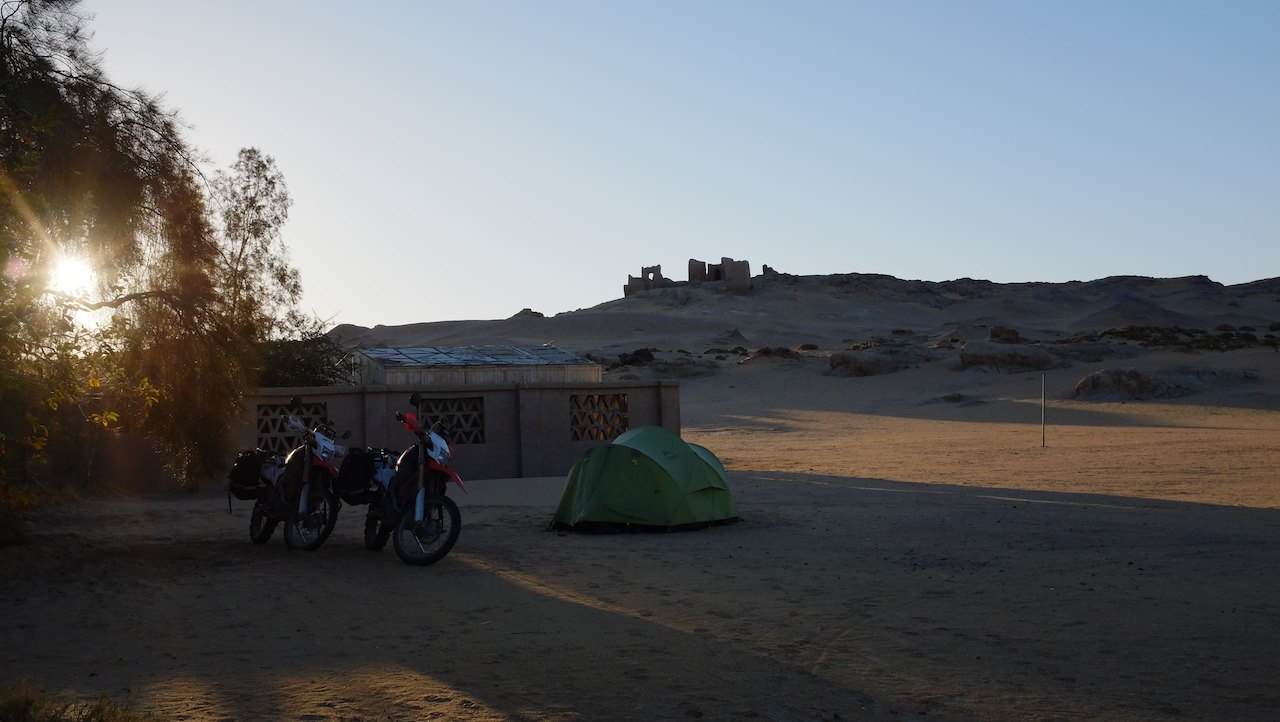
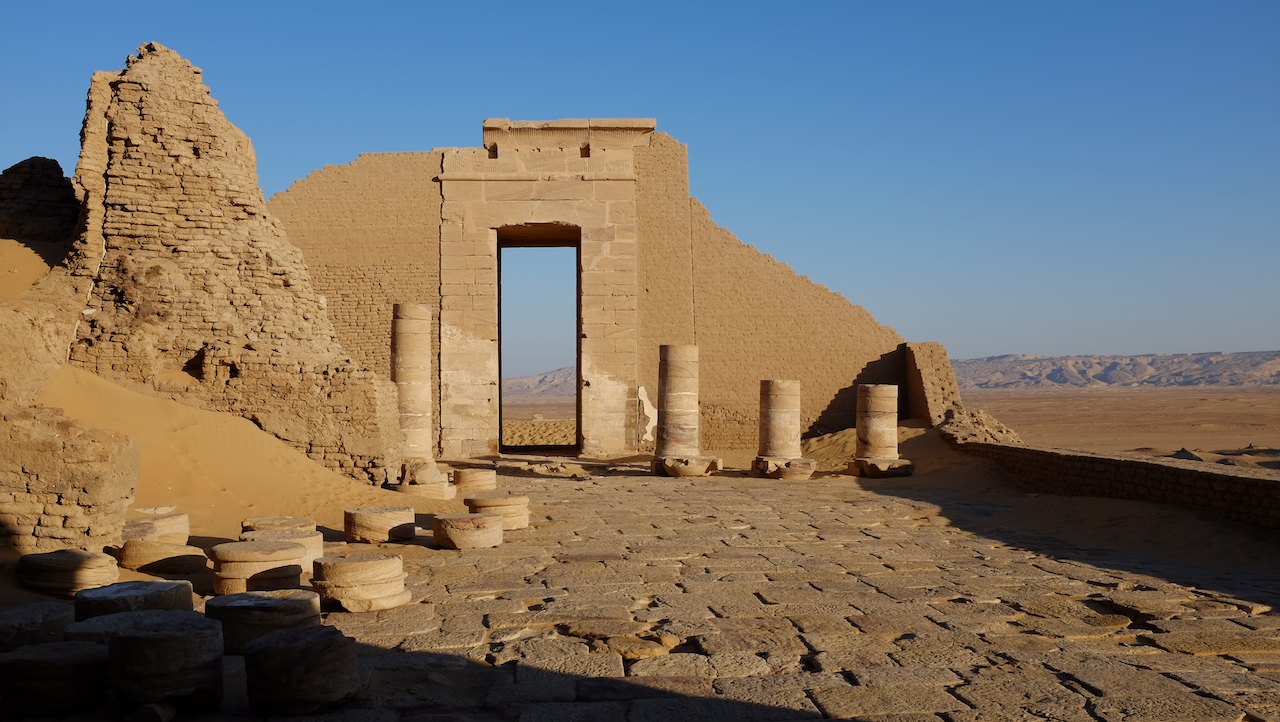
After the tent has been put up we take our cooking gear to the campfire so I can make pasta. Even before I open my bag, there are plates with feta cheese, tomato and bread in front of us. No cooking tonight.
Magdi prepares some sweet tea and pokes up the fire. With the little English they speak we fill the evening talking about their wives, their children, our journey, the French and the temple.
We ask where we can refuel at Baris and where we can buy bread. Again the worried faces. In Baris we can only get ’80′ and bread is only available very early in the morning. But they know a solution. Ahmed takes his telephone and says at the end of the conversation: “Do not worry, it’ll be fine.”
The next morning, Peter climbs up the hill to the temple for an exploration of the complex in the first sunlight. He makes some nice pictures. After we have packed the tent, we again join Magdi and Ahmed. Their fire is still burning and used to make new tea. They first light a cigarette while they are stretching and rubbing their eyes waking up. They played dominos for the greater part of the night and only slept for a few hours.
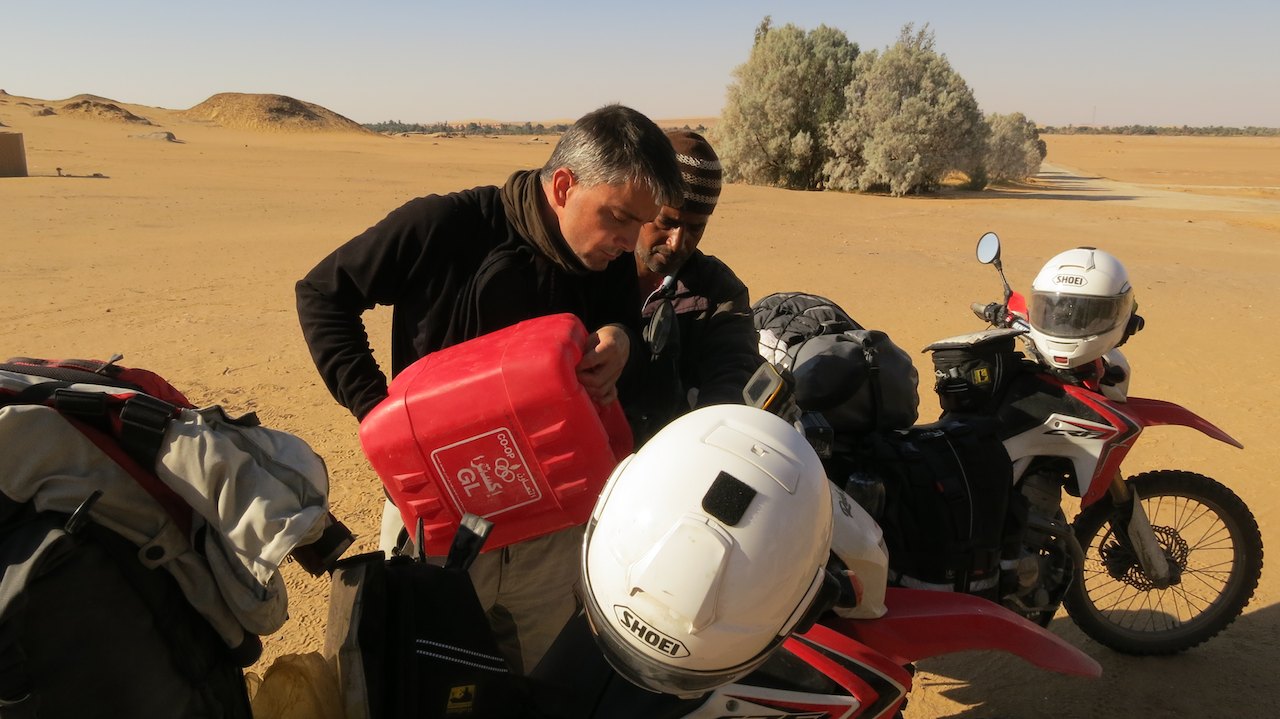
Just when the tea is ready we see a car approaching us. The man that gets from the car holds a 20-liter jerry can of fuel in one hand and a bag full of bread in the other. Ahmed called a friend in Kharga (100km away), who came to Baris the evening before to bring our fuel! We cut a water bottle and use the top of the bottle as a funnel to fill the tanks of our bikes. We pay for the fuel, the service and the bread and say goodbye to our new friends.
Distance travelled to Dush Temple: 7085 km (4403 miles)
|

4 Oct 2014
|
 |
Registered Users
Veteran HUBBer
|
|
Join Date: Jan 2006
Location: Yuma, Arizona, USA
Posts: 548
|
|
|
Egypt outside of the cities seems to be the place to be! Very warm people, it seems. I can guess they long for tourists just as tourists long for Egypt!
|

5 Oct 2014
|
|
Registered Users
New on the HUBB
|
|
Join Date: Aug 2014
Location: Temple, TX USA
Posts: 2
|
|
|
Thank you for the photos and update on your travels! I love reading the reports from travelers on smaller bikes!
|

5 Oct 2014
|
|
Registered Users
HUBB regular
|
|
Join Date: Dec 2009
Location: The Netherlands
Posts: 66
|
|
|
Ancient Egypt
We leave Temple Dush and drive back to the main road through the village of Baris. At the police checkpoint at the intersection we are kindly greeted. They had already recorded information about us when we passed there the night before, so after we have confirmed that we will directly go to Luxor today, they wave us through. It is Friday, the rest day for Muslims, and therefore very quiet on the road. Apart from a number of trucks we see almost no other traffic. The town of Baghdad is the last oasis on the route and after the police checkpoint there, we do not pass any other villages or checkpoints any more. On both sides of the road we only see a golden sand sea. There is a strong wind and we can only just keep our light motorbikes straight.
At the beginning of the afternoon we see a city looming in the distance. The end of the desert is in sight, we are approaching the Nile. From one moment to the other we drive along green fields, meadows with cows and fields of sugar cane. The transition from the dry desert to the green fields is very abrupt, as if a line is drawn in the landscape with a ruler. We drive along a canal towards Luxor. It is busy on the road. Most cars and donkey carts we pass are loaded with sugar canes. The canes are loaded on railroad cars that are waiting on a railway track that runs parallel to the road.
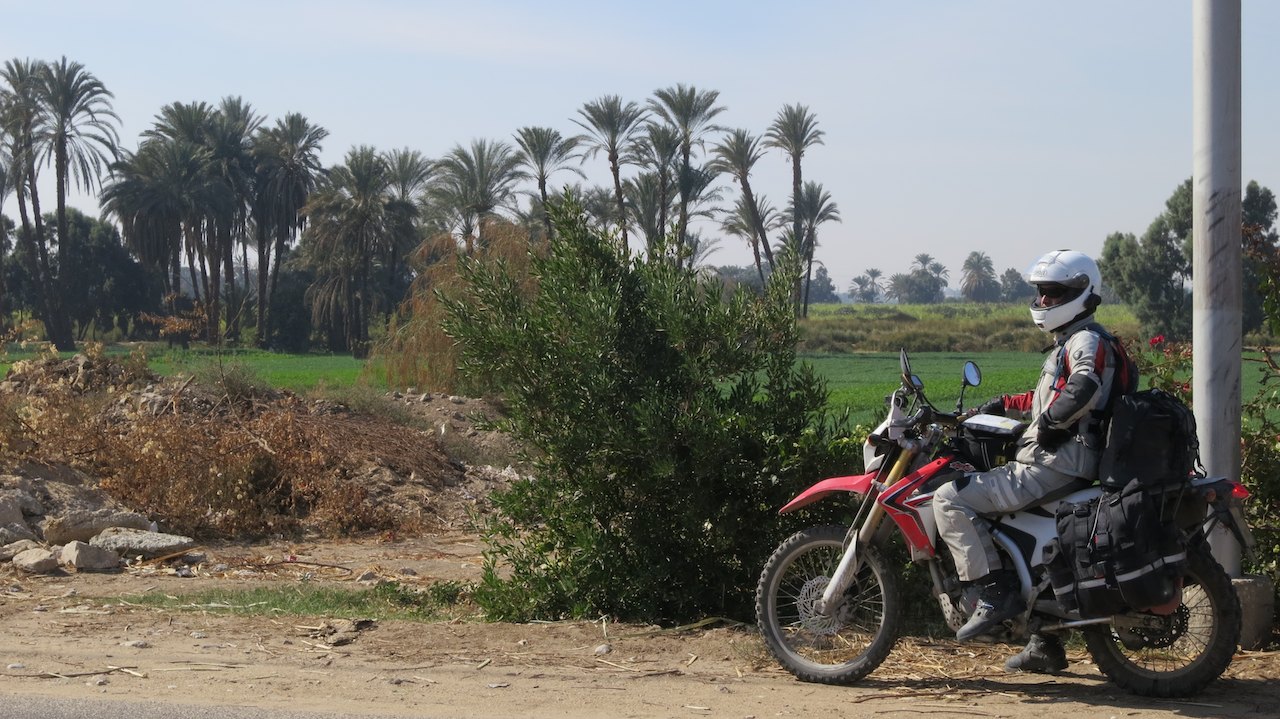
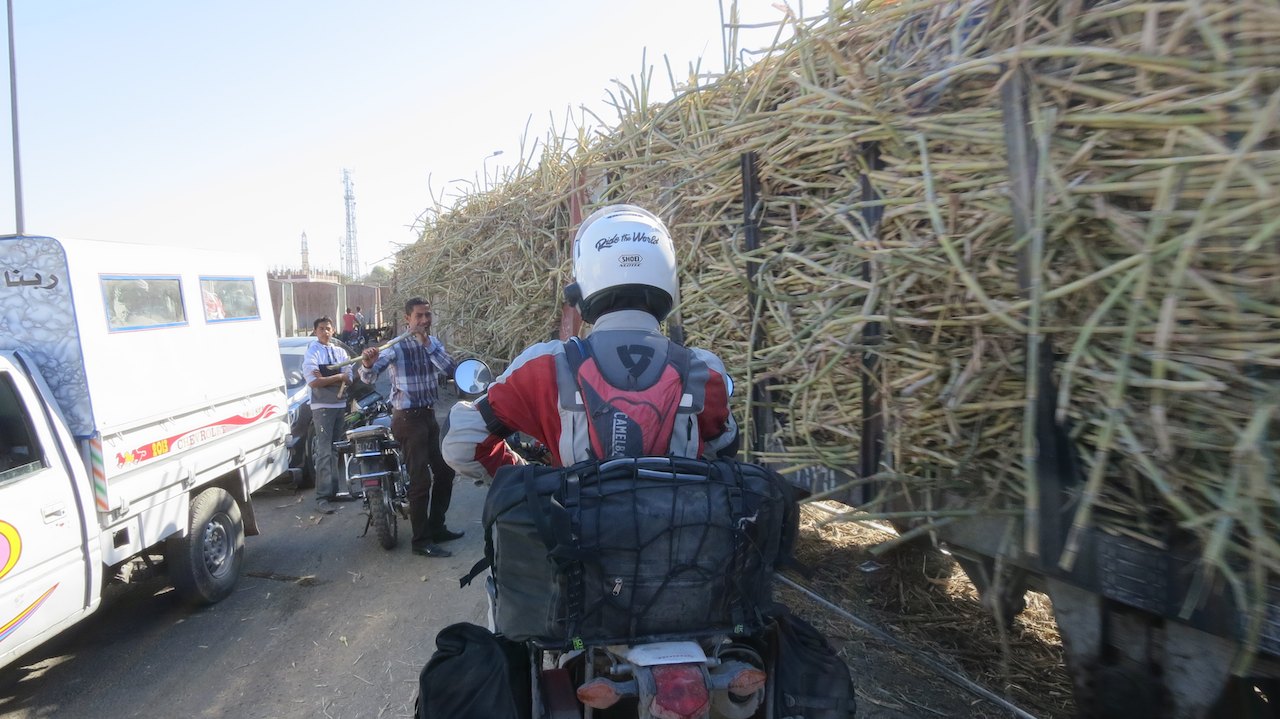
After we have driven along the canal for some time, we turn right and drive up a high bridge to cross the Nile. The river is extremely wide and has a strong current. Along the side of the river cruise ships are waiting for tourists to take a Nile cruise. We enter Luxor and immediately notice how clean it is. For the first time we see street sweepers that sweep all the trash into a green bin with a big broom. We drive through a ’green corridor’ with oleanders and tall palm trees on both sides of the road. A big difference with the dusty roads in the desert and oases.
We can camp in the middle of Luxor at Rezeiky Camp. In the past the site was often visited by overlanders, but now we are the only guests. On the advice of John and Ruthi (the overlanders we met in the Egyptian desert) we eat at the restaurant of the camp site that evening and enjoy a delicious stew and our first  since Italy.
After the quiet nights in the desert, we have to get used to the sounds of the city again. We hear cars honking until late at night and early next morning the call to prayer blares loudly throughout the city. The rooster and the dogs at the camp site are also making a lot of noise that morning. The dogs, a mother and three young pups, are playing on the camp site and running round the tent at high speed. At some point I hear a strange noise and then someone next to me cursing heartily. One of the puppies has ran into a line of the tent at full speed, leaving a huge tear in the nylon. If it then appears that the toilet does not flush and there is no water in the shower, we are a bid fed up. A rough start after a short night. Only after a strong cup of coffee and some pastries we leave the broken tent for what it is and head into town to visit the Valley of the Kings.
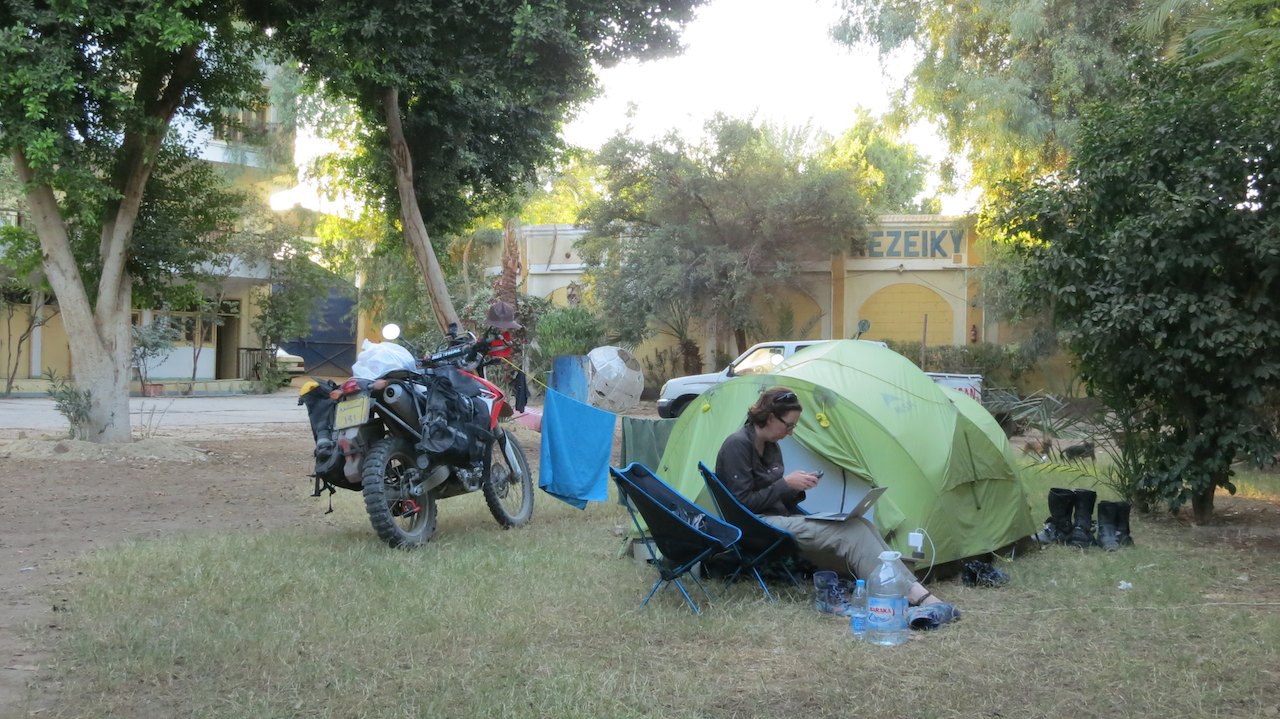
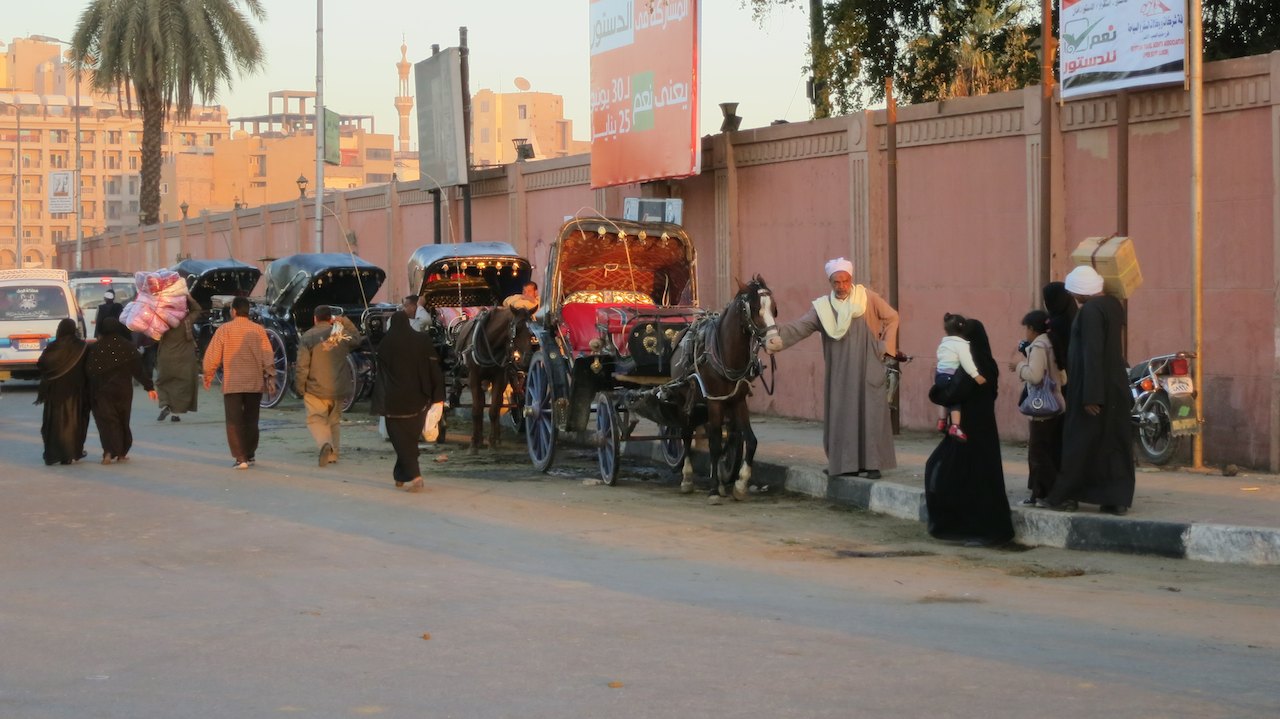
With the sun in our faces, we walk to the ferry that takes us to the west side of the Nile. We buy a ticket for the ferry and find a place on the upper deck. It is hazy and we can hardly see the other side of the river. When we are still on the ferry we are approached by a taxi driver. He offers to drive us around Luxor to visit different sites that day for a fixed price. He speaks good English and shows a notebook in which where several tourists have written nice comments about him. Clever marketing and it works, because after we have negotiated about the price we agree that he will be our driver that day.
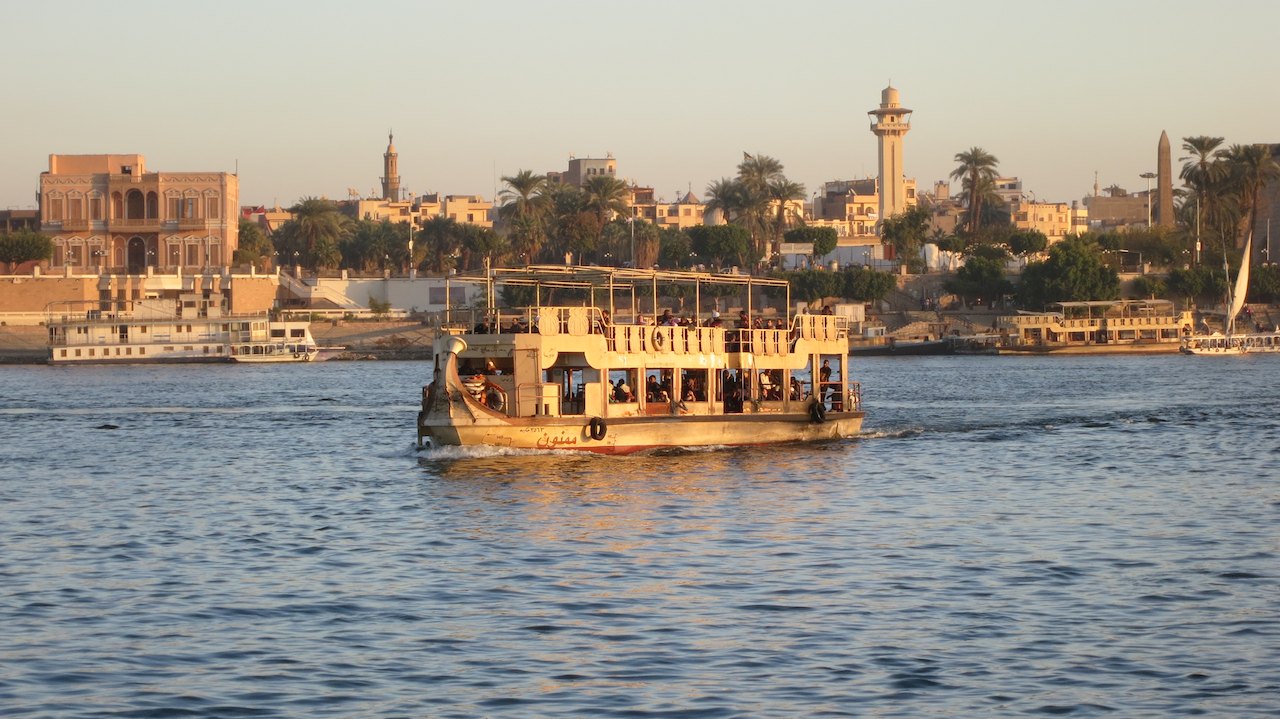
Once on the other side, an old Peugeot from the 70s stops in front of us and we are introduced to the cousin of the marketeer. As we get in the car it becomes clear that his cousin will actually by our driver, while the smart marketer himself will look for new customers. Not quite what we had agreed, but okay for as long as we safely get where we need to be. In the old Peugeot he takes us to the entrance of the Valley of the Kings. We exchange phone numbers with the cousin so we can call him when we want him to pick us up.
At the entrance to the Valley of the Kings we are approached by a small, slightly older man named Mohammad. He offers to be our guide and gives us his business card. It states that he graduated in 1980 as an Egyptologist and has been working as a guide in Luxor ever since. He already has one customer, a student from South Korea, and for a good price we join him.
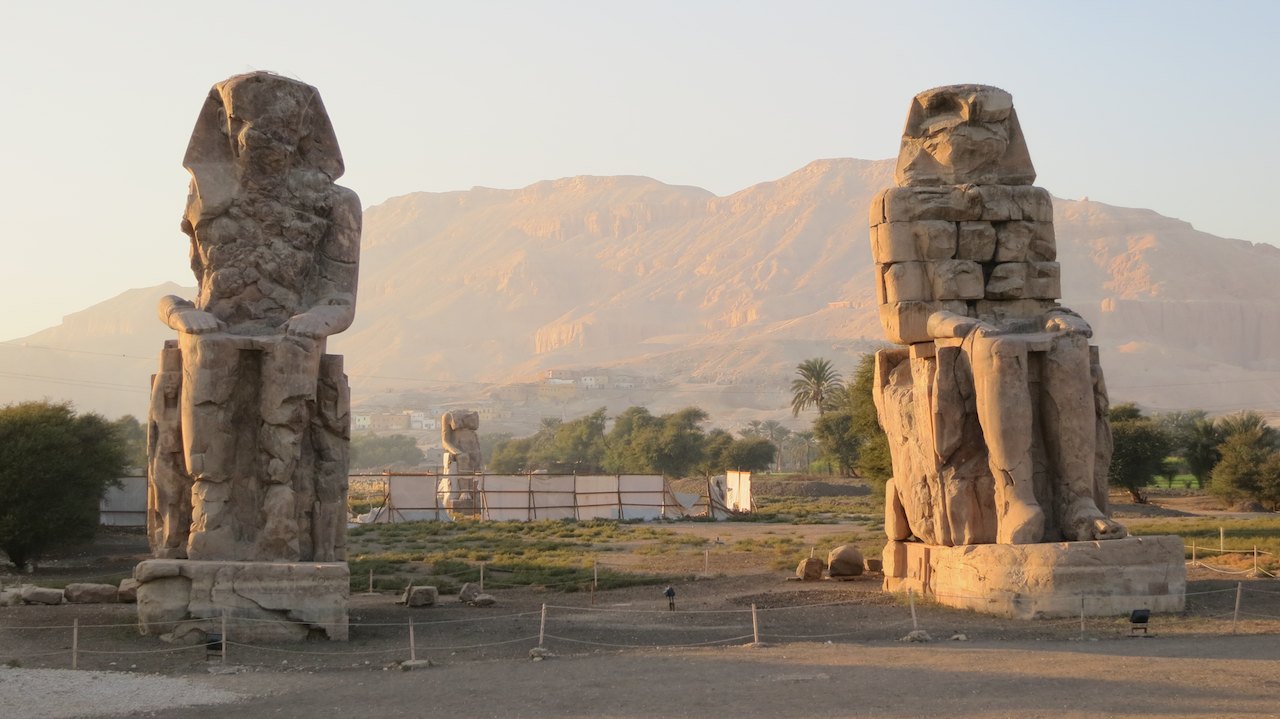
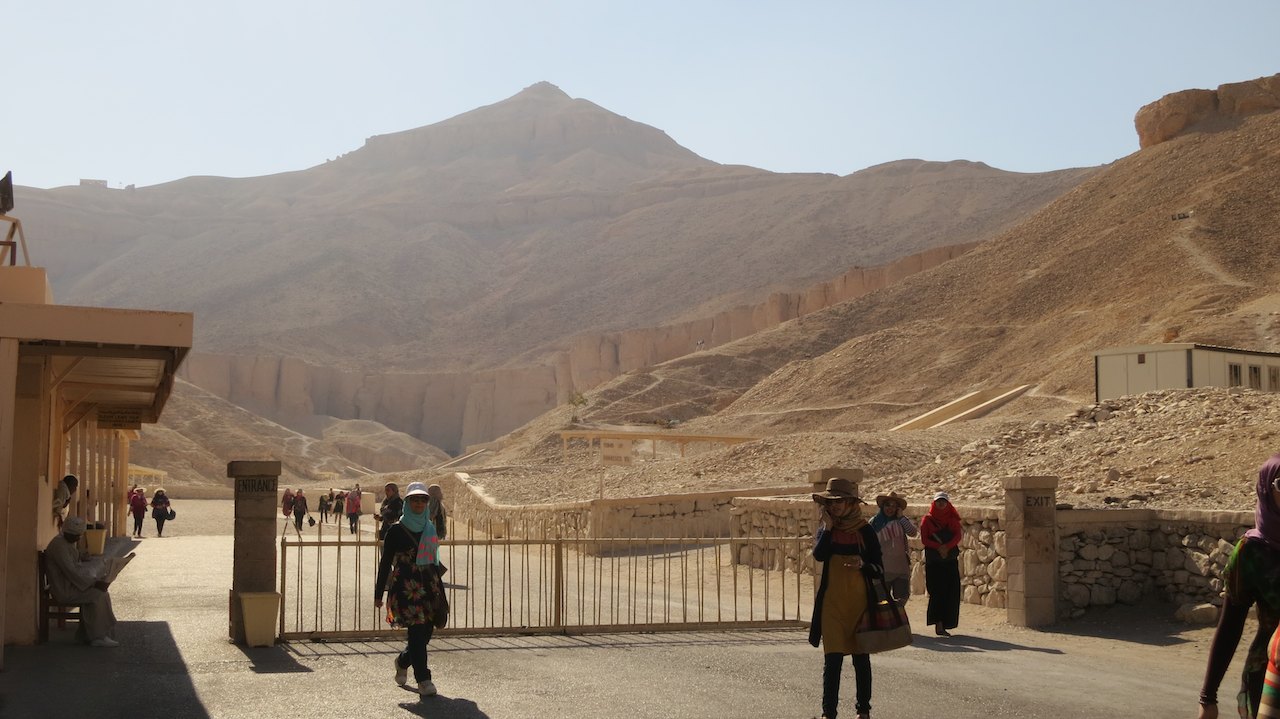
In the Valley of the Kings 63 royal tombs have been found from Pharaohs who lived from 1550 to 1069 BC. The mummies that we saw in the National Museum in Cairo were once buried in their golden sarcophagi in this valley. The tomb of Toetanchamun was also found here, as one of the few tombs with all its treasures still there. A map of the valley shows how long corridors are carved into the rock to different burial chambers. We visit three tombs and listen to the wonderful stories of Mohammad. He knows a lot about ancient Egypt and tells about the life of the pharaohs, the decoration on the walls, the hieroglyphs and the treasures that were found in the tombs. There are only a few tourists so we have plenty of time to walk around the tombs. It is beautiful and very impressive to see.
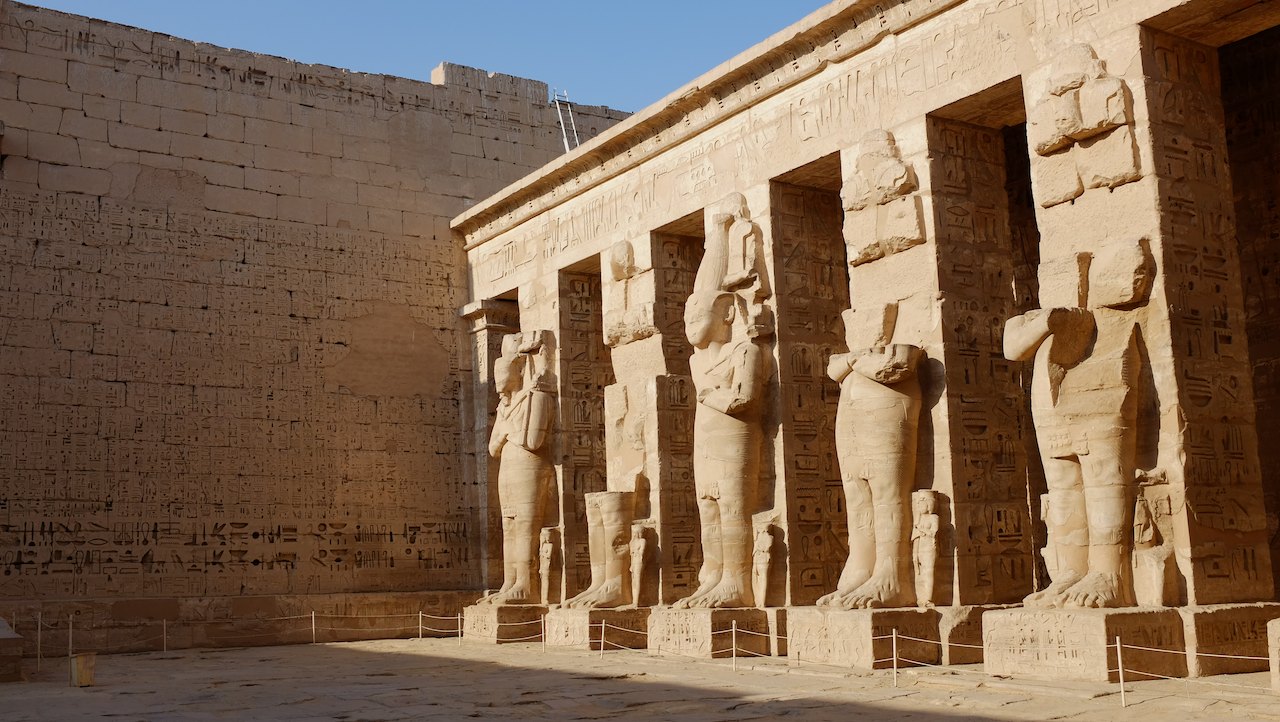
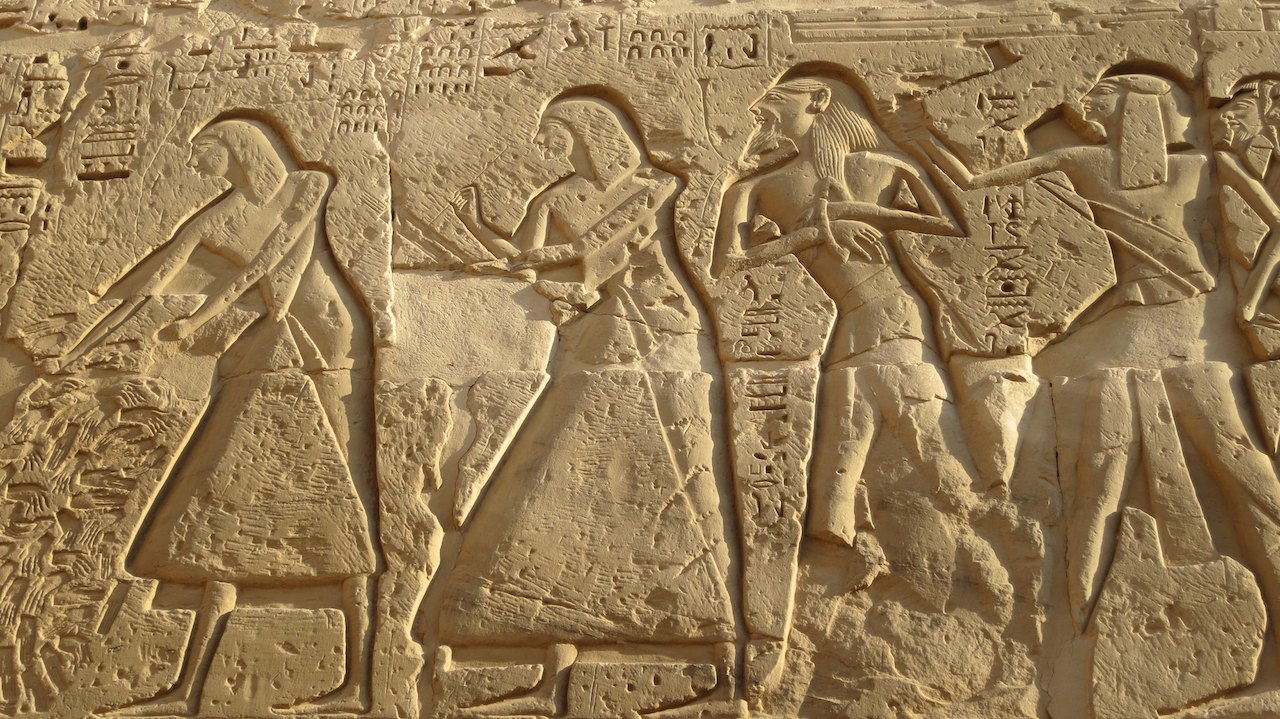
After three hours we call the cousin and not long after that the old Peugeot stops at the gate. It is time for lunch and we ask him to take us to a local place where we can eat koshary. He grew up in the area and quickly knows where to go. We both order a large plate of koshary and a coke (all for 22 EGP, which is around €2.20).
On the advice of Mohammad we then visit Habu Temple. The complex consists of several buildings and is still in very good condition. Especially the colours of the hieroglyphs are very well preserved. One of the guards of the complex is trying to make some pocket money by pointing us and all other tourist to the most special hieroglyphs and giving us access to closed areas of the buildings. He barely speaks any English and it seems he makes up most of the stories, but it still allows us to make some nice pictures. When we leave he asks for a contribution for his ’services’. We give him 2EGP, a common amount for services you did not really ask for. He pulls a glum face, gives back the coins and makes clear that he wants to receive more money. Only after I have put the coins back in my pocket and walk away he suddenly agrees to the fee after all.
The brown Peugeot is already waiting for us when we leave the temple. The cousin, now again accompanied by the marketer, takes us back to the ferry where we pay them the agreed fee. Even though we had agreed on a fixed price, they both ask for a ’tip’ on top of the price. One can always ask, but we have already paid enough (and probably even too much, as we are not really good negotiators yet). With a clear “NO” it is OK and they wish us a good day.
Both the actions of the guard at the temple and the question of the taxi drivers are in line with the image we had of Luxor before we came there. We were warned that we would be approached by people who would try to sell us something (a ride in a carriage, a boat trip on the Nile or souvenirs) and would have to negotiate the prices. Especially now that there are fewer tourists in Egypt, the salesmen have to make an effort to get your attention. In some cases, in an unpleasant way. Luckily we did not feel harassed of hassled in any way. While everyone is trying to make some money, most of them stop asking when we tell them friendly but very clear that we do not want to use their services.
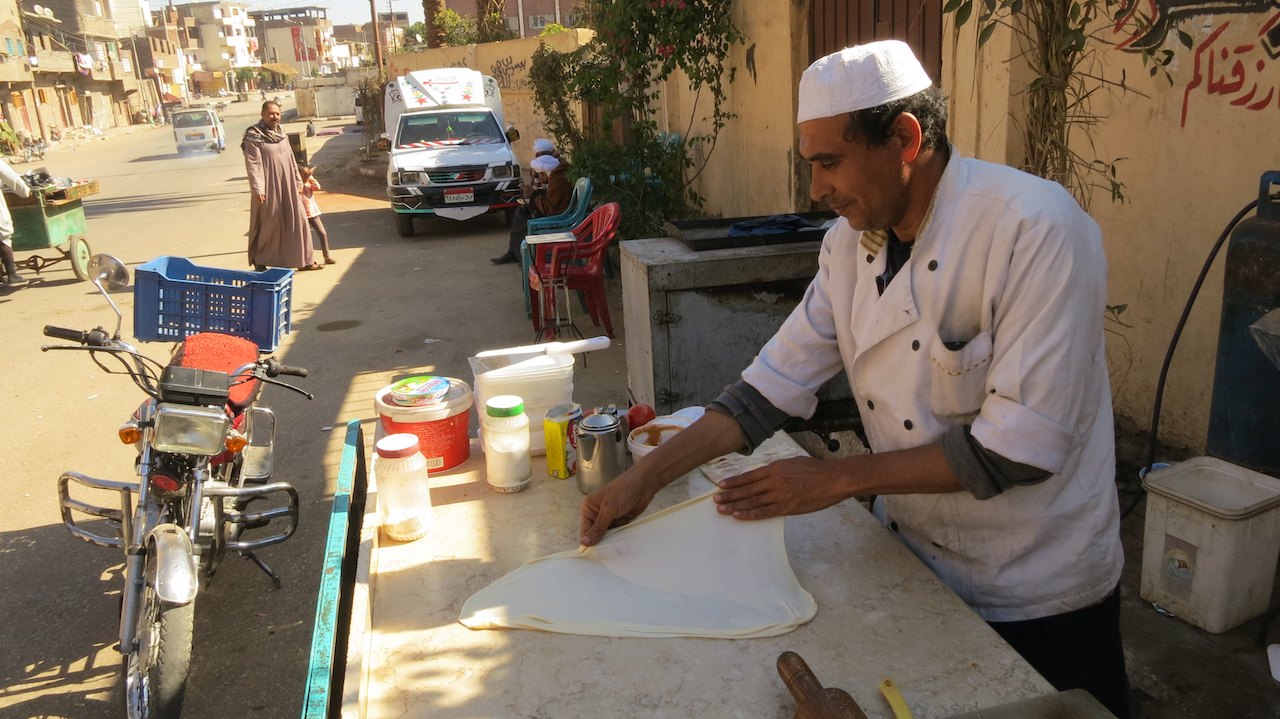
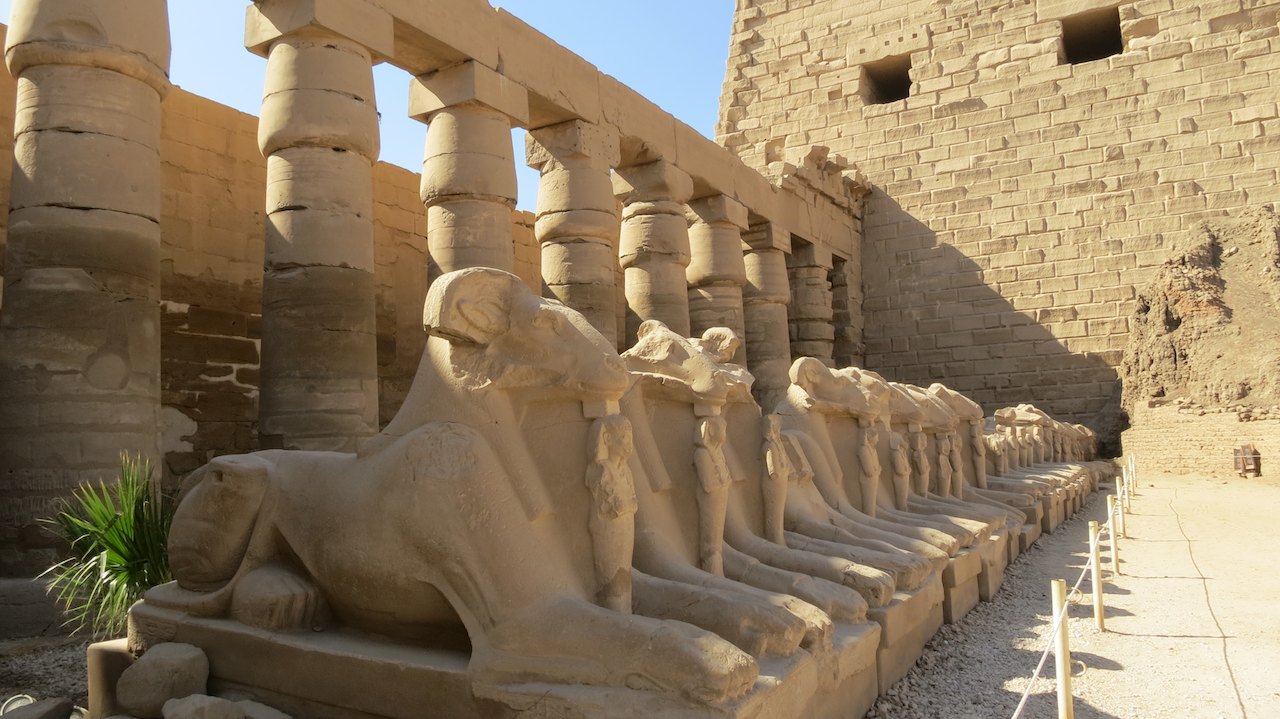
On our second day in Luxor we visit Karnak Temple, again with Mohammad as our guide. It is one of the largest temples in the world and very well preserved. Mohammad is already waiting for us at the entrance when we arrive and has already bought tickets for us. We follow him along the beautiful tall columns, the huge obelisks and the many images all morning, while he talks about the history of the temple. Very beautiful.
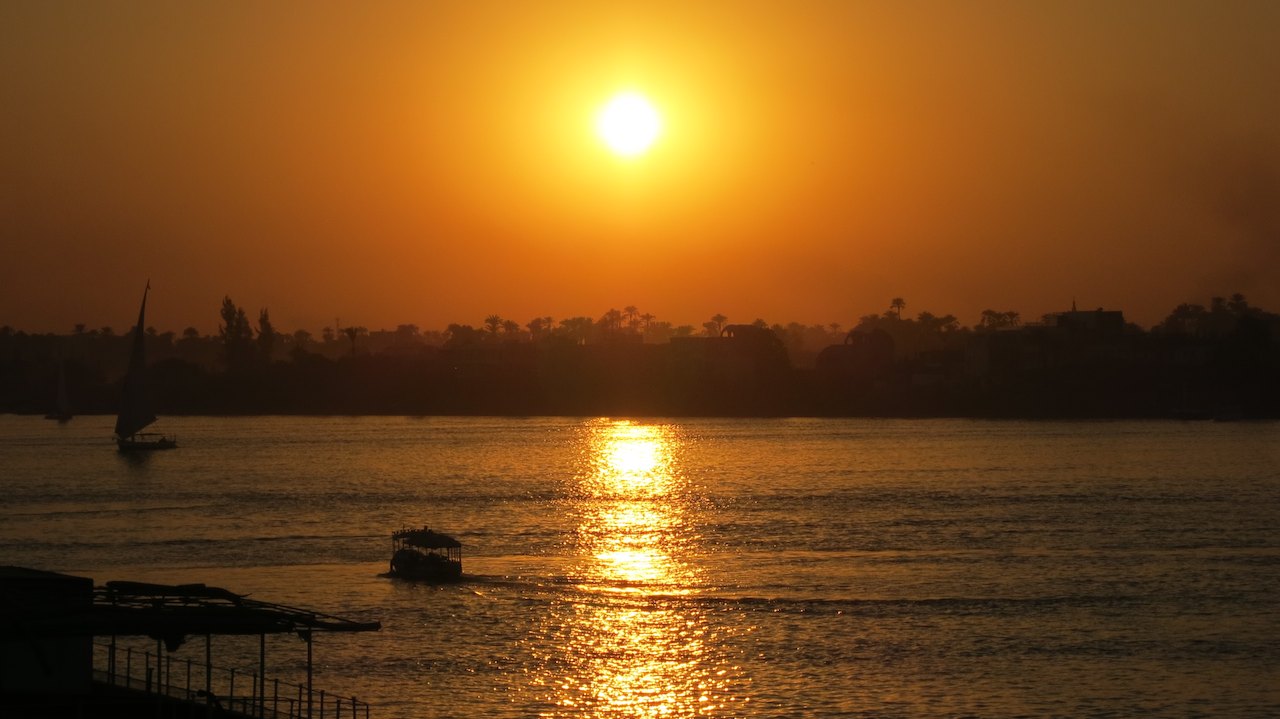
It is obvious that Mohammed has been around as a guide for a while, because he leaves no question unanswered. He knows all the other guides, who casually say to us that he was their teacher. He also knows the guards of the complex very well, as he takes us to all closed corners of the temple while the guards squeeze a blind eye. A great experience, thanks to a very good guide!
The remainder of the afternoon we spent at the camp site. I work on the blog and cook pasta, while Peter repairs the tent. After a chat with the owner of the camp site about the dogs, the shower and the toilet, he allows us to take a hot shower in one of the rooms of the hotel. A good ending to a great day after all.
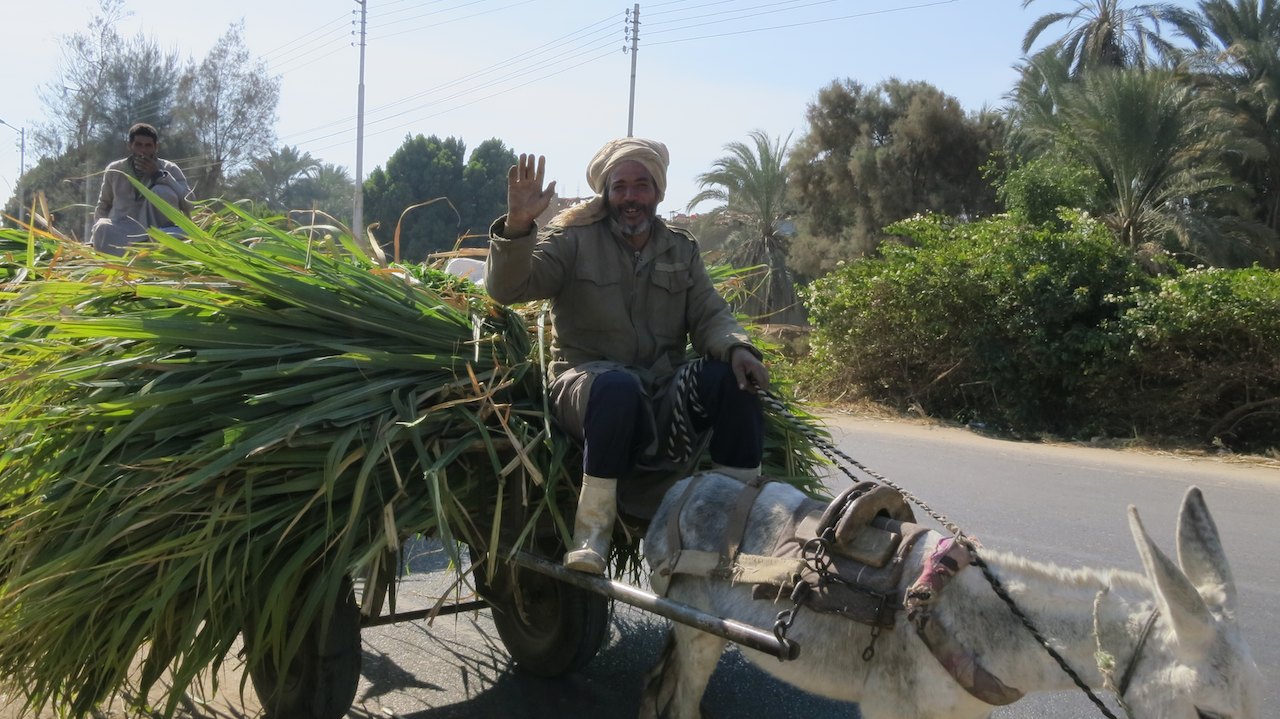
After three days in Luxor we get on our bikes again and continue our way south. We drive along the Nile to Aswan. A scenic route along the wide river and the green fields there right next to it. Along the way we meet a Chinese cyclist who has been travelling for seven months through the Middle East and Africa. His loaded bicycle stands on the side of the road while he sits in the shade playing his guitar. His name is Zhai Xu Dong, but like many Asians he has an easier western nickname and we can call him Tulsi. Like us, he is on his way to Aswan, to take the boat to Sudan. We exchange contact details and agree to try to meet each other in Aswan.
At the end of the afternoon we reach Aswan and we park our bikes at Adam Home Overland Camp (more on this in the next post).
Distance travelled until Aswan : 7596 km – 4721 miles
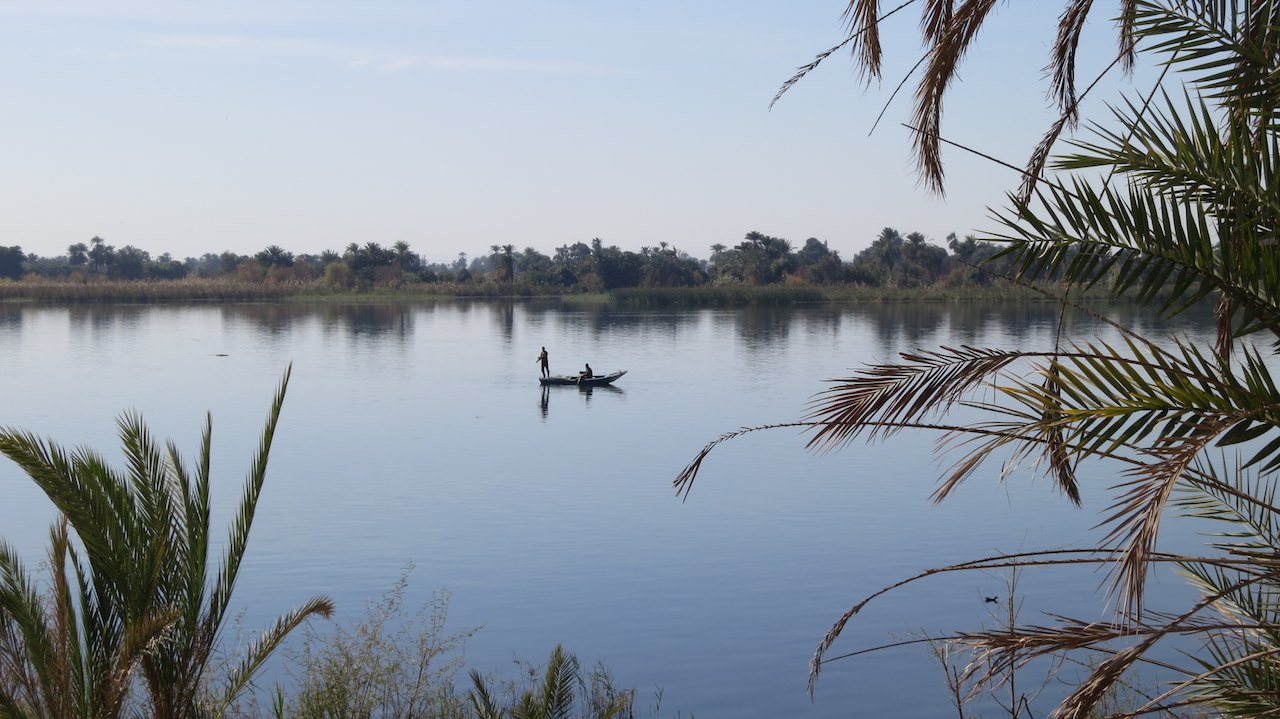
|

8 Oct 2014
|
|
Registered Users
HUBB regular
|
|
Join Date: Dec 2009
Location: The Netherlands
Posts: 66
|
|
|
Waiting for the ferry
(Please note that we travelled from Egypt to Sudan in January 2014)
To go from Egypt to Sudan we have to take the ferry that runs between Aswan in Egypt and Wadi Halfa in Sudan. The ferry runs on Lake Nasser, an artificial lake in the Nile that was created when a large dam was built in Aswan in the 60s. There are two land borders between Sudan and Egypt through which you can travel on a road from one country to another, but for unknown reasons those borders are not yet in use. Well, you could use the landborder, but only if you have received prior permission and pay € 3,000 per vehicle. In that case we prefer the ferry! Although even that is easier said than done.
The ferry runs once a week, but it is not really a regular service. For example, the date and time at which the ferry leaves changes from time to time. It can even happen that the ferry does not run at all for several weeks. The ferry takes only people and luggage, but no motorbikes. So the bikes have to be put on another barge to Wadi Halfa. All in all it is a lot of work, especially if you do not know how it works and do not speak the language.
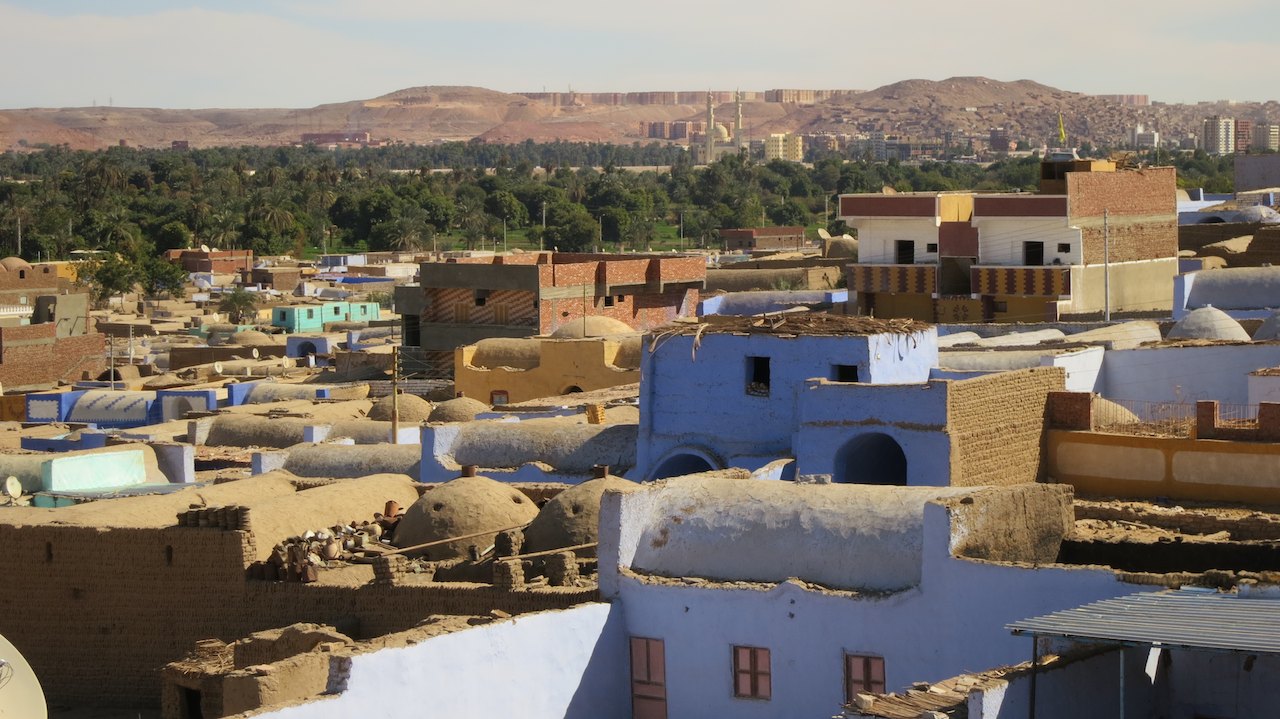
On the Internet a lot of information can be found about the ferry service (especially on Horizons Unlimited). There we found contact details of various ‘fixers’: people who arrange the paperwork for you for a certain fee. We were in contact with Kamal, one of the two fixers in Aswan. From him we learned that the ferry for people would leave on Sunday and the barge for motorbikes leaves on Tuesday.
Other travellers had told us that Aswan is a good place to wait for the ferry, better than Wadi Halfa. We decided to try to send the bikes to Sudan first and leave a few days later. On our way to Aswan we had already been in contact with Kamal several times. His English was not good and he sounded angry. While we were still driving through the Egyptian desert at ease, he could call with the message: “I need you bike Monday” or “You must come to Aswan now” or even worse [I]“There are problems. No tickets for you”[?/I]. We tried not too pay too much attention to his remarks and would sort things out when we got to Aswan.
______
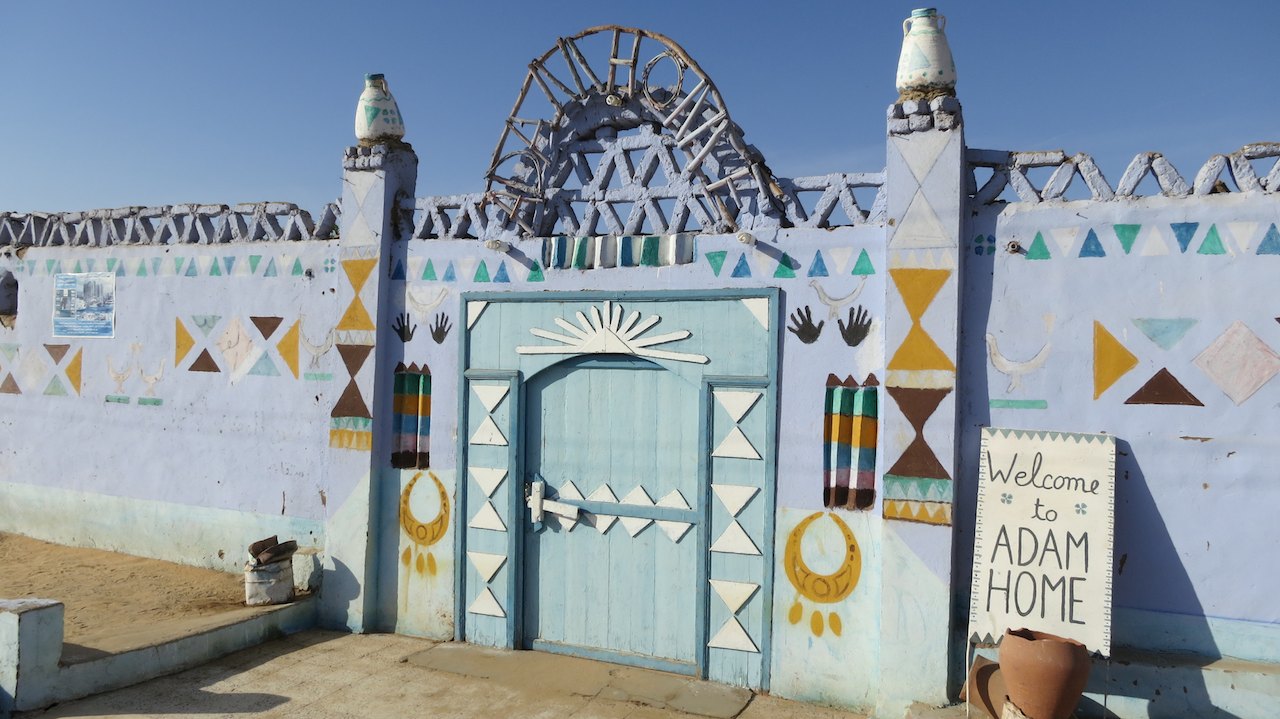
On Monday afternoon we arrive at Adam Home in Aswan from Luxor. We are welcomed by Sammy (a double of Eddie Murphy) and Mohamed (you can say ‘Mo’). After we put our stuff in one of the rooms, Mo invites us for tea. He has lived in England for a few years and speaks good English. He proudly explains that Sammy and he are Nubians, the people who traditionally inhabited this region. He explains in what way Nubians differ from the Arabs in Egypt and tells about Nubian customs and habits. It is a very nice afternoon after such a hot day on the bike. When I look in the mirror later I see a red face and flat ’helmet hair’. No wonder Mo remarked that we look a little tired and thirsty!
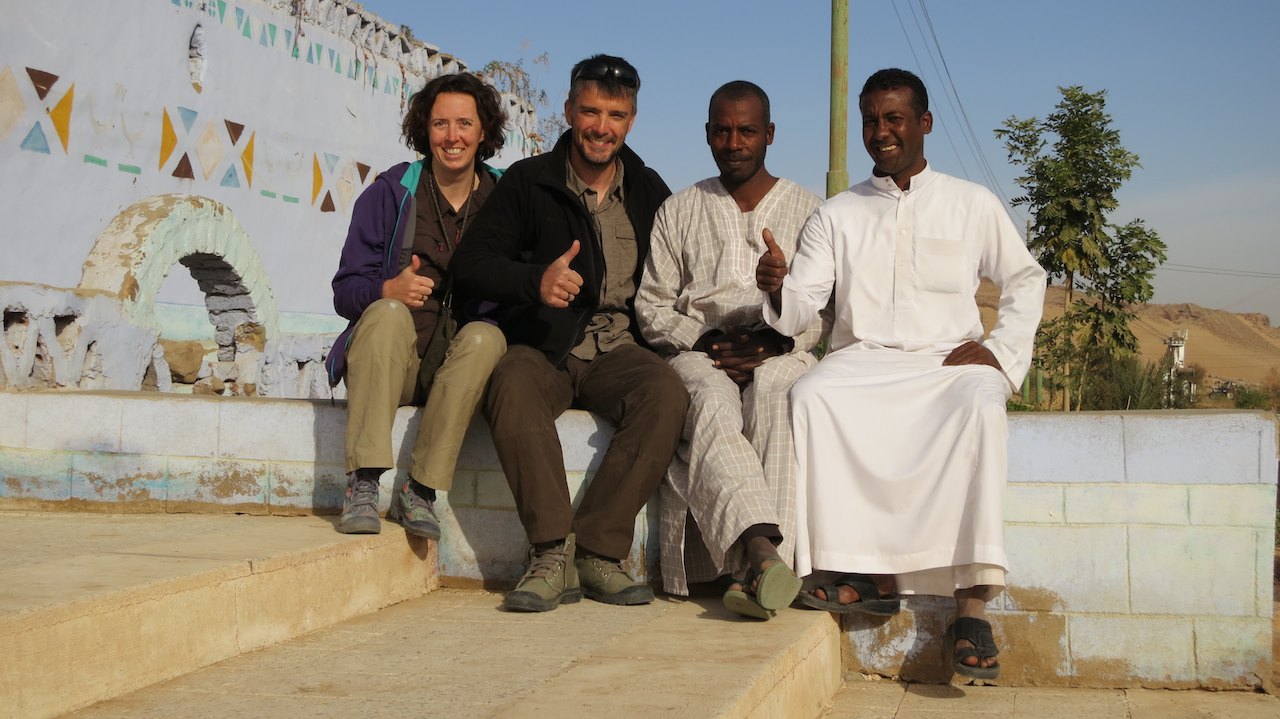
We use the afternoon to sort out our stuff. Part of our gear will be left on the motorbikes and leave for Sudan the next day. Only the valuable and much needed stuff we keep with us, to take on the ferry later. At Adam Home we stay in one of the rooms, so -among other things- we leave the cooking equipment and camping gear on the motorbikes. We prepare some pasta in the kitchen of Adam Home that night. It is a nice place to stay and although we had thought to go to a hotel in the city, we decide to stay here the whole week.
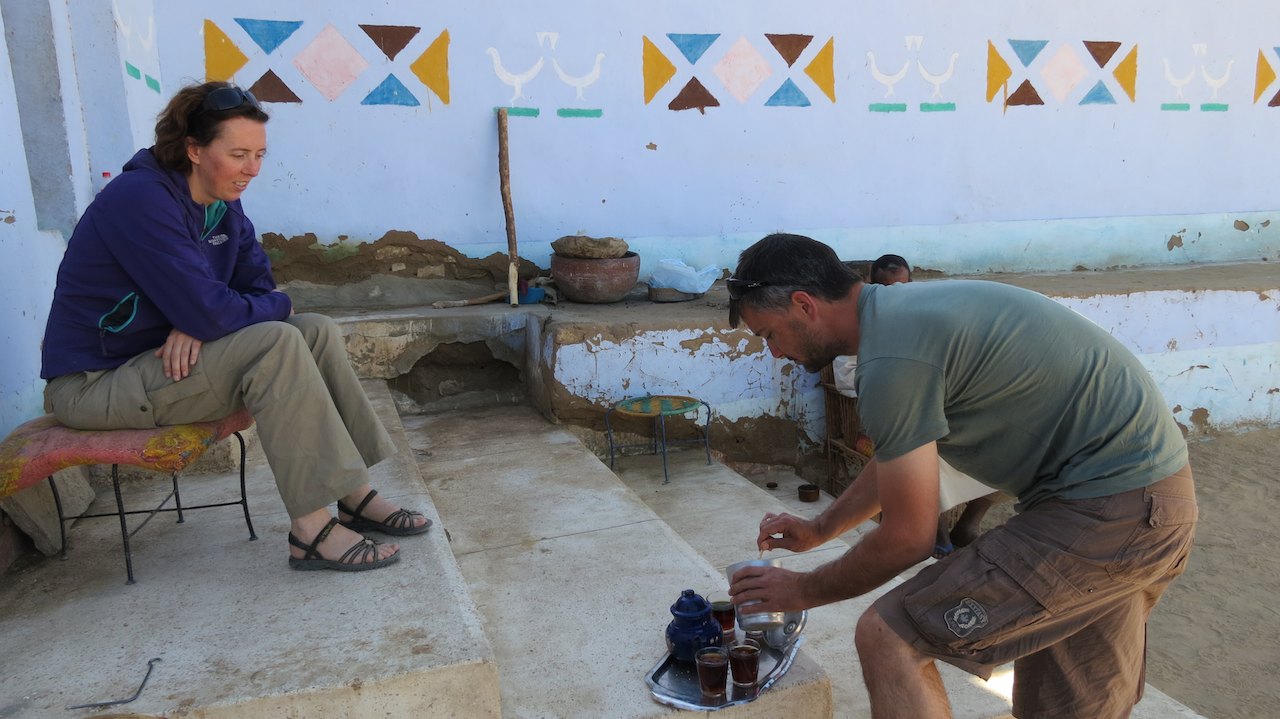
After dinner we meet Kamal. He has come to Adam Home to talk about the ferry, the barge for the motorbikes and other administrative matters we have to settle this week, like visas for Sudan. It is a big man with a tough looking face. If he had been an actor he would probably only be casted in the role of the ‘bad guy’. Just like on the phone, we sometimes struggle to understand his English and he sounds quite compelling. The things he says and his hard face make that we do not trust him for one bit. That feeling only gets worse once we start negotiating the price for his services. He asks $50 per motorbike, so a total of $100. We think it is a lot of money. When we to negotiate about the amount, he demonstratively becomes angry, stands up, sticks his finger in the air warning us and threatening to resign. That is when Sammy calls Mo to mediate between us about the price. With the help of Mo, Kamal calms down and the price is lowered to $40 per motorbike. It still is a lot of money, but we decide to do it. Even though we think we could easily obtain a visa for Sudan without his help, this is definitely not the case for getting the bikes on a ship. We decide to have Kamal do everything for us for that price, including the visas. We agree that we will meet him at the train station in Aswan the next morning at 08:30 AM.
Somewhat unhappy we say goodbye to Kamal and start packing our last things. We fix our mosquito net above one of the beds and crawl into our sleeping bags. We actually only just fit under the net and lie closely together in the huge bump in the mattress. Very cosy, but the narrow bed, the frustration about Kamal and the concerns about our motorbikes make that we hardly sleep that night. It feels very early when the alarm goes off the next morning.
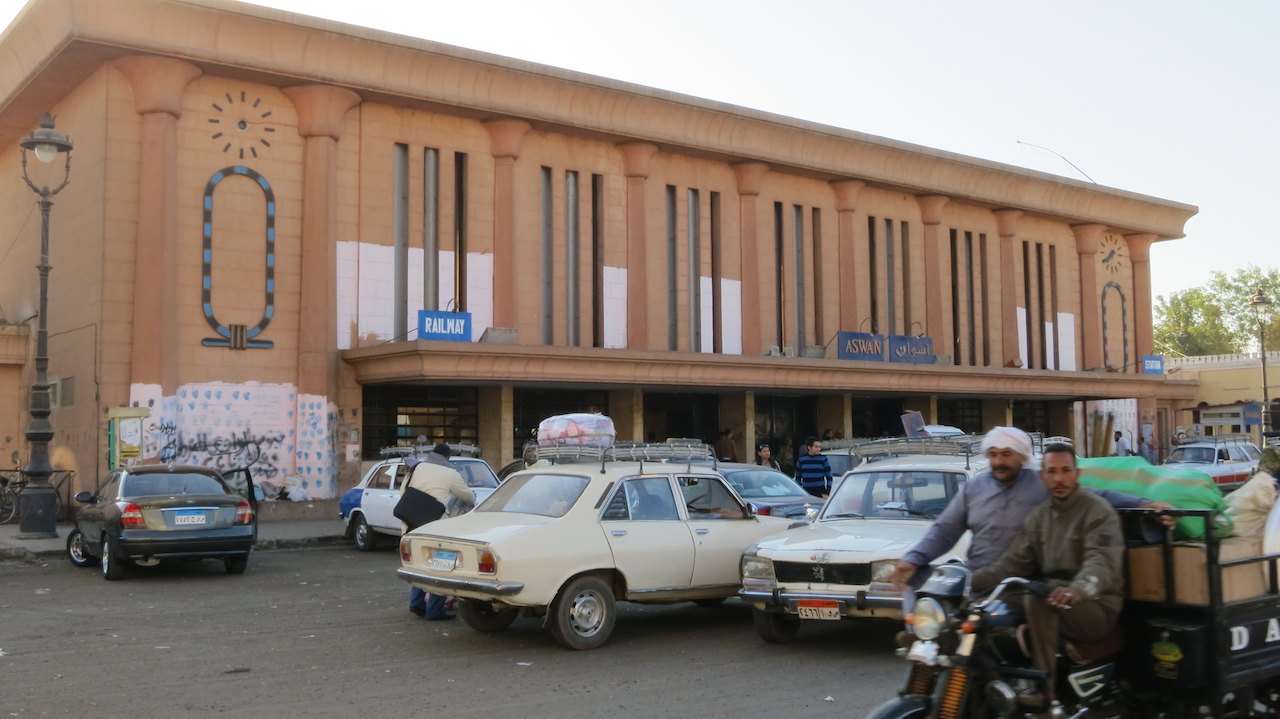
We are at the train station half an hour early and decide to get some fuel first. We heard it is difficult to get fuel in Sudan, so leaving the ferry in Wadi Halfa with a full tank seems like a good idea. We chat with the friendly Greek owner of the fuel station and drive back to the rendezvous point where Kamal is now waiting for us. He drives an old Peugeot from the 70s which is painted in taxi colours. He does not get out of his car to say hello, but indicates us to follow him immediately. We first go to the Sudanese Consulate to apply for visas.
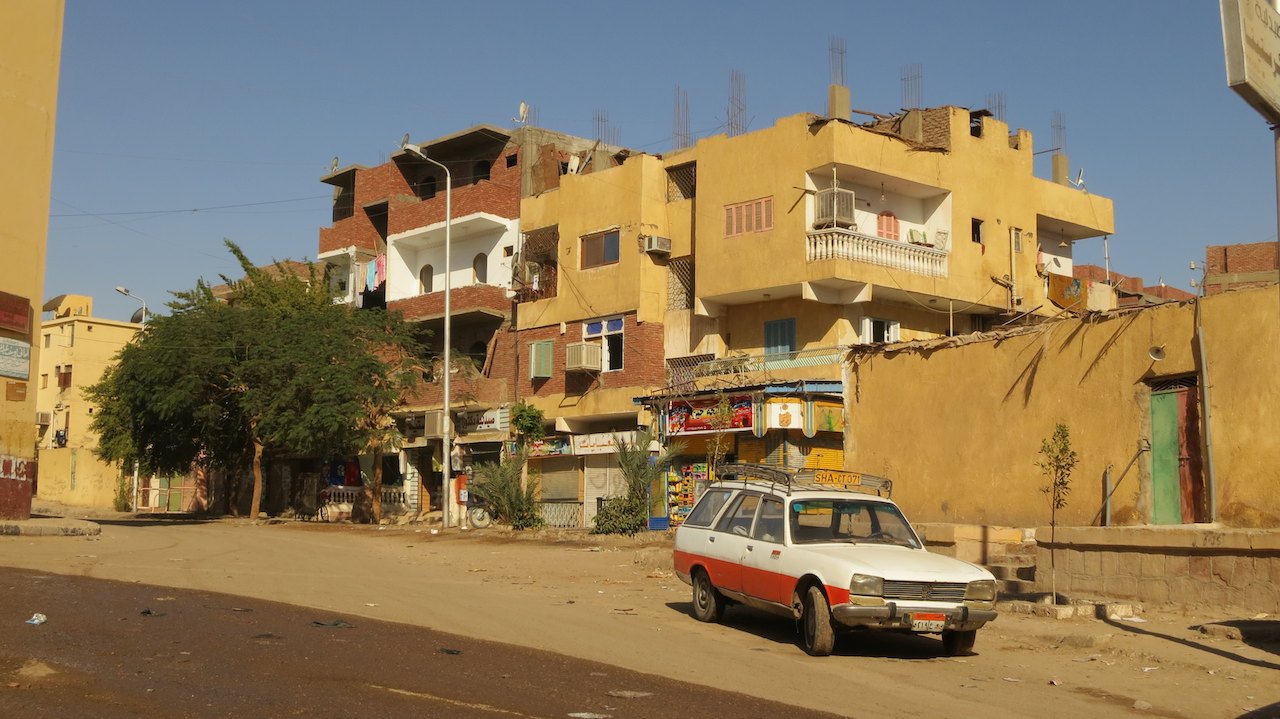
We follow Kamal through the city. We drive almost at walking pace, because he has a lot of trouble avoiding the many potholes in the road. We park our bikes at the consulate and follow Kamal inside. Everyone seems to know him. We are asked to take a seat in the waiting room. It looks clean, much better than the Egyptian government buildings that we have visited so far. The walls are white, the electrical wires are neatly tucked away and there are clean seats. We fill out an application form and give it to one of the employees of the consulate. He lets us know that we can pick up the visa Thursday morning (two days later). Kamal is still talking to that same employee for a while before we follow him outside again. That was it! Applying for the Sudanese visa was easy and was not in any way like the complicated procedure that Kamal had described the night before. Compared to the Libyan – Egyptian border, this was a breeze. We feel a bit conned by Kamal and get on our bikes in silence.
We follow him to another part of the city where we go to the office of the Traffic Police. Kamal asks Peter to go with him, while I wait outside with the motorbikes. It is warm in the sun and takes quite a while before Peter and Kamal come back out again. When I ask Peter what they have be doing inside, he shrugs. It is not exactly clear to him, something with our Egyptian driver’s license or with Egyptian license plates. It remains a mystery.
We follow Kamal through Aswan. In the middle of town he stops and two men of the traffic police get into his car. Then we drive out of town towards the harbour, which is about 30km outside the city. We see him stop at a bakery and while he remains in the car, he buys some bread. I get off the bike and follow his example buying bread. It is now almost noon and we both could use some lunch. A few hundred meters further Kamal stops again and orders us to come and stand beside him. From the car he explains that we need to make copies of our documents here. In the meantime he will go to the harbour to drop off his passengers. Once all the copies are made, we drive to the entrance of the where -after a while- Kamel picks us up to take us inside the compound.
Just after the entrance we are asked to stop at the customs office. Our bags have to be examined. A stern looking man asks us to take our bags to the scanning device. After a chat with him about our travels he is suddenly a lot more friendly. His examination is not as thorough anymore, he seems to find the chat more important.
When we are done, we follow Kamal to yet another office. We park our bikes in front of the entrance and see Kamal disappear inside. It is now midday and quite warm. We find a place in the shade to have a drink. It takes a long time before Kamal comes out of the office again, accompanied by two other men. They walk past us, busy talking and heading for a boat that is in the harbour. Besides the boat are three trucks full of large blue bags that are loaded onto the ship one by one.
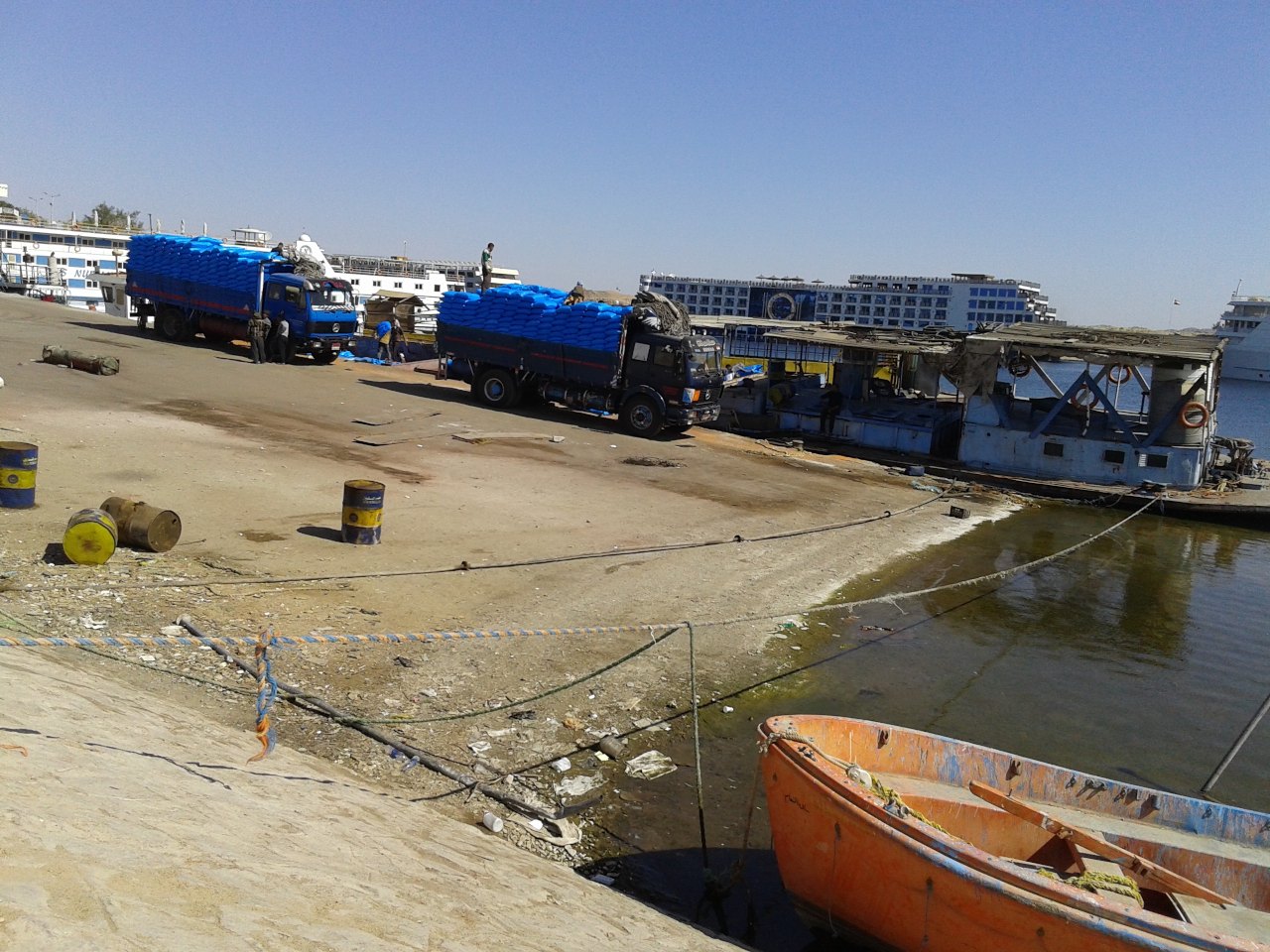
After a while Kamal comes back and says: “Problem. Big problem”. The blue bags contain fertilizer. The captain of the ship did not think it would be a problem to take our bikes on the same ship, but the harbour master is afraid that the boat will explode when the sun, the fertilizer and the fuel in our bikes somehow come together. The harbour master does not give permission to put our motorbikes on this ship. Tomorrow we have to try to find another boat. Slightly frustrated, we return to Aswan. We agree with Kamal to meet him in the harbour the next morning for another attempt.
It is 15:00 when we park our bikes at Adam Home. Sammy and Mo are surprised to see us, still with our motorbikes. We join Sammy and Mo for sweet tea, finally eat our bread and tell them about the ship with fertilizer. As we still have the motorbikes and all of our gear, we decide to take out our camping gear We do not want to move to a hotel in the city, but we do not want to spend another five nights in the bumpy bed at Adam Home either. We pitch our tent in their courtyard, do some shopping, eat pasta again and then crawl in our own green ‘home’, away from the mosquitoes.
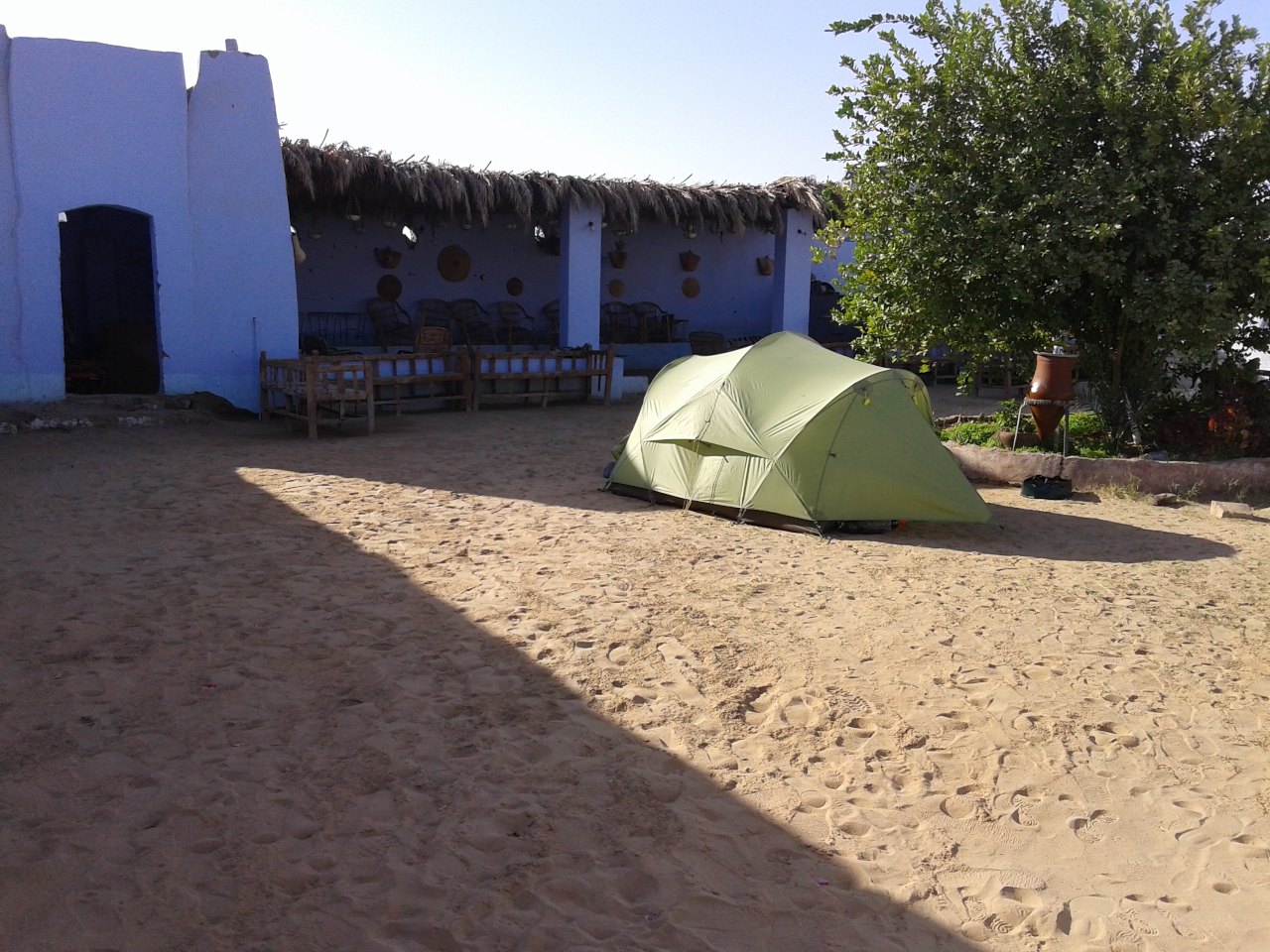
The next morning we drive to the harbour to meet Kamal. We do not need to go to customs again, the friendly guy of the other day just waves us through. We park our bikes next to two tough looking and fully equipped Land Rovers. At the office of the harbor master we meet a couple from Great Britain and another couple from Switzerland. They have arrived in Aswan a few days earlier from Sudan and have since waited for their cars to arrive. Like us, they use Kamal as their fixer. He needs to go back to the city for them to arrange some paperwork and asks us to fill out some paperwork in the meantime and have our Carnets de Passage stamped. Once this is done, the long wait for Kamals return begins.
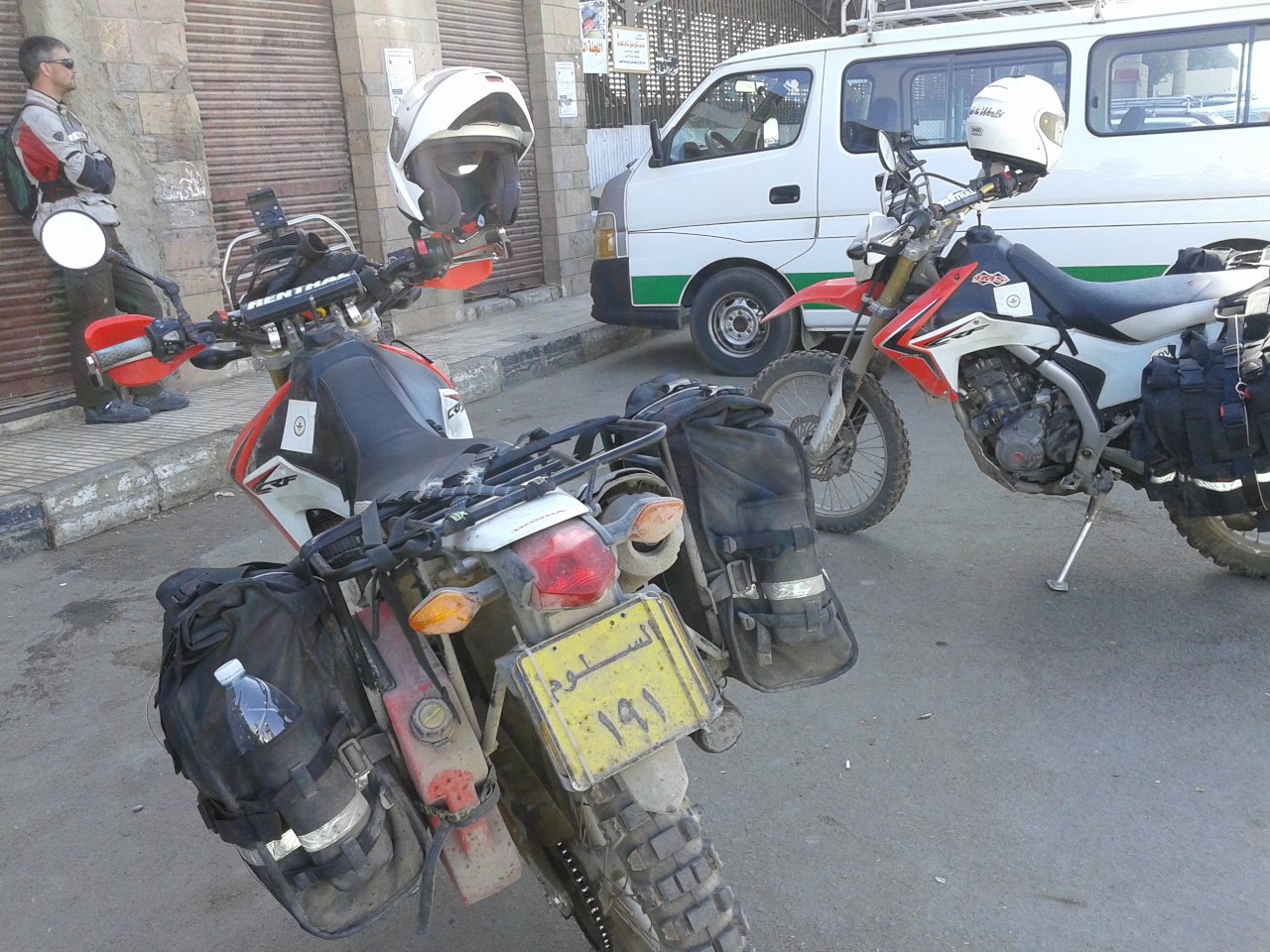
It takes a very long time. We chat with the other overlanders, exchange tips and routes and listen to their interesting stories. They are already on the road for a long time (two and four years, respectively). While we are still full of energy and look forward to the adventures yet to come, they seem a bit tired of traveling. They had to wait a long time before their cars arrived in Aswan and have camped under primitive conditions in Sudan before that. They now look forward to the comfort of an all-inclusive resort on the Red Sea.
It is late in the afternoon when Kamal finally returns in the harbour. He is in an extremely bad mood and does not seem to feel well. We are told that we can take our bikes on the boat, while he finishes the paperwork for the other overlanders.
We ride our bikes to the boat. It lies transversely along the quay. One of the men gestures: “Well, drive onto the boat”. I watch him for a moment in disbelief, because the boat is still quite high compared to the quay and without a drive-plate it will be quit hard to get the bikes on there. We first ask where they want us to park the bikes. At the other side of the boat is a place at the front of the deck. The men shows us how they think we can get there: Drive along the edge (on the quay side), over a 50cm high metal threshold, then turn twice and finally ride along the edge (on the water side) to the front of the boat. We look at each other in amazement. The men look very serious so their are probably not joking. It is doable to ride along the quay side on the boat, riding on the waterfront is a lot harder, making the turns seems pretty hard and lifting the bikes over the thresholds is definitely impossible. On the front of the boat there is also a spot on the quay side of the boat. I ask whether the motorbikes are allowed to stand there by showing them how to get there.The man talk to each other for a bit, when we hear some grunts of approval and are told that we can park them in front.
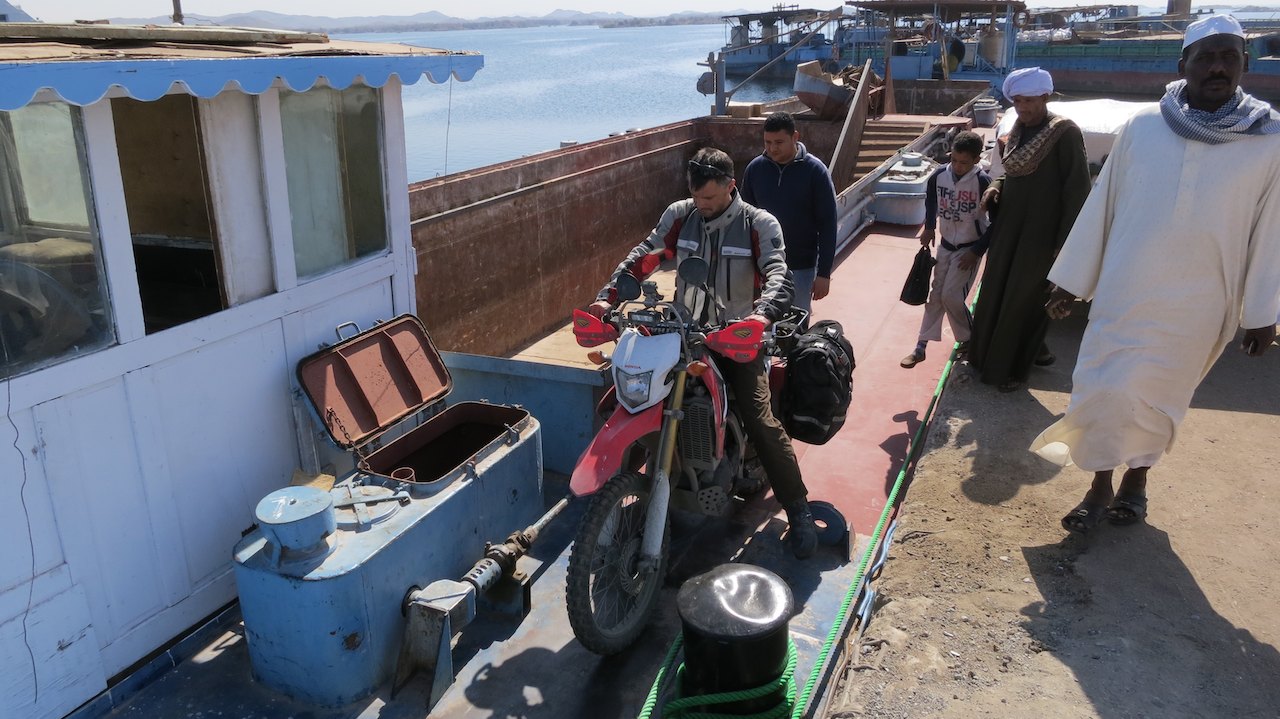
Before I even notice, Peter has already put his motorcycle on the boat. With the help of the men, his bike is put on the foredeck. Then he also takes my motorbike and rides it on the boat. With some pushing and pulling, bended plastic, dimpled bags, a small curse and a lot of sweat the bikes are both placed next to each other. We are glad that we are travelling on the small CRFs, because this would have been a lot hard on the Transalp and the Africa Twin. The motorbikes are very close to the anchor chain and ratchet. We hope that this will not be a problem. One last photo and then we walk back to the harbour office. It is a very strange feeling to leave the motorbikes and a large part of our gear on the boat and even hand over the keys to the captain. We hope for the best.
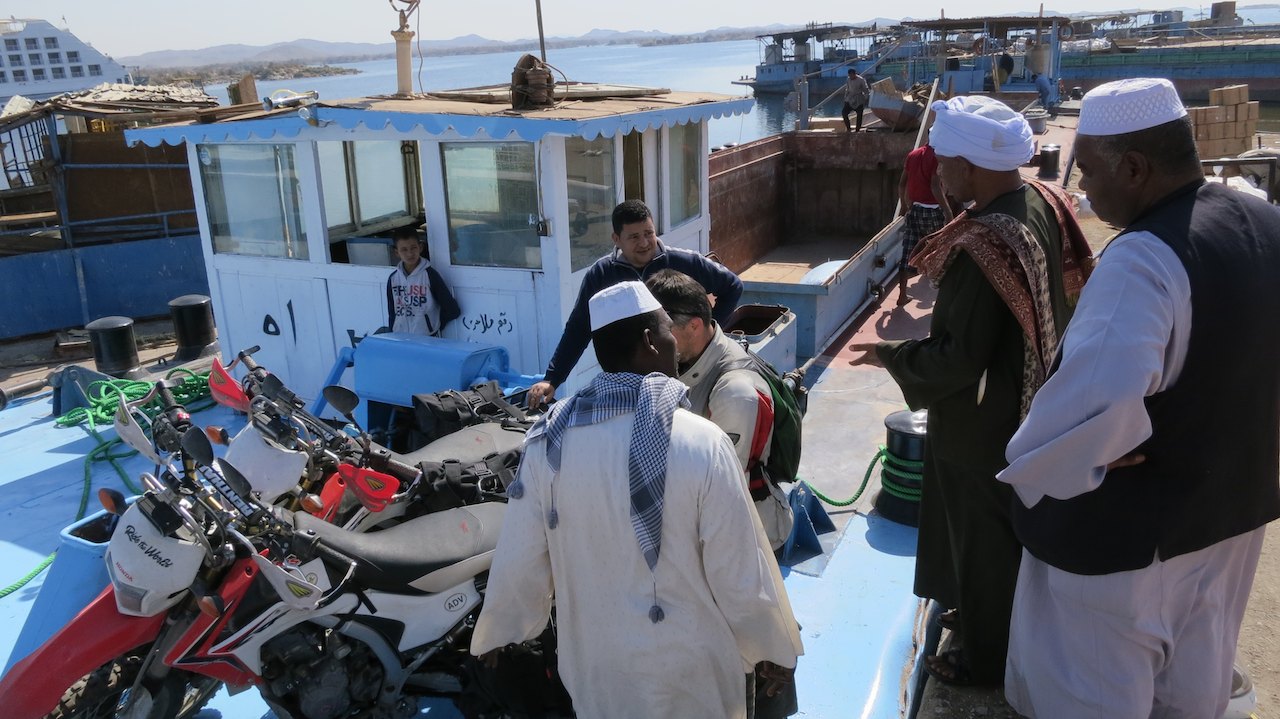
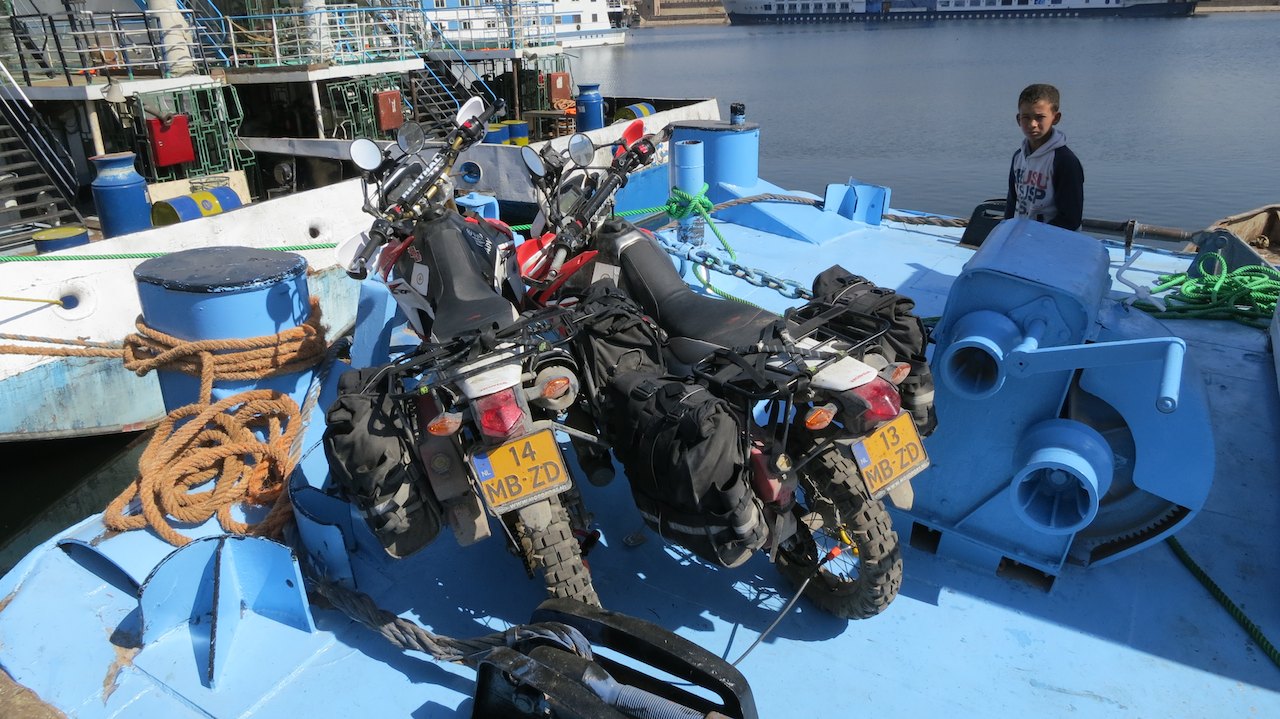
Back at the harbour office the other overlanders have finished their paperwork. We say goodbye to them, wish them a lot of fun on the Red Sea and step into Kamals car to drive back to the city. It is late in the afternoon and the end of the working day for the staff at the harbour. In addition to Peter and me, Kamal takes three other men to Aswan. We only just fit in the old extended Peugeot, but it is not comfortable. Peter sits with two of the three passengers in the first back seat and I am behind them with our motorcycle jackets and helmets. The old car has already endured a lot since the 70s and waddles across the road. The suspension is so worn out that I hit my head against the ceiling several times when we go through the many holes in the roads. Luckily it is only for a short ride.
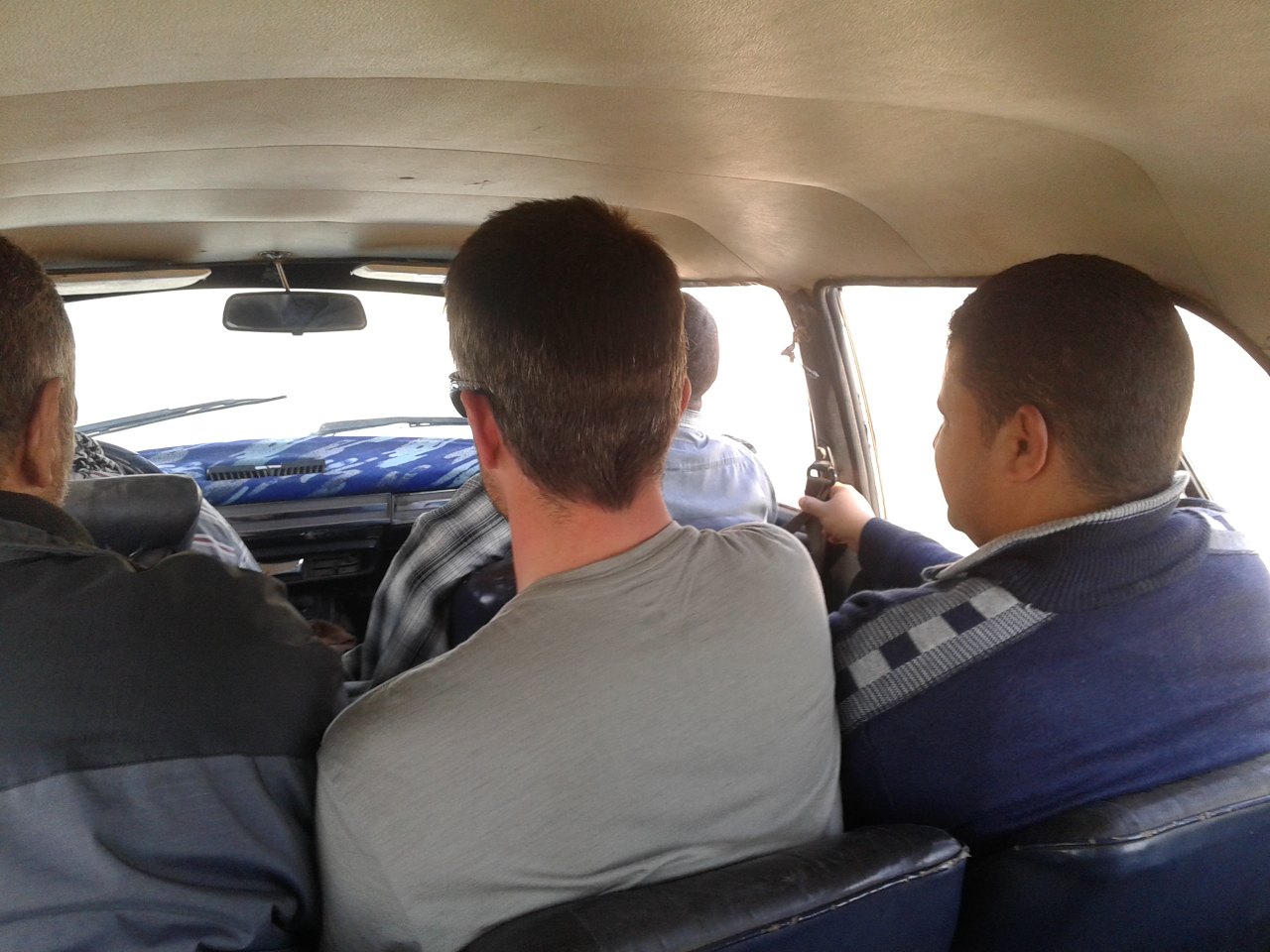
At some point we turn off the main road. One of the men explains that we need to go somewhere, but that it will only take 5 minutes. We do not understand exactly where we are going and why, but we will see. We drive into a street that is full of car repair shops. One in a well maintained building with “Toyota” or “Nissan” on the wall. The other in no more than a shack made of corrugated iron. The soil is black with oil and is littered with engine parts and tires.
Kamal and the men from the harbour step out and ask us to wait in the car. They walk across the street to one of the shops and start a conversation with one of the customers there. The conversation quickly turns into a heated discussion, they even start yelling at each other. People come running up from all corners and there soon is a large group watching the angry men. One of them seems to want to fight with Kamal and is stopped by the spectators. The men from the harbor do the talking on behalf of Kamal, while he is watching from the side.
Peter is now out of the car and is told that Kamal had a car accident that morning and hit the car of the man he is now arguing with. That explains why we had to wait so long for him to return to the harbor and why he was in such a bad mood. The man he hit had asked Kamal to pay a large sum of money to repair the car. When he had refused to pay this, he was beaten and punched by the driver and his friends. Kamal had also called in the help of his friends. While he was driving back to the harbour to finish our paperwork, his friends had gone off to the driver and his friends. They had been a bit more rigorously and threatened to use a knife. That caused even more trouble.
Now his work in the harbor was done, Kamal tries to restore the situation with the other driver with the help of the men from the harbour. All the bystanders seem to want to interfere with the dispute. The atmosphere is grim and I am told to stay in the car. We do not feel at ease and find it annoying that Kamal involves us in this. That feeling is strengthened when a stranger gets into the car of Kamal, start the car and starts to drive it, while I am still in the car!! I shout and ask him to stop. The driver first seems to ignore me, but then does stop the car. I immediately step out. I would rather stand outside the car with Peter on the street, instead of being on my own in a way too hot car that is driven away by another person.
It takes a long time before the calm is restored. While we are waiting for Kamal in the blazing sun, he drinks tea with the angry driver and Kamals mediators in one of the shops. While drinking tea, they eventually find a solution that does not involve any insurance or police.
We are a bit fed up. ’Quickly taking the bikes to the boat’ is now already taking most of the day. We let Kamal take us to the city and call Mo to tell him we are ’coming home’. When we get to the other side of the Nile, he is already waiting for us. At the sight of our heated heads, he puts on the air conditioning in his car and directly takes us to Adam Home. Once there, we drink mint tea and let the frustrations about Kamal slide off.
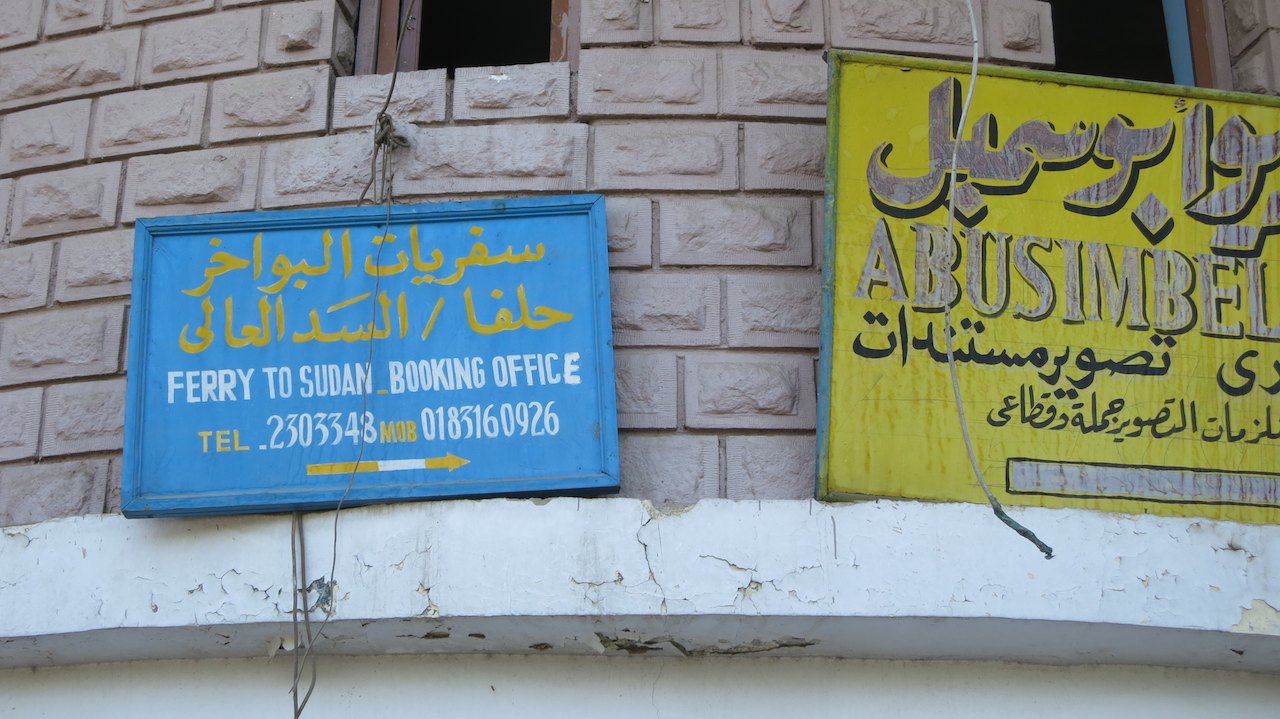
The next morning, we need to go to Aswan once more to complete the final administrative things. Mo brings us to the ferry that will take us across the Nile and on the other side we get into Kamals car. The door of the car is repaired and Kamal looks a lot better today. We ride with him to the Sudanese consulate to pick up our visas. While we are waiting for our turn we meet Tulsi, the Chinese cyclist we met earlier, who is also there to pick up his visa. Like us, he had waited only two days before he could pick up his visa. And this without a fixer! For us it is clear now that we could have obtained the visa without the help of Kamal easily. When we make a remark that -unlike what Kamal had told us- it does not take six days to get the visa, Kamal states that Tulsi only got his viso so quickly, because he had put in a good word for Tulsi. At this point we do not believe a word he is saying any more and consider it to be a good lesson for next time.
With a Sudanese visa in our pocket, we drive with Kamal to the ferry ticket office. The procedure for buying a ticket for the ferry to Sudan is an entirely different story. The boat to Sudan is so busy that the tickets are usually sold out in one morning. If the sales start on Monday morning for the boot that leaves the following Sunday, there is usually a large group of people waiting. Some of them even sleep in front of the office to get a ticket. This is the first time we have the idea that Kamal is worth his money. While we were having breakfast in Luxor on the morning we drove to Aswan, Kamal had already been in the line on our behalf as of 06:00 AM to buy our tickets. Or at least to put our names on a passenger list. We can only buy the actual tickets now we have a visa for Sudan.
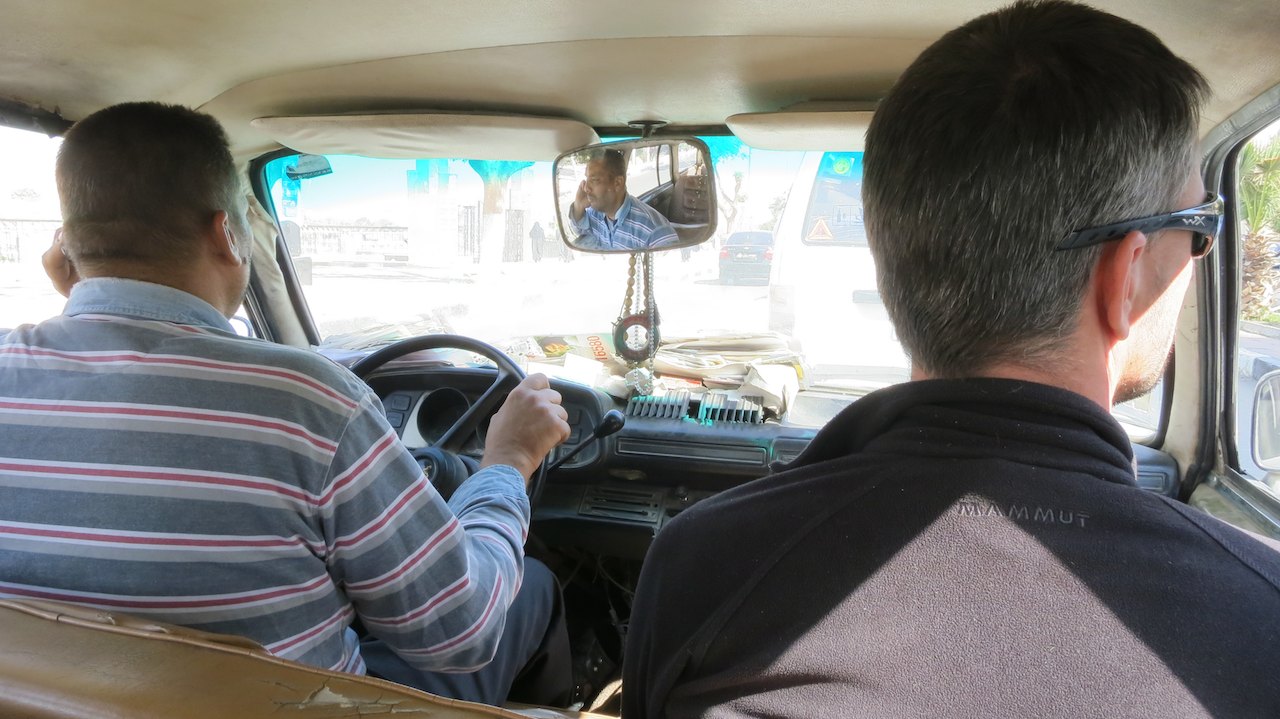
At the ticket office, we meet Tulsi again. We met him on Monday while we were all on our way to Aswan, so he had not been standing in line for tickets either. Friends of his had however put his name on the passenger list, so he had now come to buy his ticket. Unfortunately, the clerk could not find his name on the list. There were no more tickets, so he had no other option than to wait another week for the next boat. And not only that, he should also stand in line again the following Monday to buy a ticket, because -even though he was in the ticket office now- the tickets for the next boot would only be sold then. Wow!! Too bad, because that would also mean that we would not be on the same boat to Sudan.
Somewhat happier with the services of Kamal, we get back in his car again. The last thing he then helps us with is changing our Egyptian Pound for Sudanese Pound. Now we still need to get on the ferry to Sudan. On Sunday he will only still help us with the final formalities before we step on the boat. We have Kamal bring us to McDonalds and we eat thick burgers and delicious fries. It tastes even better than at home.
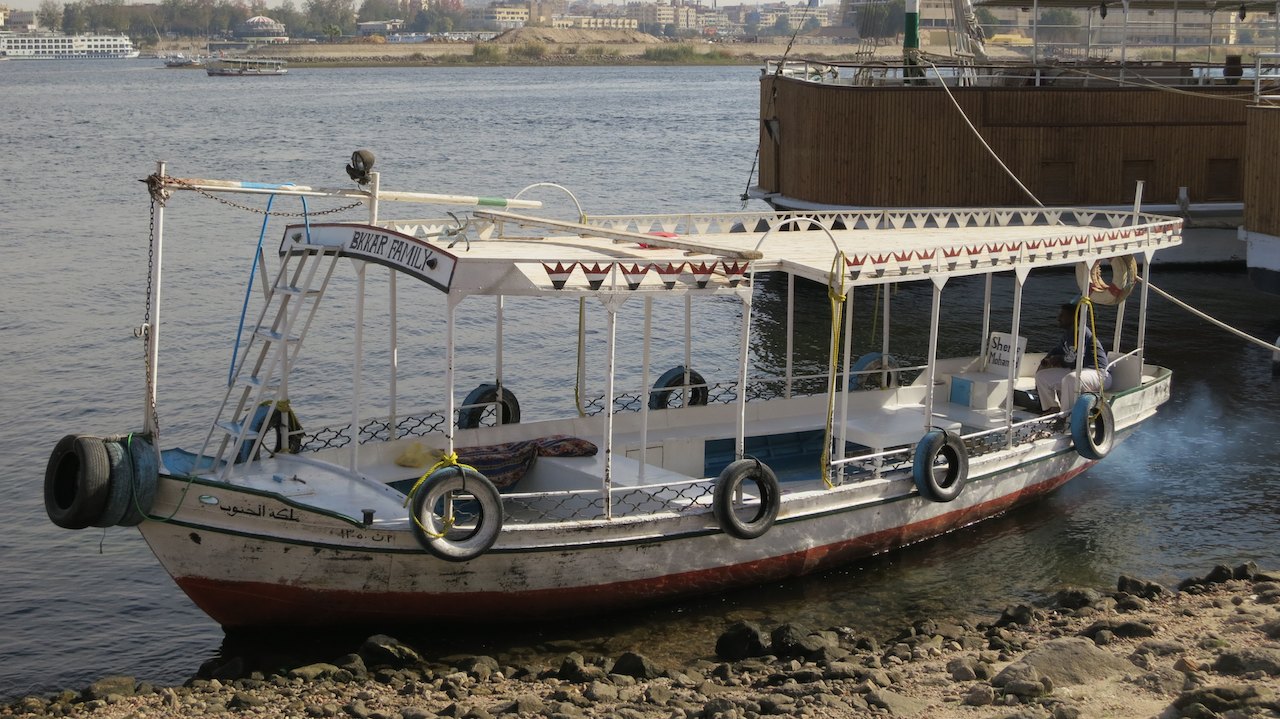
Now most of the work is done, we can enjoy two days of relaxing in Adam Home and Aswan. Mo is not only the contact person for all international guests at Adam Home, but also captain of a motorboat. That should be fun: sailing on the Nile. On Friday, after we have slept in late, Mo takes us to his boat. His cousin Sherif has already started the boat and has laid cushions on the roof of the boat. Near the city it is still quite busy on the water, but after the rapids we are practically the only ones there. We sail along the botanical gardens, Elephantine Island, several Nubian villages and the Old Cataract Hotel (where Agatha Christie wrote “Murder on the Nile”). Every now and then Mo sticks his head through the stairwell to tell us about all the sights. We sail until we can see the dam and then turn around towards the city again. Halfway we eat a delicious lunch. Peter even attempts to catch fish for dinner.
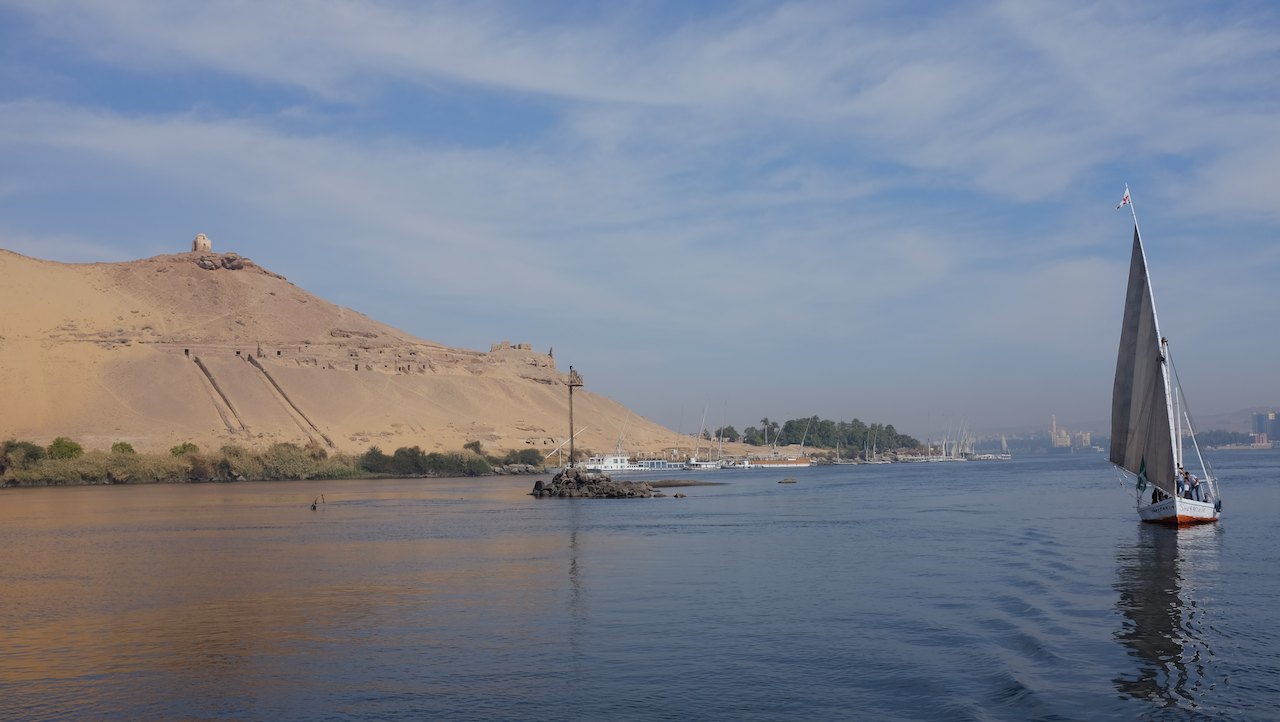
That afternoon and the next day we do virtually nothing. We sleep in late, drink tea with Mo and Sammy, go for a walk along the Nile and do work on the blog. On Saturday, Mo takes us to his village, introduces us to his parents and shows us his newly built home. We can use his computer to upload some pictures to the blog and help him to open a Facebook page for Adam Home. All in all a perfect relaxing ending to an otherwise busy week in Aswan.
Distance travelled to the ferry in Aswan: 7,692 km (4,779 miles)
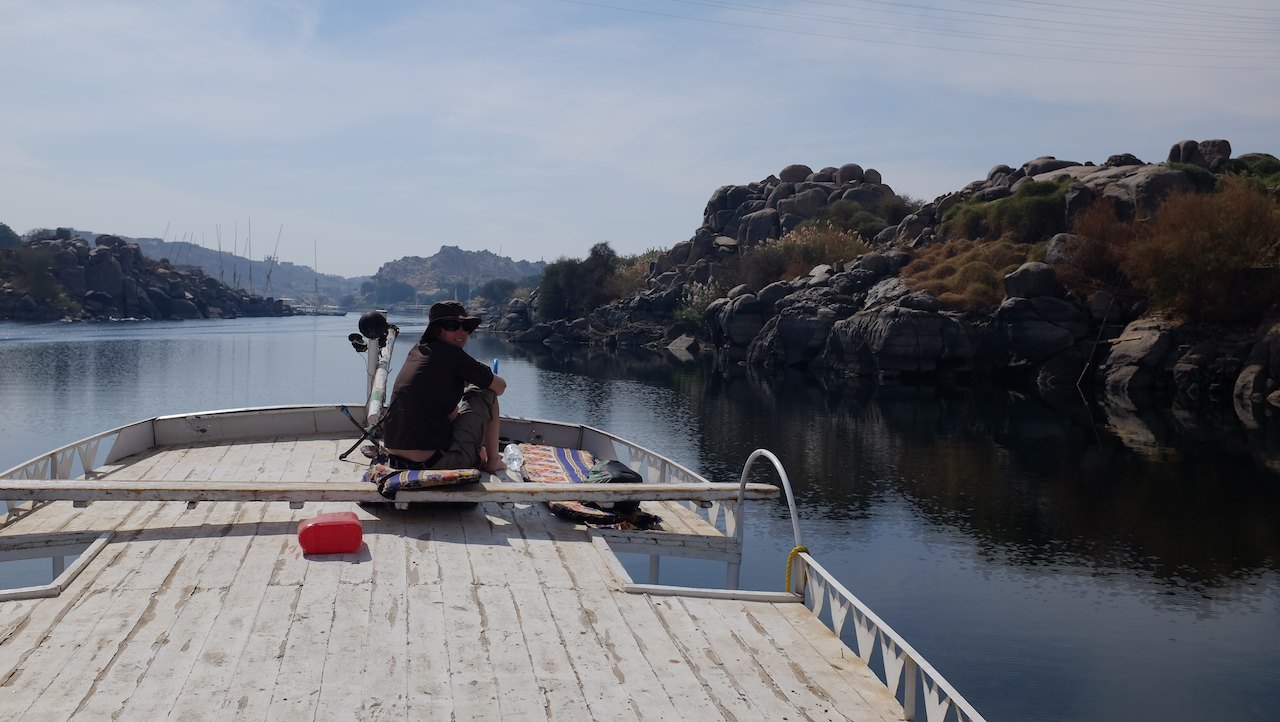
Last edited by -Leonie-; 13 Oct 2014 at 12:14.
|

9 Oct 2014
|
|
Registered Users
HUBB regular
|
|
Join Date: Feb 2011
Location: Cape Town, SA
Posts: 31
|
|
I'm really enjoying your trip, and all of the pictures!
Looking forward to the next installment!

|

13 Oct 2014
|
|
Registered Users
HUBB regular
|
|
Join Date: Dec 2009
Location: The Netherlands
Posts: 66
|
|
After a fun week in Aswan we leave for Sudan on Sunday. We will follow our bikes to Sudan where they have arrived on Friday (hopefully). We look forward to seeing our red and white motprbikes against in Wadi Halfa!. But it will still take some time, because we first have to take a trip with the ferry from Egypt to Sudan of about 17 hours!
We say goodbye to Sammy at Adam Home and get into Mo’s car with all our stuff. Again we first take the ferry across the Nile to the city. Kamal is waiting for us at the other side. There is a lot you can say about the man, but he always was where he said he would be. Upon seeing all our luggage he opens his trunk. Despite the fact that we had already sent part of our gear on the barge with our bikes, it still is quite a lot and quite heavy. It only just fits. Especially the bag with the helmets, the boots and suits, is very heavy. And to think that we could have just left those with the bikes, because if the bikes are stolen, the gear it not much use any more either.
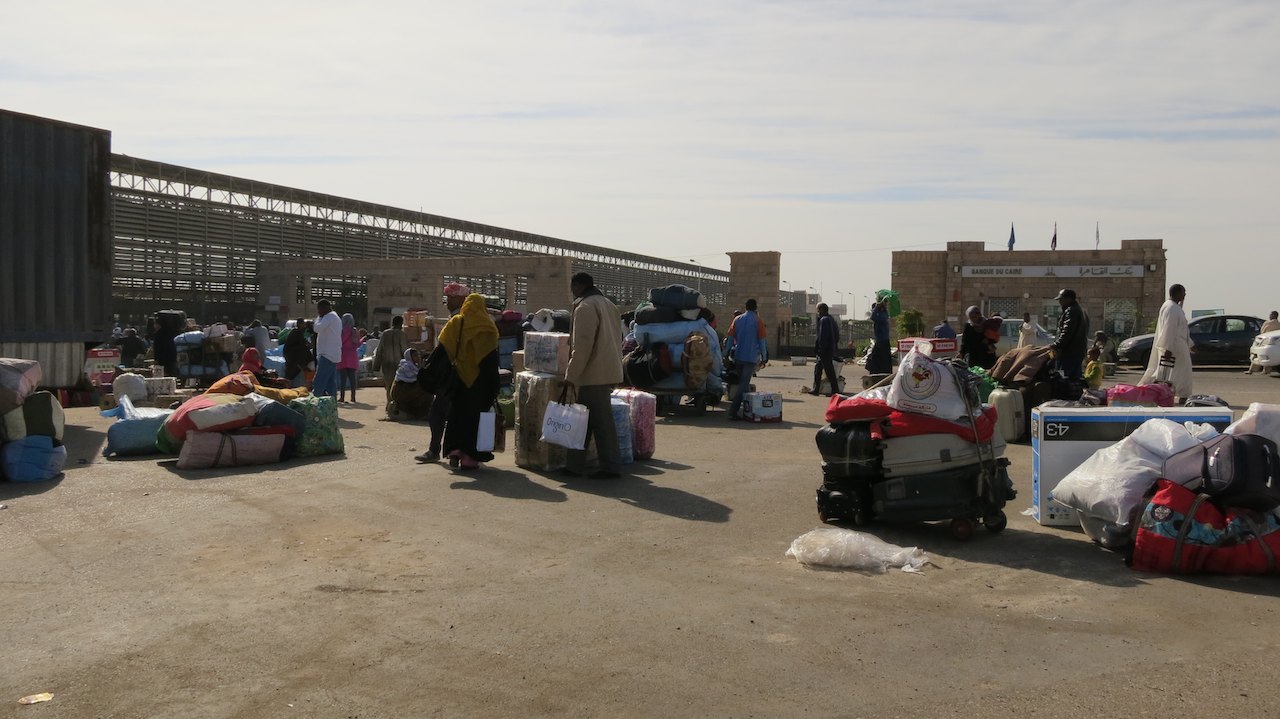
We buy some falafel sandwiches for lunch and then head towards the port with Kamal. At the entrance to the harbor it is already quite busy. A big difference with the days before, when we were there to put the bikes on the barge. Everywhere are people waiting between huge piles of suitcases and boxes until they are allowed to enter the port area. We do not only see suitcases with clothes, but also boxes with televisions, computers, kitchen appliances and even refrigerators. It is reminiscent of the fully loaded cars that we saw in the harbor in Italy heading for Tunisia. We understand that especially electric appliances are currently not for sale in Sudan. The Sudanese now buy their stuff in Egypt and the United Arab Emirates. This is why the boat is not only full of people, but also with an extreme amount of luggage. Each passenger drags along at least five heavy bags or boxes.
Carriers in blue smocks offer to bring the luggage to the boat for a small fee. The young men carry things on their backs, the slightly older men with worn backs pull a loaded cart behind them. Between those passengers and all their luggage are street vendors who offer to sell drinks, nuts, books and blankets. Others walk around with a pile of banknotes offering to change Egyptian Pounds to Sudan Pounds.
Kamal parks his car and presses us to stay in the car with the windows closed until he is back. We see him walking to the entrance of the port and chatting with the guards. Then he comes back. He helps us unload, parks his car further away and leads us to the entrance. With the help of additional straps that Peter has attached to the luggage, we carry all our stuff passed the waiting passengers. Kamal apologizes for not being able to help us carry the luggage. He can only do so after our bags are checked in customs. At the entrance Kamal leads us along a long row of passengers.
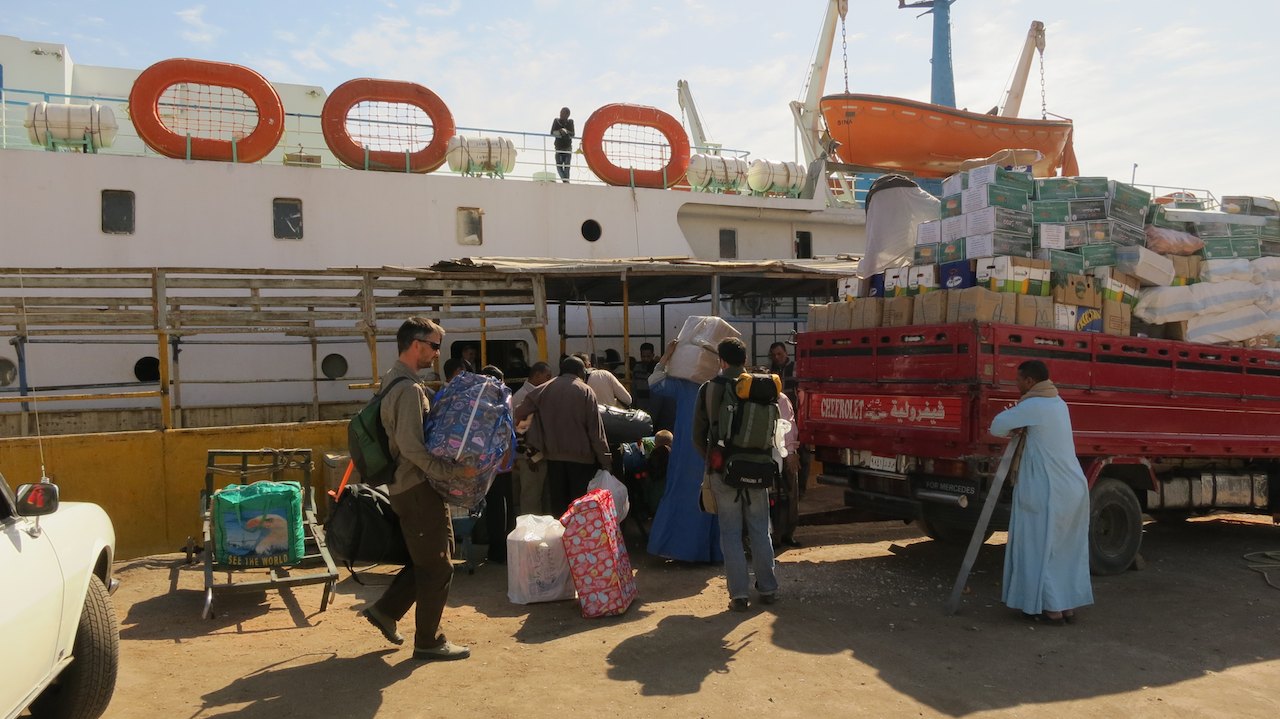
Kamal looks at the guard, he nods at him and then we are allowed inside the port area. There we first have let the customs check our luggage. There is only one scanning device in the port. A few days earlier when we had our bags checked, it was very quiet and we had a good chat with one of the employees there. Now it is not quiet at all!
When we arrive the door to the scanner is still closed and a long row of passengers is waiting outside. When the door suddenly opens, the row of waiting passengers splashed and everyone runs forward to put his bag in the scanner first. All luggage is thrown on the belt and forms a high stack within seconds blocking the scanner. The guards explode. They throw all the luggage off the belt again, scream with a red head that everyone should step back and then close the door of the building again. Then they come out to do some more shouting.
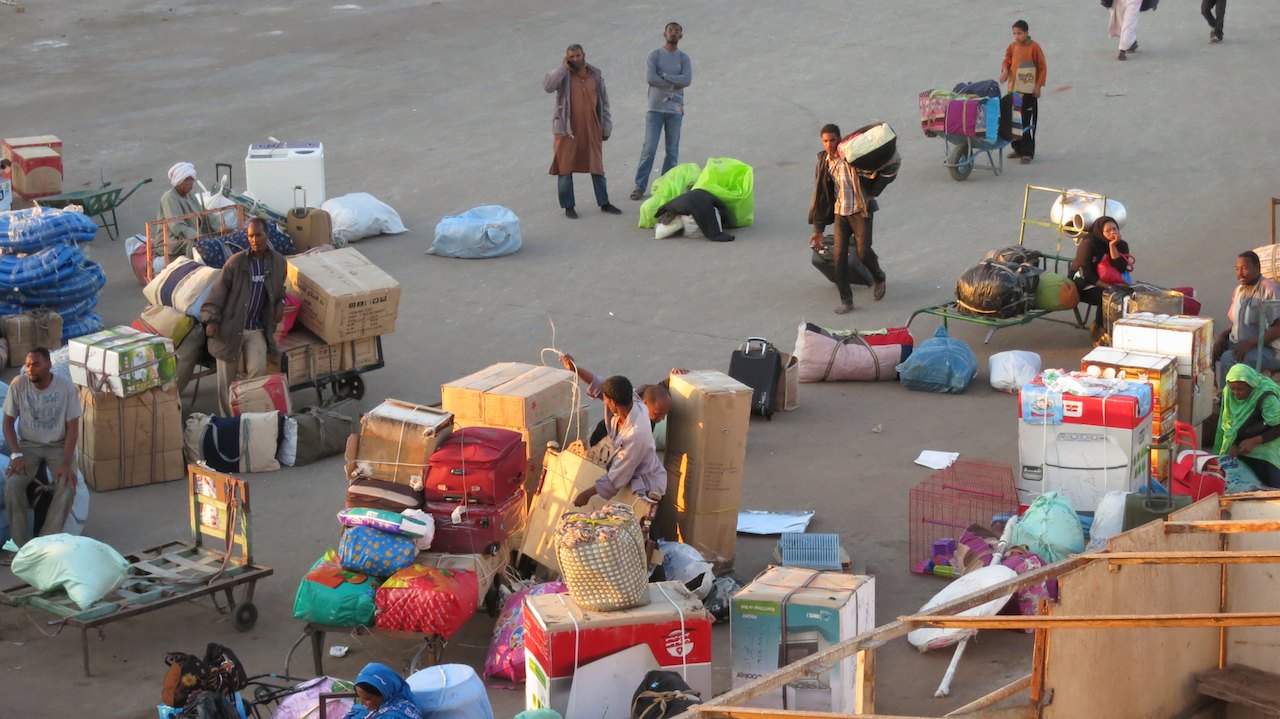
Among them is they guy we had a chat with a few days earlier. A friendly smile appears on his angry red face when he sees us. Not long after the doors open again and we are guided by Kamal with our luggage to the beginning of the row. The babbler takes our luggage and puts it in the scanner, while snapping at the Egyptian and Sudanese passengers that they have to get out of the way. We are glad our stuff is now been checked quickly, but we also feel awkward to be treated with priority.
Kamal takes one of our bags and walks in front of us to the harbour office for the final formalities. One of the things that needs to be sorted out is, crazy enough, our visa for Egypt. We thought we had already obtained one when we entered Egypt from Libya, but unfortunately that was not the case. We then paid, but received no sticker in our passports. We already thought that to be a little strange, but since we did receive a receipt, we thought it was OK (see “From pillar to post”). Later it became clear that we were cheated anyway and the receipt was worth nothing. In our passports it was written in Arabic that we would pay for the visa upon leaving Egypt. That is in Aswan. After we have paid 200 Egyptian Pounds per visa we get our passports back with stamped visa stickers.
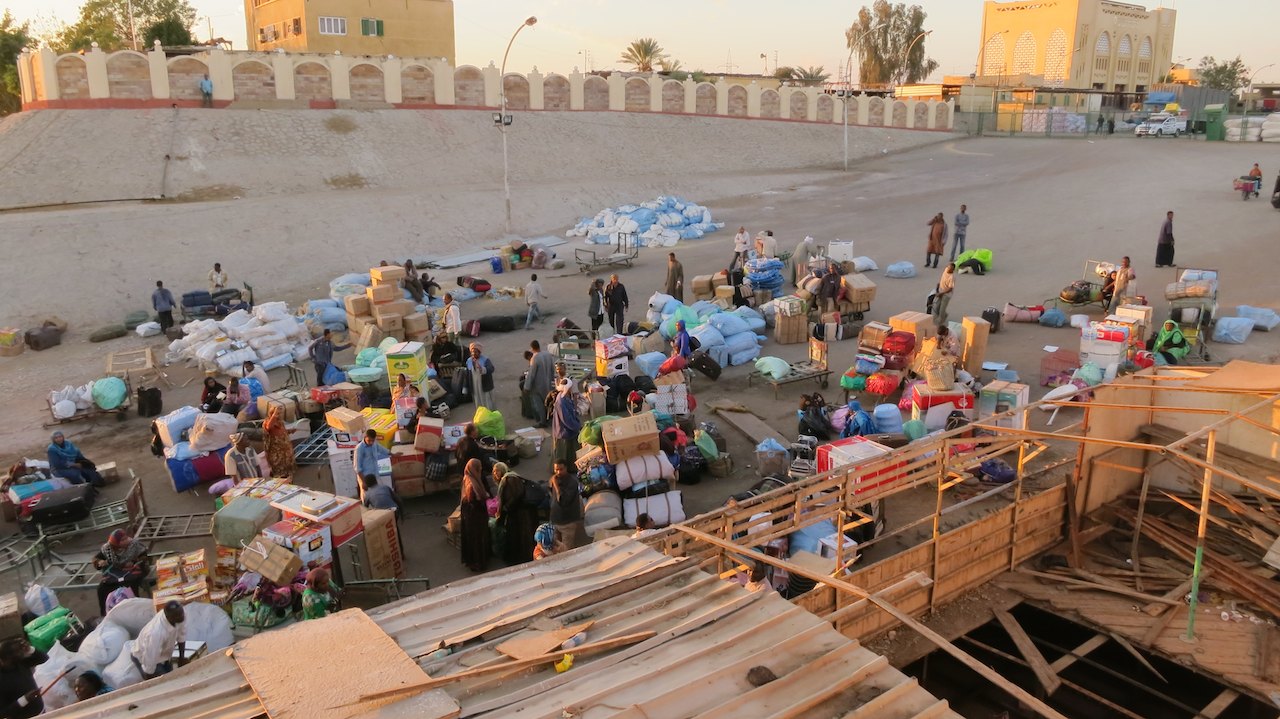
The port office is also a lot busier than it was in the previous days. We do not seem be the only one that had a priority treatment, for almost all foreign tourists are already in the hall. We meet Luca, an Italian backpacker traveling to South Africa by public transport. In the hall are also three bikes from a French family with three children traveling through Africa by pushbike. The eldest son of seven cycles himself and the youngest two boys (aged five and two) sit together in a bike trailer behind the bike of their father. Very special!
Once our tickets are checked, we can go to the ferry. We had not been able to obtain a place in a cabin so we will have to sleep on the deck of the boat. We had already understood that if you pay the captain 50 Egyptian Pounds each, he allows you to sleep next to the bridge on an enclosed piece of the deck. That is about EUR 10 and we think it is a good idea. Kamal leads us onto the boat and takes us to the captain, to whom we pay his pocket money. Then we say goodbye to Kamal on the ferry. When we see him walking on the quay later, he calls Peter again and waves with both his arms high in the air. A big difference with the cool encounters during the last couple of days. All in all, we have spent some special days with Kamal in Aswan. We are pleased that we did not have to arrange everything ourselves, but we still feel that we paid too much. Mixed feelings so to say.
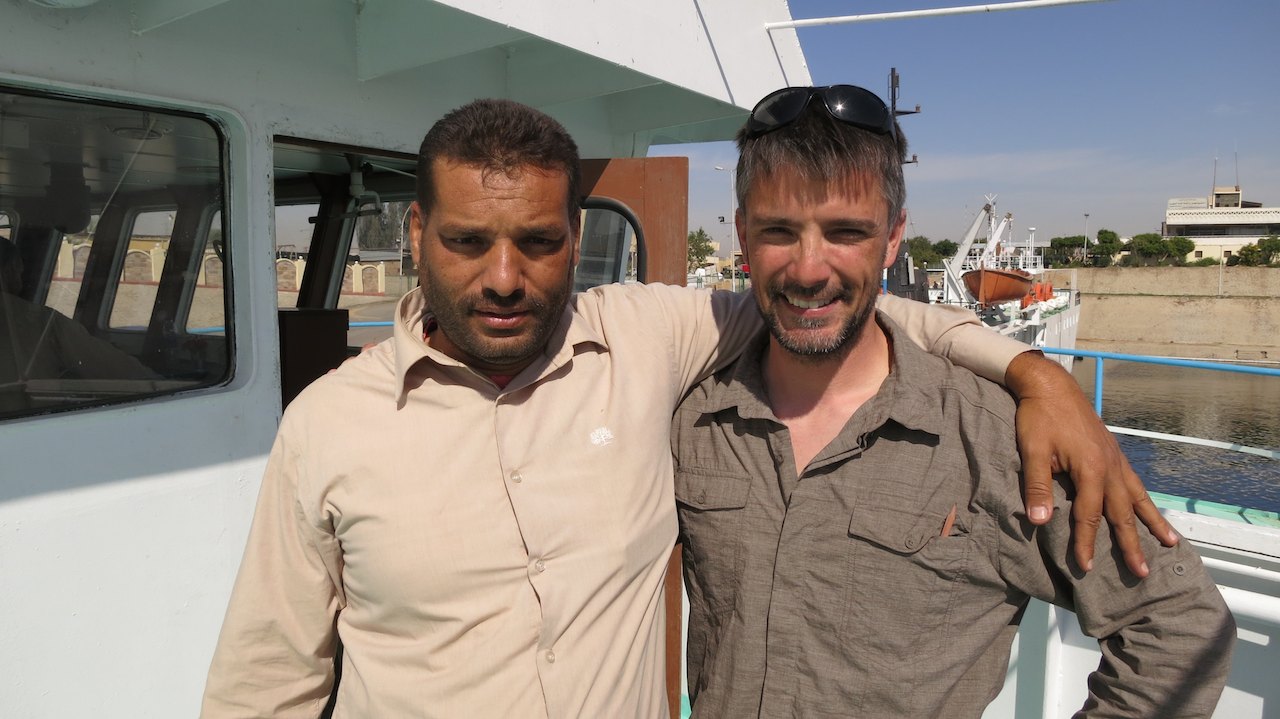
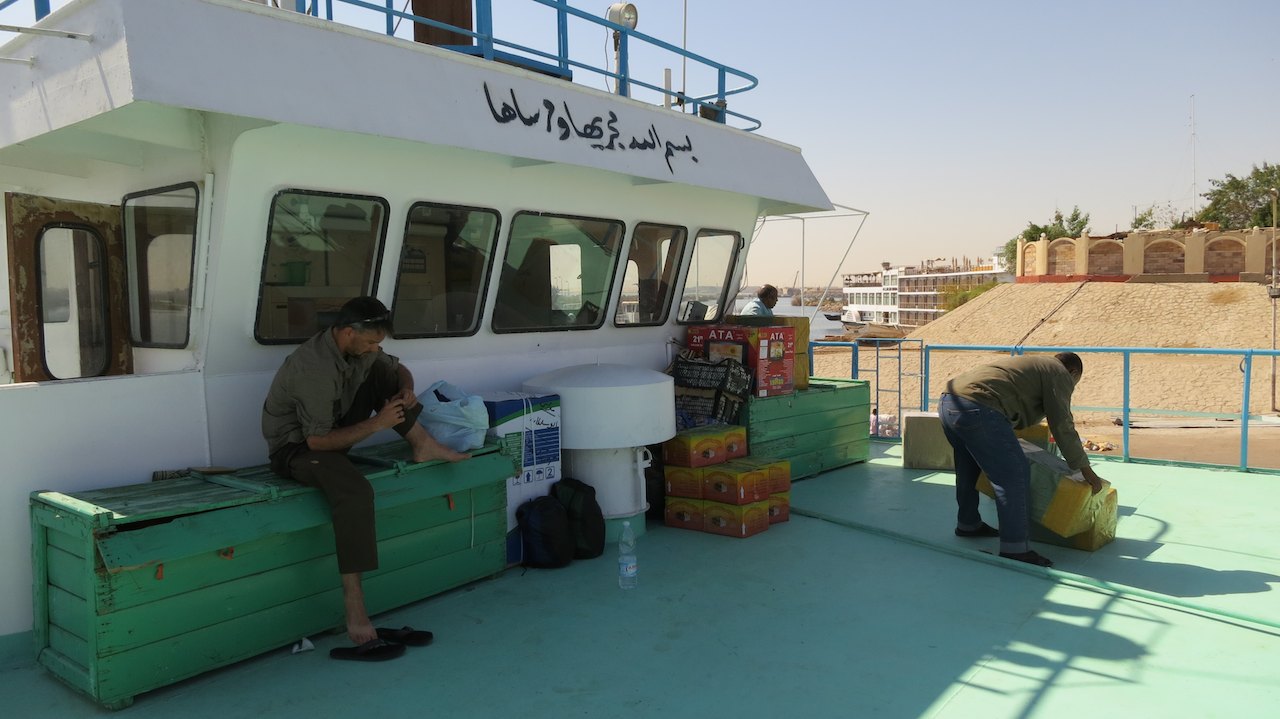
It is 10:30 AM when we goodbye to Kamal. The boat will only leave at the end of the afternoon, probably around 05:00 PM. We look for a place in the shade, eat our sandwiches and take out our e-readers. While we are reading, the boat slowly fills with passengers. If I go to the lower deck to go to the (now still reasonably clean) toilet, it appears to be utter chaos there. I end up in a mass of pushing and shouting people who make their way to the banks on the lower deck with all their belongings. At the entrance of the “first class” is an employee of the ferry holding a large iron gate to stop people from going in. He keeps the gate in front of him as a shield while he tries to push back the crowd with his full weight. The whole thing is reminiscent of a noisy herd of cattle that is pushed back in the barn.
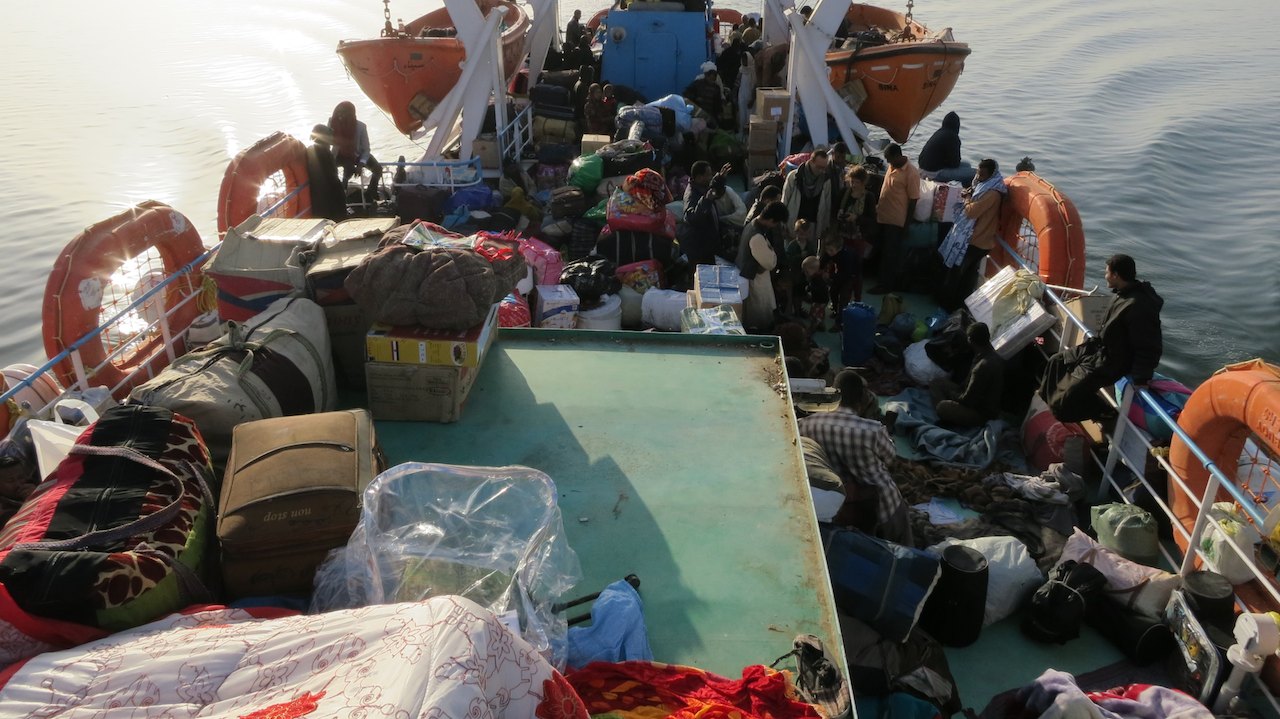
I walk on to the restaurant, through the crowded lounges on the lower back, towards the upper deck. I have a chat with the other tourists. Luca and the French family have found a shady spot under one of the lifeboats. Meanwhile, there are two Chinese cyclists and two Chinese backpackers who have joined them. In awe we watch how the deck around us is crammed with luggage. Passengers are trying to safe a spot to sleep by putting cardboard or a blanket on the floor. The French family has even set up their tent on the deck, but it is a real struggle to even keep the spot. There is more and more stuff coming up and the stacks on deck are getter higher, while the quay is still full of luggage and there are also still people -with additional bags- coming out of the port building. Here and there quarrels arise. At some point the lifeboats are even filled with luggage. It is an unimaginable chaos.
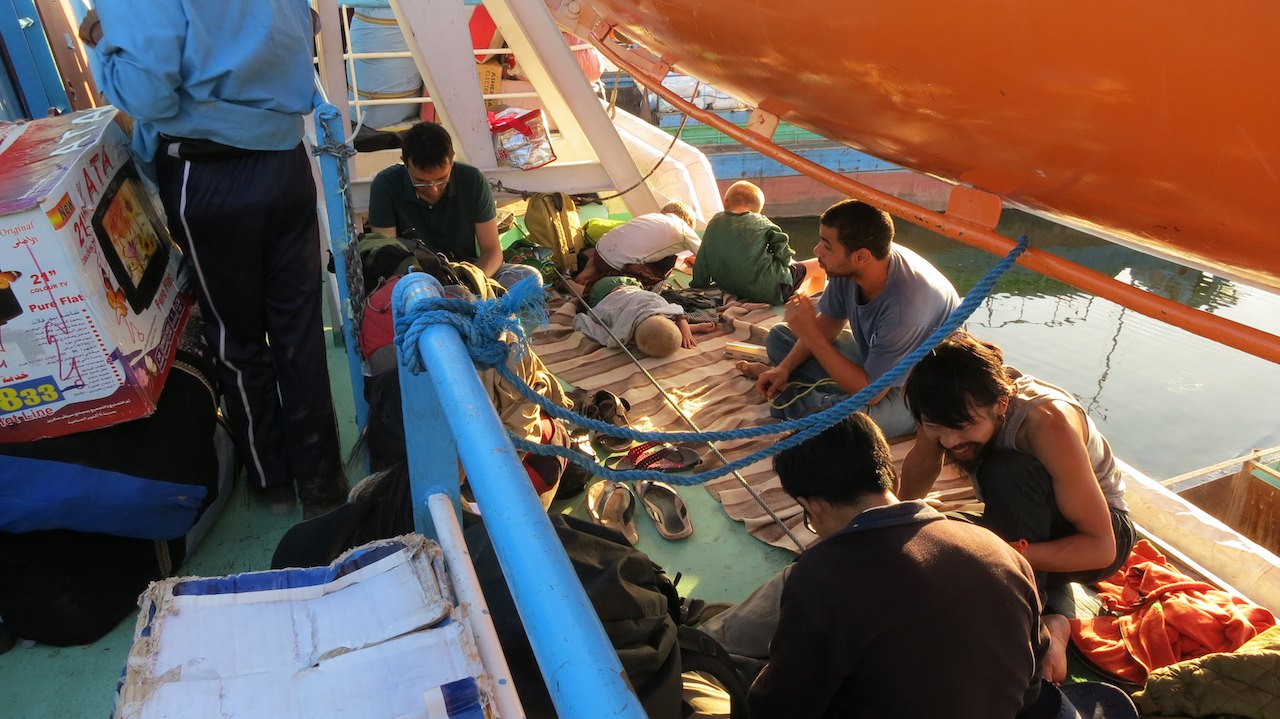
When I go back to Peter, who stayed with our stuff, I notice that our sleeping area has also been filled with luggage. The deck in front of the bridge is full of televisions, computer monitors and crockery. Our ’sleeping spot’ had been crammed with boxes of cornstarch. Like the passengers on deck, we also begin to ’defend’ our spot, by putting our airmats on the floor to safeguard our spot.
In the course of the afternoon, it is clear that the boat will not leave anytime soon. The quay is still full of boxes when we see the sun go down and the passengers next to us turn toward Mecca to pray to Allah. On the deck the passengers have kept a space free for prayer, but there is not enough room for all passengers. If the first group has completed their prayer, they make room for others so that eventually everyone who wants to call on Allah has the opportunity to do so. It might be a good idea to call upon the help of a higher power because the boat is now so full that we could use all help in case of any shipwreck.
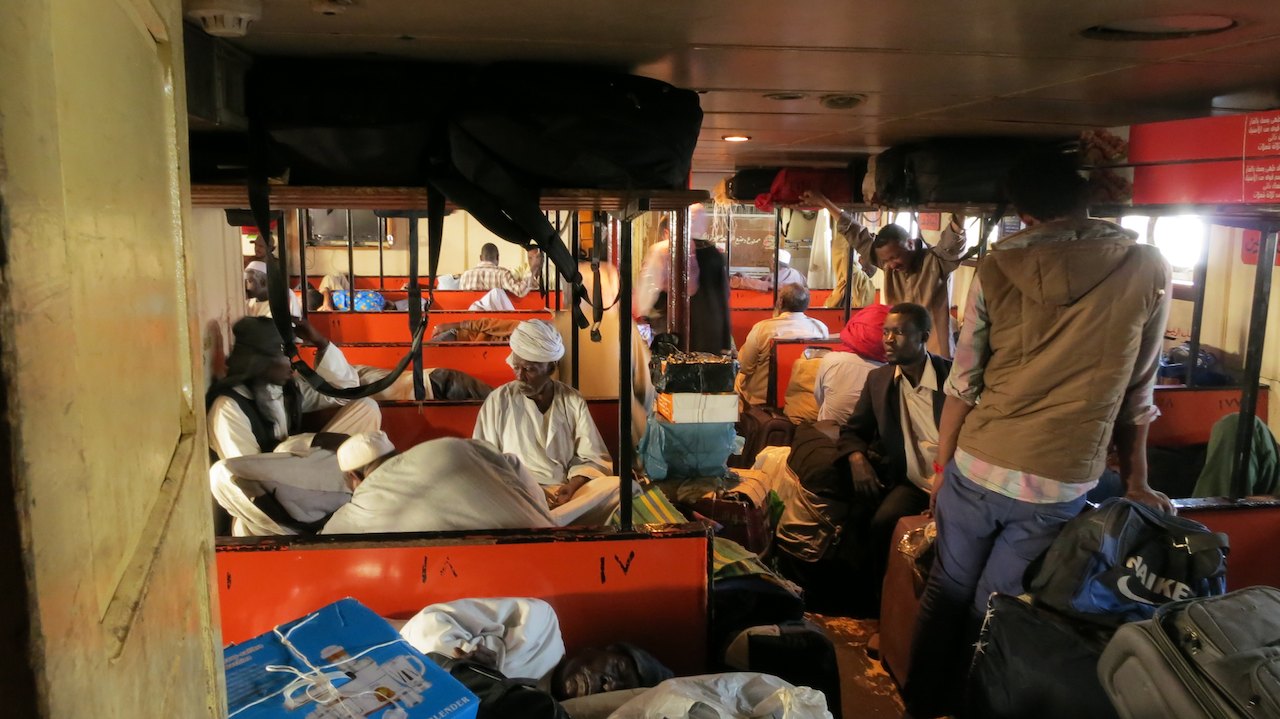
A lot of people stop for a chat with the captain in the bridge. It is not always clear what their role on the boat is: captain, first officer, manager, customs or just a passenger. Unlike in Europe we cannot recognize them by their uniform. One of them, a tall man with a big belly in a brown shirt with short sleeves approaches us and says -somewhat out of nowhere- that we should give him our passports. If we laugh and say that we will do no such thing, he is suddenly very upset and says that we will not get into Sudan then. He appears to be working for Sudanese customs. He is not wearing his uniform now, because he is still on Egyptian territory. After we have understood that all other tourists have given him their passports, we decide to ’obey his order’ and give ours as well.
Our tickets not only gives us the right to sleep (on deck), but also to a meal. We doubt on the hygiene in the kitchen, especially with the now very filthy toilets in mind, but decide to give it a try anyway. Peter goes downstairs to the kitchen with our dinner vouchers and returns with two plates of vegetables, boiled potatoes and chicken. It looks good and smells good too. It tastes surprisingly good.
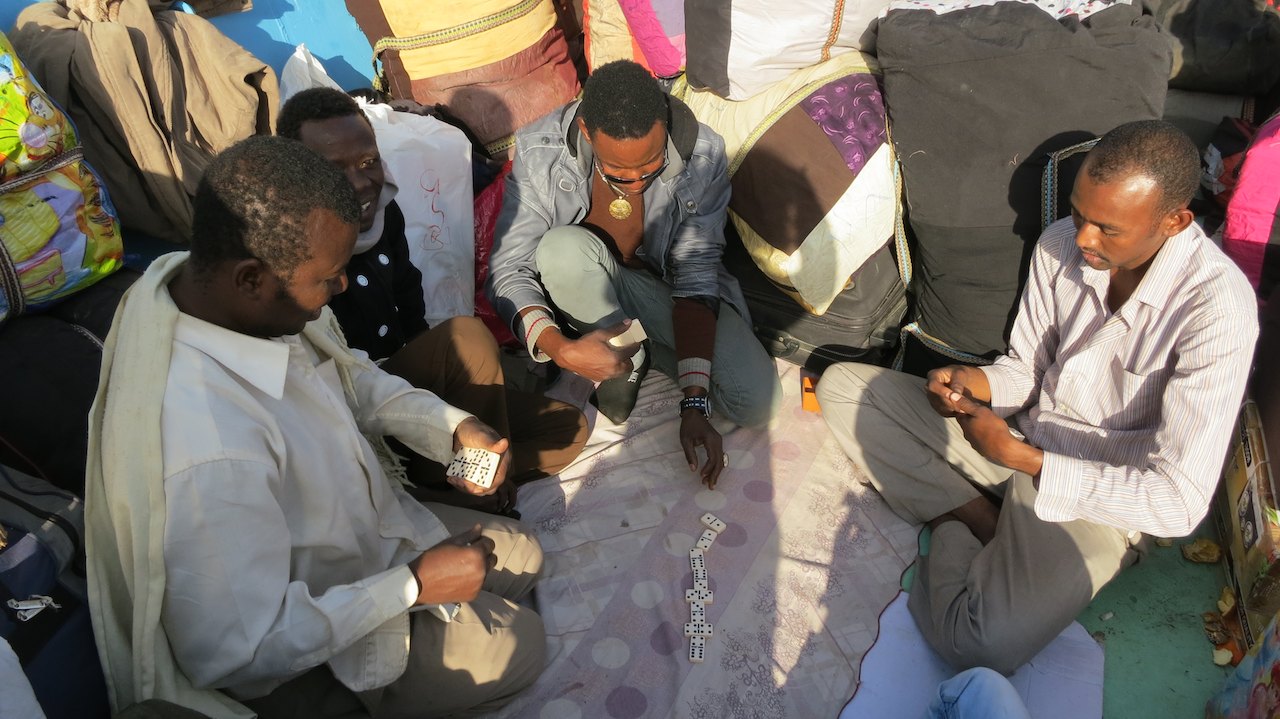
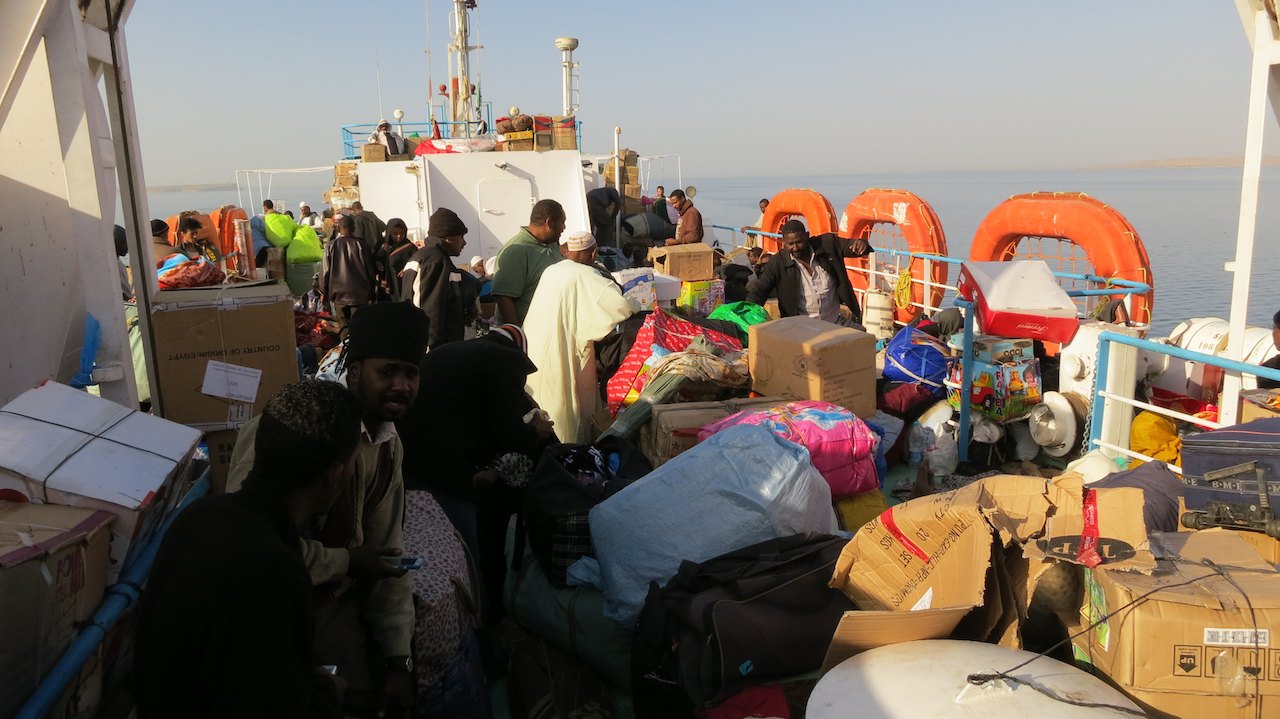
Our place next to the bridge is relatively quiet compared to the rest of the ship. Yet there are people who come to chat with us now and then. We meet four young (very beautiful) Egyptian girls. They are dressed in Western clothes and we initially ask where they are from. We are surprised to hear they come from Cairo. With two other women, they are on their way to Sudan to Meroe to visit the pyramids. They want to take a bus from the port in Wadi Halfa to the pyramids and return with this same ferry to Egypt 24 hours later. A quick visit to Sudan, but it should be possible.
All four went to a French-language high school. They do not only speak very good English, but also speak French fluently. They all just started studies at university and are about to go abroad for their studies. It is very interesting to hear about their lives in Cairo. Each of them comes across as a very strong young women that is doing a very good job in a culture that is mainly dominated by men.
The sun has set and it is quite dark now. Luggage is still taken up from the quay and loaded on the ship. It does not look like we will be leaving any time soon. The girls do not have another option than to leave the ship, otherwise they will not make it back in time for their flight home. As we say goodbye to the ladies, it is almost 09:30 PM.
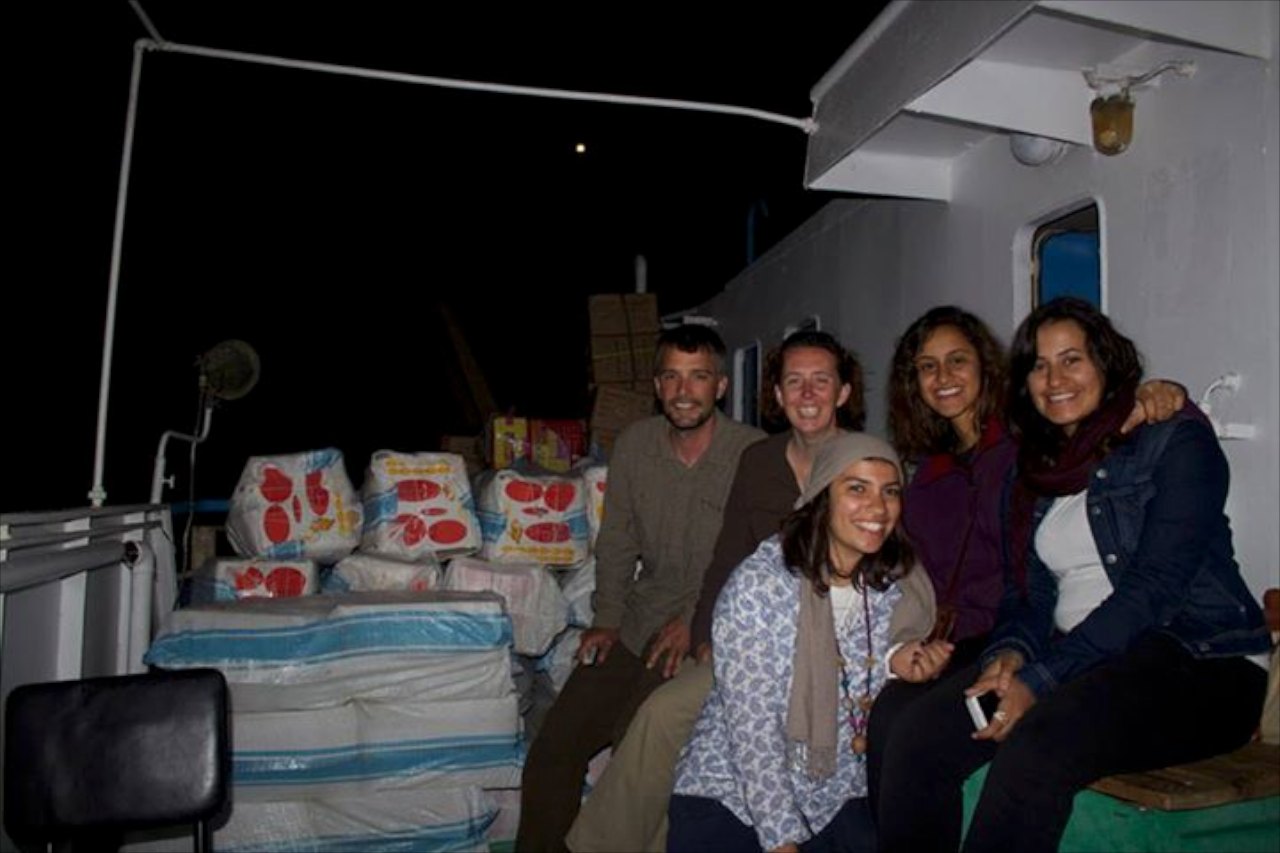
The door to the bridge opens again and out come three beautiful Sudanese women. They make themselves comfortable on the floor and are given blankets by the captain. The captain again closes the door to the bridge and turns off the lights. It looks like we will share our spot with them this night. It is a clear night and it starts to get a little chilly. We are both a bit tired and decide to try to get some sleep. Without shoes, but with all our clothes on, we crawl into our sleeping bags. It does not take long before I fall asleep under the stars.
When I wake up after a while, I see the stars move above me. We have left Egypt! I get up and stand in my sleeping bag to look over the railing of the boat. It is pitch dark and there are a lot of stars in the sky, a beautiful sight. There is a chilly wind. Happy we have left the port, I get back on my mat again and crawl deep into my sleeping bag for another few hours of sleep. If I opens my eyes again a few hours later, the sun is already low in the sky. We smell fresh coffee coming from the bridge. On the roof of the bridge our French fellow travelers look out over the water. When the boys see us lying in our sleeping bags they come to the edge of the roof to have a chat. It is still early, but they are already full of energy.
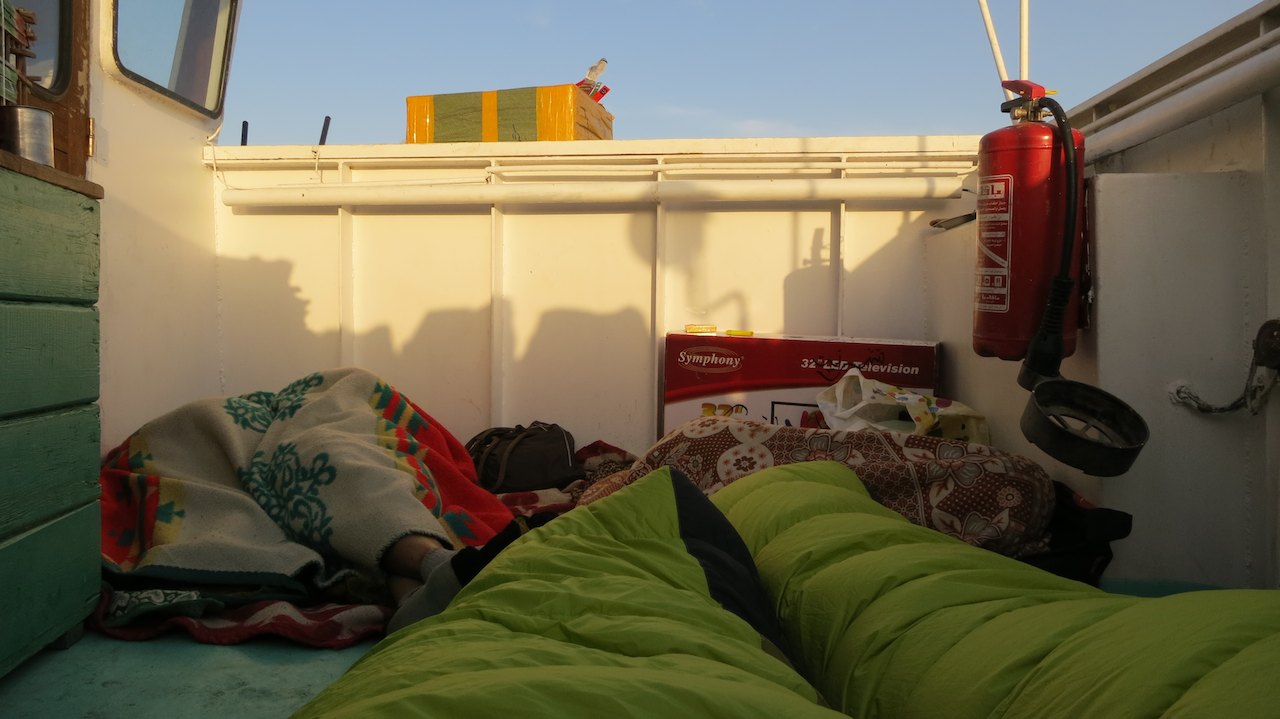
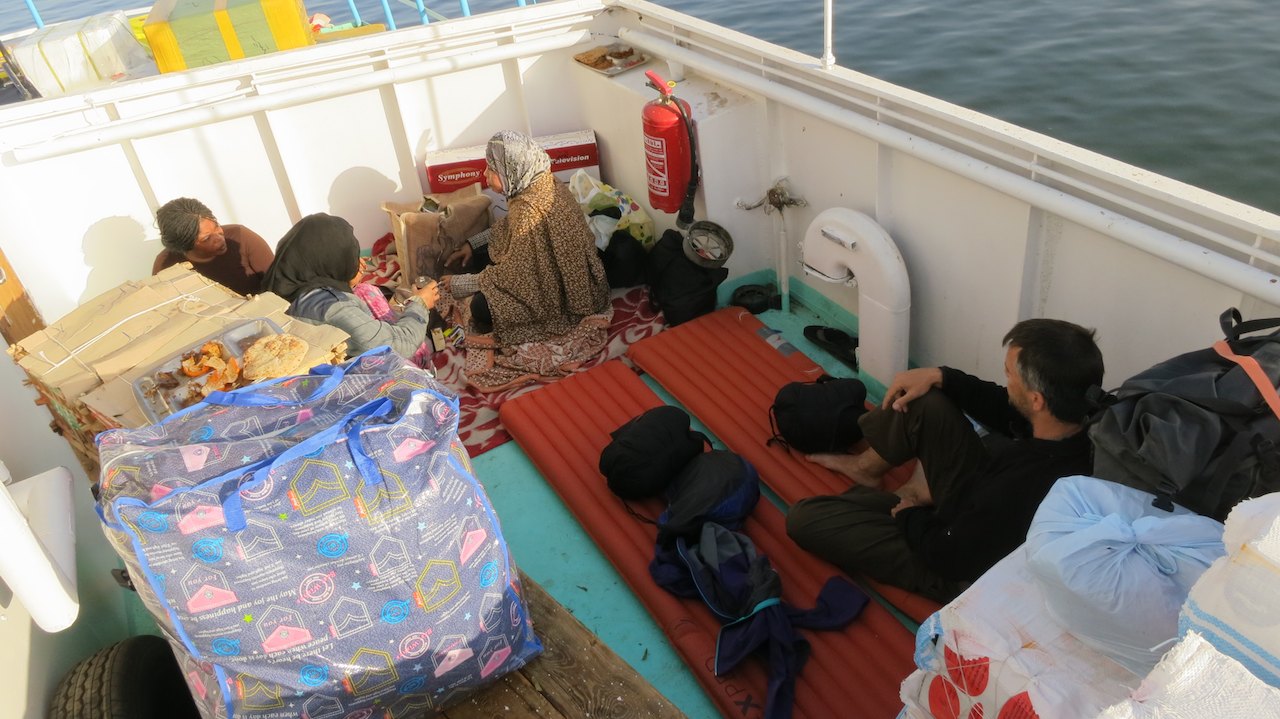
The pile of blankets at the foot end of our bed starts to wake up. One by one the ladies show up from under the blankets. Out of their bag comes a water boiler, which they give to the captain. While the water is boiling, they take out cups, tea and sugar. A little while later, Peter and I are enjoying a cup of sweet mint tea while the ladies smoke one cigarette after another. They do not speak much English, but with hand gestures we can surely talk a bit to each other.
Now we are awake, I have to go to the toilet. The toilet was very dirty already the night before and the situation will not have improved. Armed with toilet paper, a towel and a large block of soap, I dare to go to the lower deck. When I enter the washroom, I am glad that I am wearing my shoes. There is about three centimeters of water (at least I hope it is water) on the ground and it smells pretty special. Water leaks from the pipes everywhere, but the toilet does not flush. Like I am preparing for open-heart surgery I thoroughly scrub my hands and try to freshen up. I only hope I will not have to go to the toilet again. I go back to Peter. And now I am back at our stuff, he can now go to the toilet. When I see that he is still wearing his flip-flops, I can only just stop him to hand over his shoes.
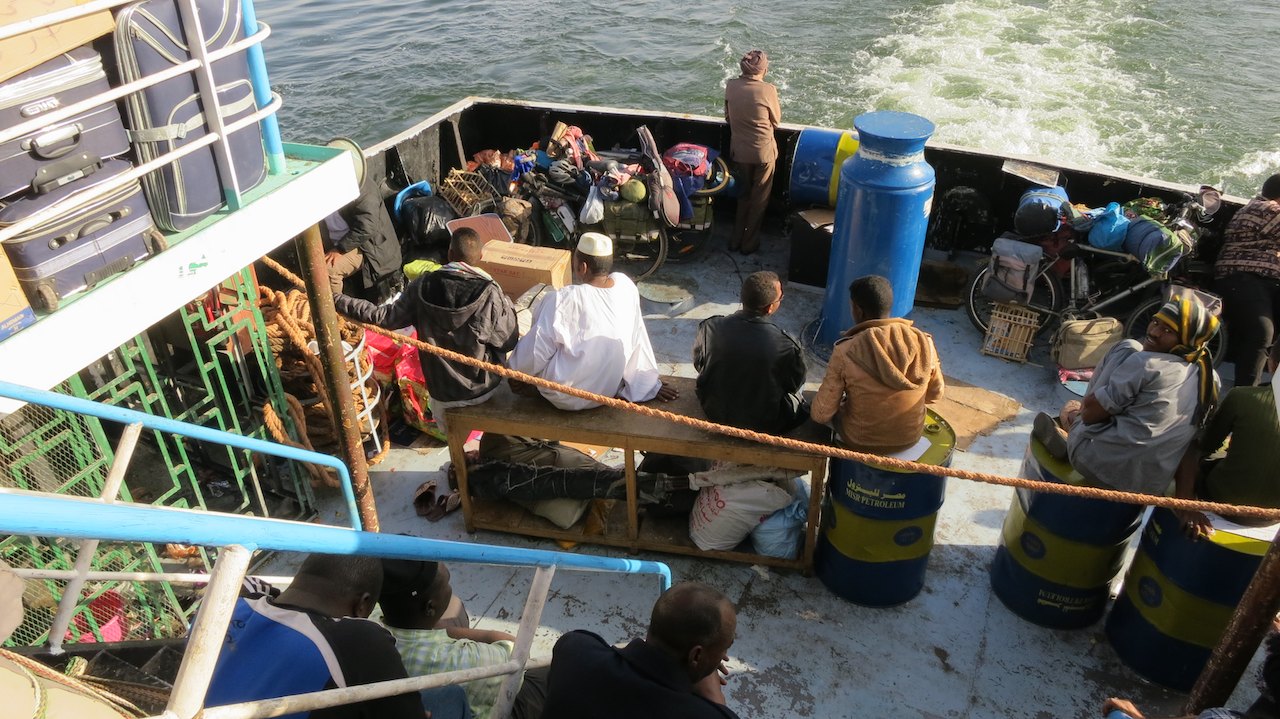
While we have been on the move all night, it will still take until the end of the afternoon before we arrive in Sudan. We take away our mats and sleeping bags and find a spot on top of the boxes with cornstarch. At the end of the morning the ferry will pass along the temple complex Abu Simbel. The temple was formerly on the Nile. Because of the plans to build a dam in Lake Nasser in Aswan, Abu Simbel would disappear under water. To prevent this, the temple was broken down and rebuilt on higher ground to safe it from the rising water. The temple is now on Lake Nasser and can be seen from the ferry. The captain specifically comes out of the bridge to tell us that we are almost at Abu Simbel. We take our cameras and find a nice spot for a picture. We are not the only ones! When I look to the right, I see that all passengers on deck a looking over to watch Abu Simbel. Great to see!
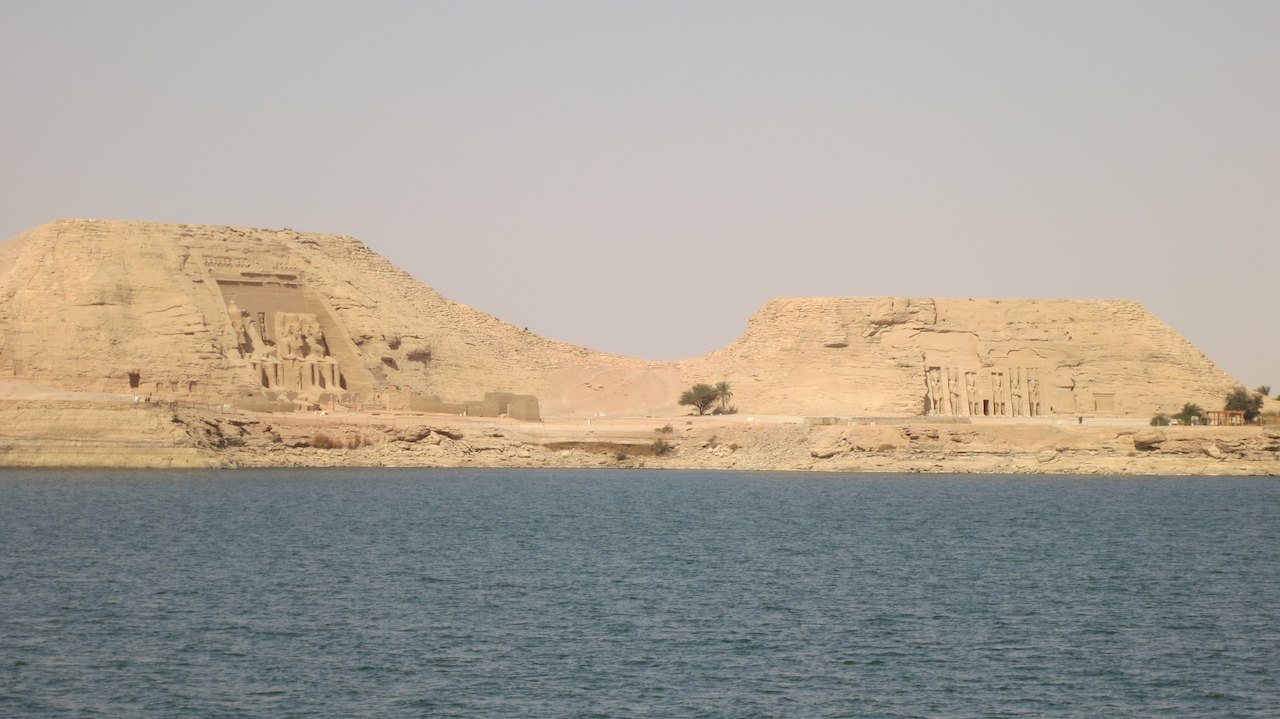
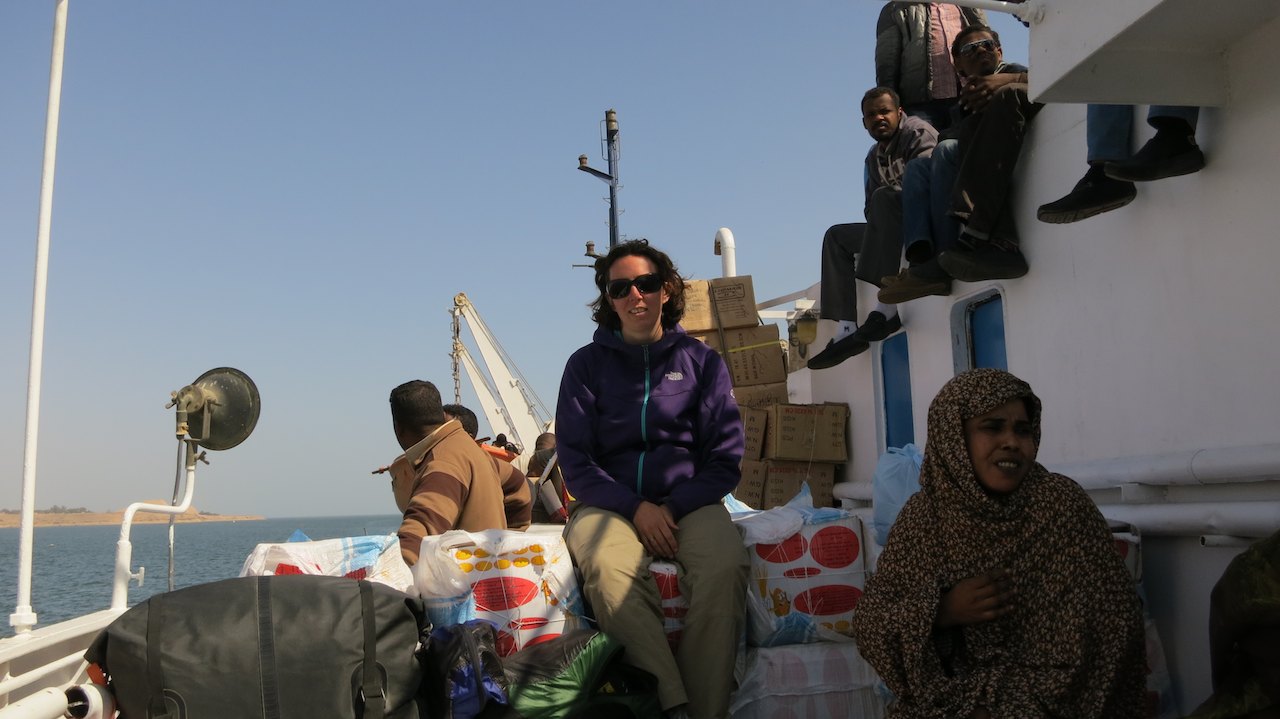
The remainder of the day we hang around on the ferry. We talk to the Sudanese women and eventually share a lunch with them we received from the captain. We take turns to walk around the ship to chat with other passengers or to buy a drink. At the beginning of the afternoon, we are allowed to pick up our passports. The customs guy has now put in his uniform and possibly looks even stricter than the day before.
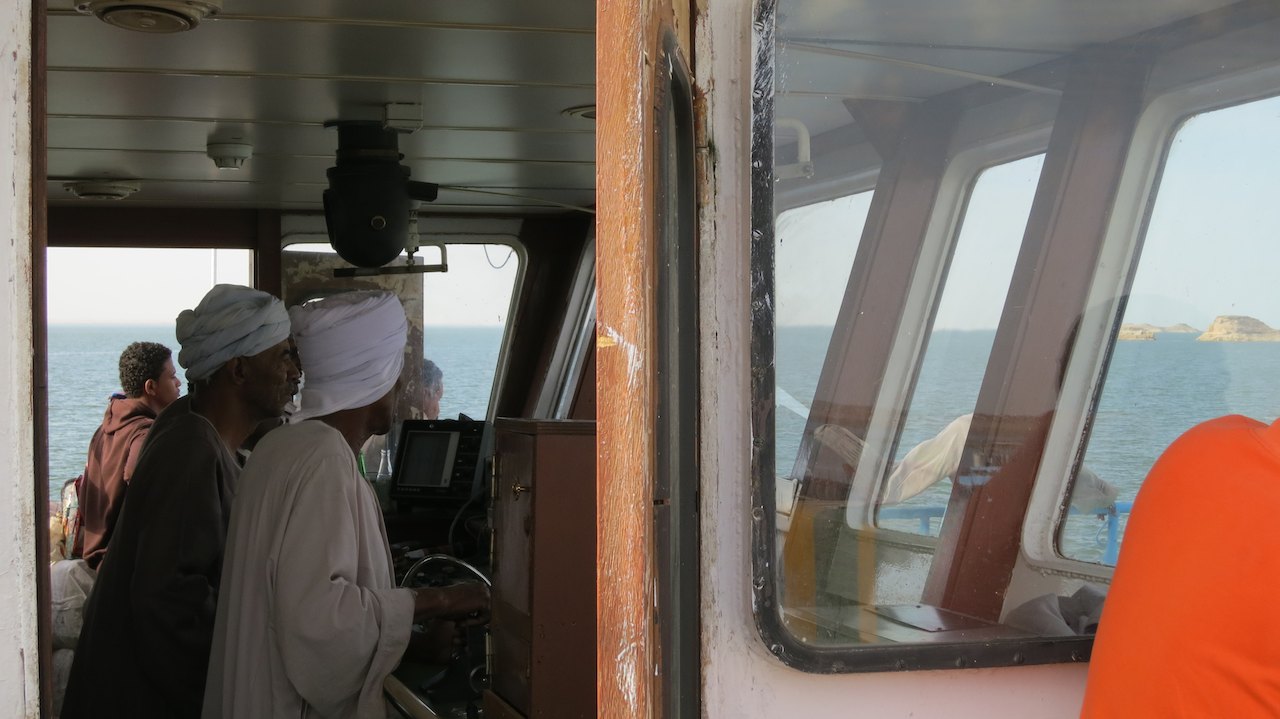
It is warm in the sun and the time passes very slowly. Especially once I have finished my book (Murder on the Nile, what other book could I read). We are pleased when we are told by the captain that we will arrive in about an hour. Around us the first people start to move their luggage to the lower deck.
After a while, we see a quay looming in the distance. We only see a few low buildings, not what you would expect from a city with a port. On one of the quays we see a cargo ship like to one we put the bikes on. The cargo ship is still too far away to see it clearly, but we can just see some vague ‘red -and-white’ spot. Would that be the bikes? If we take a picture and zoom to see the details, we can clearly identify our two bikes! Great, as least they made it to Sudan, we now only have to see in what state.
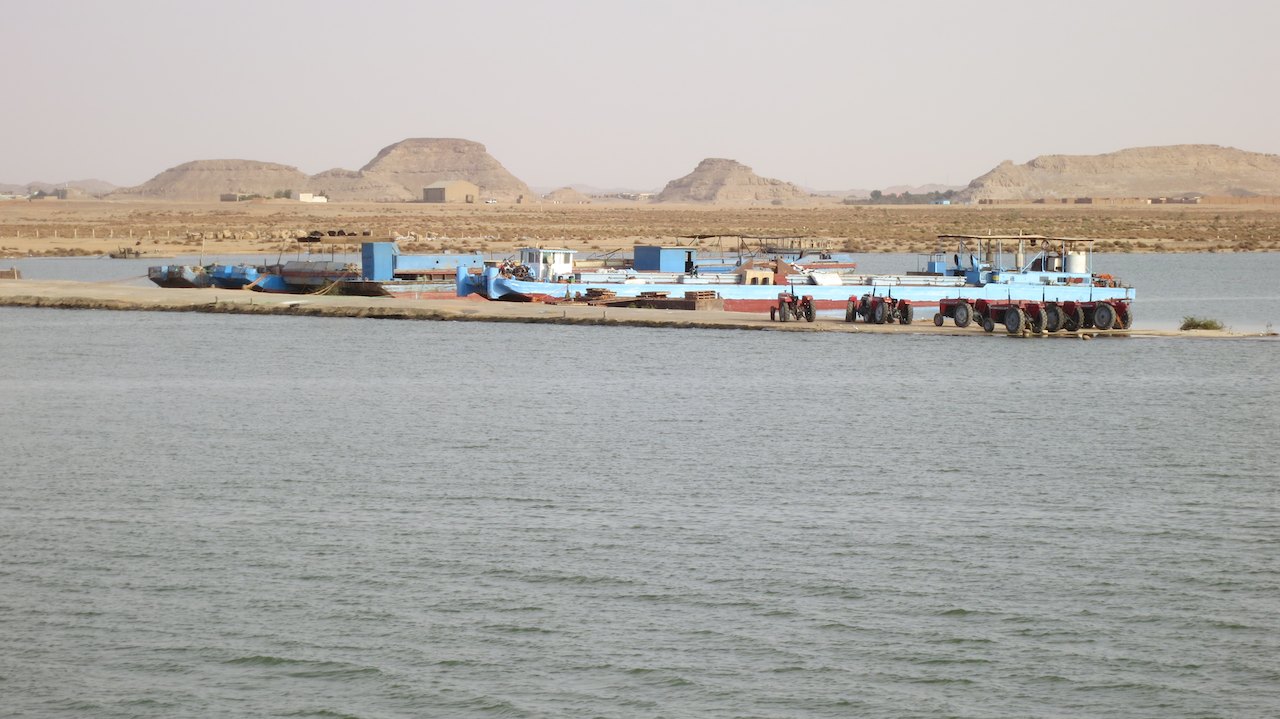
As the boat pulls up, we are told that we are allowed to go below deck. We drag our stuff through the narrow corridors of the ship and make our way down. We are first stopped in the canteen. We sit down next to all other foreign tourists and fill out some forms for the Sudanese customs. Then we are allowed to leave with a copy of the forms we have just filled out.
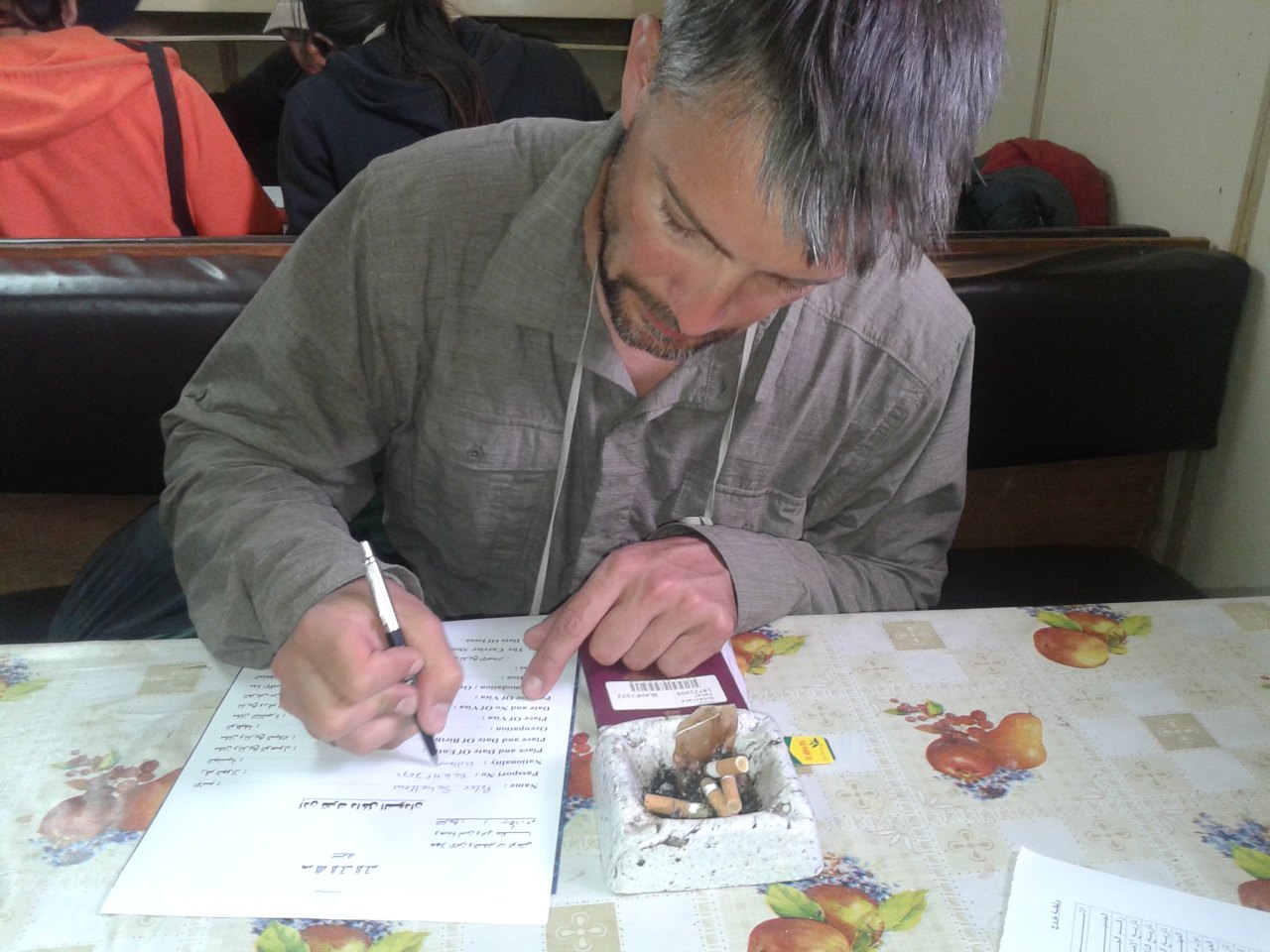
The door is already open and in the aisles are many people pushing their way out with their heavy bags. Leaving the ferry in Tunis is a joke compared to this. I try to be a proper and kind Dutchman by waiting my turn. However, when everybody keeps passing me, even old gray ladies, I decide to put aside my good manners and just as brutal as the Sudanese and push my way out. Step by step we get closer to the exit. Just when we get our heavy stuff up the stairs, we are stopped by two men: “ Where is your form?“. They want the form that we had just neatly tucked away and they want it NOW. While I can nearly stand up straight, I grab my backpack and get out the forms. I see Peter do the same. We can finally go off the boat. It is still one small step and then we are outside, in Sudan!
Distance to Wadi Halfa: 7981km, of which 298km by ferry. (4,959 miles of which 185 miles by ferry)
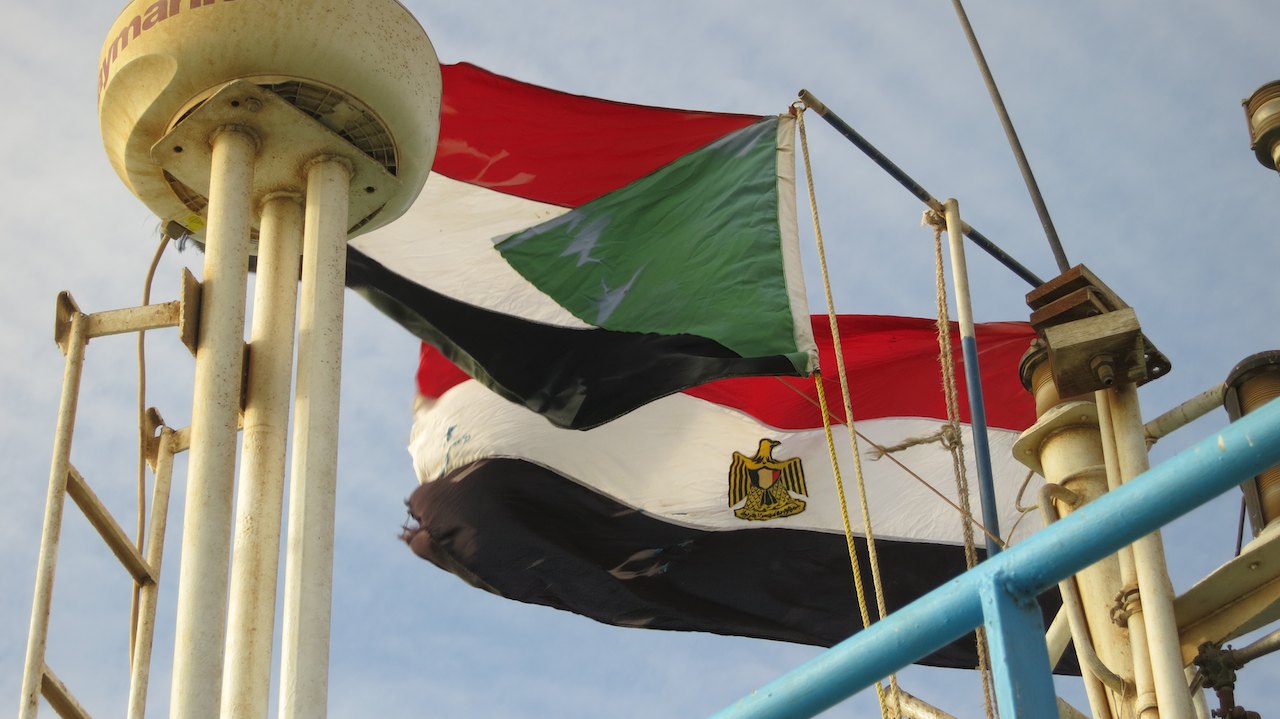
|

13 Oct 2014
|
 |
Registered Users
Veteran HUBBer
|
|
Join Date: Jan 2006
Location: Yuma, Arizona, USA
Posts: 548
|
|
|
It has been an interesting report, just with the ferry part! Maybe it is the 'ugly American' in me, but compared to Egypt, which I would be most excited to do, and is on my mental 'bucket list,' going to Sudan would be just a little more palatable than entering North Korea with a suitcase full of Bibles! I am sure you will find more excitement there than I believe is available, but I think my experience with that country will be limited to reading your reports. I do eagerly await to read them, even if I have no desire to go there myself...
|

30 Oct 2014
|
|
Registered Users
HUBB regular
|
|
Join Date: Dec 2009
Location: The Netherlands
Posts: 66
|
|
Once on the dock, we drag our luggage to the direction of the Sudanese customs. Mazar, our fixer on the Sudanese side, had already informed us that he would wait for us there. It is warm and the bags seem even more heavy than usual. Sweaty and with a red face we arrive at customs.
There we meet Mazar, a young, busy guy with a cheerful face and a contagious laugh. He wears neat trousers, black shoes and a blue shirt. He welcomes us to Sudan, puts our passports in his briefcase and asks us to follow him. Then it suddenly goes very quick. Before we know it our luggage is checked, we have a stamp in our passports and we sit in the back off an old Landrover pickup that brings us to a hotel. We have not seen the motorbikes yet. Yes, a red-white glimpse in the distance, but no more than that. Our boat was delayed and the customs office has already closed. All the administrative stuff concerning the bikes will have to wait until the next day. So we have to wait another night and only then we will know how the motorbikes have endured the journey.
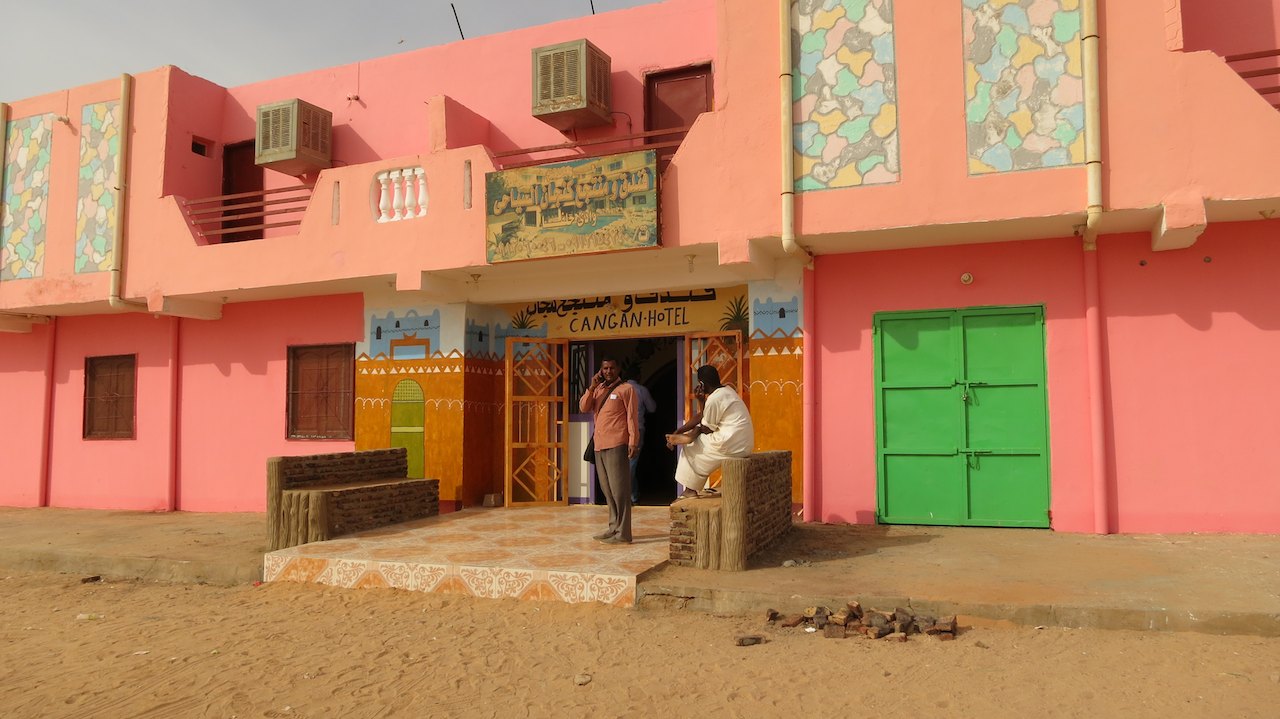
Mazar has booked us a room in the pink Cangan Hotel, which is said to be the best hotel in Wadi Halfa. He has booked one of the better rooms, with a private bathroom. Once in the room, it shows that this sounded better than it actually is. Let’s just say that the room meets the ’African Standard’: a door that does not close, sockets of which the wires are hanging out of the wall, a floor full of dried drops of pink paint, a closet with a broken mirror, a dip in the mattress, stains on the cushions, a toilet that does not flush and a cold shower that sometimes works and sometimes does not. Fortunately, we are already quite used to this now.
When there is water, we both manage to take a quick shower after which we go to the restaurant for chicken and salad. There we meet Volker and Mülle, two Germans who ride their motorbikes from Cape Town to Cairo. Mülle rides a Honda Africa Twin, the type of motorbike that Peter has left at home. Like Peter, Mülle is a true ’Twin-lover’. The remainder of the evening we talk about motorbikes and share exciting stories about Africa.
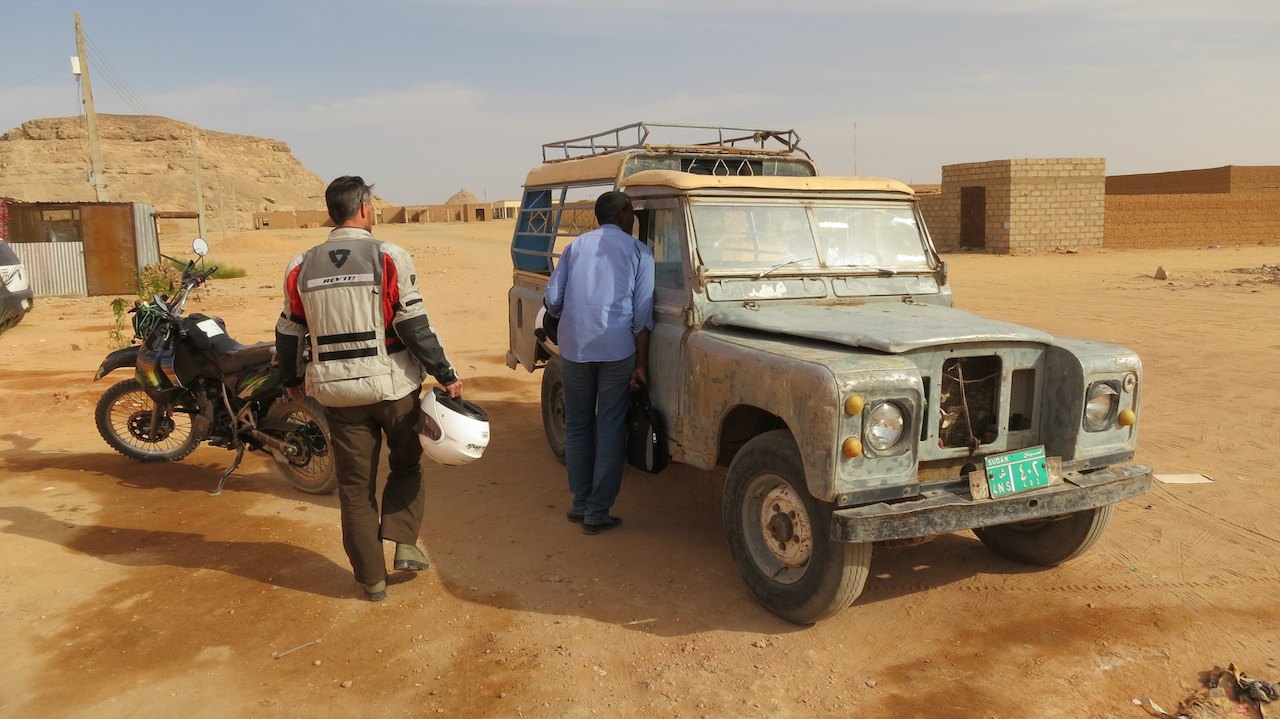
The next morning the moment is there: we can pick up the motorbikes! In the back of the Landrover taxi we bounce over the sandy roads to the port. I cannot wait to be back on my own bike again. Mazar, again dressed in neat trousers and a blue shirt, rides behind us on his Kawasaki KLR that was given to him by a happy customer. His briefcase tightly clamped between his leg and the tank and his eyes half-closed against the dust.
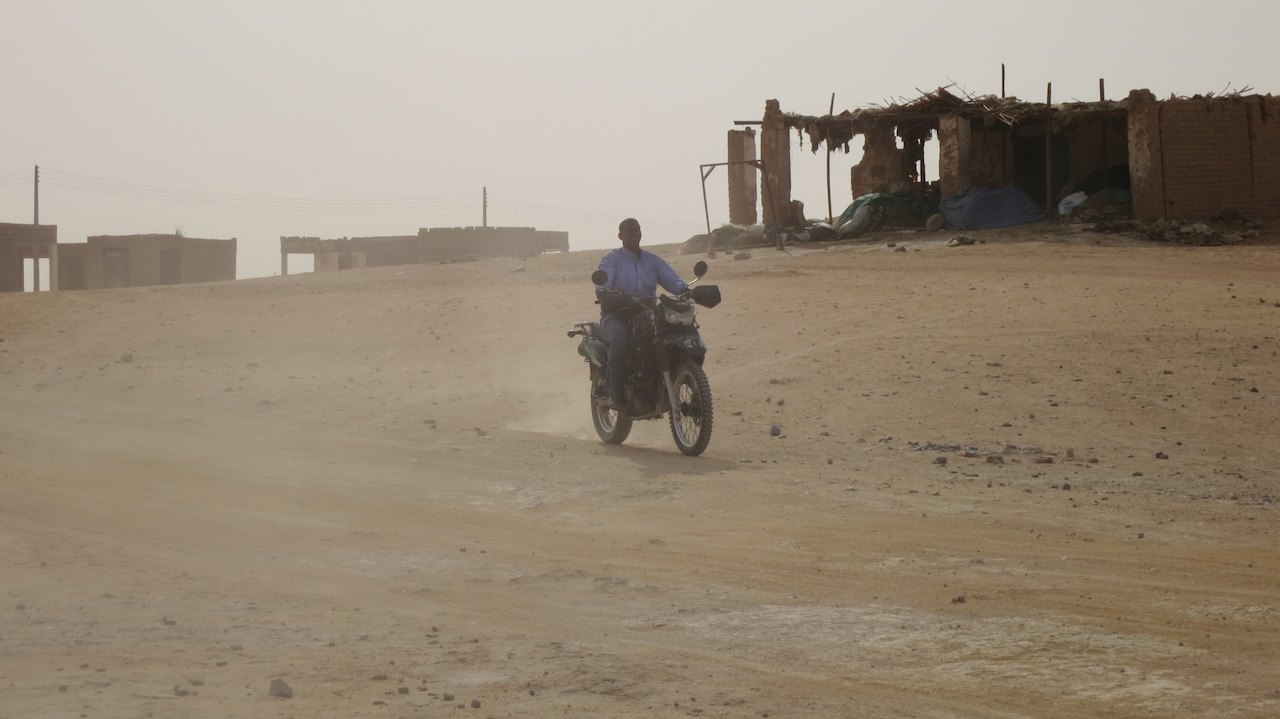
Once in the harbor, we give our papers to Mazar. Volker and Mülle are also in the harbor with their fixer. They will go north and have to put their motorbikes on the barge today. We see both fixers disappear in the customs office and then the long wait begins. The four of us stand in a corner of the harbor and continue talking where we left off the previous night, the usual motorbike talks about tire pressure, oil usage and broken petrol pumps. Around us the harbor is getting more and more busy. The boat for Egypt only departs in the beginning of the afternoon, but the first passengers already gather in the port area. Again with many large, heavy suitcases.
It takes at least three hours, until after lunch of the customs staff, before we get permission to go to the barge with motorbikes. The closer we get to the boat the more clearly we can distinguish two bikes. They stand next to each other on the deck, just where we left them, but now with a thick orange rope that is wrapped around them. They were certainly secured tightly during the trip.
The way the boat is mored to the dock, it is impossible to drive the motorbikes off. After some consultation with the captain, the ship is turned and mored parallel to the quay. Then a structure is built with a pontoon, scaffold planks and some pallets to our bikes off and to put the motorbikes of Mülle and Volker on. Once we are on the barge, we free our bikes from the orange rope. They look good and all our stuff is still on the bikes. Fortunately, they have survived the trip. When the captain then hands over our keys, our relief is complete. With the help of the crew, Peter takes of the bikes and safely parks them on Sudanese soil.
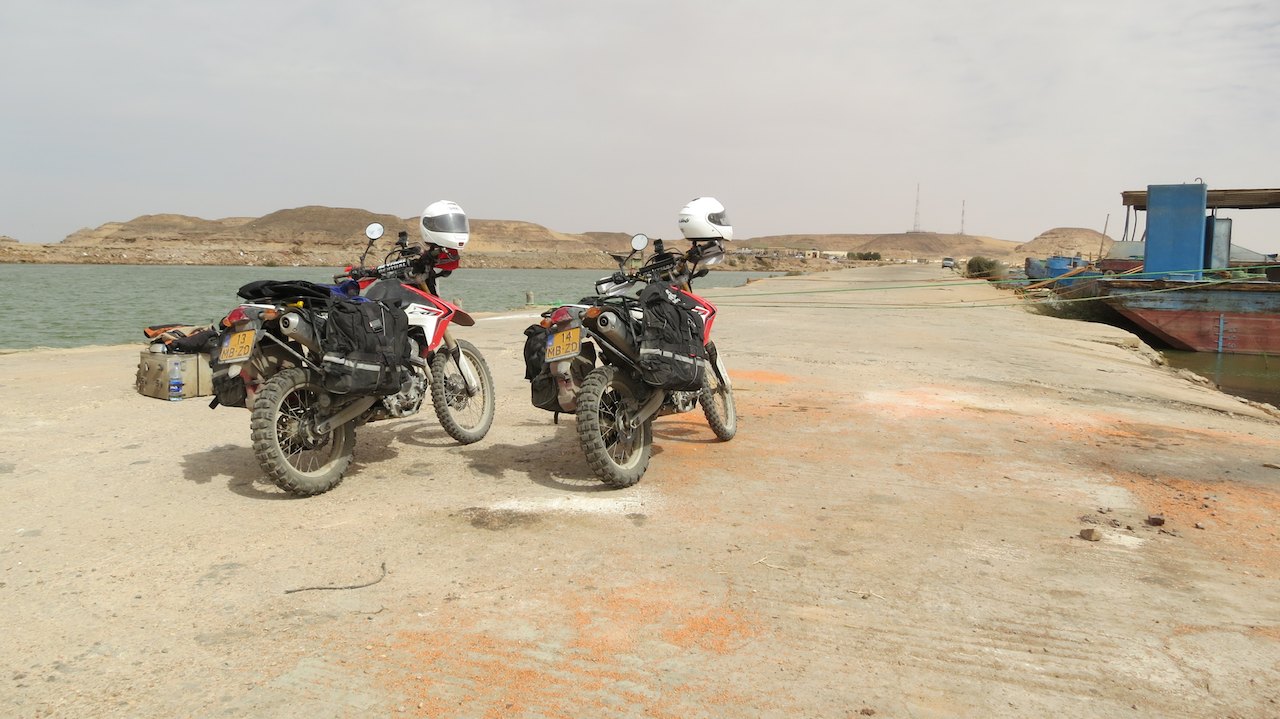
Then it is up to Volker and Mülle to put their bikes on the barge by the same shaky construction of pallets and scaffolding planks. The captain, another man than we had met in Aswan, had not been so happy with the place where our bikes had been parked. They were so close to the anchor wrench, that it had been almost impossible to throw out the anchor (just like we feared!). Mülle and Volker therefore have to do it the hard way: drive along the edge (on the quay side), take the bikes over a 50cm high metal threshold, then turn tightly twice and finally park along the edge (on the waterfront). The route that we still had deemed impossible, they now have to take with their much larger bikes.
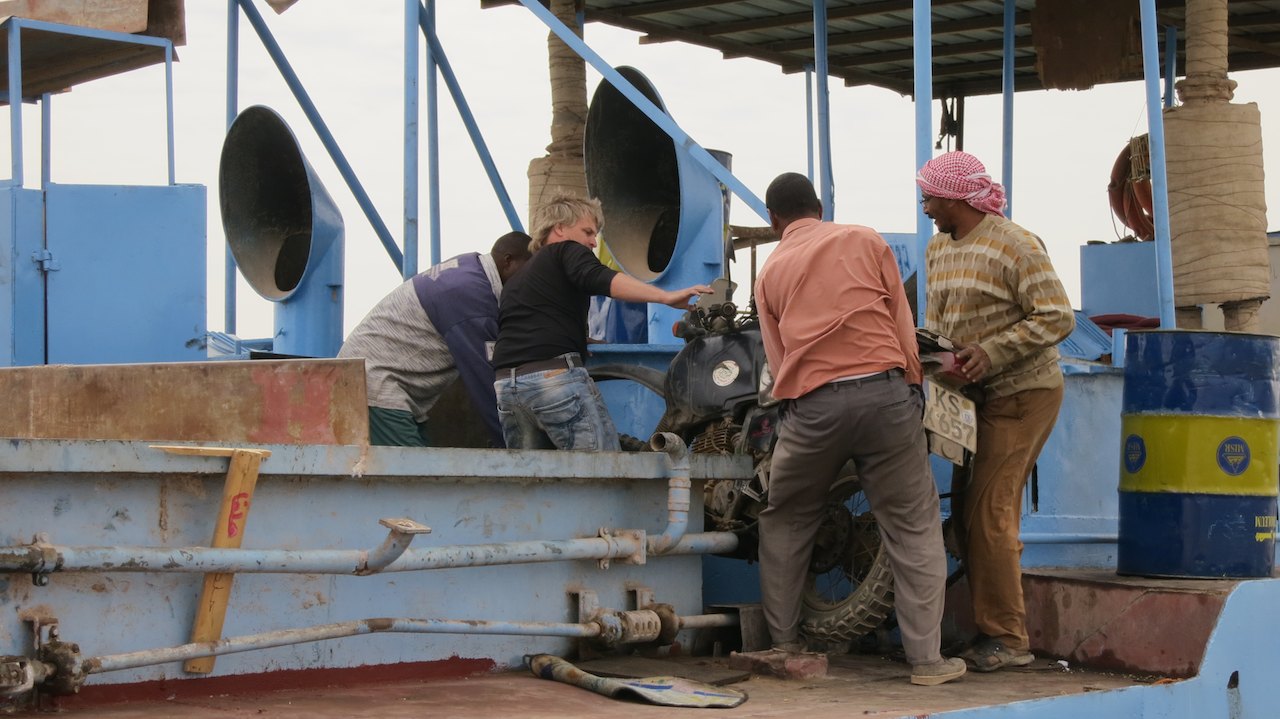
Volker is the first to try. With the help of the crew his Honda Dominator is lifted over the thresholds and eventually parked on the other side of the ship. It only just fits. Mülle had hurt his foot in a fall earlier and is struggling to move his heavy bike. Peter knows how to handle the Africa Twin and -with the help of the crew- he puts the bikes in the right place on the barge. It definitely is something else, such a 250kg weighing Africa Twin compared to our CRFs of 150 kg. (Mülle would later write in his blog that Peter was only too glad to help him, to be able to have an Africa Twin in his hands again and I think he was right!).
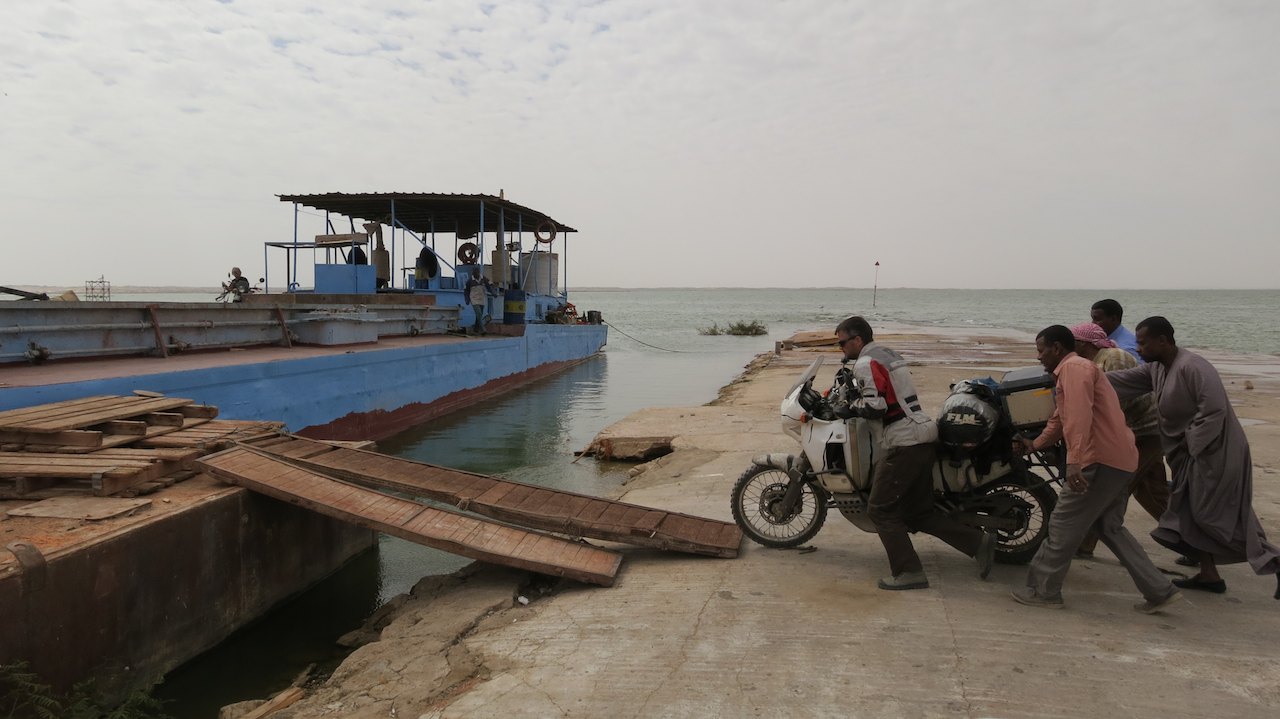
With the motorbikes on the quay, Mazar can complete the paperwork. We see him enter the customs office with his briefcase and walk out a little later with stamped Carnets. We are done, great! After some bizarre events with Kamal in Egypt, Mazar was a welcome surprise. With him, we knew exactly what we paid to whom and why. No frills! And all that with a nice chat and a contagious laugh. A great way to start a new country.
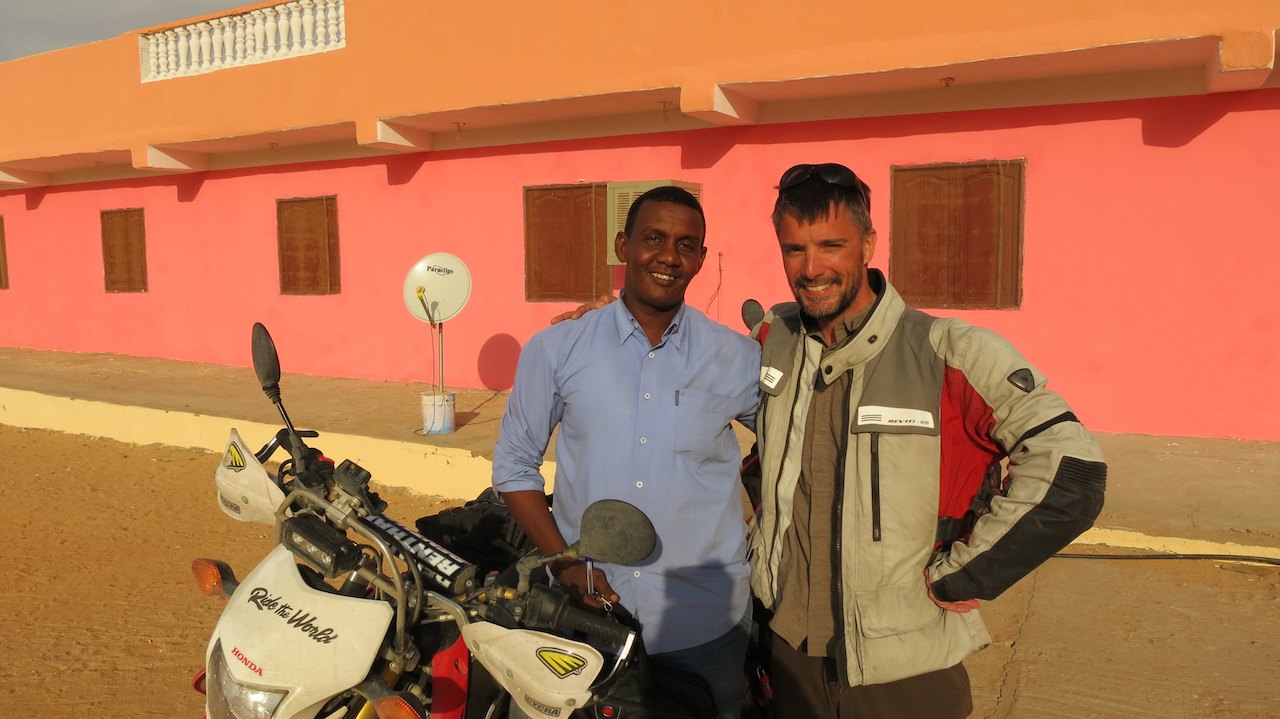
It is late in the afternoon when we say goodbye our new German friends and finally drive our motorbikes to the hotel. The next morning we do some shopping at the local supermarket and we find fuel to fill up the bikes. The latter is not obvious in Sudan. Because of the conflicts in (neighbouring country) South Sudan and the poor accessibility of the oil fields there, it is hard to get fuel in this corner of Africa. We already noticed that in Egypt, but understand that the scarcity is even greater in Sudan and Ethiopia. To avoid getting stuck without fule, we fill up wherever we can, even if it is only a few liters. Our motors do 3,3 liters on 100km, so every liter is at least another 30km further, perhaps to the next fuel station.
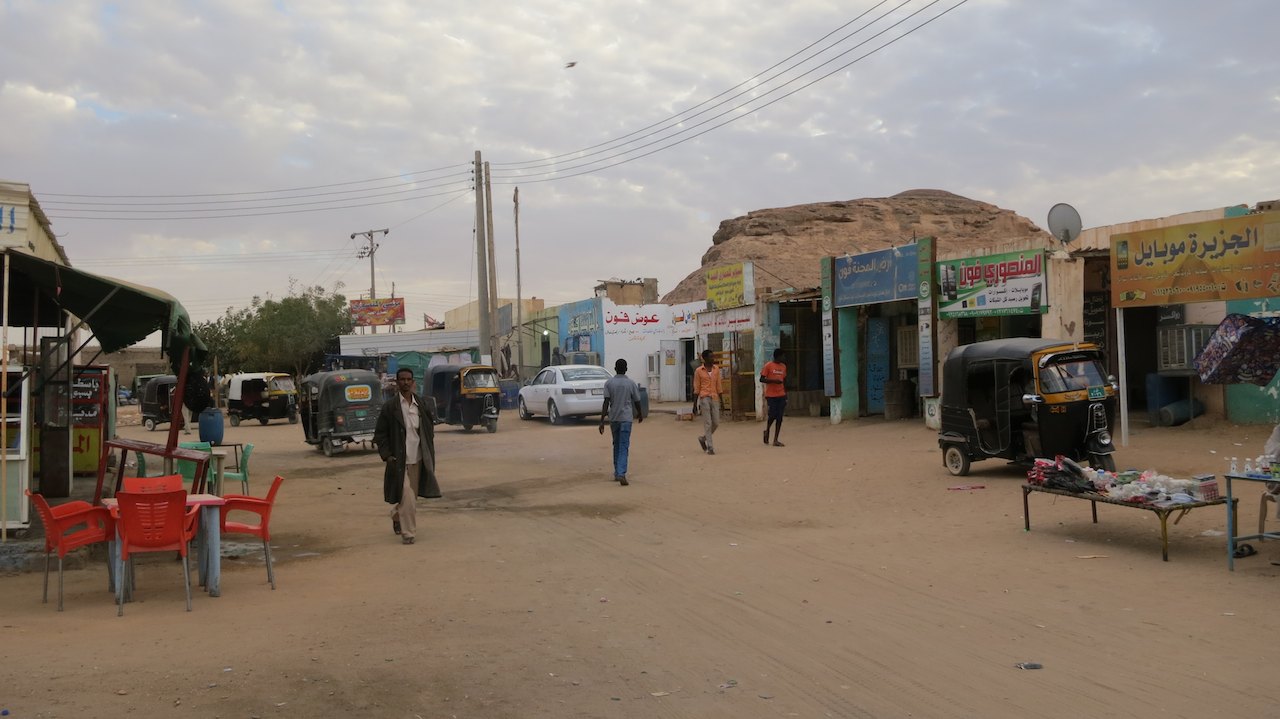
At the end of the morning, later than usual, we leave Wadi Halfa. Once we drive out of town, we are immediately in the desert. On the map the road seems to run right along the river, but the river and the lush green fields beside it are nowhere to be seen. Around us the land is arid, dry and dusty. It is quite warm and the air vibrates above the long straight asphalt road. Not far from Wadi Halfa we meet the first cyclists that were on the boat to Wadi Halfa with us. The French family is cycling against the wind up one of the hills. Father in front with the two youngest boys in his cart, the eldest son on his own bike behind him and mom as red lantern at the back. On top of the hill we wait for them. We chat, fool around with the boys and share some tips. It is a special trip they are making with their children and a meeting that I will remember for a long time.
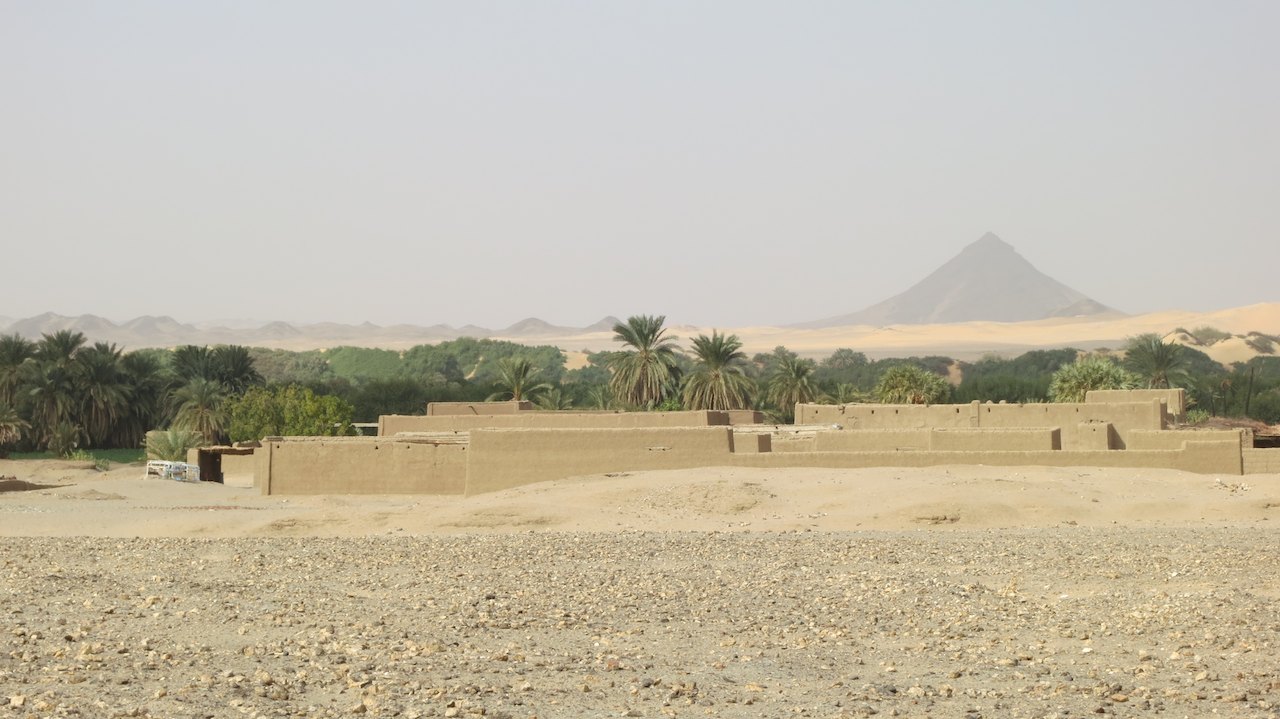
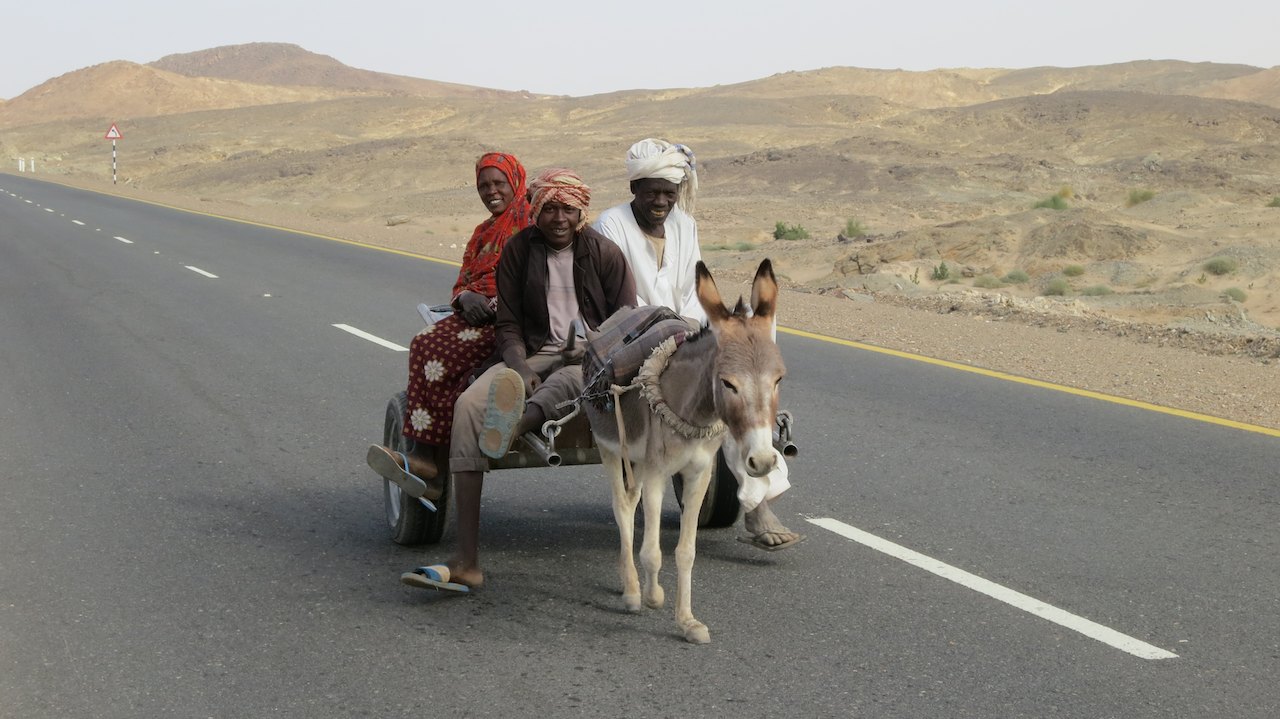
Not much later, we meet up with two of the Chinese cyclists we met on the boat. It is lunchtime and they have found a place in the shade. Their fully packed bicycles are parked along the side of the road. Like Tulsi (the Chinese cyclist we encountered in Egypt) they both have a fishing rod and a guitar(!) with them on the bike. They are on their way to a village about 60km away where predominantly Chinese live.
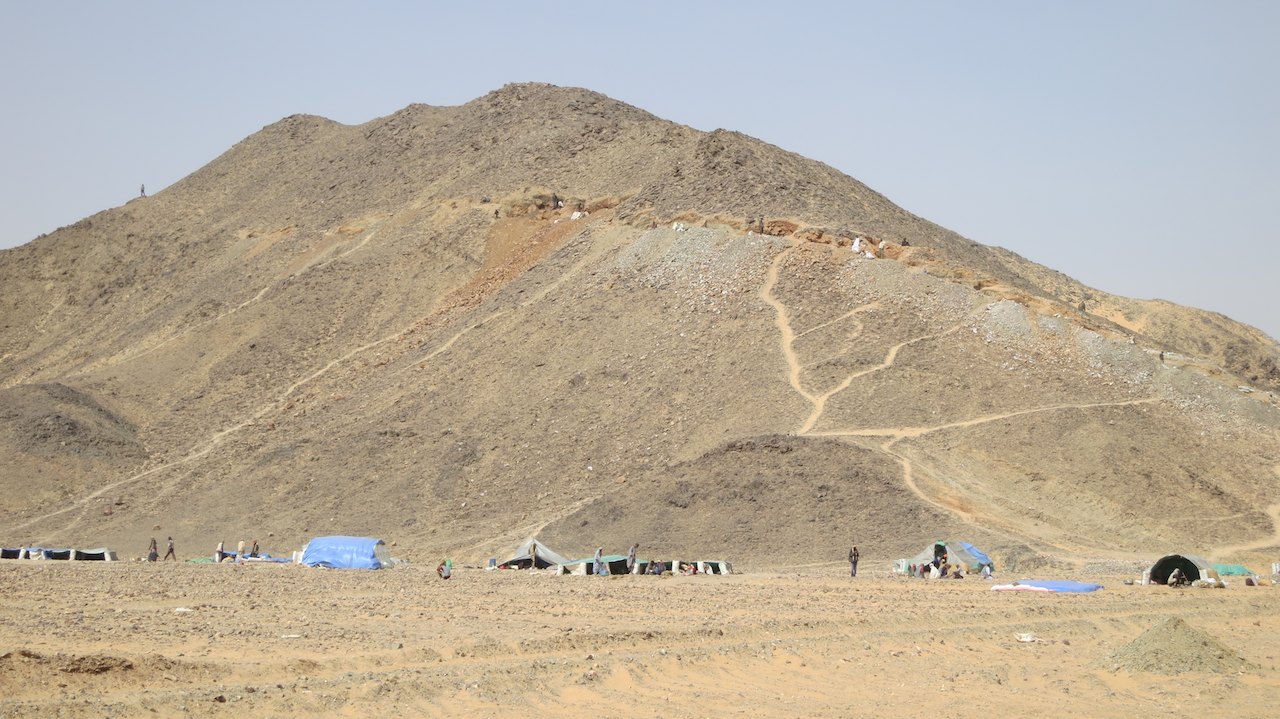
Africa is currently being flooded by Chinese. Not only by cycling Chinese tourists, but mainly by miners and road builders. China has entered into contracts with several African countries to derive minerals from the soil. To get the materials for the mining activities to the right place and to transport minerals, the Chinese are building new roads throughout Africa. Along our route there are Chinese settlements everywhere. The feelings about the Chinese presence are mixed and sometimes downright negative. While it is great that the African roads are being paved, the quality of the paved roads is often very poor, as are the conditions under which African workers are employed by the Chinese. Also the cheap plastic items they sell is not appreciated by everyone. Not to mention the fact that valuable minerals from the African soil are taken to Asia. For our cycling Chinese friends it only offers advantages, because they cycle on a new road straight to a delicious plate of rice to celebrate the Chinese new year in a few days.
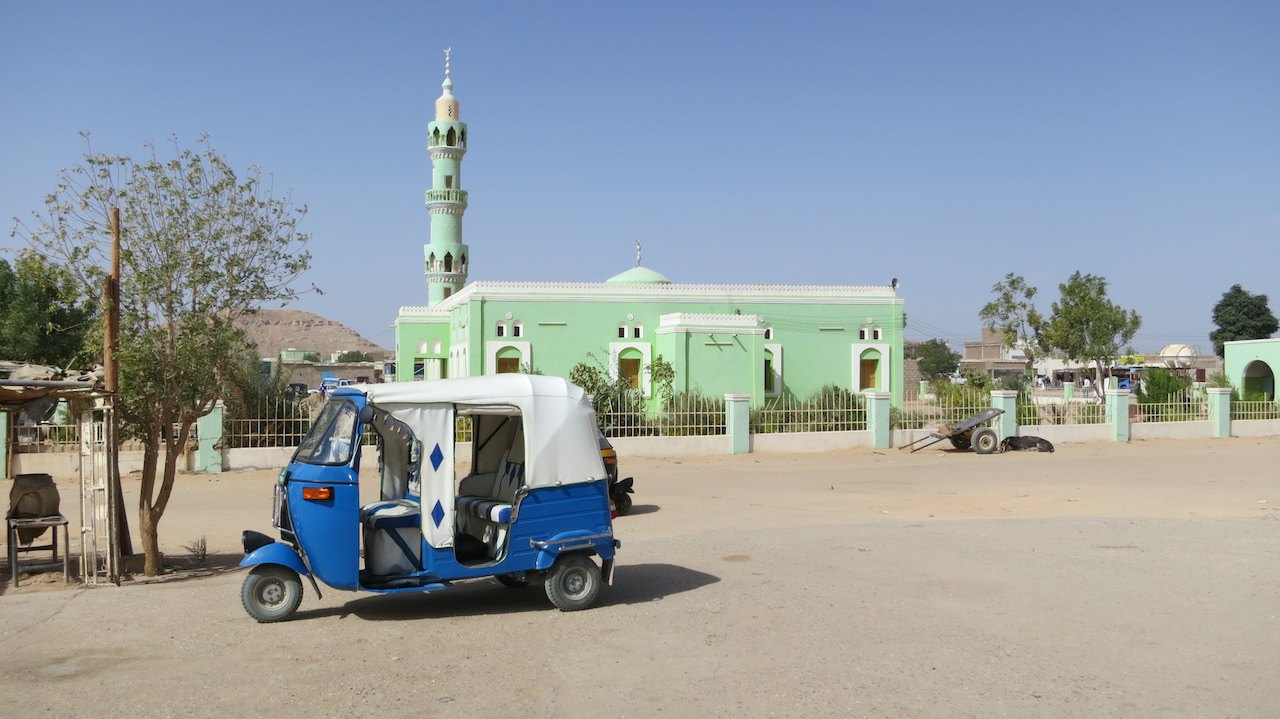
Apart from the bicycles there is little traffic on the road. Just a handful of donkey carts, mopeds and a stray tuktuk. The only other road users are the buses, and they are notorious! The Sudanese bus leaves according to an extremely tight schedule, whereby passengers are promised to reach their destination within a record time. If the driver arrives at his destination too late, he gets a fine and in case of serious delay he may even lose his job. As a result, the bus drivers push their buses through the country at mind-blowing speeds of up to 160 km/h. They all have new Chinese buses, which are extremely quiet. And that is particularly annoying because we do not hear them approach and then they are suddenly next to you. That is not even the worst part. It gets really exciting when they ride toward you while they are overtaking other traffic! They just keep on riding there and do not move an inch. We have to get off the road three times to avoid a frontal collision. Idiots!
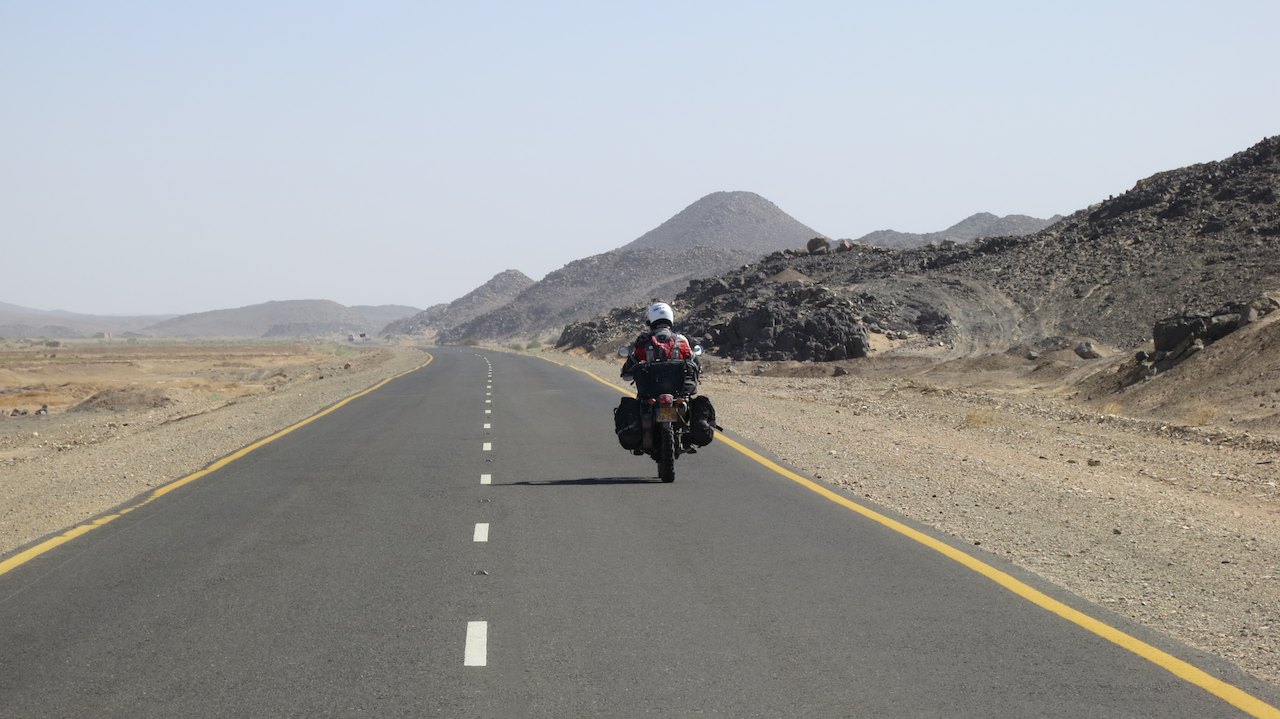
On our way south we sometimes see a glimpse of the Nile and the green fields next to it. Most of the houses in the villages we pass have the same beige color as the sand and are hard to see. The most beautiful building in the villages is usually the mosque, which coloured walls tower above the flat roofs of the houses. In the larger towns where we see local motorcycles, we try to buy fuel. Often the stations have no fuel and they have to refer us to another fuel station. In most cases, the guy then jumps on his motorbike to take us there. Very kind!
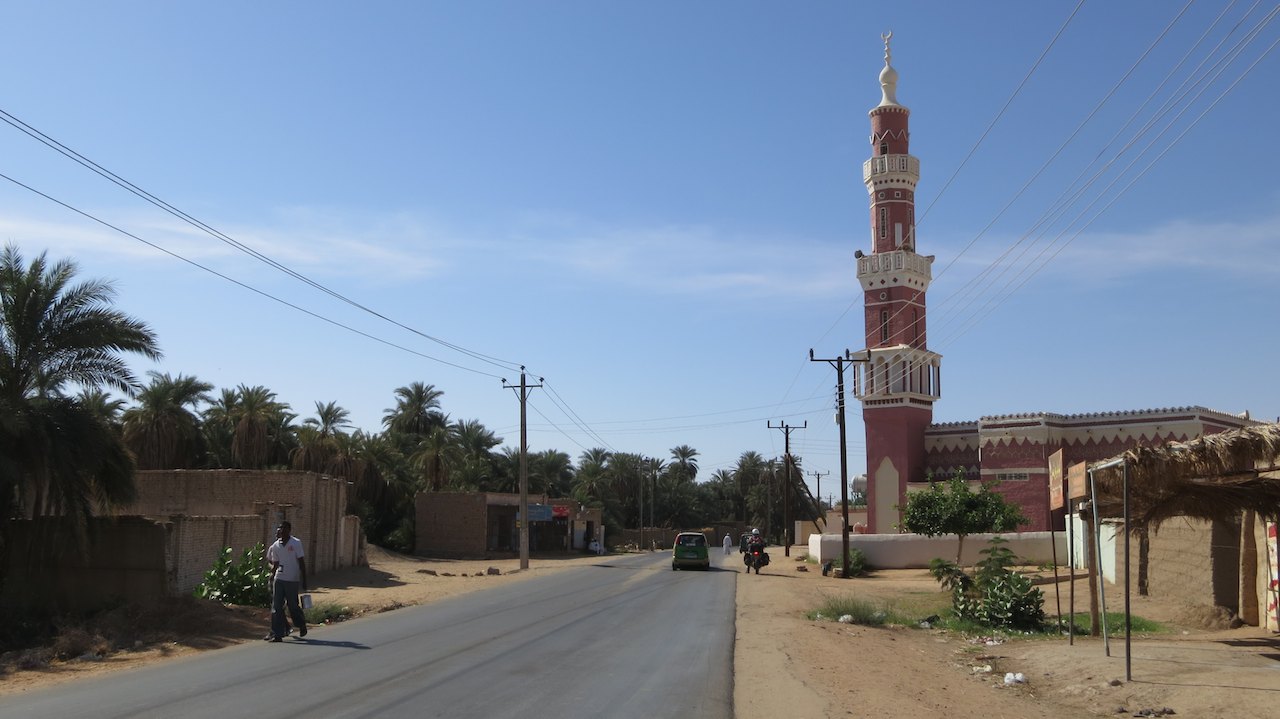
In Sudan, we will mostly bush camp. Partly because there are not very many campsites and hotels, but secondly and more importantly, because we can. The country is not very densely populated, so there is always a place to find where you can stay without being bothered. Other overlanders had told us that even if there are people in the area, they will usually leave you alone. And they were right. When we find a nice place for the tent overlooking the Nile just below Abri. We do see some curious faces in the distance, but they just let us go our way. Only after we make contact with them, they approach us to have a chat. And after that chat, they simply leave. Very relaxing and not what we were used to in Egypt.
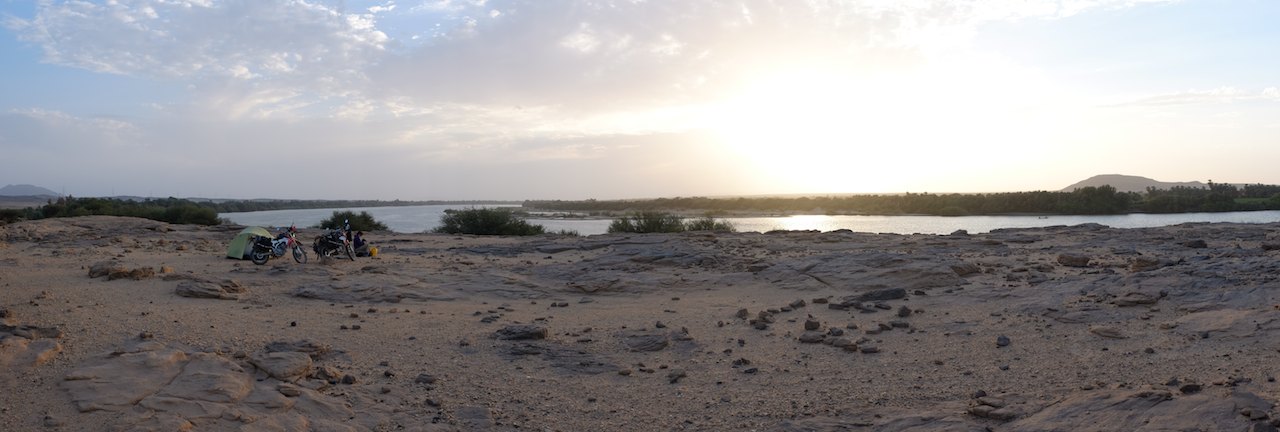
On your first day in Sudan we follow the Nile down to Dongola where we buy water, fresh fruit and vegetables. Then we drive away from the Nile and follow the road trough the desert toward Karima in the east. Once we have left Dongola behind us and ride into the desert the climate immediately changes. It is a lot warmer, even warmer than we had experienced in the Egyptian desert. There is some wind, but it is so warm that it seems as if a blow dryer is constantly blowing hot air in your face. The burning sun and warm air give me a sore throat, a sunburnt red nose and cracked lips. We stop for lunch in the only shady place we can find, but immediately decide to make it a quick stop. It is too hot, even in the shade. The bit of wind we get from riding is better, even if it is a warm wind. With sunblock on my face and my buff up my nose, we drive to the east.
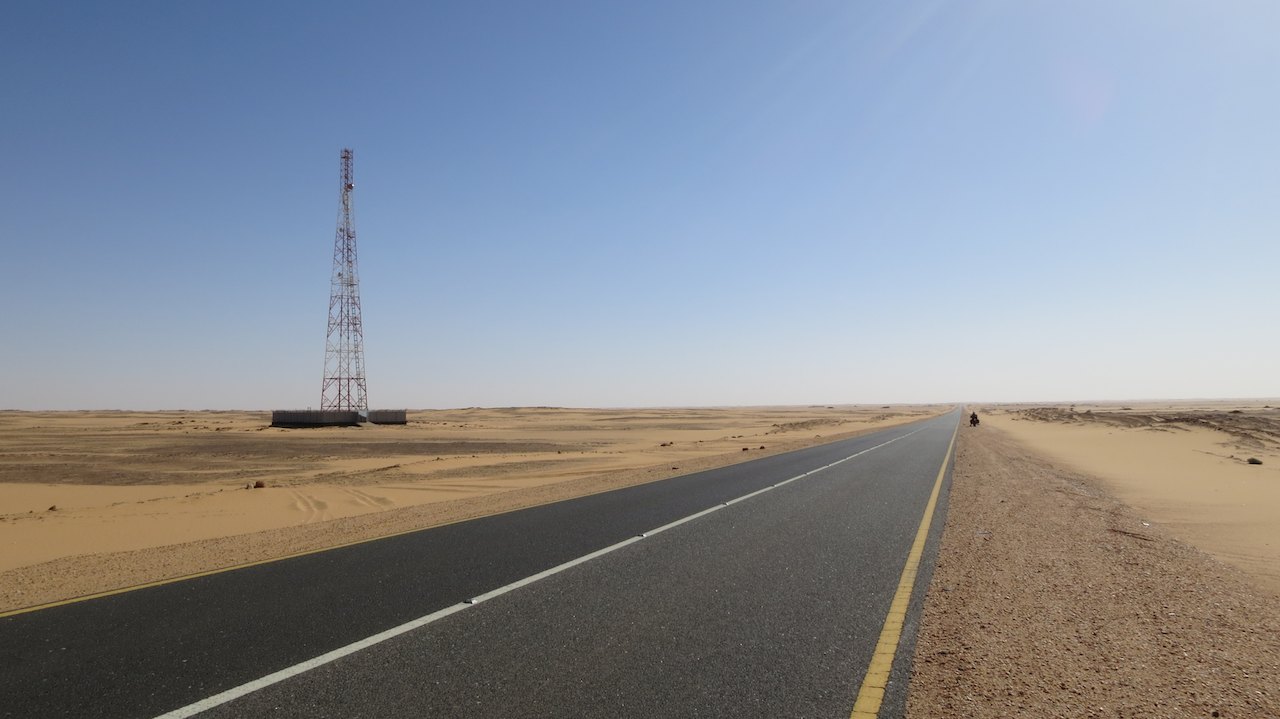
The road is a straight line that disappears into the distance. Along the way, we do not ride through villages and we hardly see any traffic. Very boring. We both put on some music and make our way through the warm air. We had wanted to ride to Karima in two days, but when we are halfway it is still so hot that we decide to drive on. It is too hot to put up the tent now. To think that our cycling friends will travel along this road to the east as well. What a tough ride that will be!
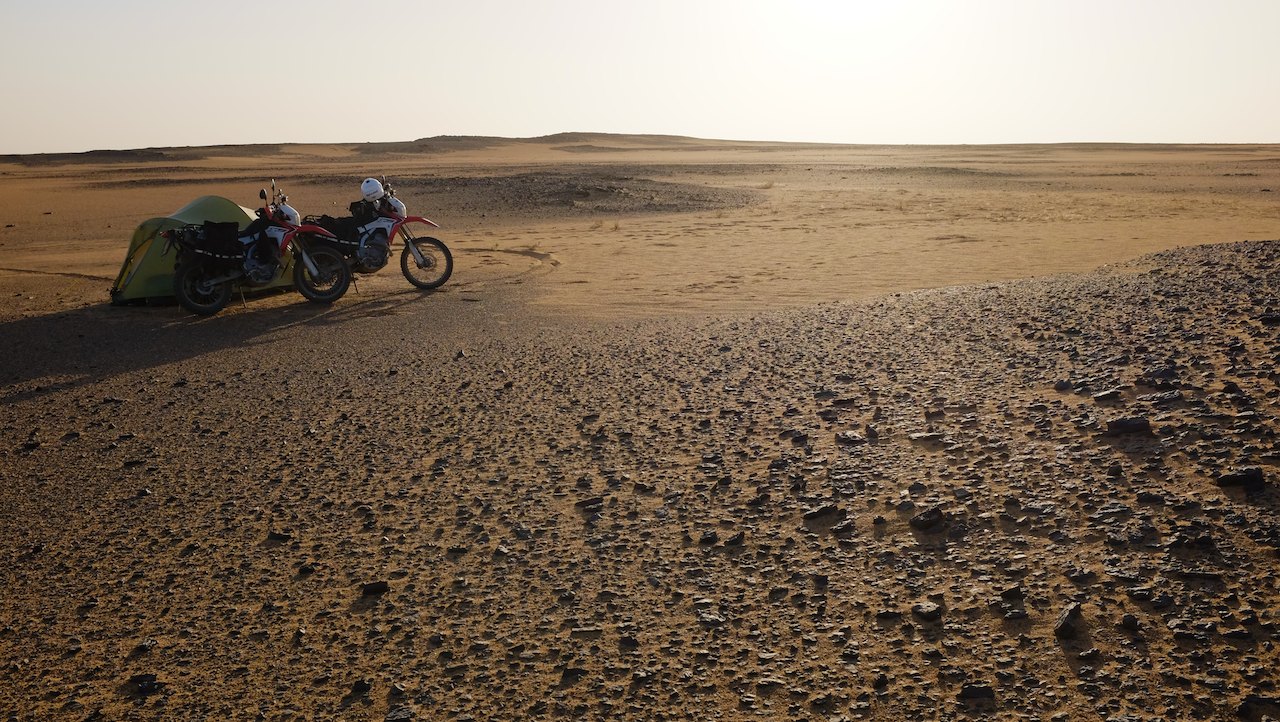
We end up driving until the sun begins to set. When we stop to take a pictures of some camels, we see a path disappear into the desert. We turn off the road and follow the path until we find a nice flat area for the tent. As the sun sets, we enjoy a fresh mango and a bag of salty chips. In the last light we pitch our tent and when the sky is filled with stars we eat a delicious plate of pasta. After dinner we look for constellations in the sky. It is surprisingly silent. The only sounds come from my phone indicating that I have new whatsapp messages (yes, even in the middle of the Sudanese desert we have full coverage!)
Halfway through the night the wind gets stronger. It shakes our tent up and down. We do not sleep much after that. Once the sun is up, we pack our things and we leave after a quick breakfast in the direction of Karima. It is still early when we arrive at the pyramids. The pyramids are small compared to the pyramids at Giza, but still beautiful. There is no fence around them, there is no ticket office, there are no ‘guides’ and no souvenir shops, there is nobody. Just us! We park next to the pyramids and take our time strolling around them. We like it here, in Sudan!
Distance travelled to Karima : 8,595 km (5,341 miles)
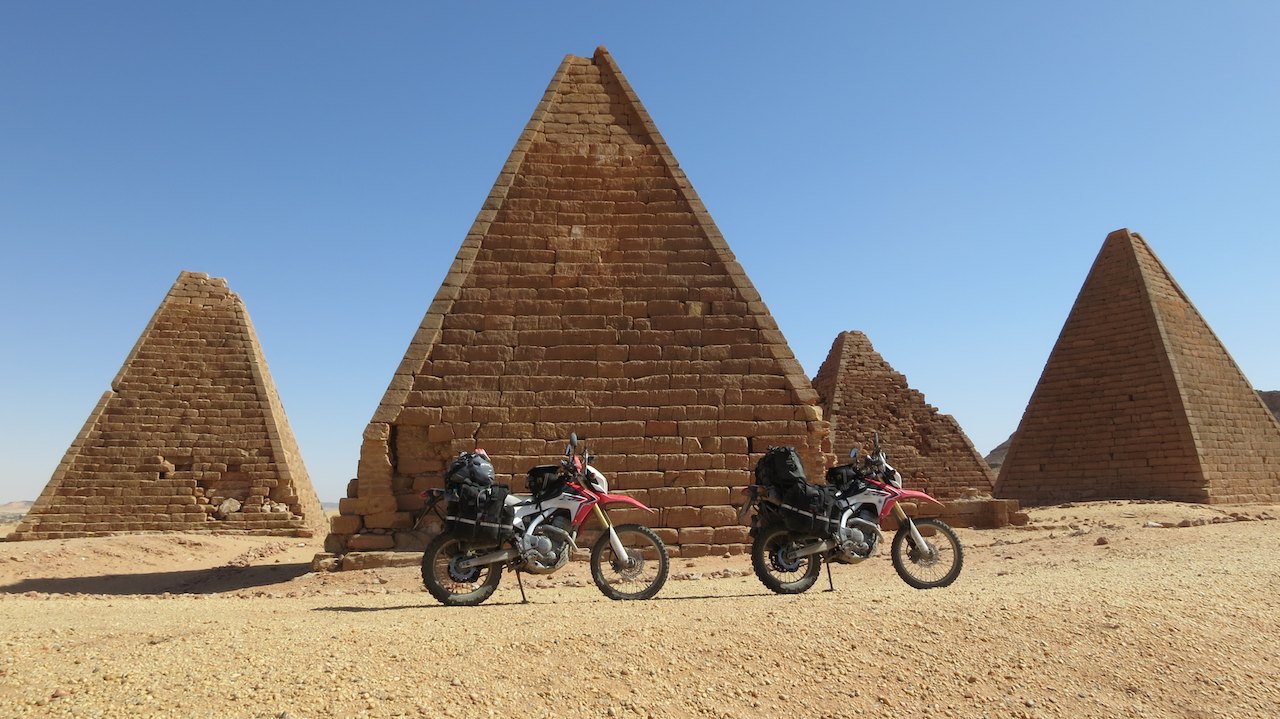
|

30 Oct 2014
|
|
Registered Users
New on the HUBB
|
|
Join Date: Jun 2014
Posts: 8
|
|
Amazing stories. I just found your site and am halfway now. As a fellow Dutchy, it's great to read about others that are out and about. 
|

30 Oct 2014
|
 |
R.I.P.
Veteran HUBBer
|
|
Join Date: Aug 2003
Location: california
Posts: 3,824
|
|
Another Great update! A fun read and good pics too! Thanks SO MUCH for working so hard to keep your report current! WE DO enjoy it!
Do you guys know the "more or less" cost to prepare your CRF250's for the ride? The more I read up on them and see your report the more I am convinced this HONDA may be my next bike.
I've read your blog about the upgrades you made ... but not sure of the total cost? If you did it over ... would you include a "Power Commander" or not?
I've had them on several bikes in the past and found they do very little good.
Maybe the newer ones are better? For me, with a PC, fuel economy was not good.
Does the CRF250L have enough power to pull you through deep sand?
Seems like a fantastic bike overall. I owned a XR250R Honda (dirt bike) and liked it for a lot of reasons. But it was never set up to carry luggage. That bike was very good with chains, sprockets and tires ... all lasted a LONG time. Seems to be the same with your CRF250L's .. yes?
Have a safe and fun trip!

|

11 Nov 2014
|
|
Registered Users
HUBB regular
|
|
Join Date: Dec 2009
Location: The Netherlands
Posts: 66
|
|
Quote:
Originally Posted by mollydog

Do you guys know the "more or less" cost to prepare your CRF250's for the ride?
|
We did not add up the costs of all items, but we estimate that we spent around 4.000€ to prepare both bikes (so around 2.000€ each). The biggest part of that amount was used for better suspension, upgraded seats and solid luggage racks. The costs obviously vary depending on where you live. For example, we ordered our bigger fuel tank in the US, our radiator guards in Canada, our air filters in Australia and had them sent to the Netherlands.
Quote:
Originally Posted by mollydog

If you did it over ... would you include a "Power Commander" or not?
|
No we would not. We hardly notice a difference. A better modification, is to change the front sprocket to 13-teeth (1 tooth less). 
Quote:
Originally Posted by mollydog

Does the CRF250L have enough power to pull you through deep sand?
|
We can ride through deep sand, especially with deflated tires we manage quit well. We doubt whether the bike would have enough power to cross sand dunes with the luggage we carry. We got stuck once in Sudan and 'wiggled' the bike out of the sand by moving it sidewards a couple of times. With Peters Africa Twin, he would have been able to drive out of the sand on pure power of the bike.

|

14 Nov 2014
|
|
Registered Users
HUBB regular
|
|
Join Date: Dec 2009
Location: The Netherlands
Posts: 66
|
|
|
Chit-chat in Khartoum
After we have admired the pyramids, we drive to the centre of Karima where we find the hotel that was recommended to us by Volker and Mülle. We can park our motorbikes in the courtyard of the hotel. After two days of bush camping it is great to have a shower (even if it is a cold shower) and to sit on a normal toilet. The remainder of the afternoon we work on the blog, filter some water and wash our clothes. Only when the sun is set we venture out to the main square of Karima to eat in one of the local restaurants.
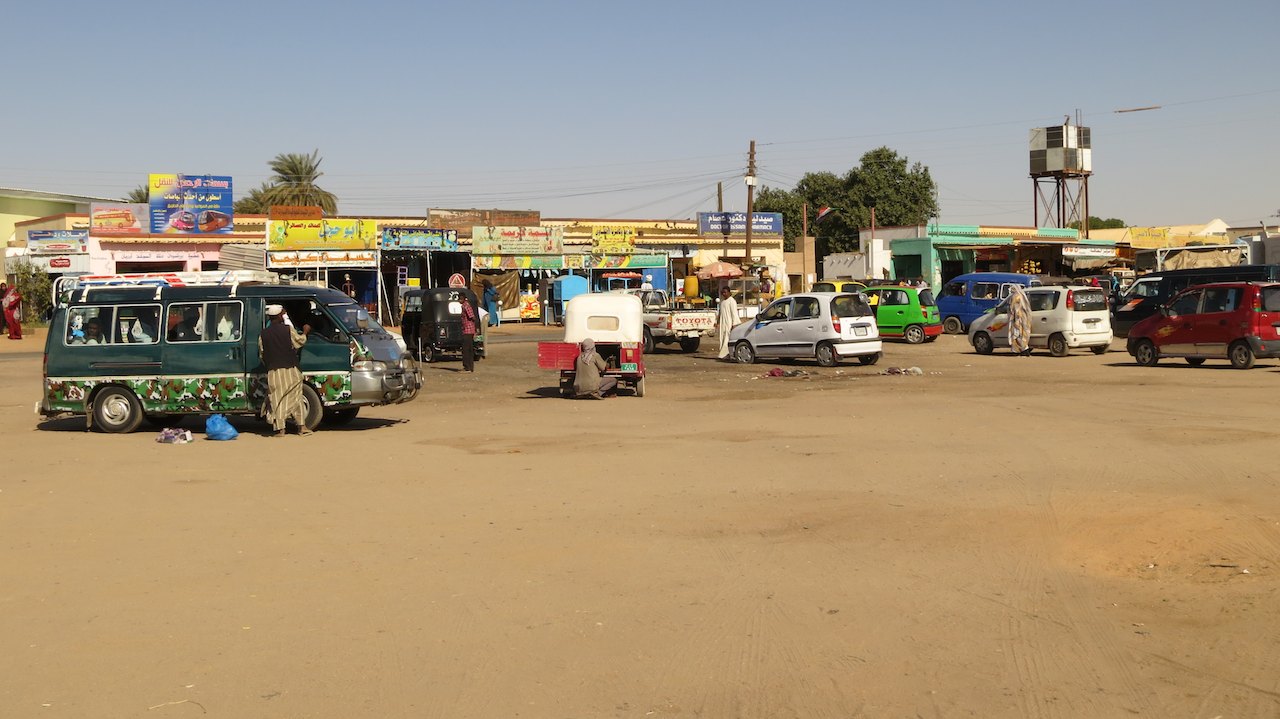
It is very busy in the square. Vans drive off and on and park in the square next to the donkey carts. Around the square there are lots of ’Chai-mamas’, ladies offering coffee and tea. They sit on a stool behind a low table that has glasses and jars with different spices and sugar. In front of the table are a few chairs and stools for guests. On a charcoal fire beside her are two pots with boiling water, one with water for tea and one with coffee. In addition, there is a pot of charcoal on which herbs are smoking to keep away mosquitoes.
Around the square are about ten Chai-mamas. We choose one of the mini-terraces and order two cups of tea with sugar next to it, because if she puts in the sugar the tea is really very sweet. From under her bench she pulls a small round tray on which she puts tea glasses and a jar of sugar. She is holding a sif over the glass containing tea in which she pours the boiling water. The tea tastes very spicy and is delicious!
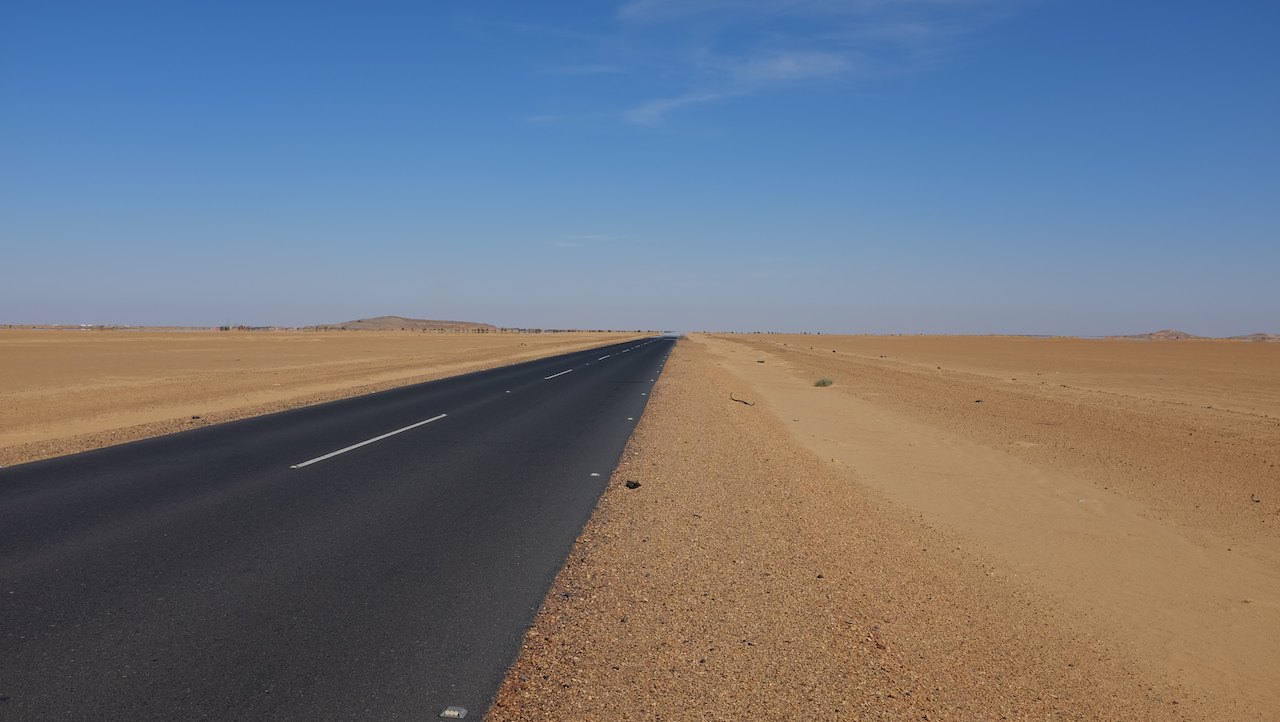
The next morning we drive further east to Atbara, from where we head towards Khartoum. South of Atbara we will first visit the pyramids of Meroë. Other travellers had told us that it would be a good place to bush camp. From Karima it is about 400km to the pyramids, a long distance we normally spread over two days. But since this road again runs through the hot desert, we decide to make it one long day. That way we sit in the (riding) wind on the bikes all day and we only have to pitch our tents when the sun sets.
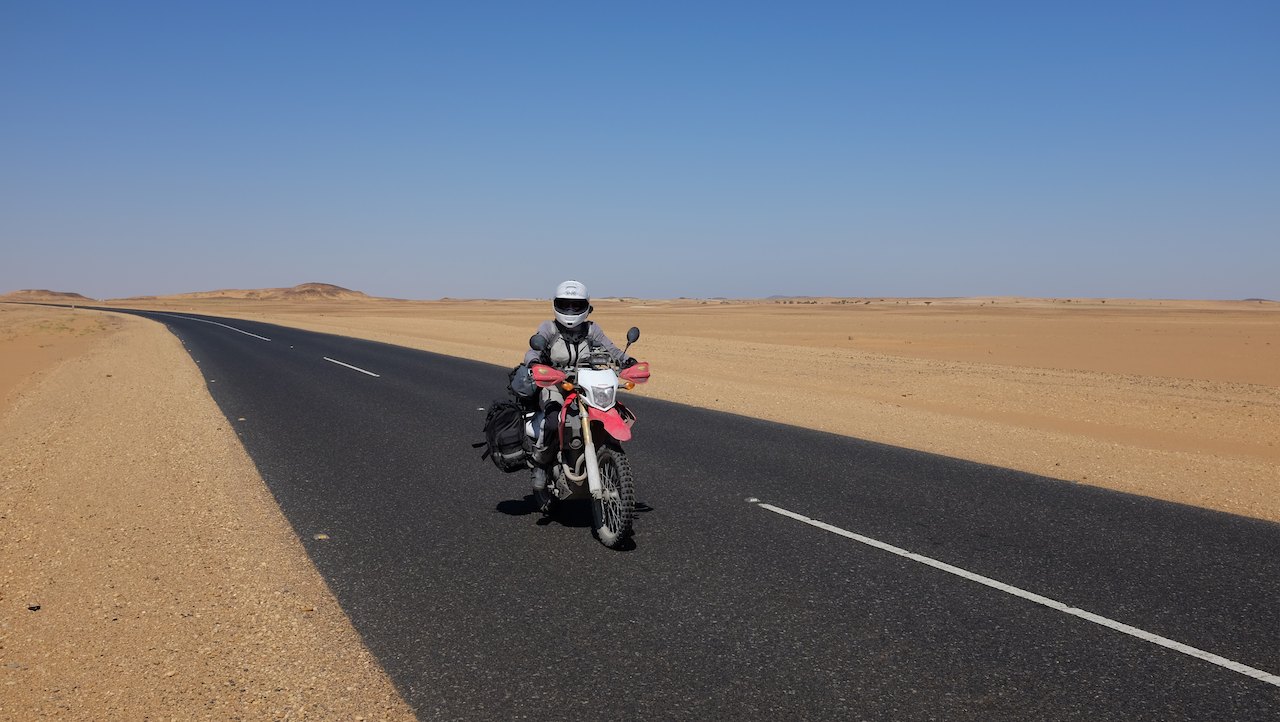
In Karima we buy extra water and fresh bread with falafel (the usual breakfast in Egypt and Sudan) before we leave. After we have filled the tanks of our motorbikes, we set off. The first part of the route winds along the Nile, but we soon turn left onto the long straight desert road. It immediately is very hot. In the distance we see the hot sky shiver above the sand. It really does seem like there is water in the distance!
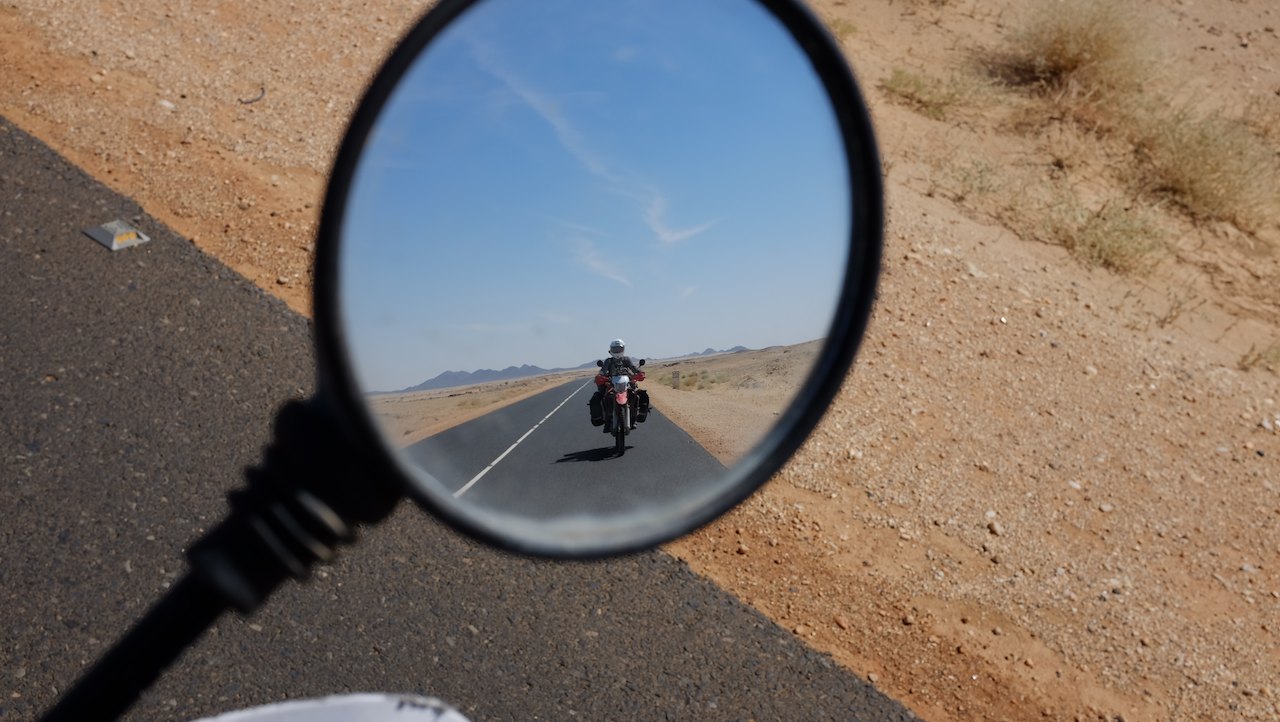
The sun is so bright that I do not only wear my regular sunglasses, but also use the sunglasses of my helmet. With sunblock on my nose, the hose of my camelback close by and the buff over my face, I can just manage to drive with an open visor. We only stop to fill our camelbacks and eat the falafel sandwiches. We ride as fast as our motorbikes can carry us through the desert.
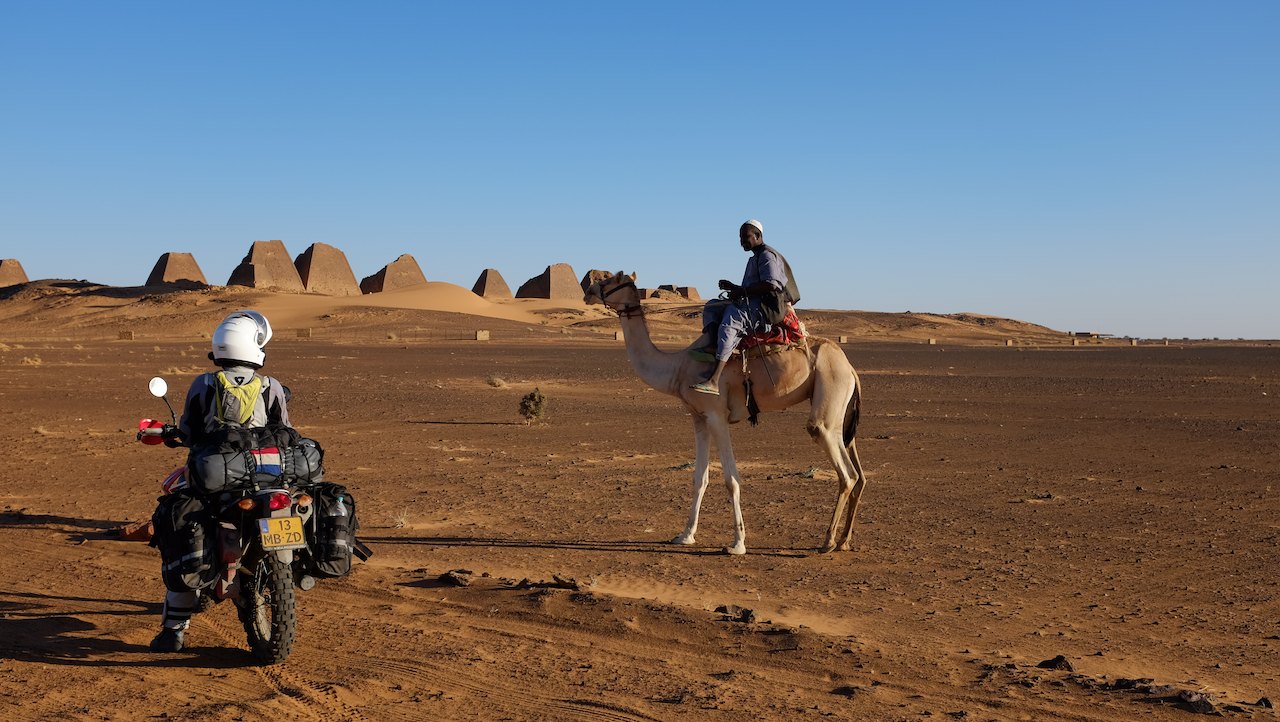
At the end of the day we see the pyramids of Meroë from the road. As in Karima, the pyramids are smaller and pointier than in Giza (Egypt). They are built in a group between the sand dunes. We take the road towards the pyramids and look for a camping spot.
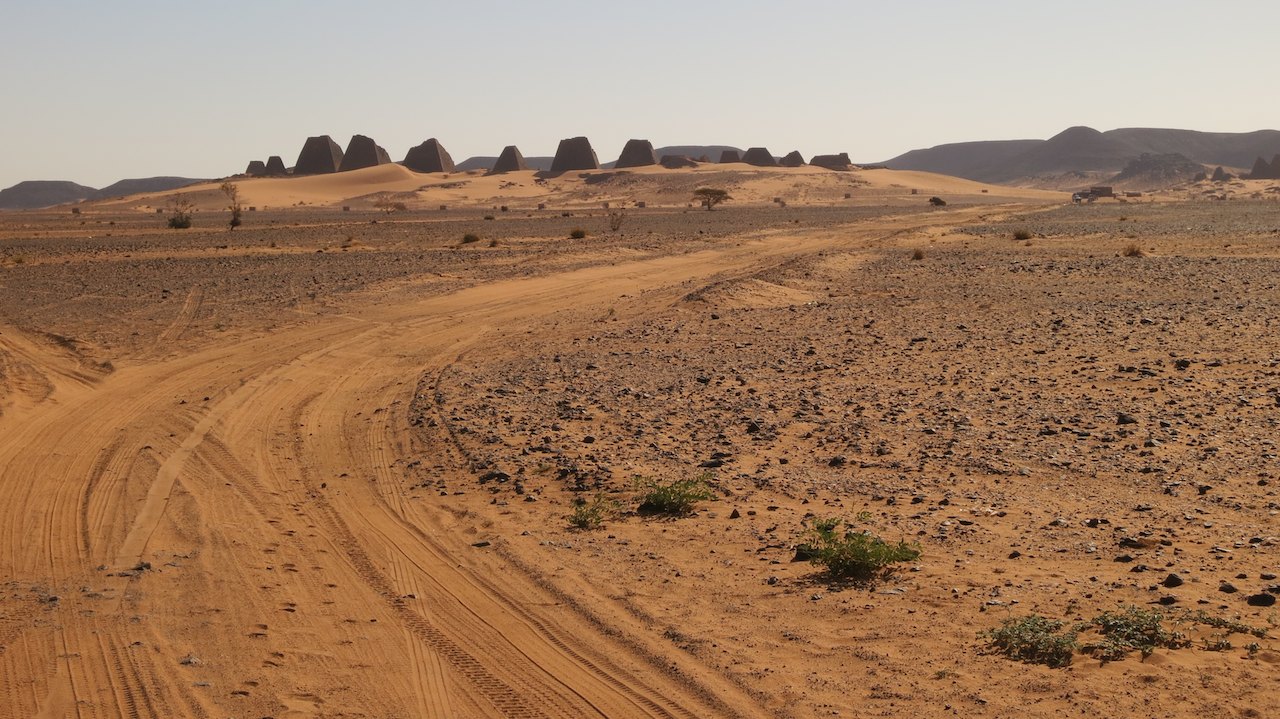
The sand on the road to the pyramids is quite deep. We wobble through the sand and at some point Peter gets stuck in a small sand dune. We both deflate the tires of the bikes to 0.8 Bar and that does wonders! On our soft (knobby) tires, standing on the pegs and hanging from the handlebars so that the front wheel is lighter, we suddenly fly through the sand. This is a lot better! We find a spot for the tent and pitch it while the sun is setting.
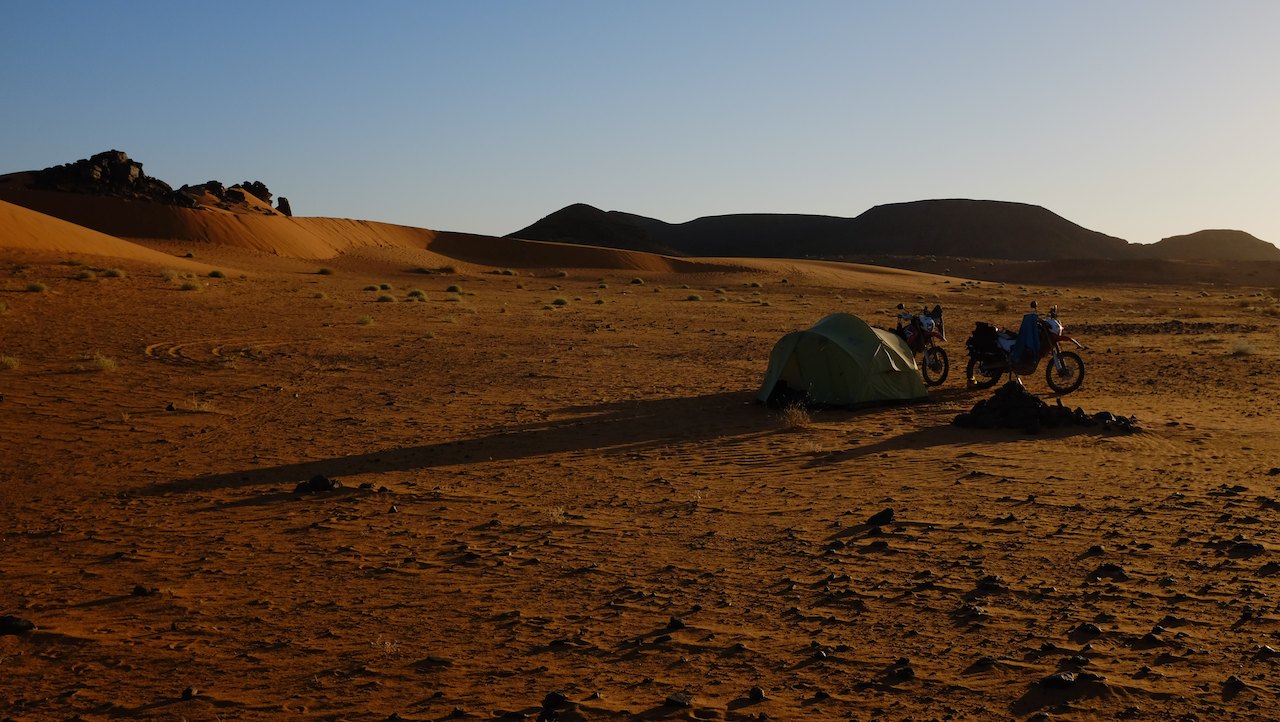
The next morning we wake up while the sun rises over the sand dunes. When I walk up the sand dune to seek a ‘toilet’ I come across all sorts of tracks in the sand; lizards, snakes, beetles. We were not alone this night. I also see some strange insects, beautifully shaped creatures that could be aliens.
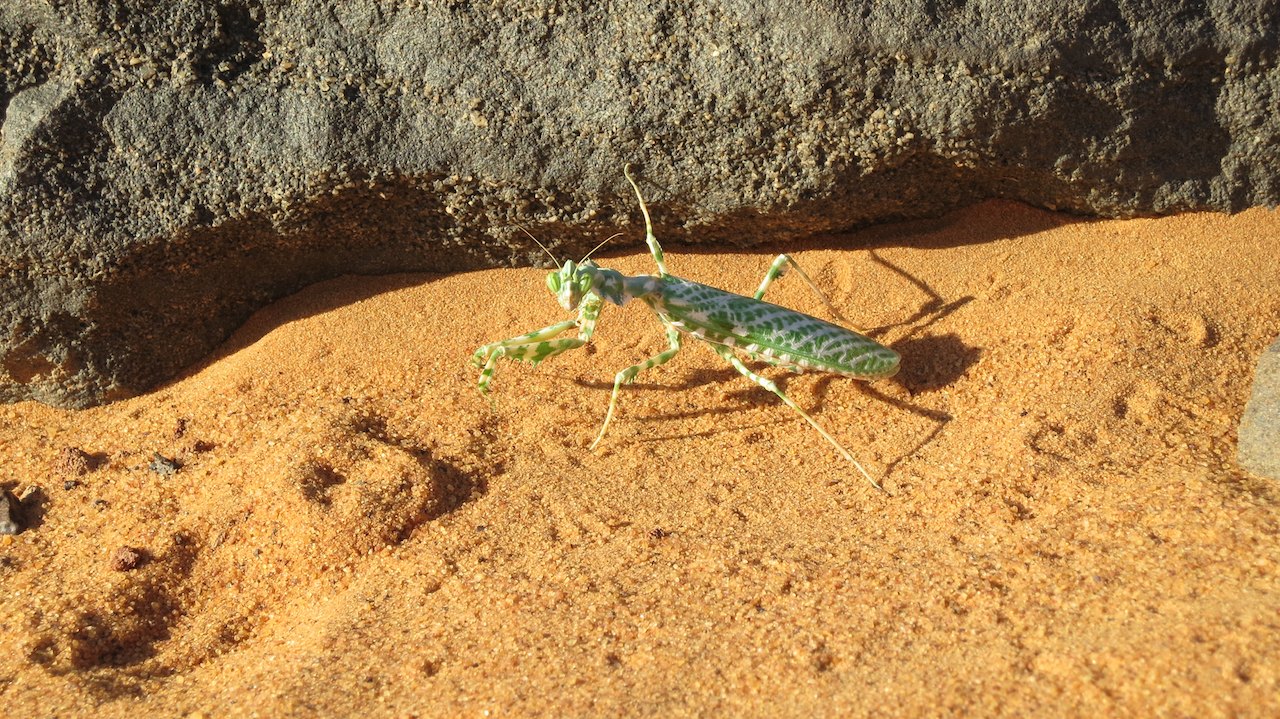
During breakfast we are surprised when suddenly a camel stands next to us with on his back a gentleman who offers us a ride to the pyramids. The feet of a camel make almost no noise in the sand, so we did not hear them approach. We kindly decline the offer, pack our stuff and continue our journey to Khartoum.
From Atabara we drive on the main road to Khartoum. In addition to the buses (the ’idiots’), there are also a lot of trucks that ride from Port Sudan to Khartoum. The road has suffered from heavy traffic, that has pulled deep tracks in the soft asphalt. The roadside is littered with broken tires and we regularly pass stranded cars with a boiling engine. We only stop at one of the “restaurants” along the way to drink tea at one of the Chai-mamas, but keep going most of the time.
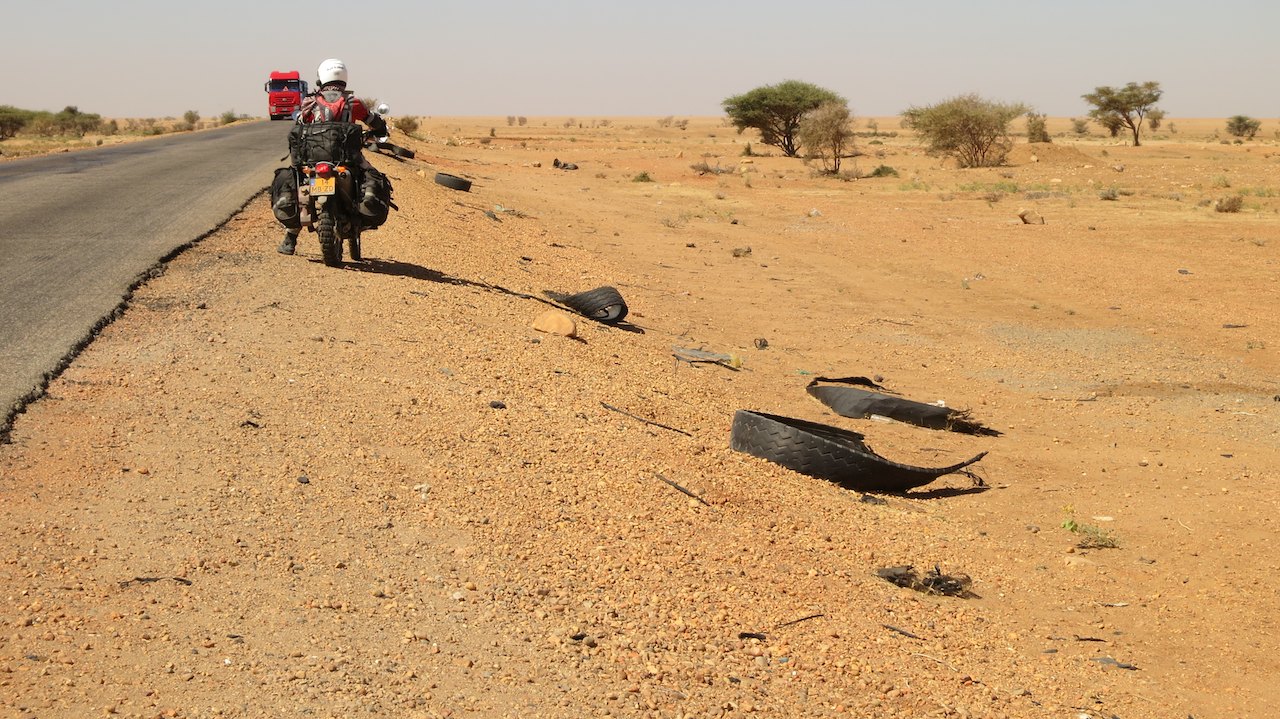
At the beginning of the afternoon, Peter suddenly brakes. I hear him say over the intercom: “ A motorcyclist with a helmet“. I see a big motorbike with attached to it suitcases coming our way, and indeed there is a helmet on the head of the biker. In Africa this can only mean one thing: it must be an international traveller. Until now we have not come across any Africans wearing helmets. We turn around and see the BMW doing the same. The big man on the bike takes off his helmet and says: “ Hello! Are you ‘Amsterdam to Anywhere’?” We are stunned by this greeting and answer surprised that this is indeed the name of our blog. He introduces himself as Gernot from Germany and tells how happy he is that he now actually met us. We are just as happy to see him because he is the first overlander we see in a long time. It is clear that there are other travellers on the move in Africa, some even on motorbikes. Great!
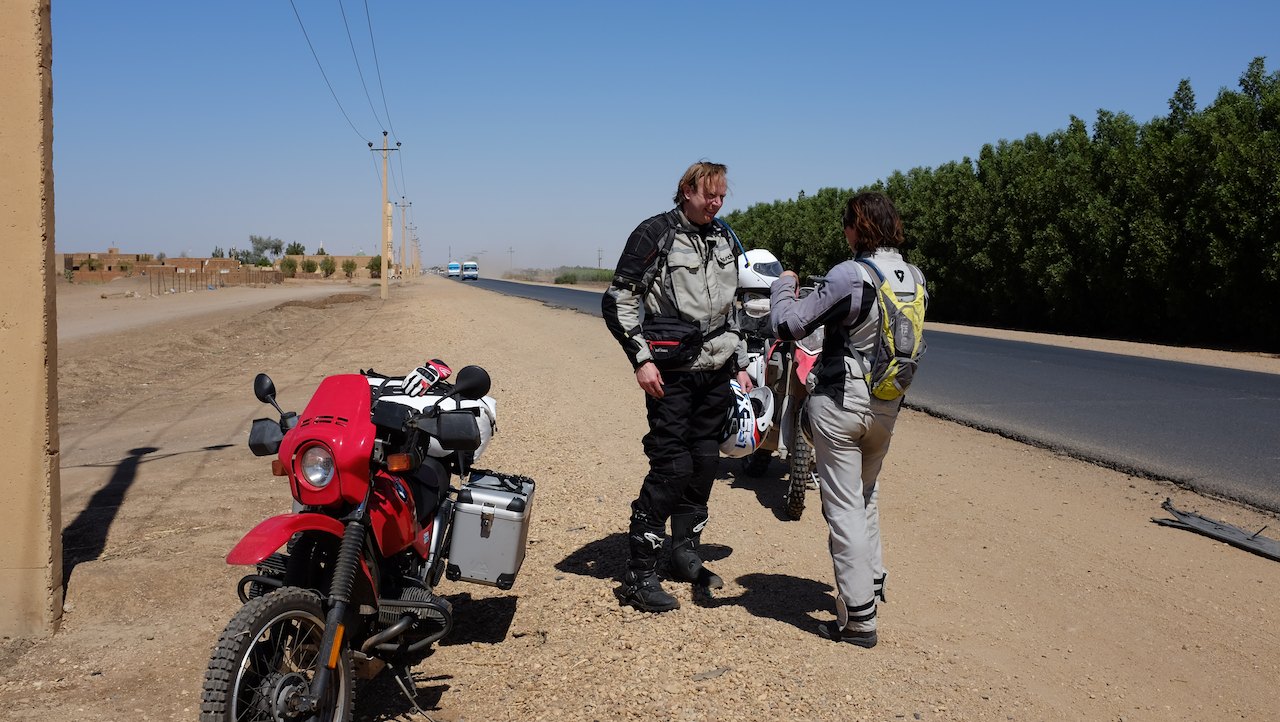
He wanted to skip Egypt and shipped his motorcycle to Khartoum, where he arrived just a few days earlier. Today he is on his way north to visit the pyramids of Meroë, but -just like us- he will travel to South Africa after that. His wife Anja is still in Germany, but will arrive in Addis Abeba (in Ethiopia) a few weeks later to join him. She was the one who had followed our blog. We exchange contact details and agree that we will meet in Khartoum the next day.
With new energy after this unexpected meeting, we arrive in Khartoum. It is as if we enter a different world. We ride along high modern buildings, we are overtaken by the most luxurious cars and pass billboards that advertise the latest round LED TV of LG. After having driven through the desert along mud houses with donkey carts for a few days, the contrast to the city could not be bigger.
Because of the heavy traffic we drive straight through the town to the National Reserve Camping, just outside the city center. We cannot really call it a campsite. It is a sports complex with training facilities. We can pitch our tent on the central square and use the showers and toilets in the residential barracks of the athletes. It is very hot and there is no wind, so the cold shower is wonderful to cool off and refresh. We do some shopping and search on the internet for information on Khartoum. In the coming days we will have to arrange our visas for Ethiopia here.
Our green tent and our red-white motorbikes are a true attraction at the camping. The manager, the superintendent, the maintenance man and groups of athletes, they all come for a chat. Always only after we have actually invited them with a friendly “ Salaam Aleikum“. They are all very friendly, helpful and far from intrusive. Great!
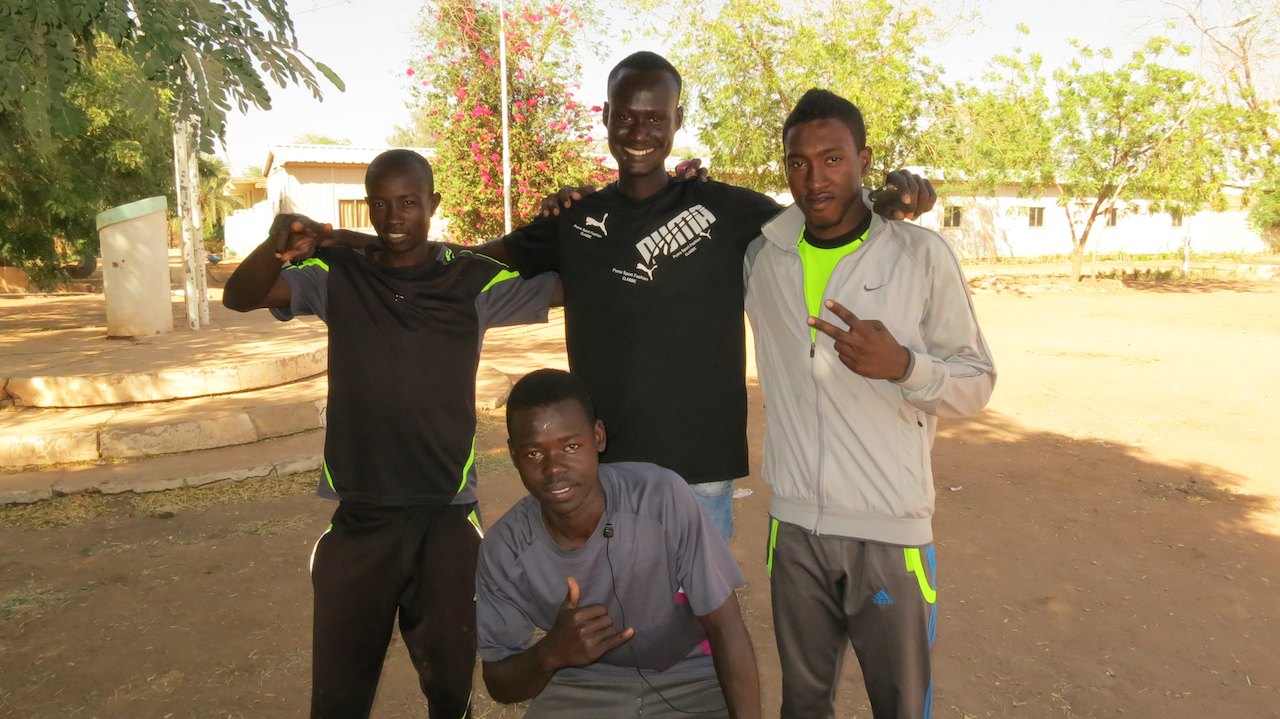
The next morning it is 6:00 am when the alarm goes off and 7:30 am when we are on our bikes and on our way to the Ethiopian embassy to apply for a visa. On the internet we read all sorts of horror stories about long queues and chaotic situations at the entrance. We had therefore decided to be there early just to be safe. With the coordinates that we had received from Gernot we quickly find the parking area of the Ethiopian embassy. The poles along the edge are painted in cheerful green-yellow-red colours of the Rastafarian flag of Ethiopia. The two guards make clear they will watch our bikes when we are inside.
As we walk through the gate of the embassy, we enter into a beautiful green garden with birds and a fountain in the middle. In the garden is a covered terrace where some people are waiting. There is a ticket window with a lady who hands out papers. All in all a fairly peaceful environment, without long queues or chaos. When we have completed the paperwork we are searched and are allowed to enter the embassy. We enter a beautiful round building with lots of glass and large pictures of the President of Ethiopia on the wall. It looks very clean and new. They even have air conditioning, a working one! We hand over our papers and are told that if we wait a half hour we can take our passports with the visas. Only 30 minutes? Great, getting visas was never faster. That saves us a ride into town the next day and waiting in the air-conditioned waiting room is not a punishment. Not even twenty minutes later it sounds: “ Mr. Peter?“ Our visas are ready! After we have paid, the man hands over our passports with a beautiful Ethiopian visa of three months in it. Great, that is settled!
Once back at the campsite we hear the humming BMW-motorbike of Gernot ride onto the camping ground. He has visited the pyramids, camped there and is now back in Khartoum to drive further south from here. He had been in Khartoum some days earlier and knew a great pizza restaurant. We get on our bikes and ride to the city for a tasty pizza. We talk endlessly about our adventures so far and the plans for the rest of Africa. On the way back we drink tea at one of the dozens of Chai-mamma’s in town.
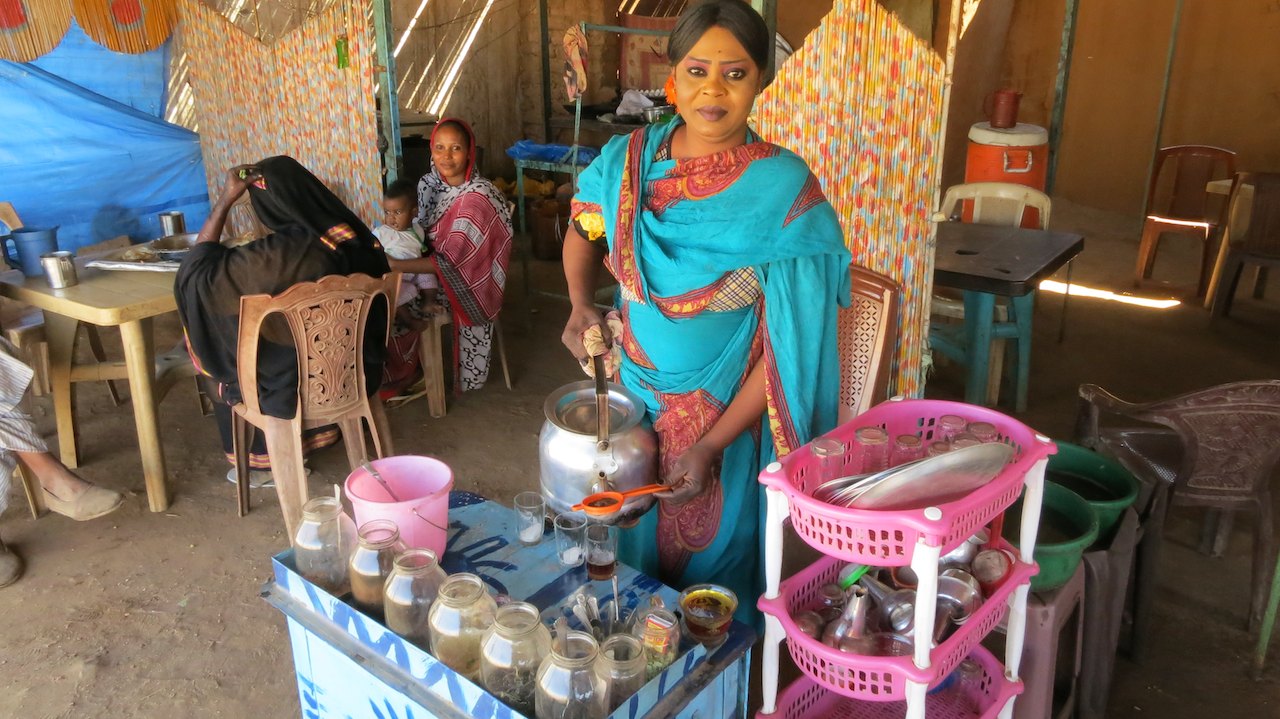
When we arrive at the campsite after dinner there is a sturdy Toyota Landcruiser with rooftop tent and a Dutch license plate parked next to our little green tent. We meet Maurits and Marloes from The Hague in the Netherlands. On Peter’s question whether Marlous is ‘Mouse83′ on the forum of Horizons Unlimited she looks as surprised as we must have looked when we first met Gernot. Through their messages on the forum, Peter knew that there was a Dutch couple in a car riding through Africa. It is a coincidence that we actually met. That evening we talk about our adventures and exchange tips until we are all five yawning and decide that we should crawl into our tents.
Like us, Maurits and Marloes do not really like the campsite. We decide to move to the Blue Nile Sailing Club, a camp site in the center of Khartoum on the Nile. Despite the negative stories on internet (you apparently require waders to go to the toilet) we want to take a look there. We pack our stuff and say goodbye to Gernot. He leaves for Ethiopia where he will pick up his wife in a few days. We agree to keep in touch and meet in South Africa for cold drinks and a good piece of meat.
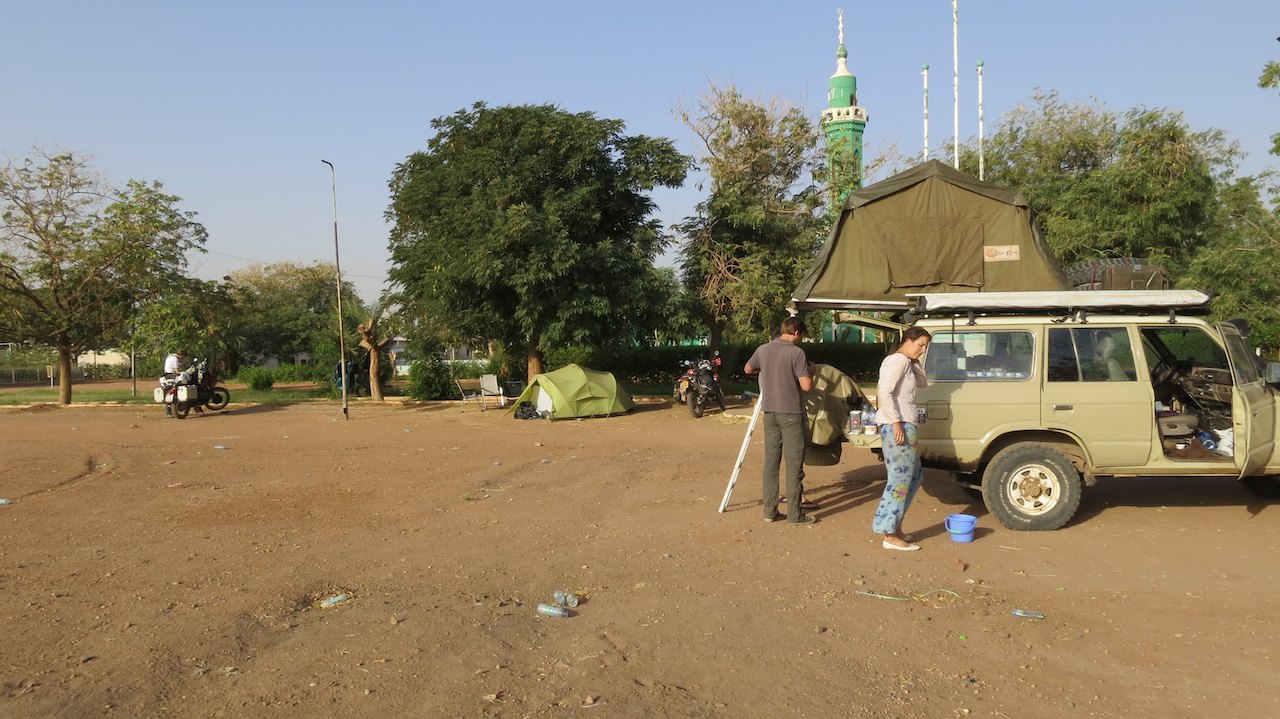
On the way to the second camp site, we will first look for an insurance office where we can buy insurance for the motorbikes. As of Tunisia our European green card is no longer valid, so we have to buy insurance at each border. In Africa they have the ‘yellow card’ called Comesa, which is valid in many countries. We would like to buy that yellow card, so we do not have to go through the administrative mill at each border for insurance. Moreover, it saves some money.
On the internet we found an insurance company that offers the COMESA insurance in Sudan. With the fully packed bikes we drive into the busy city. It is hot and because we cannot find the building immediately we are almost floating in our suits when we finally find the building. Peter stays with the bikes, while I go inside with all our papers. The guard looks a bit strange when I enter. I cannot blame him. A red sweaty face, a gray T-shirt which is now dark grey with stains of sweat, a dirty motorcycle pants that was once white and clunky motorcycle boots.
When I get to the ticket window and ask: ” Comesa?” , the man behind the glass confirms that I can get it there. There is only one problem, the man who knows everything about Comesa is on holiday. I am send through to the manager, who again sends me to his manager. In the posh office of the manager (where I am sitting in my dirty, smelly suit) it again appears that only the holiday-man is familiar with Comesa. They try to call him, but cannot reach him. They give me his telephone number and asure me I can call him. Even though everyone was very helpful, I leave the office half an hour later without insurance and without the intention to disturb the holiday of their colleague. It is so warm outside, that we decide not too look for any other insurance office. We will sort that insurance out when we get to Ethiopia.
We drive to the new campsite, The Blue Nile Sailing Club, in the centre of town. As we drive onto the campsite we see the car of Maurits and Marlous parked in the shade. On the lawn are more tents, in addition to some bicycles we also see… two Honda Africa Twins! We park our bikes next to the Twins and meet Argentines Julian and Lorena. They own a beautiful purple Africa Twin, which is plastered with stickers from virtually all corners of the world. They have travelled for over twelve years around the world, of which the last ten years with their dog, Trico! They have really been everywhere. Julian is working on a blue-green Africa Twin owned by a Sudanese friend who rode that bike from Khartoum to Cape Town.
If you are on holiday and meet other travelers that is always special, but if those travellers are motorcyclists it is usually more special in a crazy way. Often you will hear: “ Hey, you have a motorcycle? I also ride a motorbike!” You will never hear someone say, “ Hey, do you have a car? I also have a car.” Somehow there is an immediate inexplicable click with other motorcycle riders. And if that motorbike than also is a Honda Africa Twin, that is often the start of a new friendship. Once Peter and Julian start talking, there is no stopping them. The men squat next to the bike, discuss technical details and exchange the latest news around the fuel pump. If I mention that the Africa Twin might very well be Peters first love, Julian proudly shows the tattoo of his Africa Twin. It is not very different in Argentina, the love for the Honda Africa Twin is universal!
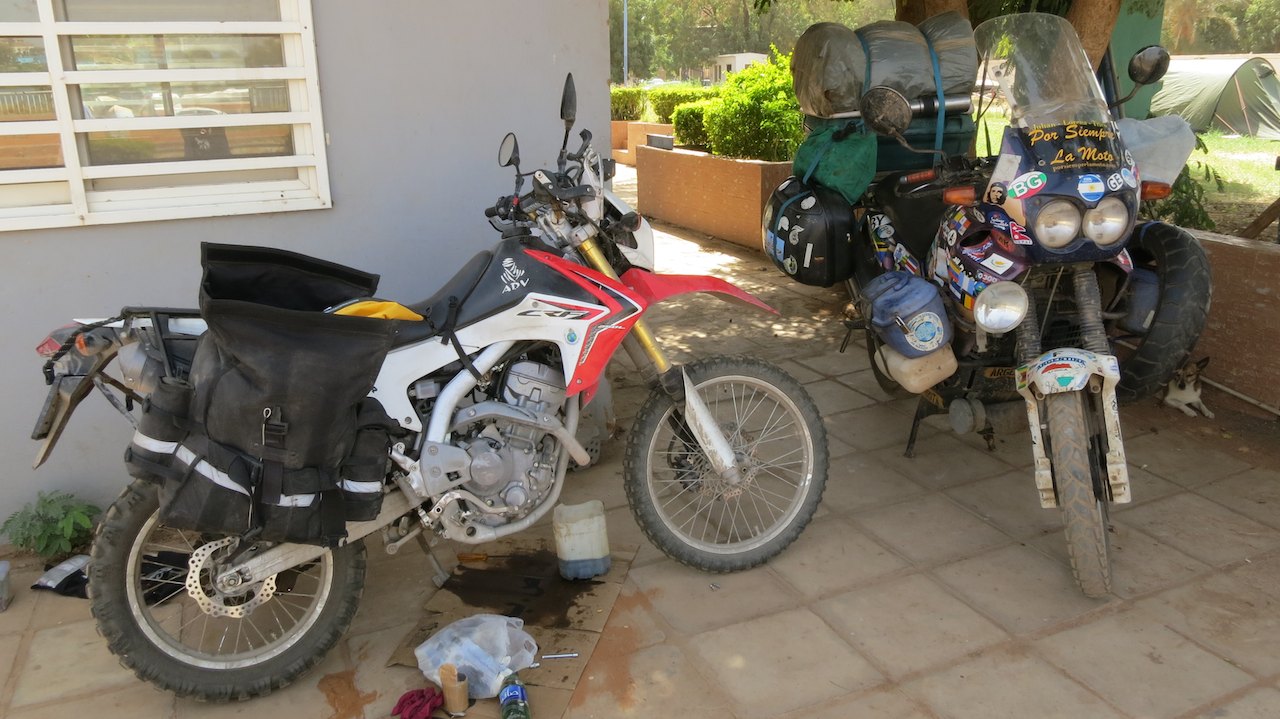
The Blue Nile Sailing Club turns out to be a really nice place, in the middle of the city and overlooking the Nile. There is a constant breeze which make it nice despite the heat. The rest of the day we hang out on the patio and we exchange stories with Maurits and Marloes, the Argentines and a group of German cyclists who are also staying at the campsite.
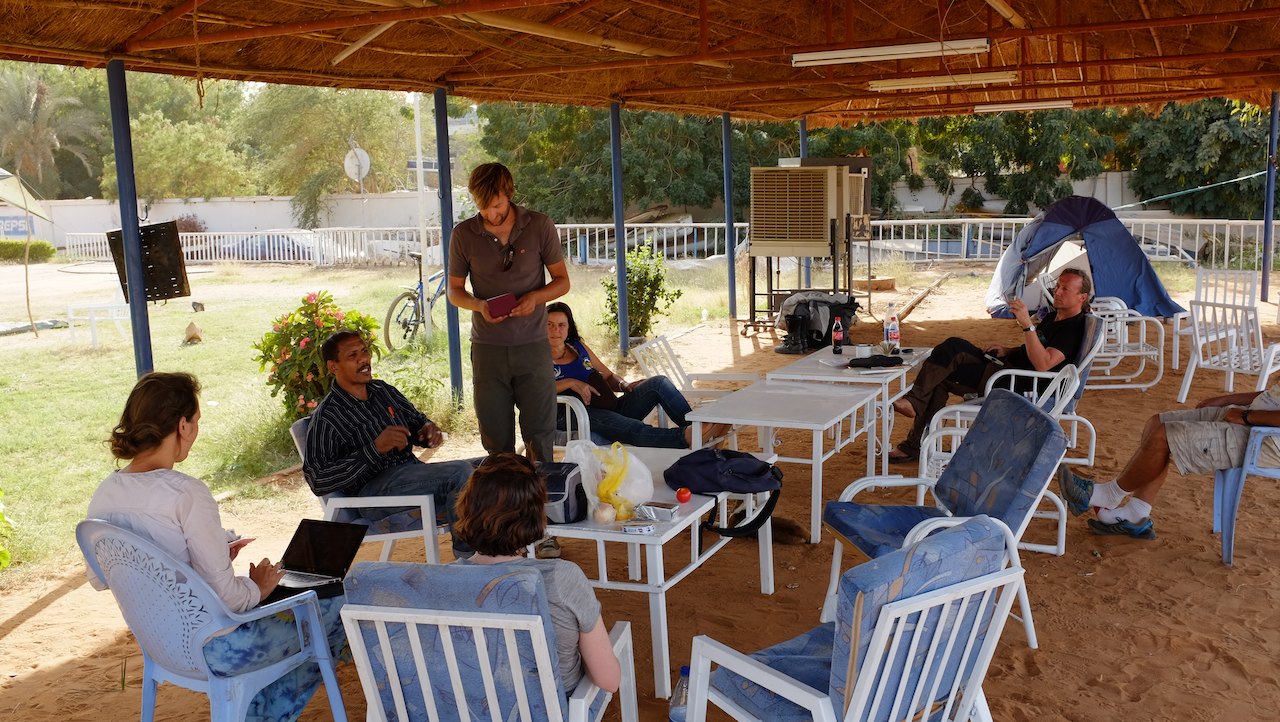
By the end of the afternoon, the owner of the blue-green Africa Twin, Obay, also comes take a look. This time on a brand new BMW GS. Not much later, three other biker-friends of Obay arrive, one of them on a brand new KTM. In the parking lot are now also some very expensive cars. The Blue Nile Sailing Club is the clubhouse of a business club in Khartoum. The businessmen meet in the evening to talk or play cards. We talk with them about our trip, their businesses in Sudan and Ethiopia, and the state of the toilet in the clubhouse (although we did not need waders, it was pretty dirty and not ‘business-club-worthy’).
The contrast between our meetings in the business club in the lively Khartoum and our encounters with the simple Sudanese living outside Khartoum is enormous. The difference is even confirmed when we ask Obay if he can recommend a restaurant and he replies: “Let me call my driver, he will take you.” Not much later we sit in his new Toyota and we enjoy a great meal with Maurits and Marloes among affluent Sudanese, while the driver is waiting for us in the corner of the restaurant. Remarkable!
The next morning we say goodbye to Maurits and Marloes. They have folded in their roof tent and will drive further north today. Julian and Lorena also leave. Once they have packed all their belongings and put on their suit, their dog Trico is wagging his tail on the ground. He knows that they are going to drive and is clearly excited! As Julian and Lorena have taken their seat, Trico jumps on the saddle and lies down between them. What a great sight! And what lovely people, we hope that during our wanderings around the world we will again meet them (and their Africa Twin)!
We stay one more night at the campsite on the Nile and then move on. Time to go to Ethiopia!
Distance travelled to Khartoum: 9,269 km / 5,760 miles
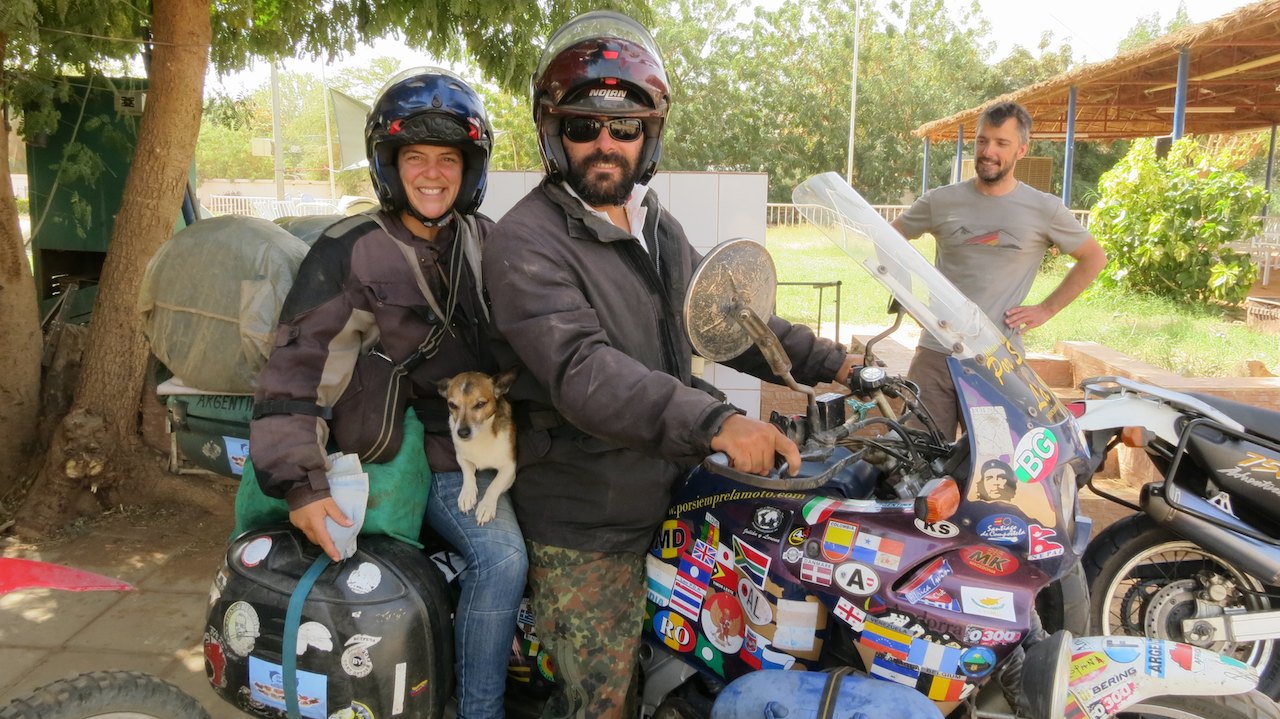
|
|
Currently Active Users Viewing This Thread: 1 (0 Registered Users and/or Members and 1 guests)
|
|
|
 Posting Rules
Posting Rules
|
You may not post new threads
You may not post replies
You may not post attachments
You may not edit your posts
HTML code is Off
|
|
|
|

Check the RAW segments; Grant, your HU host is on every month!
Episodes below to listen to while you, err, pretend to do something or other...

2020 Edition of Chris Scott's Adventure Motorcycling Handbook.
"Ultimate global guide for red-blooded bikers planning overseas exploration. Covers choice & preparation of best bike, shipping overseas, baggage design, riding techniques, travel health, visas, documentation, safety and useful addresses." Recommended. (Grant)

Led by special operations veterans, Stanford Medicine affiliated physicians, paramedics and other travel experts, Ripcord is perfect for adventure seekers, climbers, skiers, sports enthusiasts, hunters, international travelers, humanitarian efforts, expeditions and more.
Ripcord Rescue Travel Insurance™ combines into a single integrated program the best evacuation and rescue with the premier travel insurance coverages designed for adventurers and travel is covered on motorcycles of all sizes.
(ONLY US RESIDENTS and currently has a limit of 60 days.)
Ripcord Evacuation Insurance is available for ALL nationalities.
What others say about HU...
"This site is the BIBLE for international bike travelers." Greg, Australia
"Thank you! The web site, The travels, The insight, The inspiration, Everything, just thanks." Colin, UK
"My friend and I are planning a trip from Singapore to England... We found (the HU) site invaluable as an aid to planning and have based a lot of our purchases (bikes, riding gear, etc.) on what we have learned from this site." Phil, Australia
"I for one always had an adventurous spirit, but you and Susan lit the fire for my trip and I'll be forever grateful for what you two do to inspire others to just do it." Brent, USA
"Your website is a mecca of valuable information and the (video) series is informative, entertaining, and inspiring!" Jennifer, Canada
"Your worldwide organisation and events are the Go To places to for all serious touring and aspiring touring bikers." Trevor, South Africa
"This is the answer to all my questions." Haydn, Australia
"Keep going the excellent work you are doing for Horizons Unlimited - I love it!" Thomas, Germany
Lots more comments here!

Every book a diary
Every chapter a day
Every day a journey
Refreshingly honest and compelling tales: the hights and lows of a life on the road. Solo, unsupported, budget journeys of discovery.
Authentic, engaging and evocative travel memoirs, overland, around the world and through life.
All 8 books available from the author or as eBooks and audio books
Back Road Map Books and Backroad GPS Maps for all of Canada - a must have!
New to Horizons Unlimited?
New to motorcycle travelling? New to the HU site? Confused? Too many options? It's really very simple - just 4 easy steps!
Horizons Unlimited was founded in 1997 by Grant and Susan Johnson following their journey around the world on a BMW R80G/S.
 Read more about Grant & Susan's story
Read more about Grant & Susan's story
Membership - help keep us going!
Horizons Unlimited is not a big multi-national company, just two people who love motorcycle travel and have grown what started as a hobby in 1997 into a full time job (usually 8-10 hours per day and 7 days a week) and a labour of love. To keep it going and a roof over our heads, we run events all over the world with the help of volunteers; we sell inspirational and informative DVDs; we have a few selected advertisers; and we make a small amount from memberships.
You don't have to be a Member to come to an HU meeting, access the website, or ask questions on the HUBB. What you get for your membership contribution is our sincere gratitude, good karma and knowing that you're helping to keep the motorcycle travel dream alive. Contributing Members and Gold Members do get additional features on the HUBB. Here's a list of all the Member benefits on the HUBB.
|
|
|















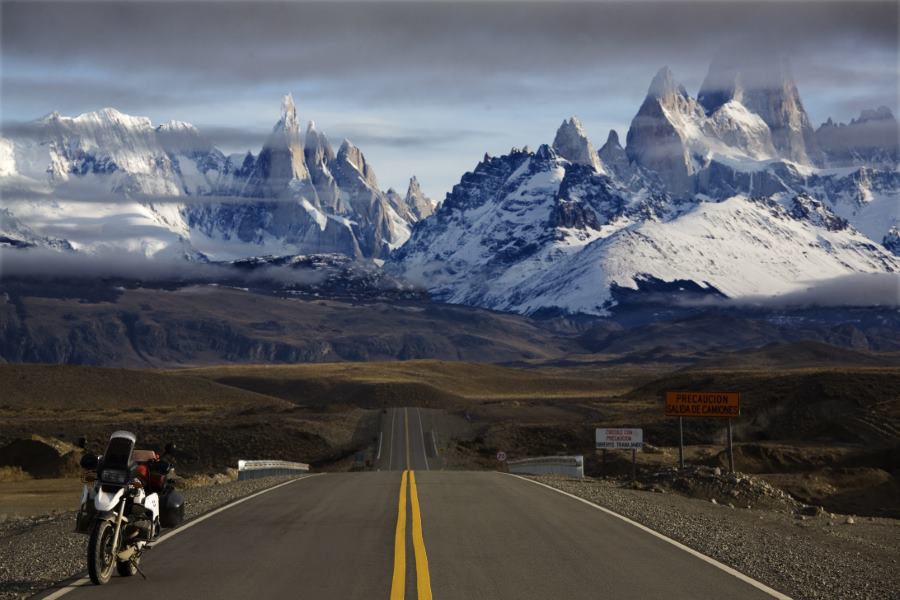
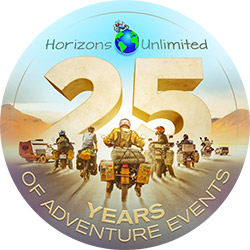
 27Likes
27Likes















































 since Italy.
since Italy.

























































































 Linear Mode
Linear Mode




